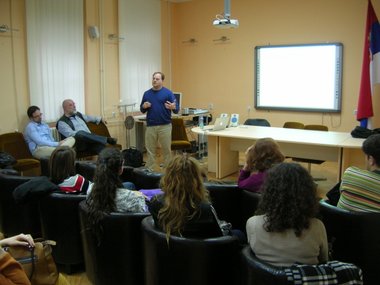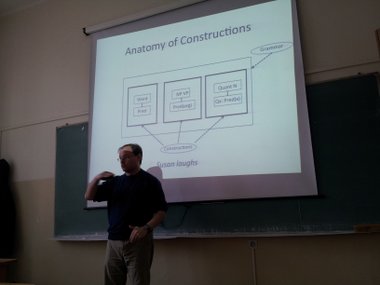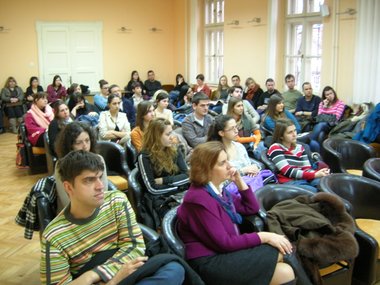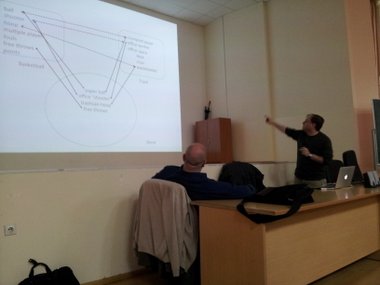Activities
07 May 2025Dr. Marina Bakalova's lecture
In yet another activity on the project "Multilevel-grounded Semantics: Language, Music, Visual Cognition", jointly implemented by the Center for Cognitive Sciences and Branch in Niš of the Serbian Academy of Sciences and Arts (No. O36-24, project coordinator: academician Aleksandar Kostić, project head: Prof. Dr. Mihailo Antović), Dr. Marina Bakalova, associate professor at the Institute of Philosophy and Sociology of the Bulgarian Academy of Sciences, gave a lecture entitled "Music and Cognitive Pursuits: Truth vs. Authenticity". The discussion tackled a fundamental question in the philosophy of music, semiotics, and semantics in cognitive sciences: does music transmit knowledge and, if so, what exactly does the concept of “musical knowledge” - mean? More particularly, Prof. Bakalova's dilemma is whether there can be any “truth” in a musical expression, primarily in terms of so-called “extramusical” meaning, that is, the one through which music potentially refers to entities from the outside world. In answering this question, Prof. Bakalova develops her own model of musical knowledge with the acronym EMMA – expressive multimodal mapping architecture, where she attempts to locate as many as fifteen parameters with variable scalar values during the perception of music – e.g. “tension”, “warmth” or “elasticity”. A significant advantage of the model seems to be its propensity to detect fine dynamic changes over the duration of the musical piece (potentially the entire composition), rather than, as is common in cognitive musicology, in short tonal segments alone. The talk was followed by an interesting discussion.
14 Apr 2025
Dr. Olivera Marković's talk
As part of the project "Multilevel-grounded Semantics: Language, Music, Visual Cognition", jointly implemented by the Center for Cognitive Sciences and Branch in Niš of the Serbian Academy of Sciences and Arts (No. O36-24, project coordinator: academician Aleksandar Kostić, project head: Prof. Dr. Mihailo Antović), Olivera Marković, Ph.D., research assistant in the Department of Serbian Language and Literature at the University of Niš, and member of the Center for Cognitive Sciences, gave a talk entitled "How We Understand Parodies: Toward the Parodic Mechanisms of (De)Stabilization". She focused on semantic tension as central to parody, where the audience should simultaneously recognize both the prototype (which is being imitated) and the prototype's negation (conceptual reversal). Through a series of examples, she suggested that a good way to approach the problem is to use the conceptual blending theory and its extended, multilevel-grounding model. A fruitful question-and-answer session ensued.
17-20 Mar 2025
Prof. Antović's talks in Bulgaria
In March, Prof. Mihailo Antović, head of the Center for Cognitive Sciences, was a keynote speaker at the workshop "Understanding vs. Knowledge in Science, Fiction and Art", organized by the Department of Philosophy at Sofia University in cooperation with the Bulgarian Academy of Sciences. The event gathered around 30 presenters from Europe and the USA. Two keynotes were Prof. Mitch Greene (University of Connecticut), who talked about language understanding by AI models, and Prof. Antović, who provided an overview of his work on cross-modal correspondences in music and language, in an effort to introduce his new "meta-schema" concept in cognitive linguistics. In addition, Prof. Antović gave a talk on his multilevel grounding model and the way it operates across cognitive domains (language, music, vision) in the Department of Cognitive Science and Psychology at the New Bulgarian University. The visit was supported by Sofia University and the CEEPUS programme. The talk at NBU was also an activity within the project "Multilevel-grounded Semantics: Language, Music, Vision", jointly conducted by the Center for Cognitive Sciences and the Branch in Niš of the Serbian Academy of Sciences and Arts (O36-24, coordinator: academician Aleksandar Kostić).
06-07 Dec 2024
Conference: "Schemas in Language, Music, and Visual Cognition"
With the kind support of the Serbian Science Fund (Program "Ideas", Grant No. 7715934, Structuring Concept Generation with the Help of Metaphor, Analogy and Schematicity – SCHEMAS), the Faculty of Philosophy and the Center for Cognitive Sciences organized an international conference titled "Schemas in Language, Music, and Visual Cognition", on Friday and Saturday, 6 and 7 December 2024. The event gathered around 30 presenters from all over the world (Albania, Bosnia and Herzegovina, Bulgaria, China, the Czech Republic, Germany, Greece, Netherlands, Poland, Portugal, Russia, Serbia, the UK, the USA, Ukraine). Distinguished keynote speakers were Prof. Beate Hampe, University of Erfurt (in person), Prof. Ray Jackendoff, MIT and Tufts University, and Prof. Todd Oakley, Case Western Reserve University (online). The event allowed us to hold an invaluable discussion on the underlying, schematic foundations of meaning in music, language, vision, and beyond (e.g. museum practices, dance, oral traditions). We established numerous new contacts with reputable international researchers and hope for even more collaboration in the near future.
26 Nov 2024
Online talk by Prof. Anna Piata
On Tuesday, 26 November 2024, Dr. Anna Piata, assistant professor in Semantics and Pragmatics in the Faculty of English Language and Literature (Department of Language and Linguistics) at the National and Kapodistrian University of Athens, Greece, gave an online talk in our Center entitled "What can internet memes tell us about affect? Schematic representations, meaning construction and discursive effects". The talk aimed to shed some new light on how affect is represented in internet memes, suggesting that multimodal representations of affect are largely underpinned by more general schemas, viz. conceptual metaphors and linguistic constructions. The result is a novel means of "social grooming", construed as bonding, affiliation, and coordination, albeit accomplished by virtue of communicative opportunities of online discourse. After the presentation, a fruitful discussion ensued. This talk was envisaged as a special event to introduce our conference on multimodality, image schemas, and affect, which was organized in early December.
23 May 2024
EEG Training and Workshop by Mr. Slobodan Tanacković
On Thursday, 23 May 2024, we were visited by Mr. Slobodan Tanacković, representative of the Austrian company G-Tec Medical Engineering, a well-known producer of all types of equipment for invasive and non-invasive use with the brain, in both research and clinical environments. Mr. Tanacković brought along a 64-channel electroencephalogram and demonstrated its use with a relatively simple task of visual perception. In addition to involving two young volunteers, one as the operator of the system and one more as an experimental participant, which the audience was very interested in observing, Mr. Tanacković also presented numerous challenges of operating the equipment and the software, including set-up, mounting the electrodes onto the scalp, averaging the signal, avoiding artifacts, and many more. He also presented some novelties in the world of neurophysiology, including recent mobile EEGs, which measure cortical activity in naturalistic settings, i.e. outside of the laboratory. The session sparked a lot of interest in the audience.
22 May 2024
Dr. Indurkhya's lecture and workshop
On Tuesday and Wednesday, 21 and 22 May 2024, we had another visitor in the Center for Cognitive Science through the CEEPUS exchange network "Cognitive Science, Knowledge Studies and Knowledge Technologies". Prof. Bipin Indurkhya, currently of Jiagellonian University in Krakow, Poland, but also a scholar with a long list of excellent past affiliations (Uni Massachusetts at Amherst, Boston University, Tufts University, New York State University at Buffalo, Northeastern University, universities in India, Japan, Turkey, Germany, and beyond) has shared with us segments of his expertise in cognitive robotics, metaphor, analogy, and creativity studies. In the first talk, entitled "Thinking like a child: The role of surface similarities in stimulating creativity", he discussed ways in which the human agent needs to focus on more immediately perceptual aspects of a phenomenon (thus excluding the excessive influence of context) in order to be able to approach it creatively. In the second talk, "Enhancing creativity and exploring social robotics in healthcare", he has presented his group's recent and ongoing research on the employment of robots as assistants to people with cognitive disabilities. In particular, he advocated a "participatory" design of such programs, which would base the protocols for robot behavior on the prior needs and feedback provided by the actual users of the service. Both talks illustrated the main theses with numerous empirical studies Dr. Indurkhya's team has conducted, and were followed by interesting question-and-answer sessions.
16 May 2024
Dr. Hristova's visit and talk
On Thursday, 16 May 2024, Dr. Jenny Hristova,assistant professor in the Department of Cognitive Science and Psychology at the New Bulgarian University, Sofia, gave a lecture entitled "Moral Judgments and Allocation of Limited Medical Resources". She presented a series of studies on the underlying cognitive principles that people seem to use so as to decide on who is to receive urgent medical care in emergency situations such as pandemics. She particularly discussed the tension between the so-called egalitarian and utilitarian principles from moral philosophy and how they relate to results of actual psychological studies. The conclusion is that utilitarian principles, e.g. opting for a younger patient or the one more likely to be fully cured, generally receive stronger support. A vivid discussion ensued. This talk was jointly organized by the Center for Cognitive Sciences, through the CEEPUS exchange network "Cognitive Science, Knowledge Studies and Knowledge Technologies" and by the Branch in Niš of the Serbian Academy of Sciences and Arts (project O36-24, "Multilevel Grounded Semantics: Language, Music, Visual Cognition", project coordinator academician Aleksandar Kostić, project head Prof. Mihailo Antović).
28 March 2024
Project presentation: Multilevel-grounded semantics - language, music, visual cognition
On Thursday, 28 March 2024, researchers and associates gave the first presentation of the new project on multilevel-grounded semantics, as jointly implemented by the Center for Cognitive Sciences and Branch in Niš of the Serbian Academy of Sciences and Arts (No. O-36-24, coordinator: academician Aleksandar Kostić). The principal investigator and head of the Center for Cognitive Sciences, Prof. Mihailo Antović, gave a retrospective of the first ten years of work of the Center and thanked the Branch in Niš of the Serbian Academy for continued support. After this, the basics of the multilevel-grounding theory were given followed by current and planned activities on the project. Finally, young associates were given opportunity to present their own roles in the project (Nikola Stojanović, Mladen Popović, Anja Tošić, Miloš Milisavljević, Anja Petrović, and Olivera Marković).
01 Feb 2024
Center for Cognitive Sciences starts cooperation with Niš Branch of the Serbian Academy of Sciences and Arts
On Thursday, 01 February 2024, on the premises of Niš Branch of the Serbian Academy of Sciences and Arts, the first meeting was organized, with the project head and associates of the project "Multilevel-grounded semantics: Language, music, visual cognition" (No. O-36-24, coordinator: academician Aleksandar Kostić). Project head, and head of the Center for Cognitive Sciences, Prof. Mihailo Antović, Ph.D., acquainted the team with the initial project activities. An official presentation of the project is planned in March 2024.
28 Sep 2023
Prof. Antović's book presentation
On Thursday, 28 September 2023, Prof. Mihailo Antović, head of the Center for Cognitive Sciences held a lecture intended as a presentation of his book Multilevel Grounding: A Theory of Musical Meaning (Routledge, 2022). The event took the form of a lecture jointly organized by the Center for Cognitive Sciences and Niš Branch of the Serbian Academy of Sciences and Arts, within the project The Musical Heritage of Southeast Serbia (O-10-17, coordinator: corresponding academy member Jelena Jovanović, project manager: Prof. Danijela Zdravić Mihailović, Ph.D.). Following an excellent opening by Prof. Dragan Žunić, Ph.D., a fruitful discussion ensued. This event marks a new step in the hopefully even stronger cooperation of our two institutions.
08 - 12 May 2023
Prof. Ivo Popivanov's talks
On Tuesday, 9 May 2023, Prof. Ivo Popivanov of the Department of Cognitive Science and Psychology at the New Bulgarian University gave a talk entitled "DIFFERENTIATING FACES FROM OBJECTS: A PILOT ELECTROPHYSIOLOGICAL STUDY". After providing an overview of face recognition studies involving behavioral methods (including eye tracking), Prof. Popivanov discussed invasive and non-invasive methods for electrophysiological measurement. He then presented results obtained by members of the renewed EEG lab at NBU, where researchers have used a 32-channel EEG system eWave by Sciencebeam to have participants distinguish between face-presenting and deliberately scrambled visual stimuli. Preliminary results and potentials for cooperation were considered.
On Thursday, 11 May 2023, Prof. Popivanov delivered a lecture entitled "TEST YOUR MEMORY - A SELF-ADMINISTERED INSTRUMENT FOR COGNITIVE SCREENING IN ELDERLY PEOPLE." The talk introduced a quick, self-screening tool for diagnosing dementia, known as "Test Your Memory (TYM)". Prof. Popivanov's team has translated the test from English into Bulgarian and has provided a preliminary validation of the test. Interesting question-and-answer sessions followed both talks.
22 March 2023
Prof. Anna Bonifazi's visit and talk
On Wednesday, 22 March 2023, Prof. Dr. Anna Bonifazi of the Department of Linguistics at the University of Cologne delivered a talk entitled "TEARS IN MUSIC: TOWARDS A COGNITIVE-SEMIOTIC ACCOUNT". The lecture offered results of a pilot investigation on a sample of 21 Western-music songs thematizing weeping - and ranging in genre and age. Her initial input consisted of recurrent themes in ancient Greek mentions of tears associated with performative events, such as the prominence of sound, interjections, strong self-referentiality, repetitions, and refrains. In her analysis of modern and contemporary songs and arias, she adopted a cognitive-semiotic approach that focused on the semiotic complexity derived from the integration of multiple modalities/modes (weeping, lyrics, music (including musical notation), and images, in different combinations), and on the cognitive mappings that stemmed from several observable metonymic, metaphorical and iconic cross-modal relations. The lecture inspired a vivid and interesting discussion, with both local and online audiences participating in the debate.
22 December 2022
Dr. Mats Küssner's talk
On Tuesday, November 22th 2022, Dr. Mats Küssner, research associate in the Department of Musicology and Media Studies at Humboldt University in Berlin, gave a remote talk in the Center for Cognitive Sciences titled "IN THE MIND'S EYE OF THE LISTENER: EMPIRICAL STUDIES OF VISUAL MENTAL IMAGERY IN MUSIC COGNITION". In his talk. Dr. Küssner argued that visual mental imagery (i.e. seeing images in one's mind's eye) is a common phenomenon during music listening. He presented recent empirical evidence on its content, function, relation to emotion, neurophysiological correlates, and relationship with synaesthesia, before discussing the findings in light of routes from perception to imagination. A fruitful exchange of ideas followed.
October 2022
Head of the Center for Cognitive Sciences delivers a keynote lecture at the Free University of Bolzano, Italy
Prof. Mihailo Antović, head of the Center for Cognitive Sciences, delivered a keynote talk at the conference "Lost in Translation: The Challenge of Communicating Music through Words", organized in the Faculty of Education, Free University of Bozen-Bolzano, Bressanone Campus, Italy, 6-7 October 2022. Prof. Antović's talk entitled "Unity in Diversity: How Musical Verbalization Can Help Address Some Major Questions of Cognitive Science" introduced his theory of multilevel grounding in musical meaning construction and discussed methodological issues in studying (schematic) signification in musical structure.

June 2022
Center for Cognitive Sciences hosts a Return Fellowship by the Alexander von Humboldt Foundation
Upon the completion of his Humboldt Fellowship at Humboldt University, Berlin, Prof. Antović was awarded a one-year return fellowship to reintegrate in his home institution and ensure the sustainability of his project conducted in Germany. To that end, he has gathered a team of four junior scholars into a research group pursuing questions of semantics in cognitive science. The team includes Olivera Marković, Anja Tošić, Miloš Milisavljević and Anja Petrović, doctoral students in the Faculty of Philosophy. They are working on joint studies, preparing papers and conference presentations.
January 2022
Members of Center for Cognitive Sciences receive funding from an elite program of the Serbian Science Fund
A ten-member team headed by Prof. Vladimir Jovanović of the Faculty of Philosophy in Niš won a three-year grant for conducting an interdisciplinary project in cognitive science entitled "SCHEMAS - Structuring Concept Generation with the Help of Metaphor, Analogy, and Schematicity". The project aims to provide theoretical, analytical, experimental and AI elaboration of the thesis that there might be joint, abstract schematic principles underlying some aspects of concept construction in language, music, and visual cognition. Prof. Mihailo Antović and Assistant Prof. Vladimir Figar represent current members of the Center for Cognitive Sciences in the project team, yet the majority of other team members are the Center's affiliates and regular collaborators. The project website is available here.
January 2021 - May 2022
Prof. Antović's Humboldt Fellowship and a new book
In the period January 2021 - May 2022 Prof. Mihailo Antović, head of the Center for Cognitive Sciences stayed in the Department of Musicology and Media Studies at Humboldt University in Berlin, as a an experienced researcher funded by the Alexander von Humboldt Foundation. The main output of this research project is the development of Prof. Antović's theory of musical meaning, as represented in his new book "Multilevel Grounding: A Theory of Musical Meaning", published with Routledge in 2022. The project also included work on several experiments and aimed at ensuring lasting collaboration with colleagues from Germany.
30 November 2020
Prof. Ivana Mitić's talk
On November 30th, Dr. Ivana Mitić, assistant professor in the Serbian Language Department at the Faculty of Philosophy, University of Niš, gave an online talk entitled "Effect of Linear Order and Syncretism on Verb Agreement based on Gender in Serbian: Experimental Data". Dr. Mitić presented a series of experiments suggesting that verb agreement in the Serbian language is not only a syntactic, but also a post-syntactic process, influenced by phonological factors such as the syncretism and linear order effects, in particular when the targeted constituent emerges as the final element in the conjunction. The talk was well visited and followed by a vivid discussion.
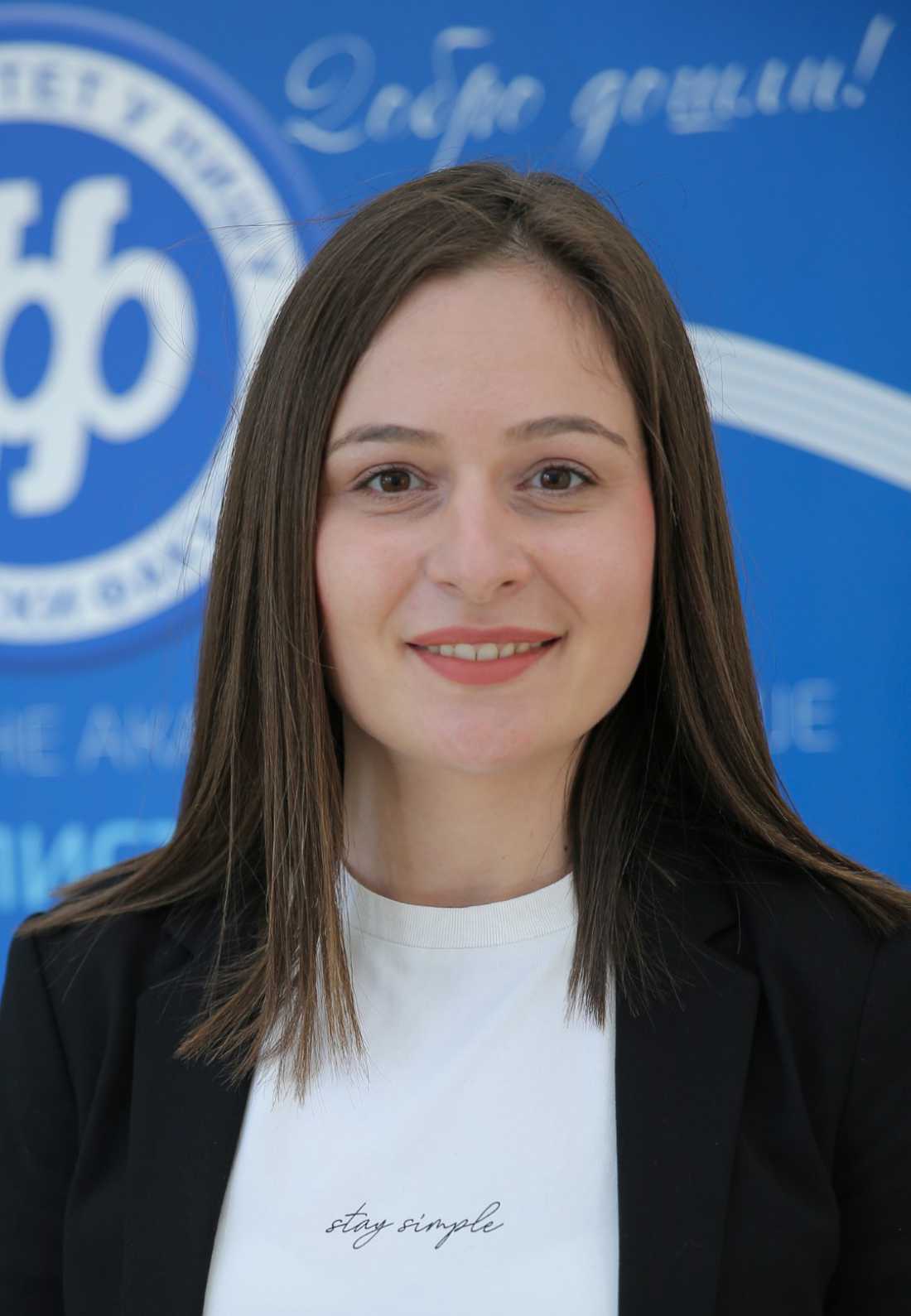
3 - 4 December 2019
Educational seminar Current trends in cognitive sciences IV
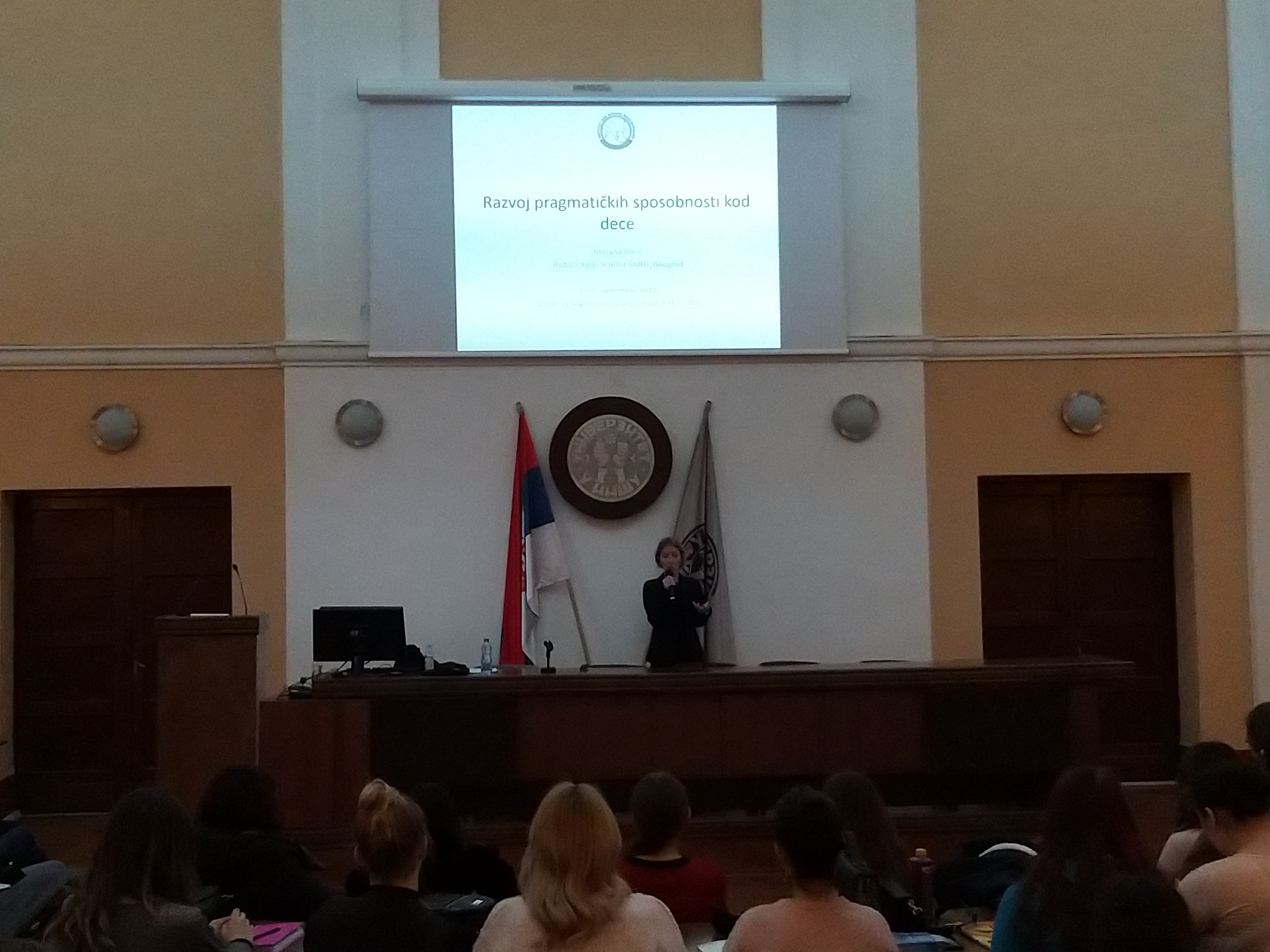
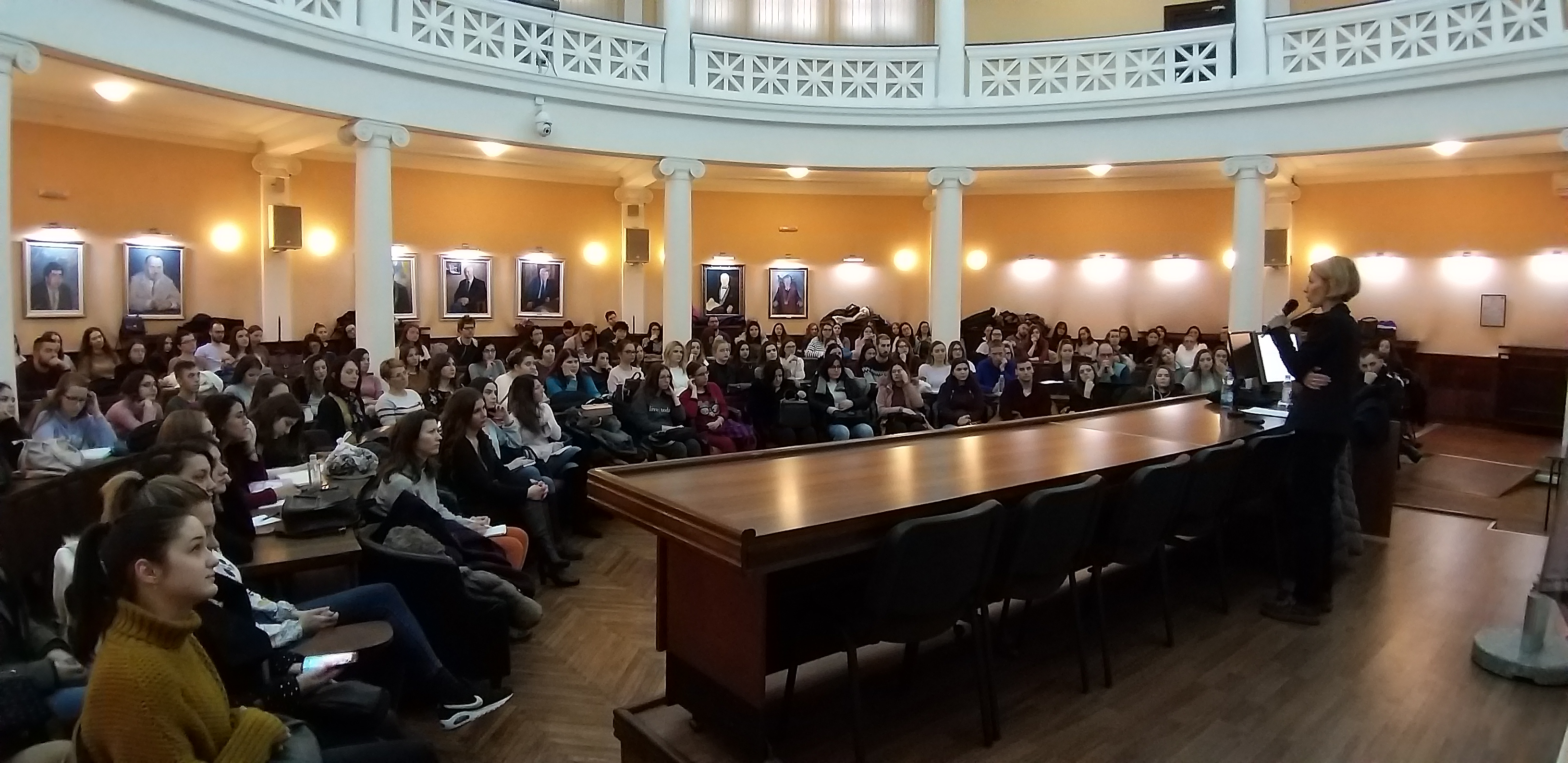
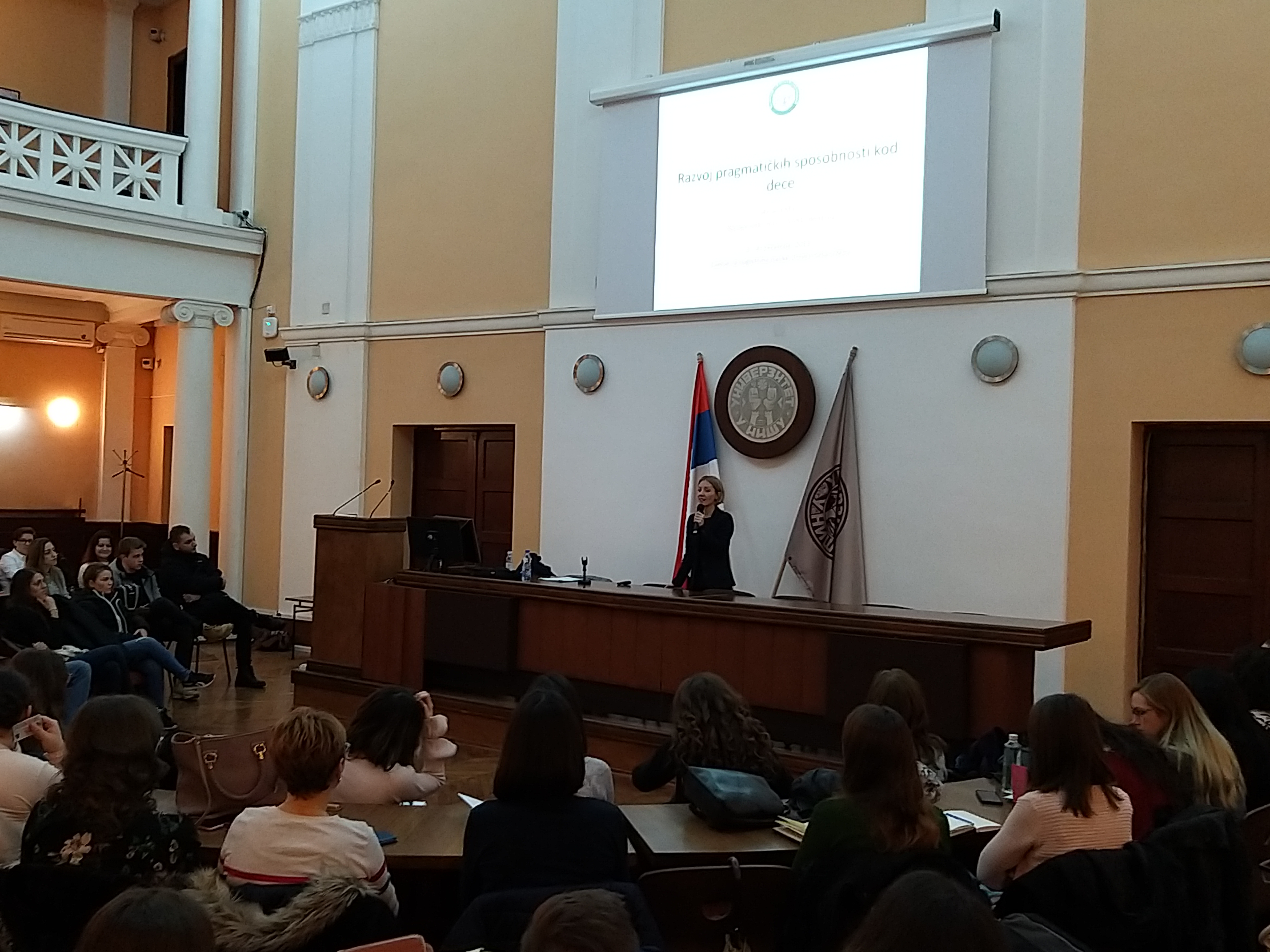
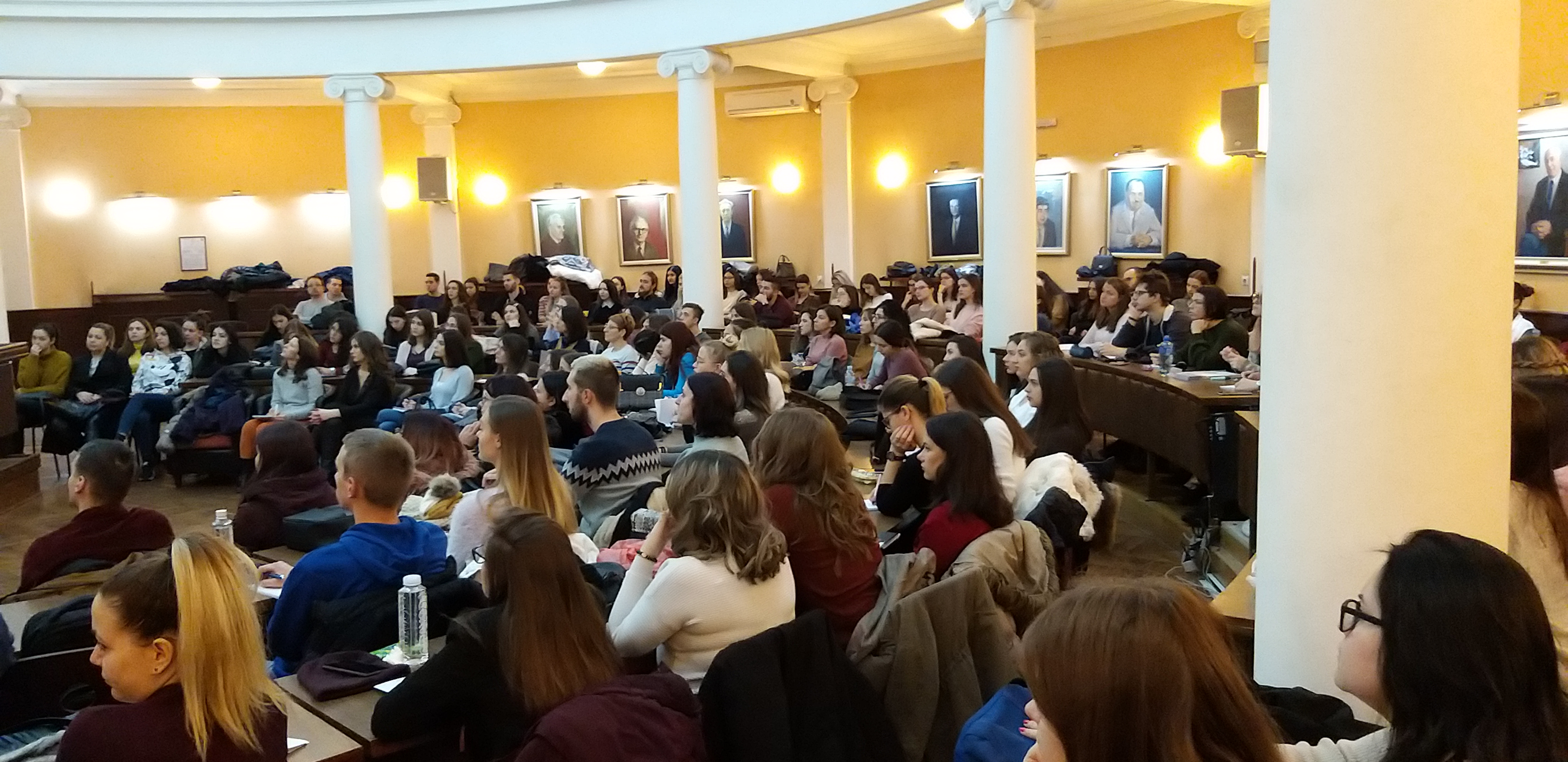
The seminar was attended by a large number of students from the Faculty of Philosophy in Niš, mostly from the Department of Serbian language and literature, Department of English, and Department of Psychology. Each session was followed by a fruitful discussion. You can find more details here.
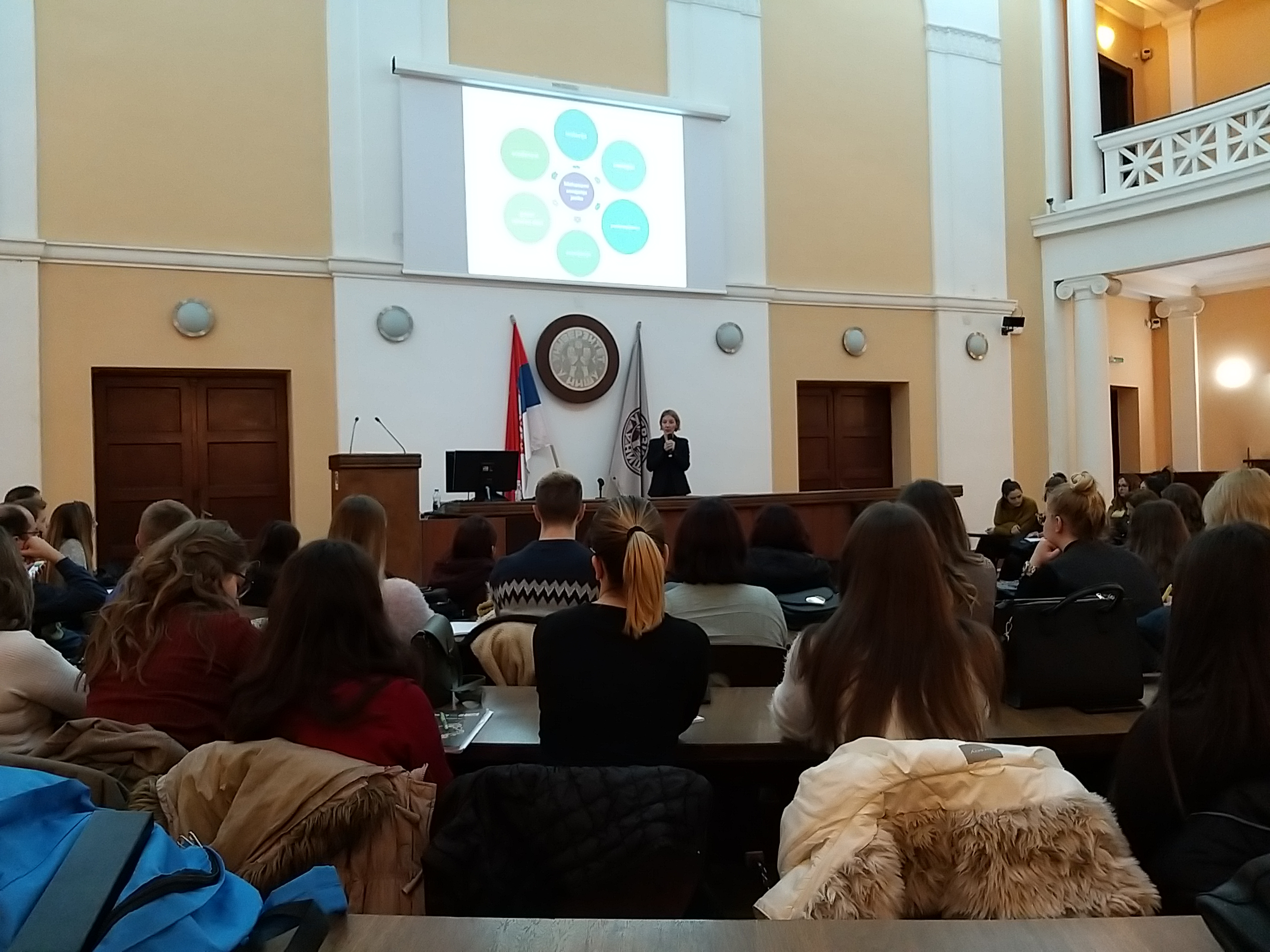
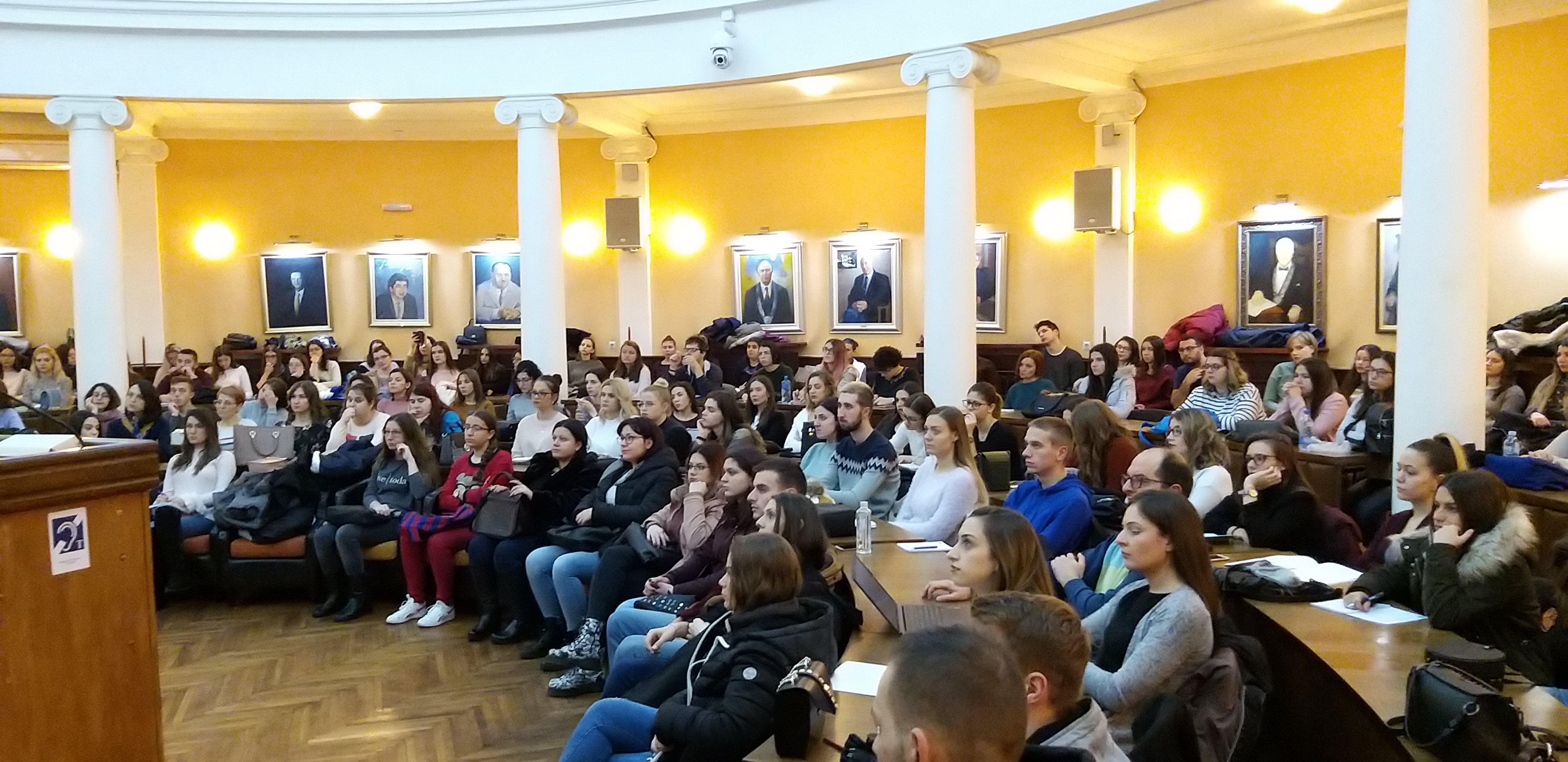
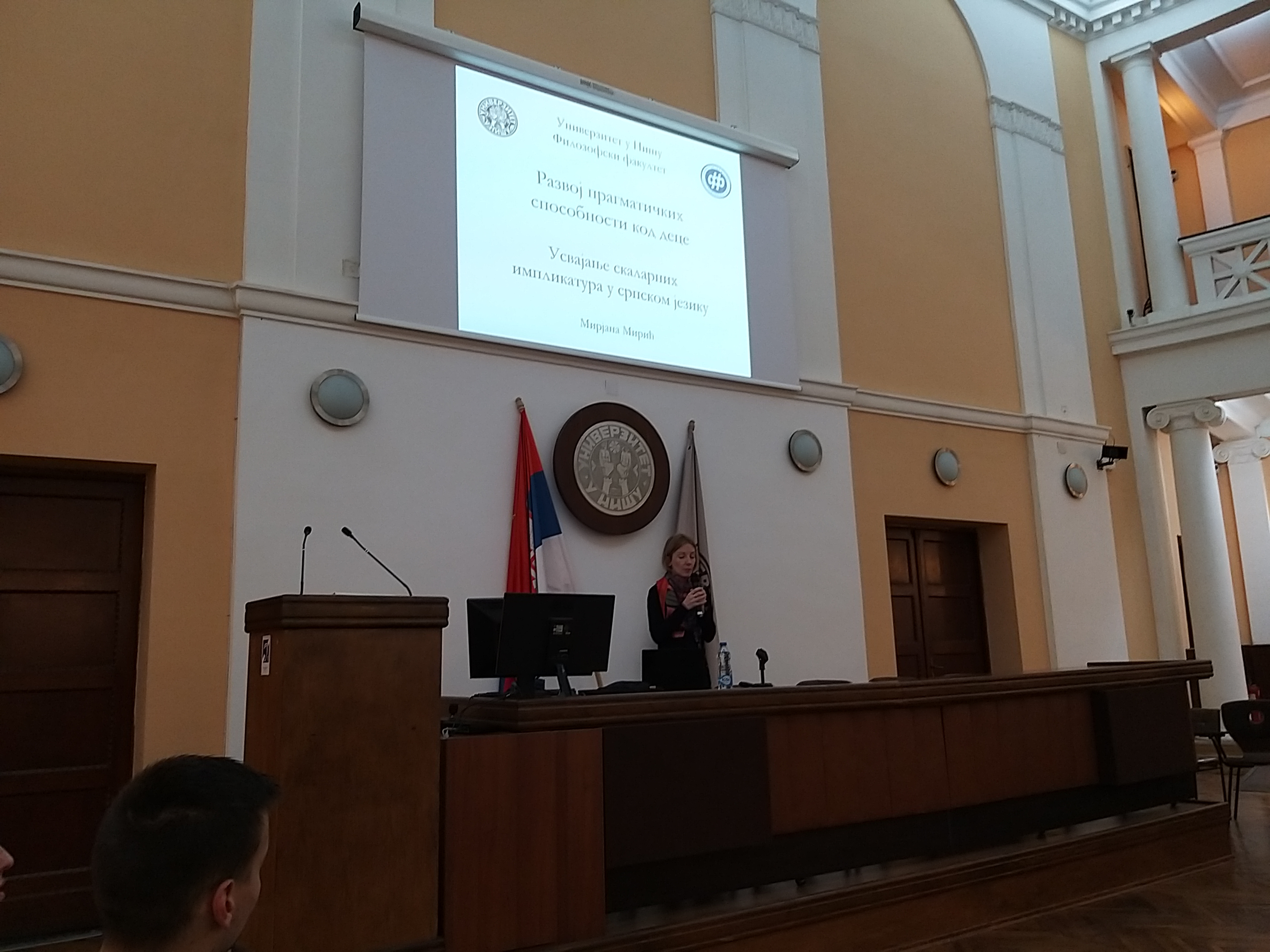
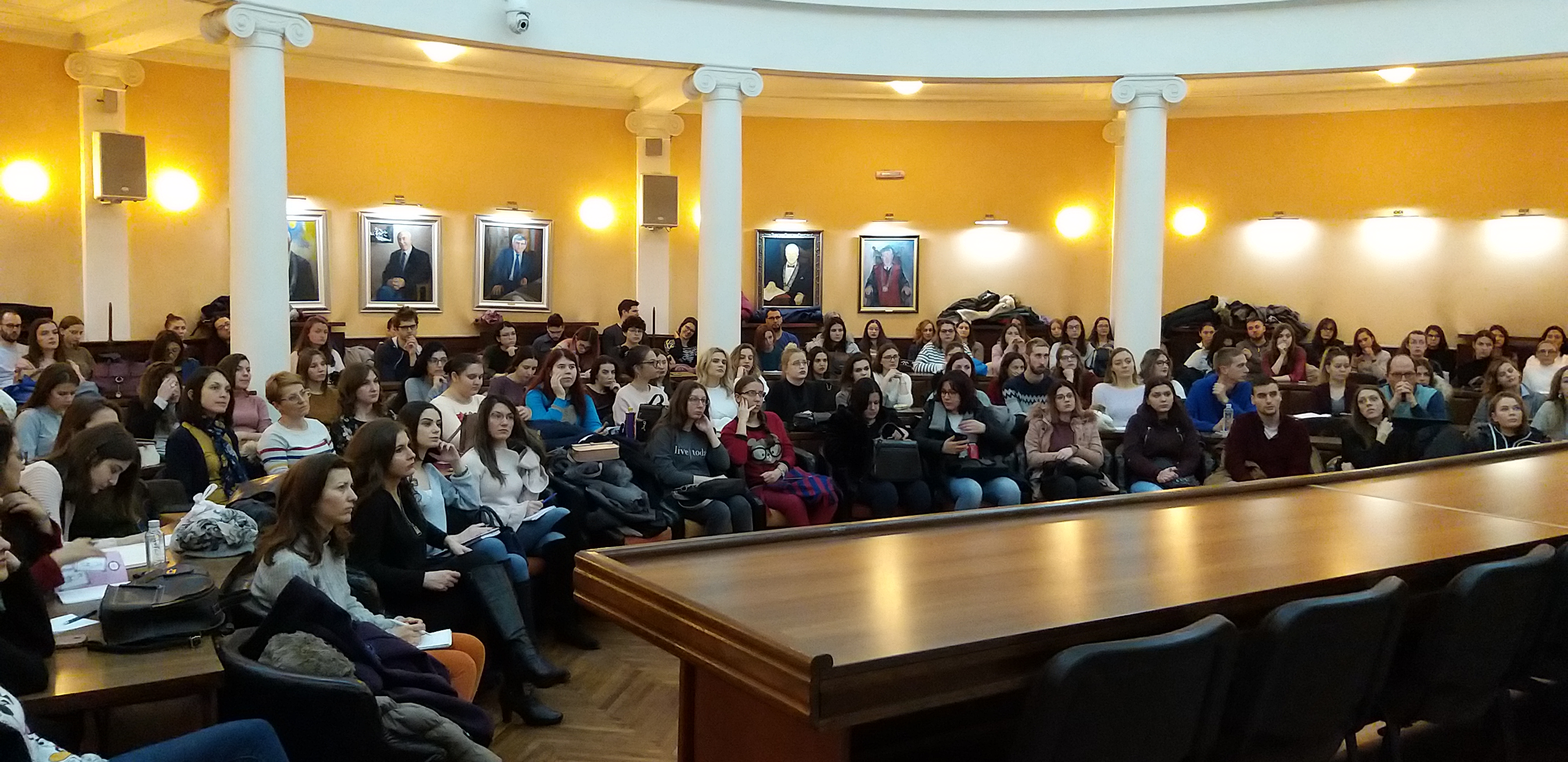
11 - 18 May 2019
Educational Seminar CURRENT TRENDS IN COGNITIVE SCIENCES III
On May 11th and May 18th, 2019, Center for Cognitive Sciences hosted the third seminar in the series Current Trends in Cognitive Sciences. The seminar included lectures from the fields of Psychology, Linguistics, and Cognitive Linguistics, and it attracted a large number of students from the Faculty of Philosophy in Niš.
The first two lectures of the seminar were given on May 11th, 2019, and both lectures dealt with topics from the field of Psychology. The first lecture was given by Marija Pejičić, MA, from the Psychology Department, Faculty of Philosophy, University of Niš, and the topic of the lecture was GENDER STEREOTYPES IN EMOTIONAL BEHAVIOUR.
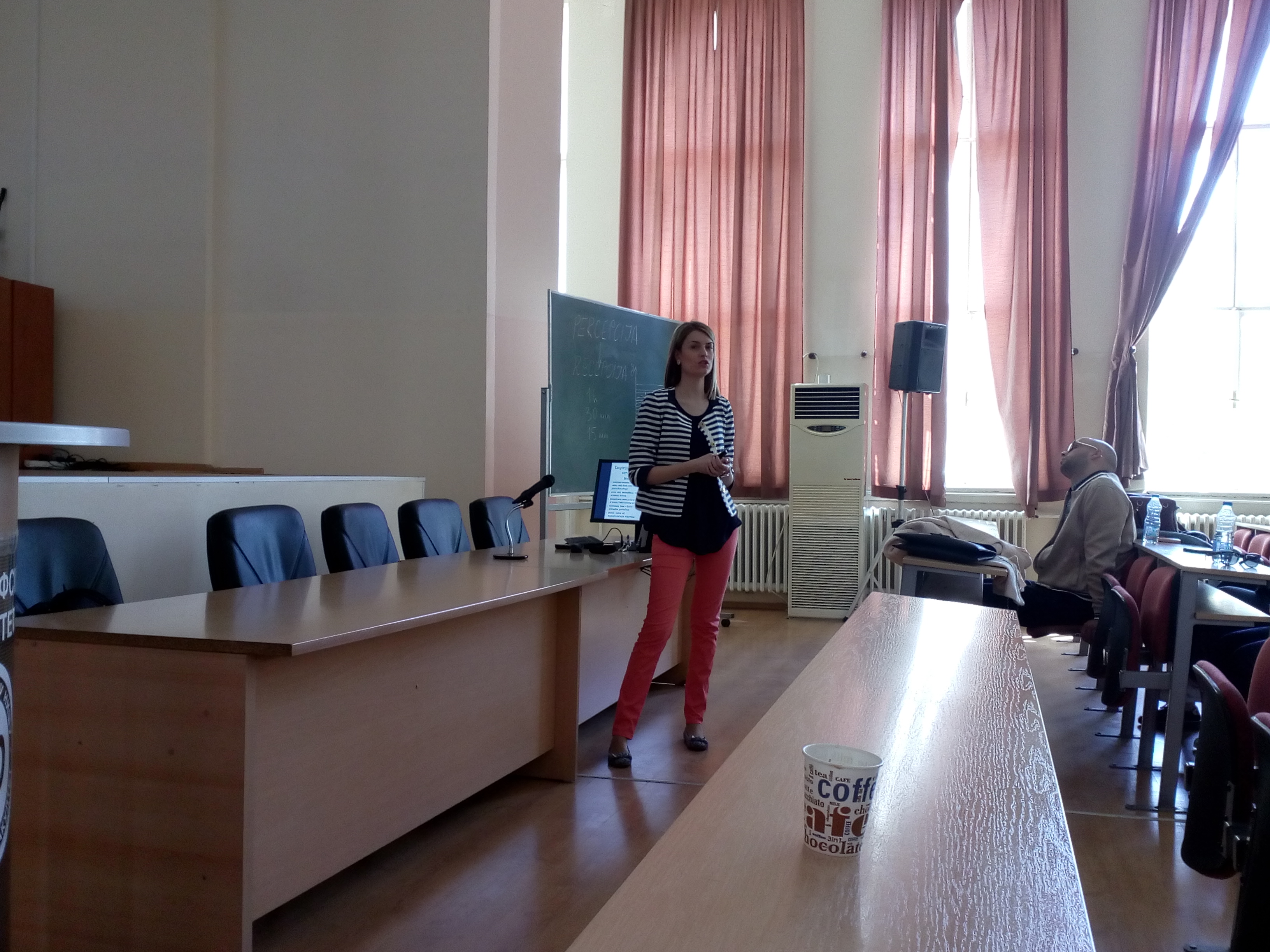
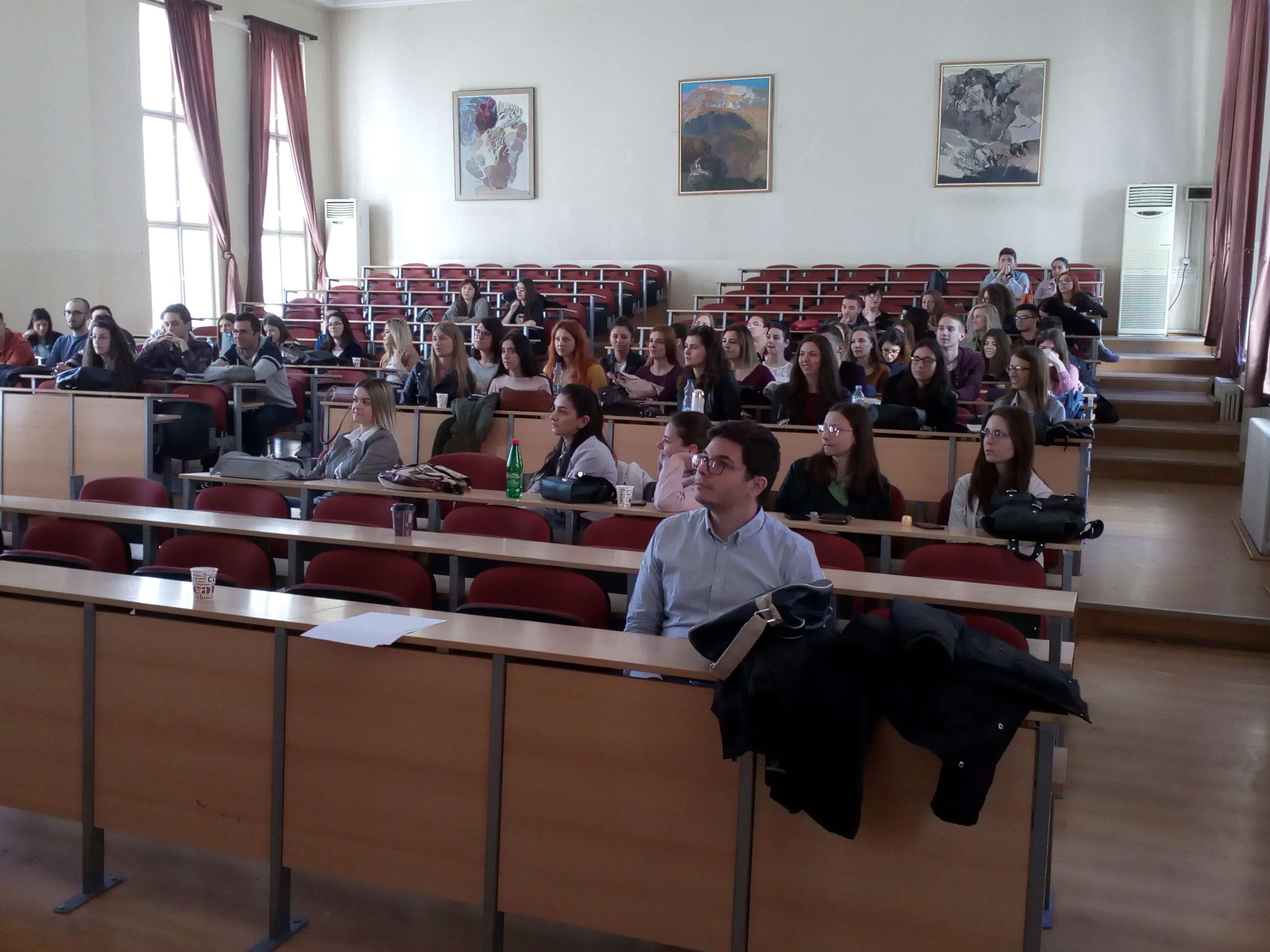
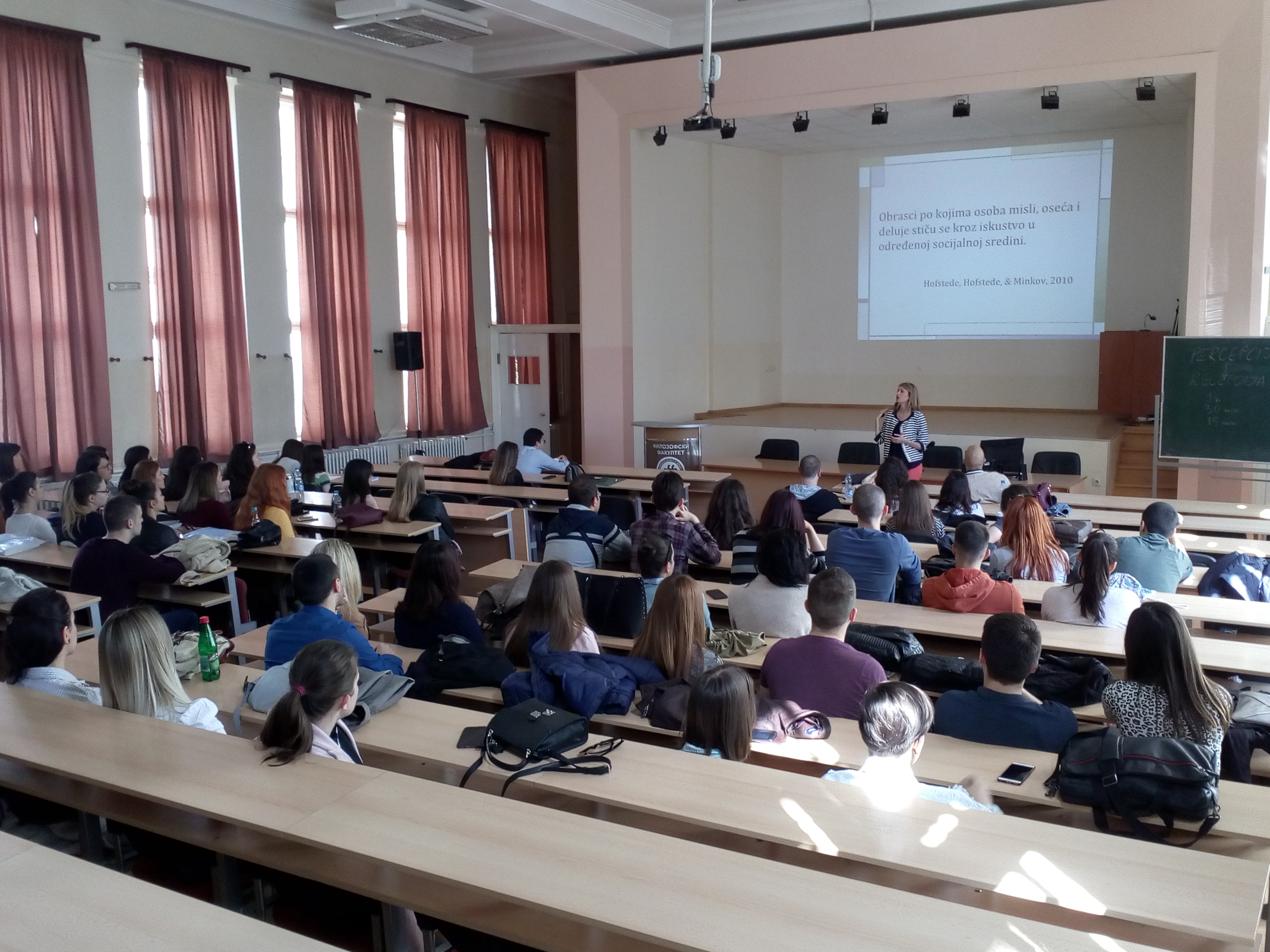
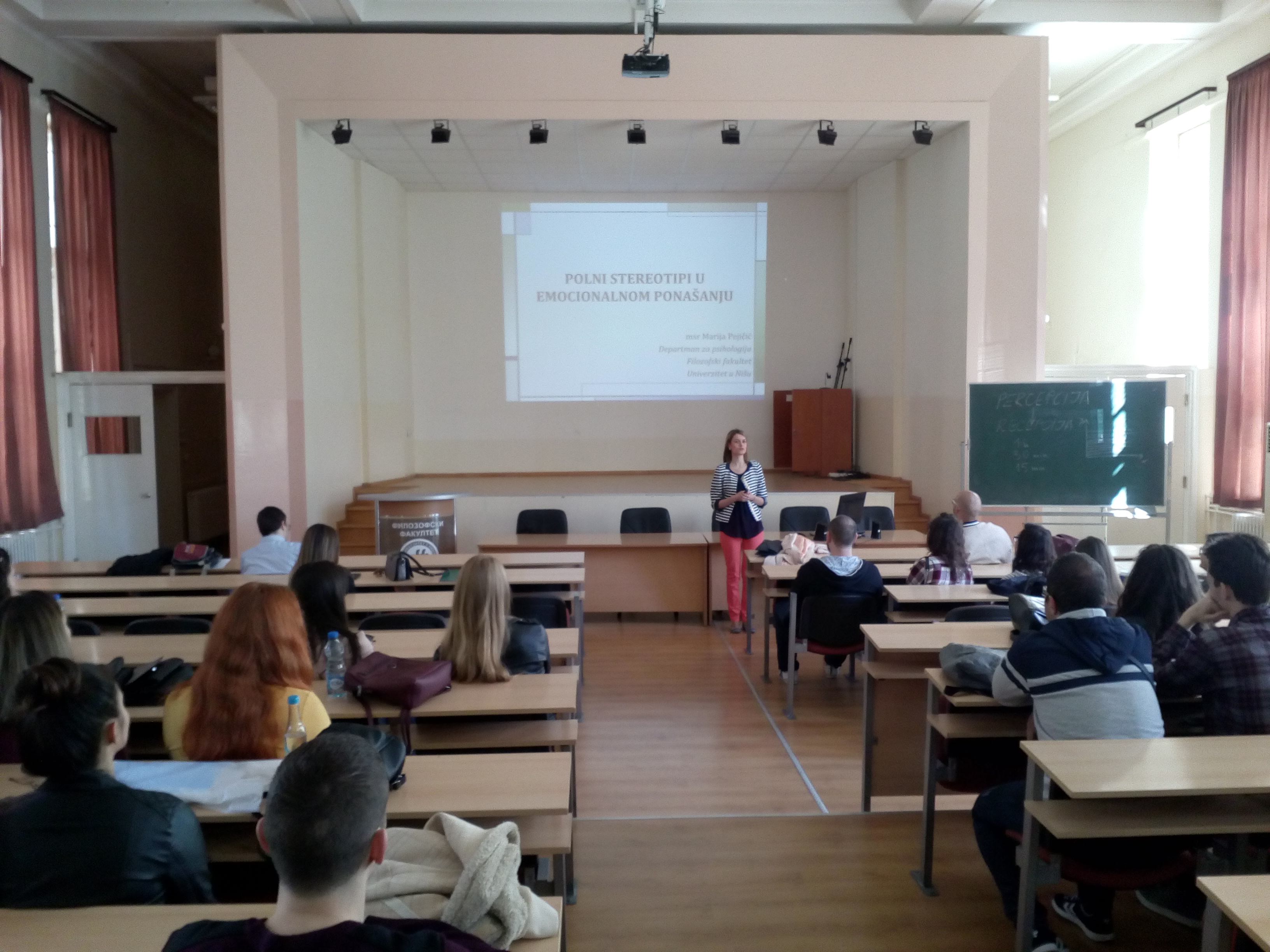
The second lecture was given by Nikola Ćirović, MA, also from the Psychology Department, Faculty of Philosophy, University of Niš. The topic of the second lecture was FACTOR ANALYSIS OF INDIVIDUAL DIFFERENCES IN THE COGNITIVE DOMAIN: LATENT STRUCTURE OF EXECUTIVE FUNCTIONS. Both lectures were followed by a fruitful discussion.
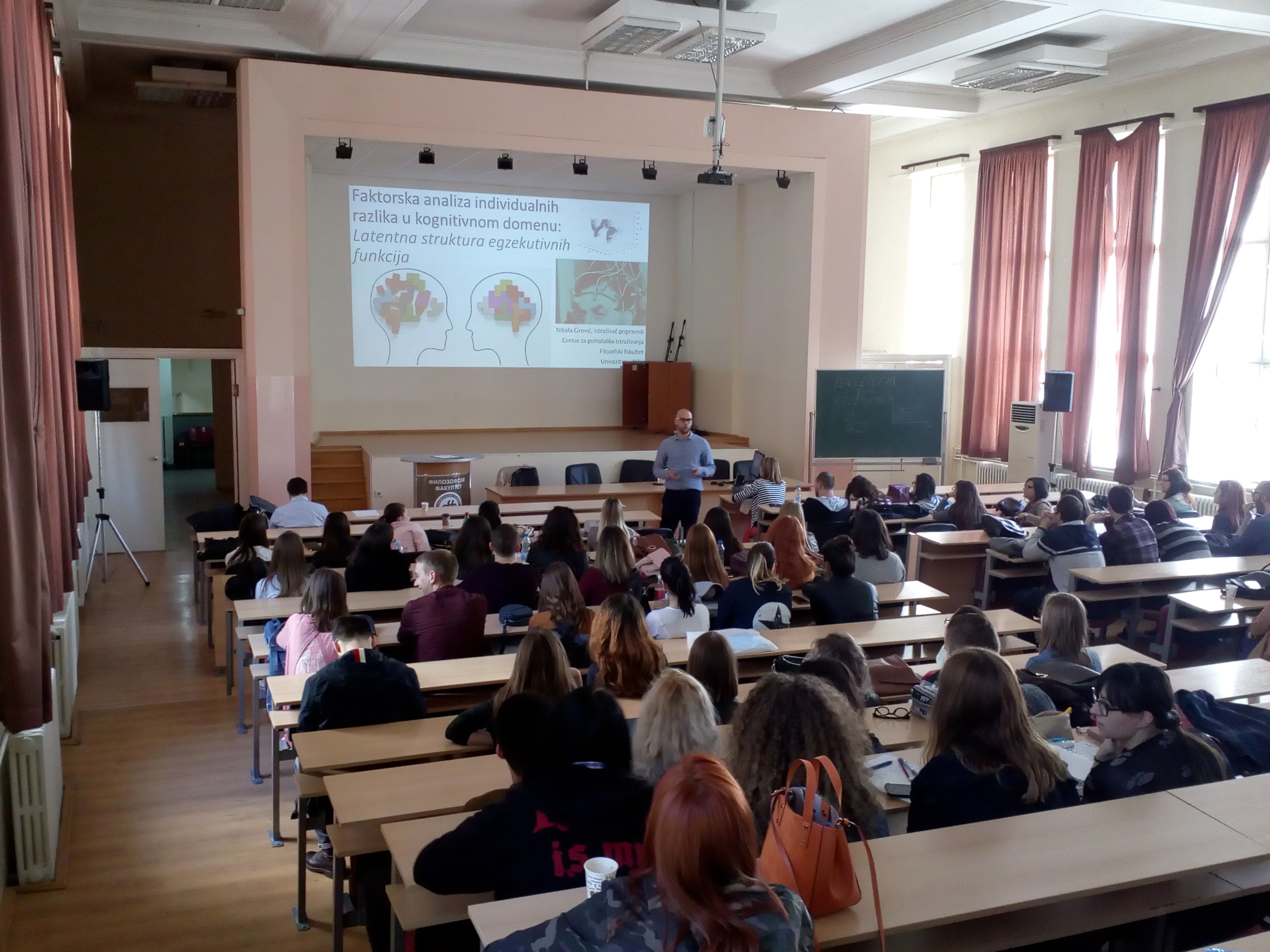
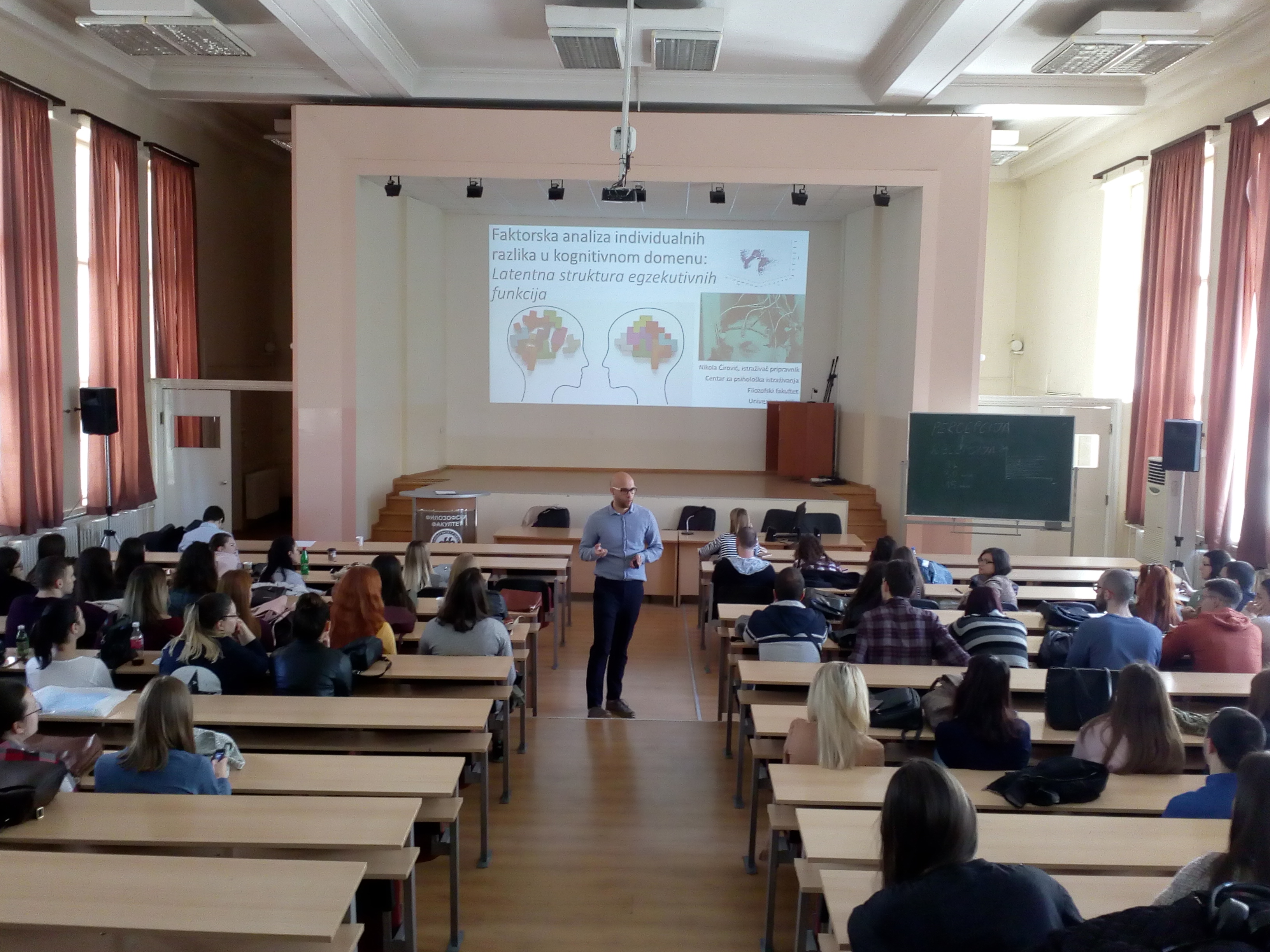
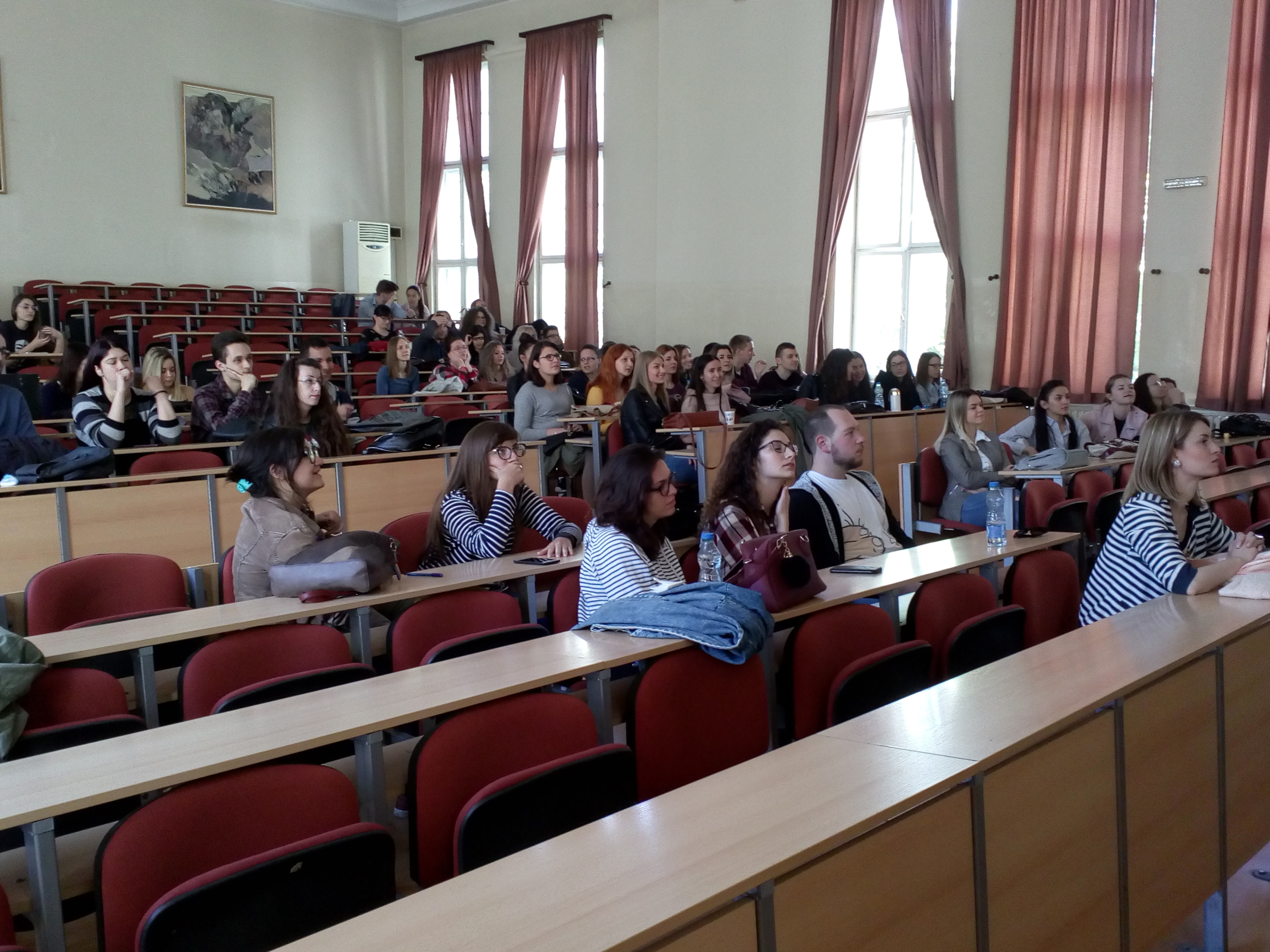
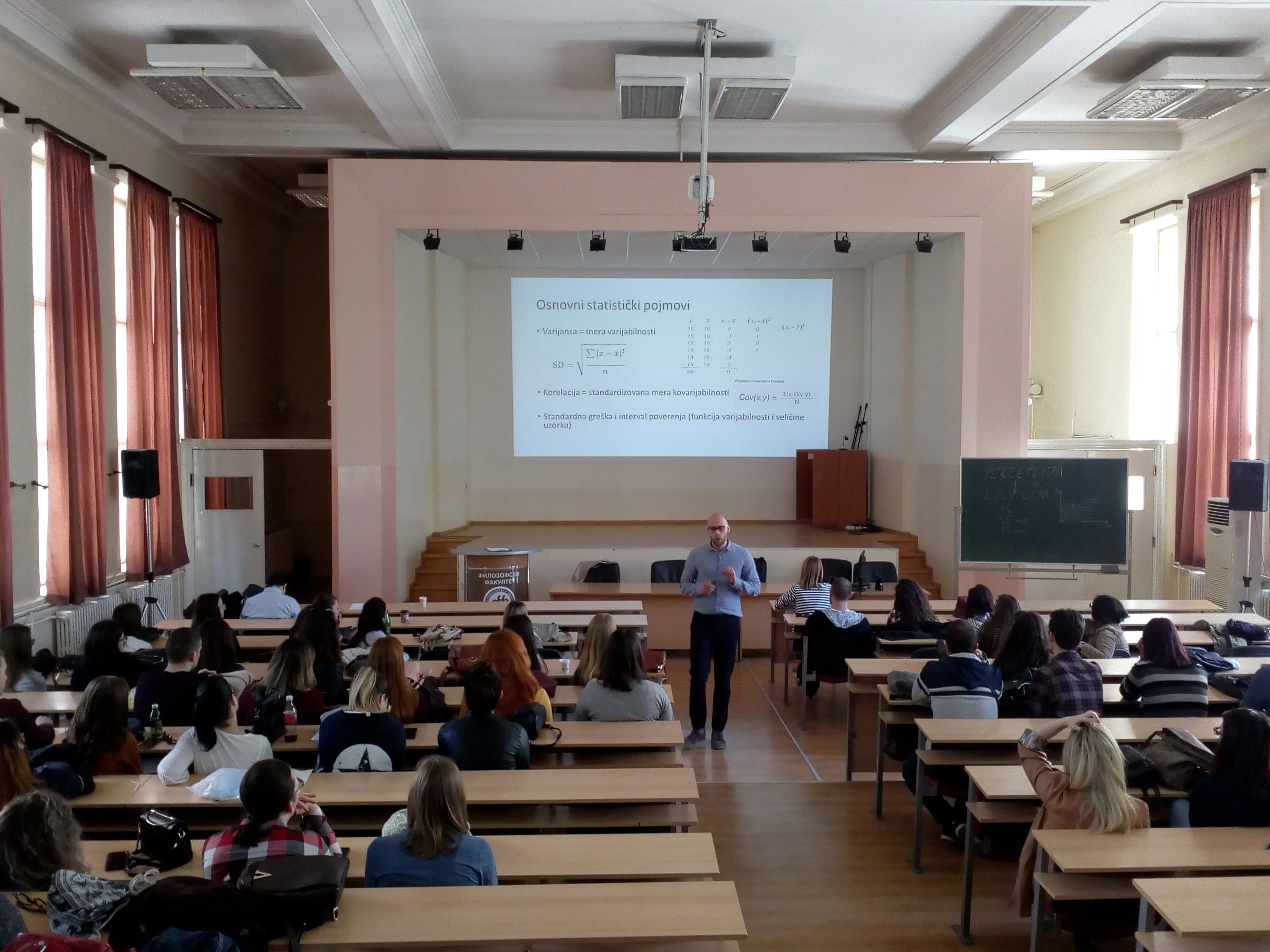
The following two lectures of the seminar dealt with topics from the fields of Linguistics and Cognitive Linguistics, and they were give on May 18th, 2019. The first lecture, titled THE AT-ISSUE STATUS OF NON-RESTRICTIVE RELATIVE CLAUSES: A CONTRASTIVE ANALYSIS OF ENGLISH AND SERBIAN, was given by Ema Živković, MA, English Department, Faculty of Philosophy, University of Niš.
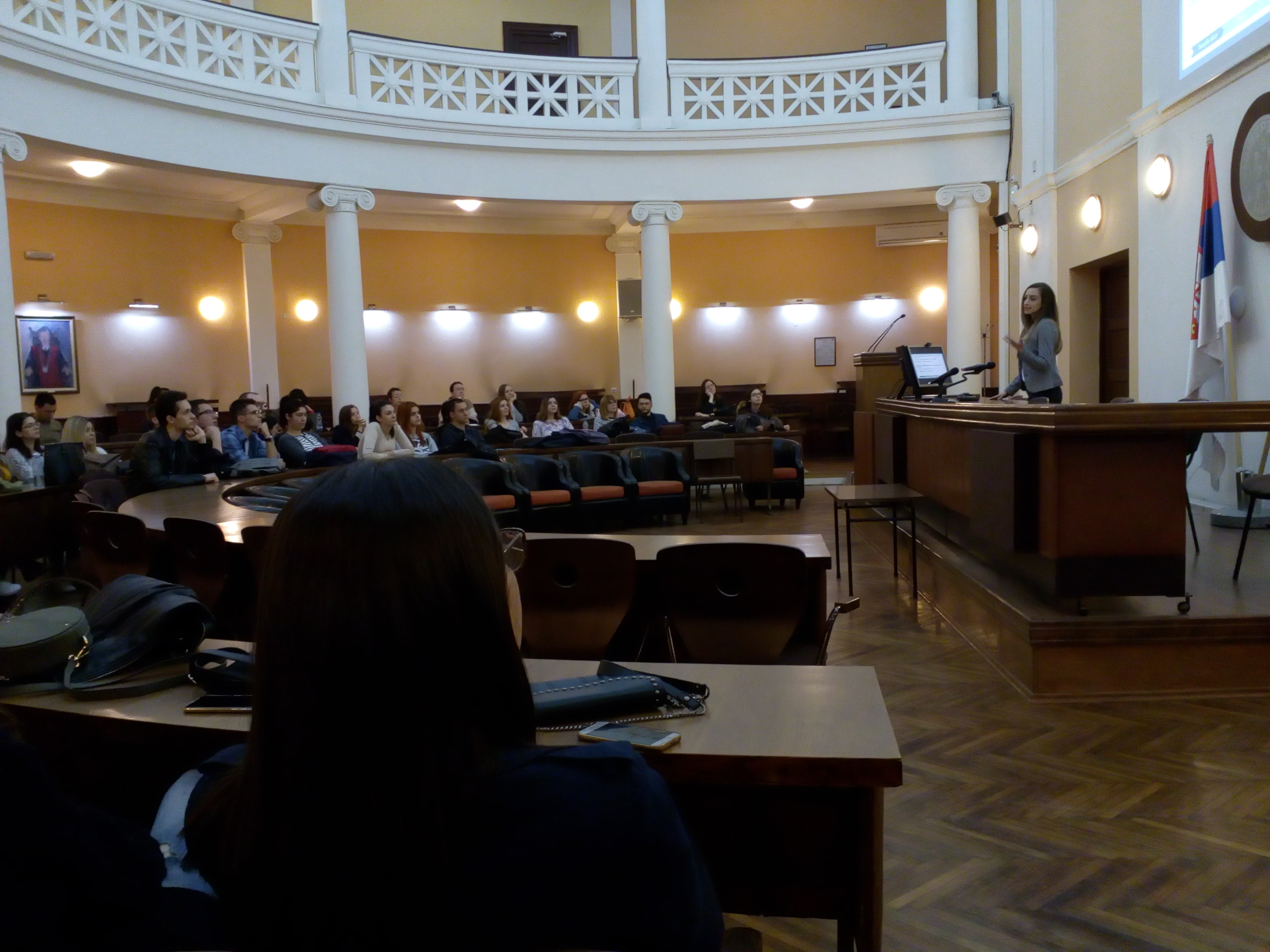

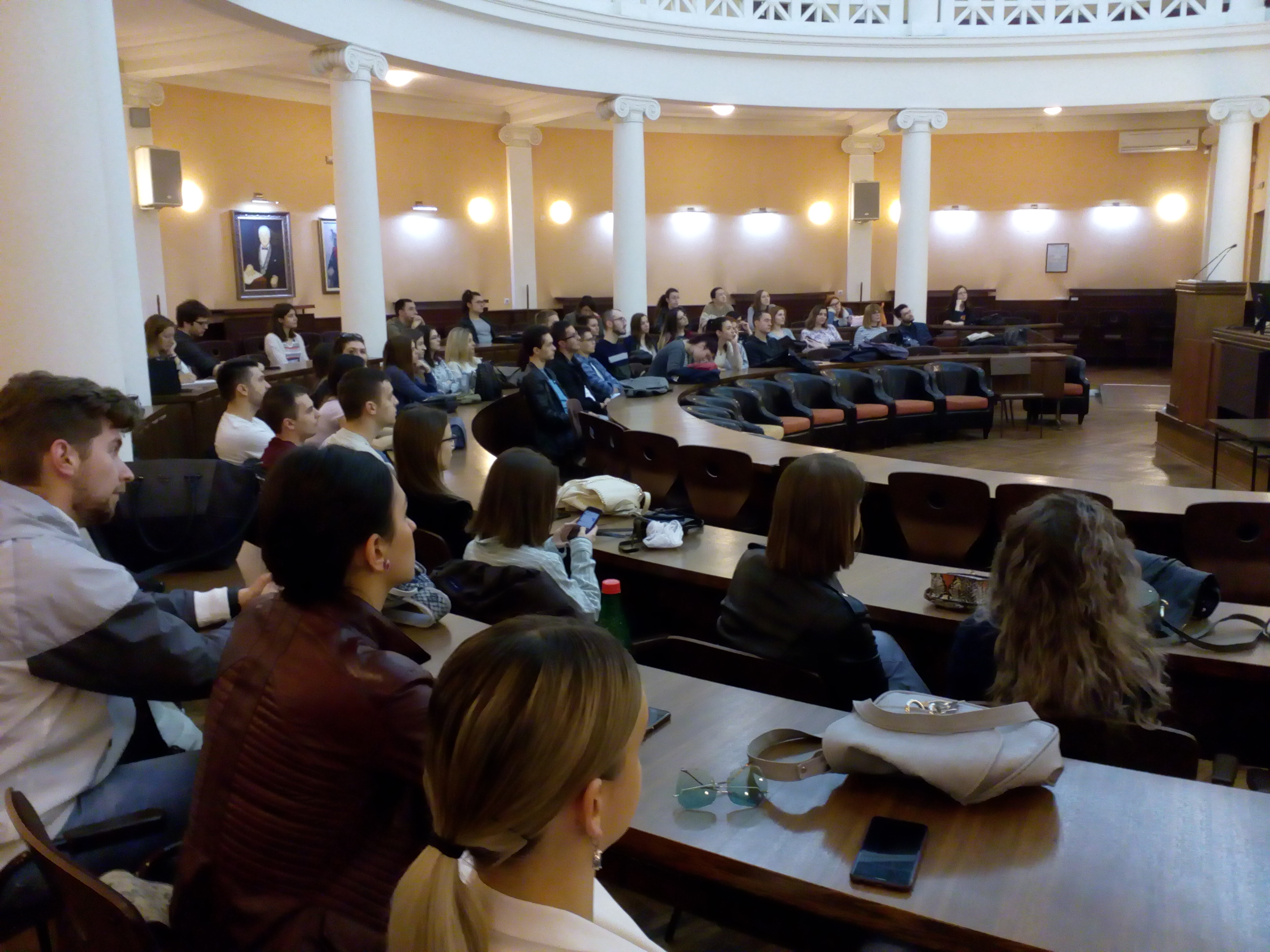
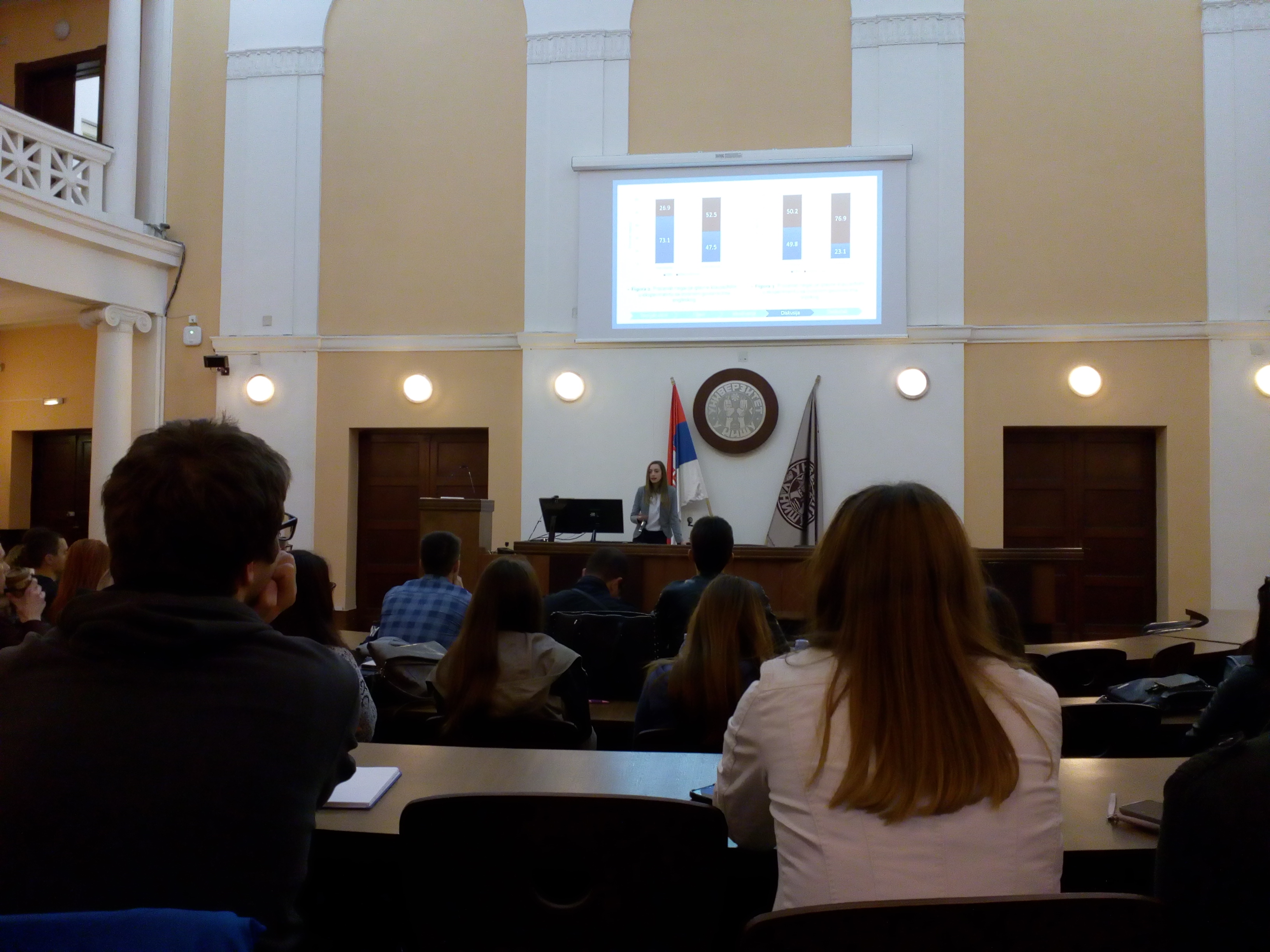
The second lecture was given by Mladen Popović, MA, English Department, Faculty of Philosophy, University of Niš, and it was titled PERSUASIVENESS OF AFFORDANCES IN VIDEO GAMES. Again, both lectures were followed by a detailed discussion.
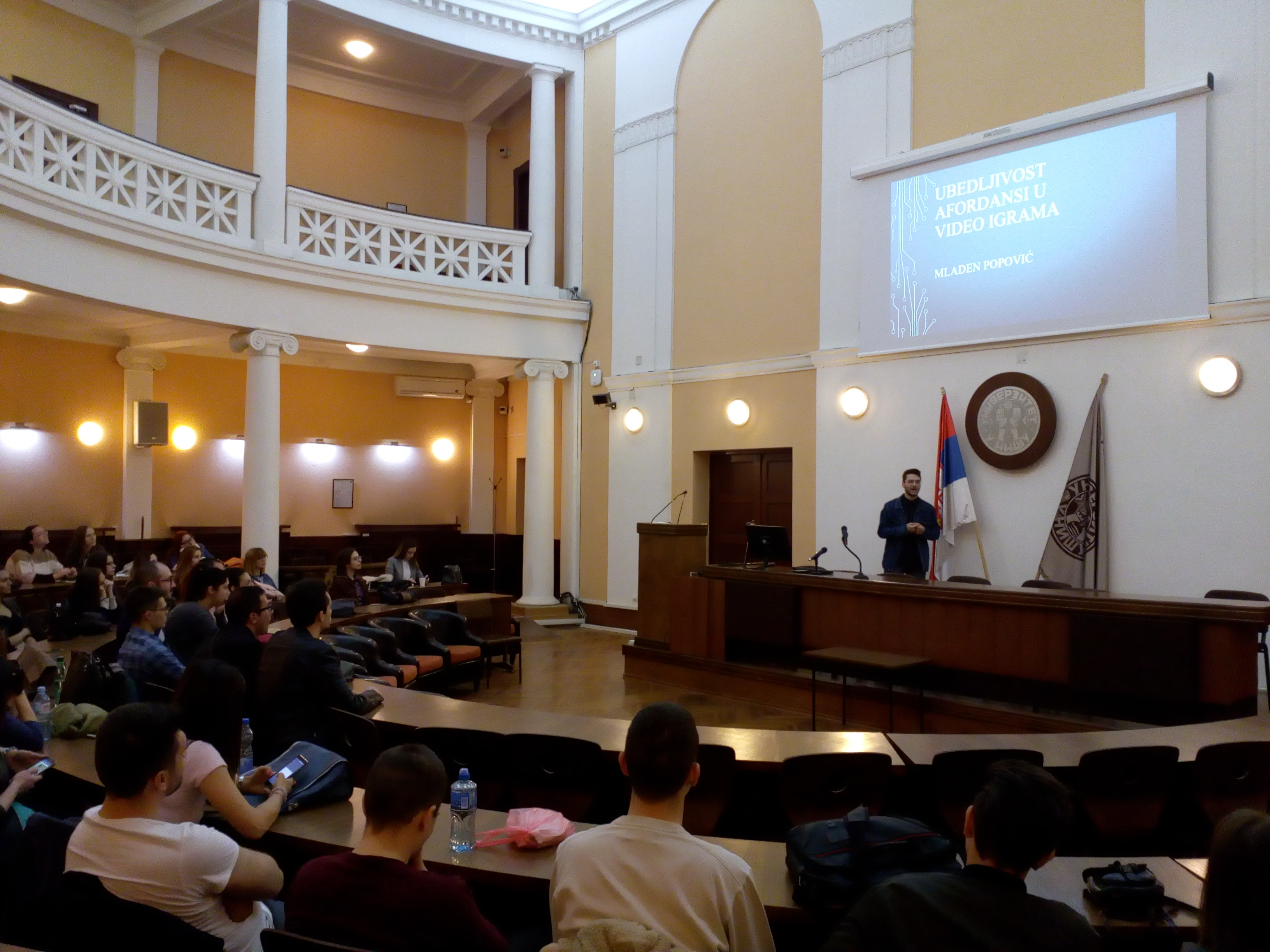
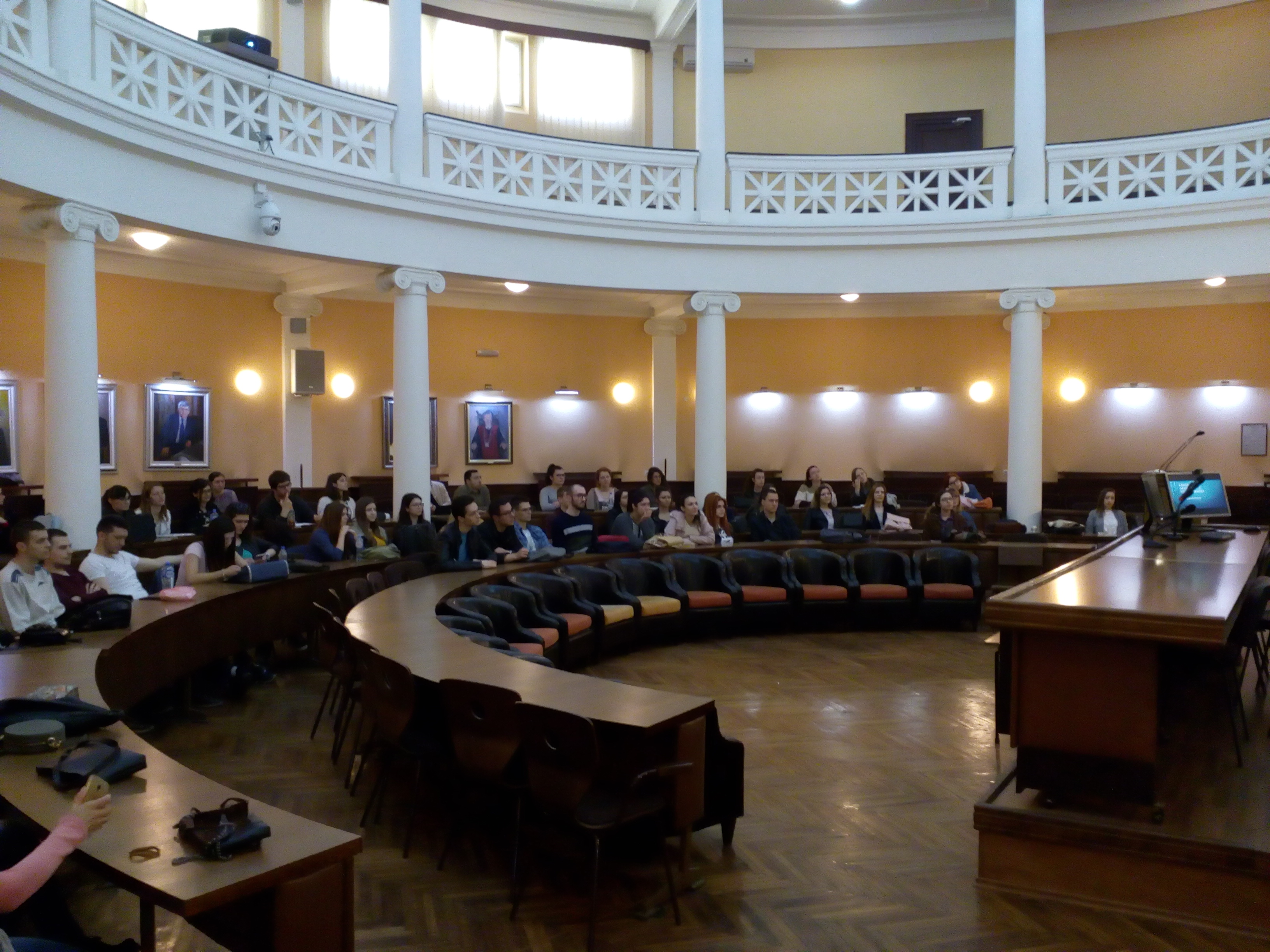
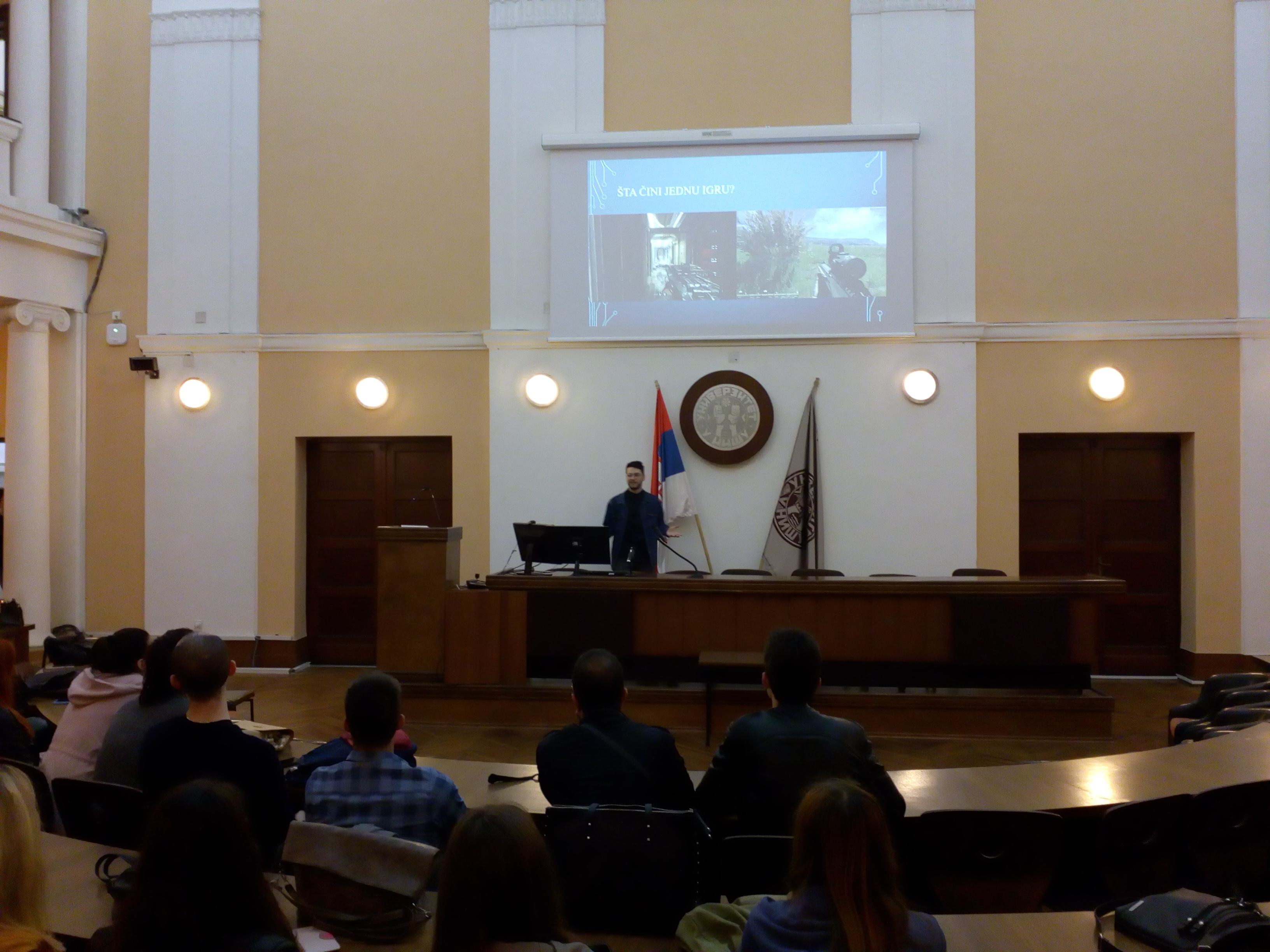
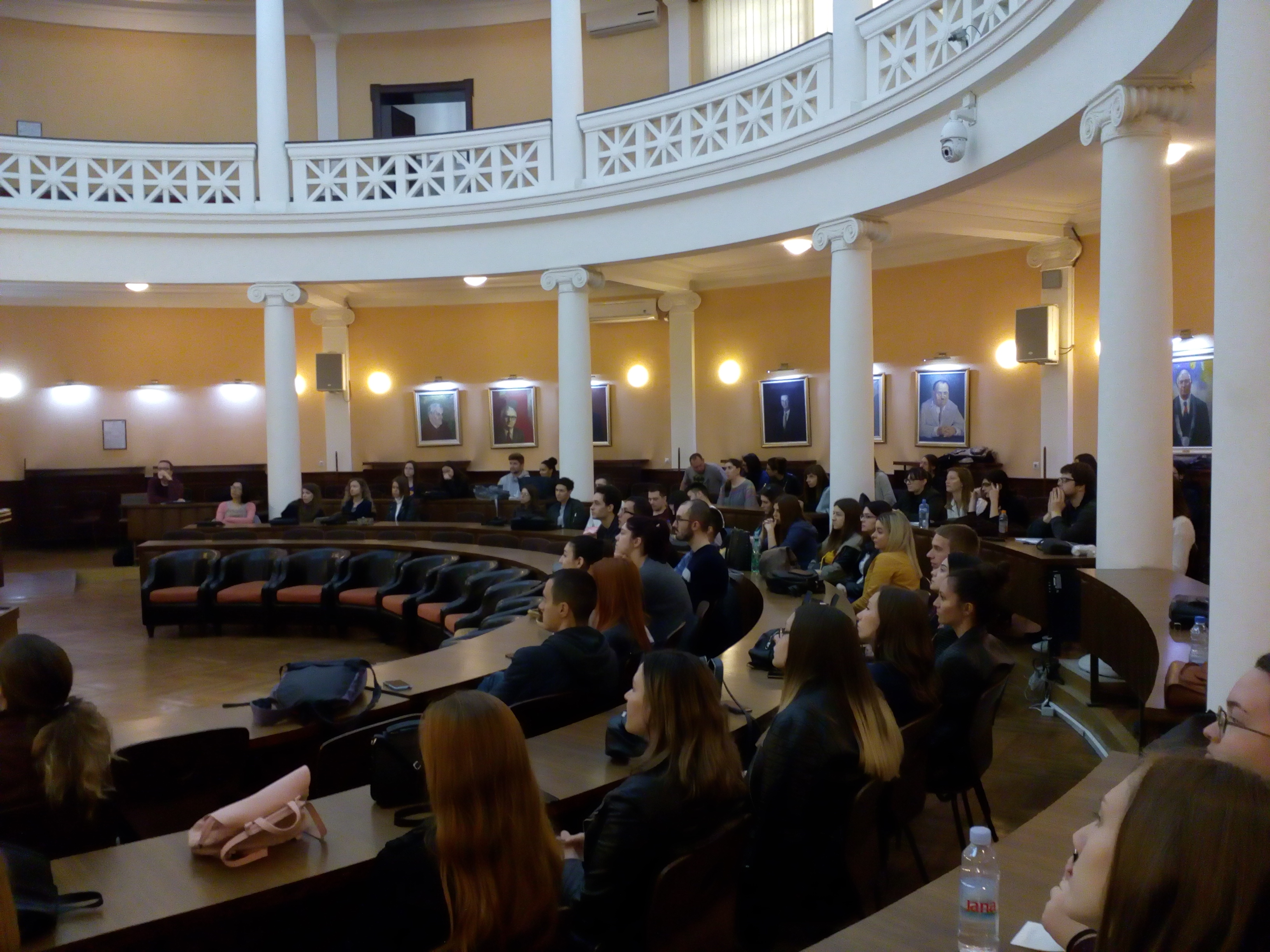
26 - 27 March 2019
Professor Popivanov's visit
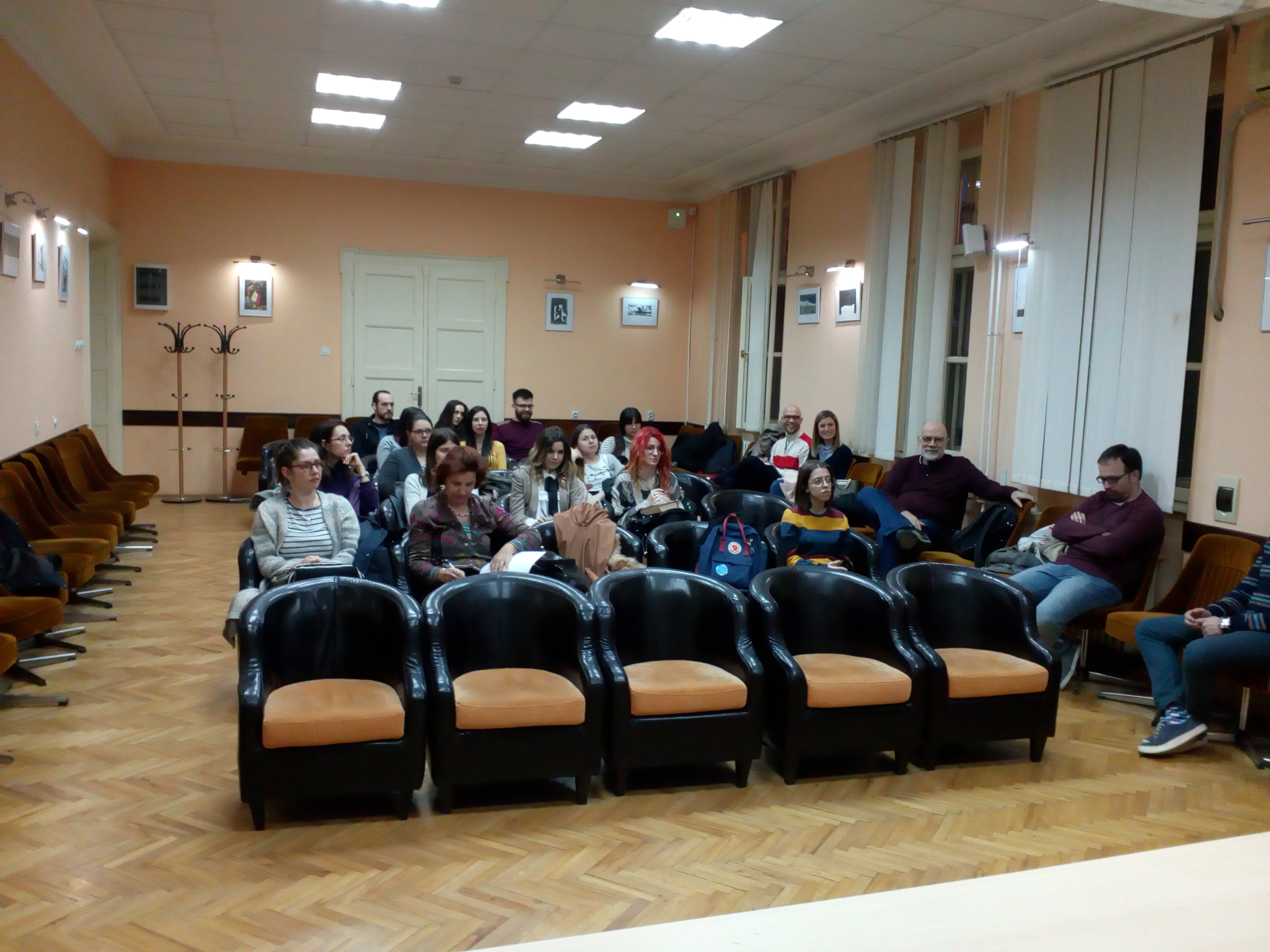
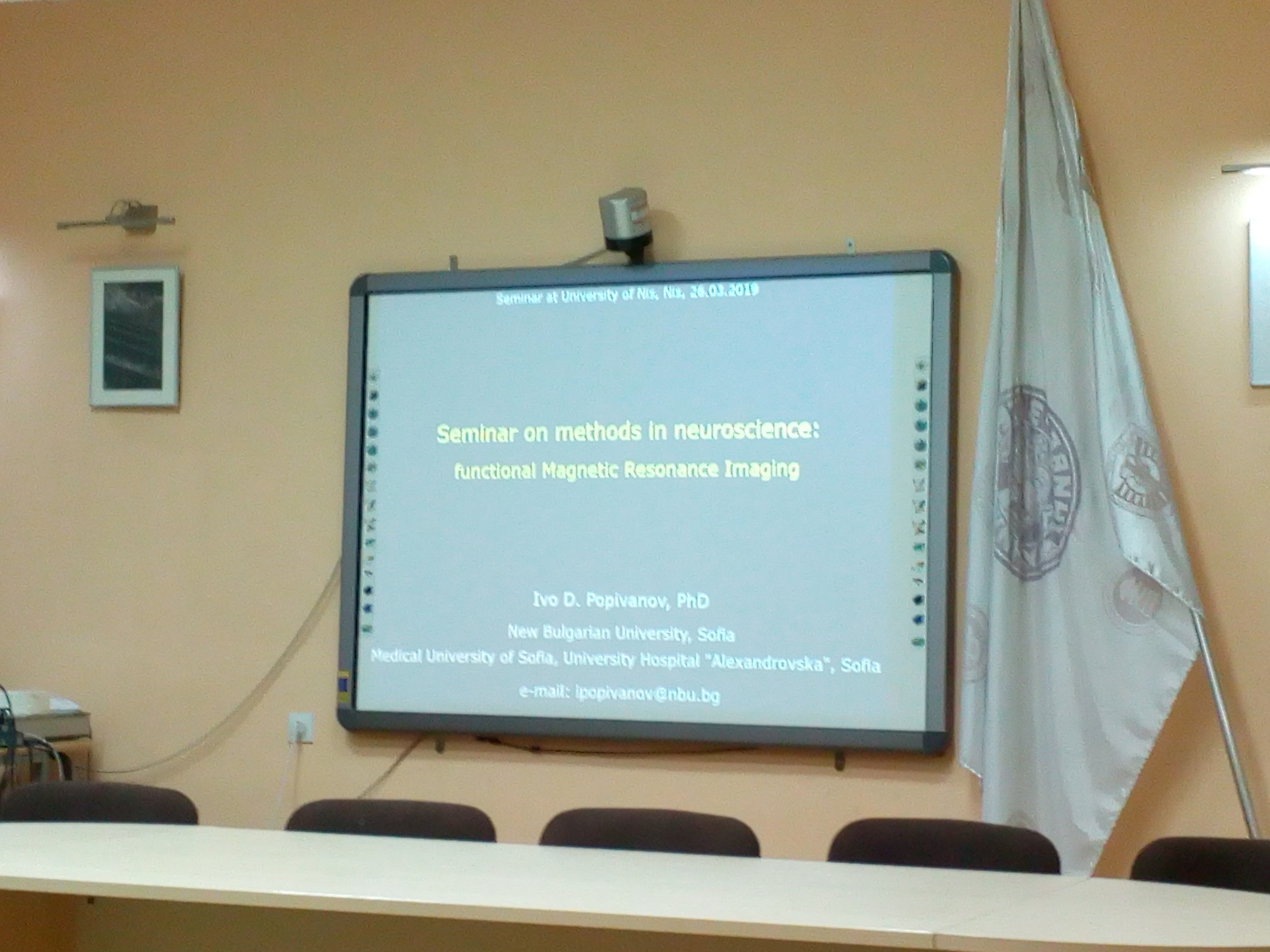
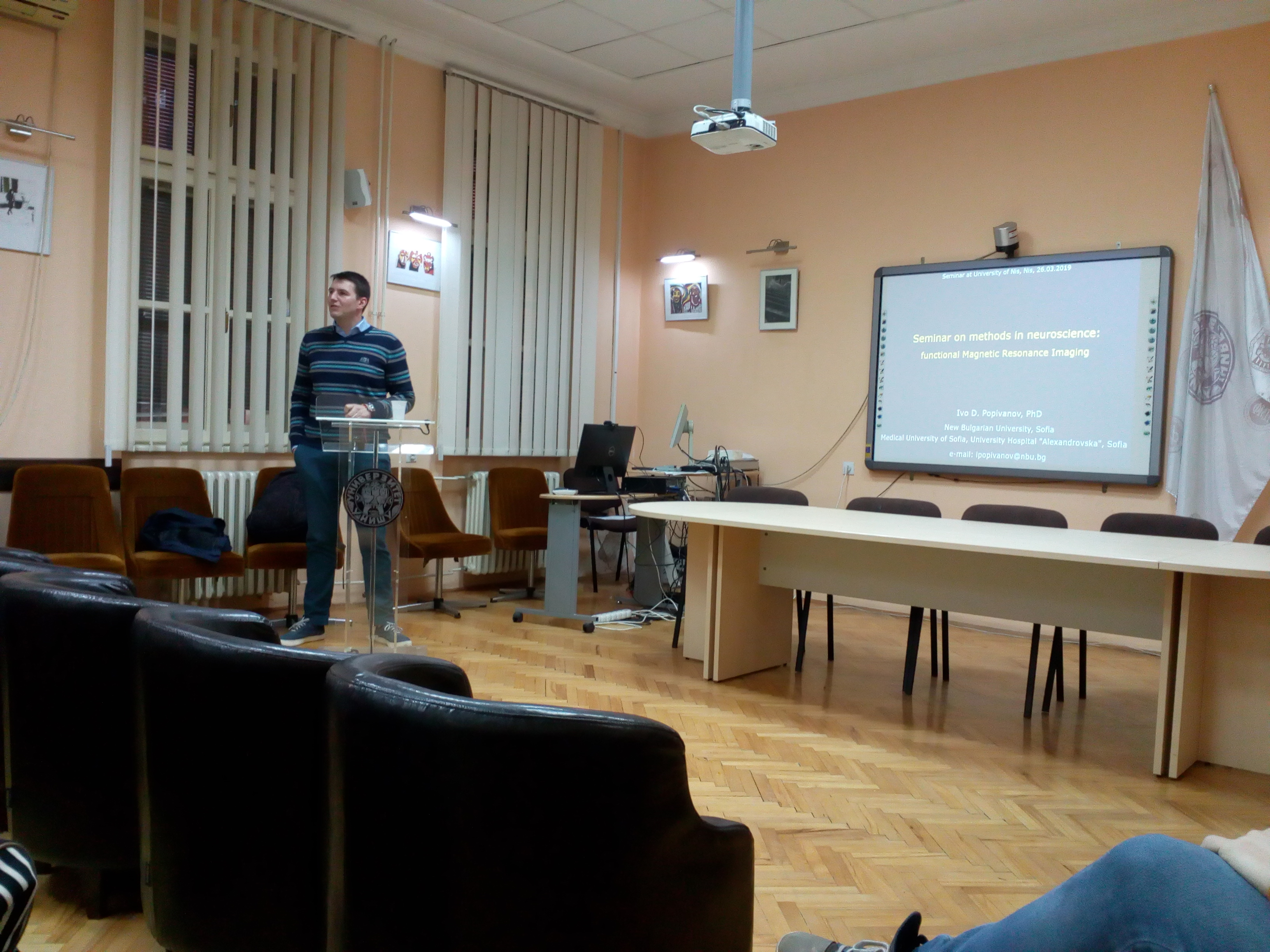
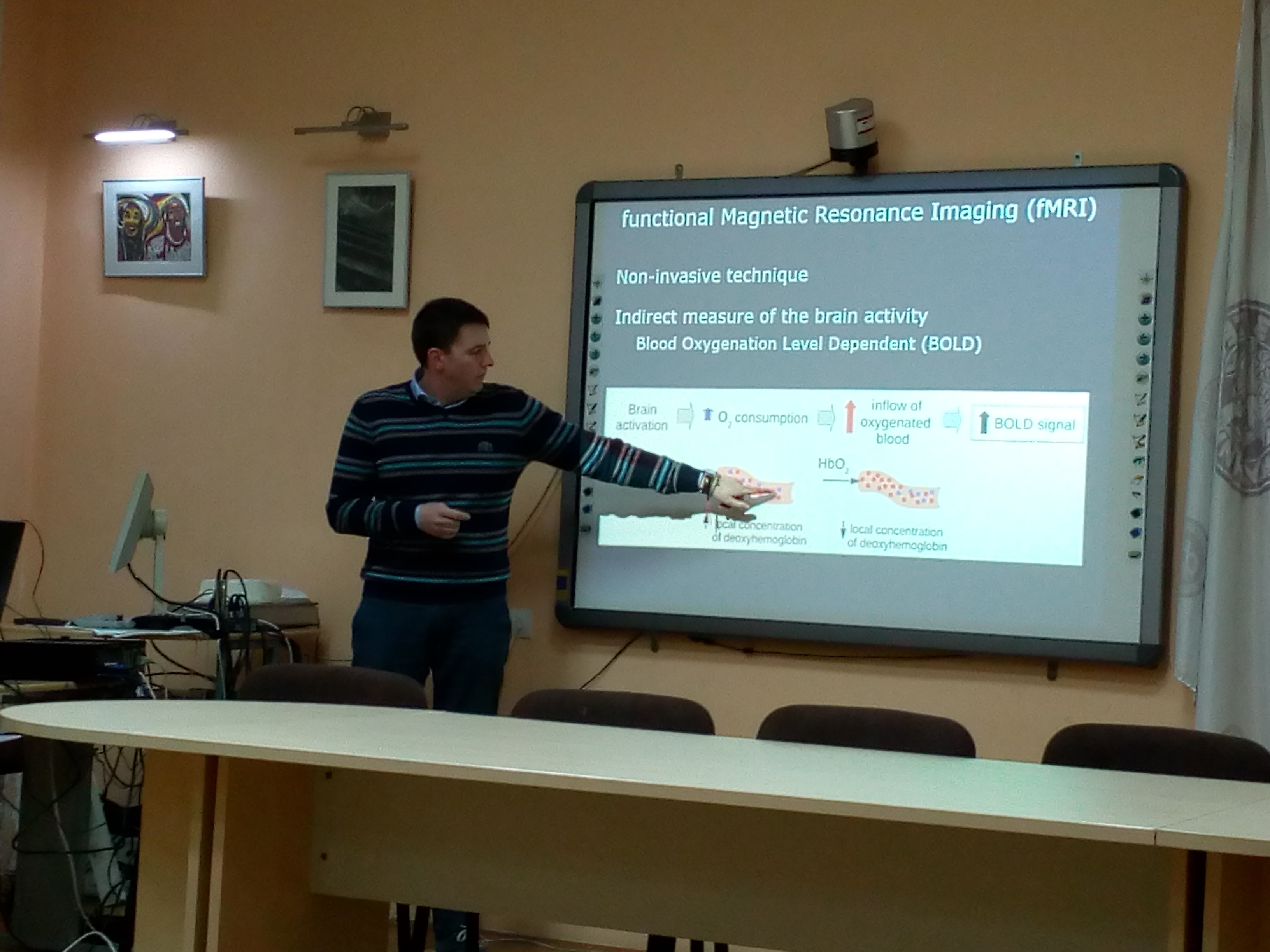
On Wednesday, March 27th, Professor Popivanov gave a lecture titled Neural representation of faces and bodies in primate inferotemporal cortex, which was also followed by a detailed discussion.
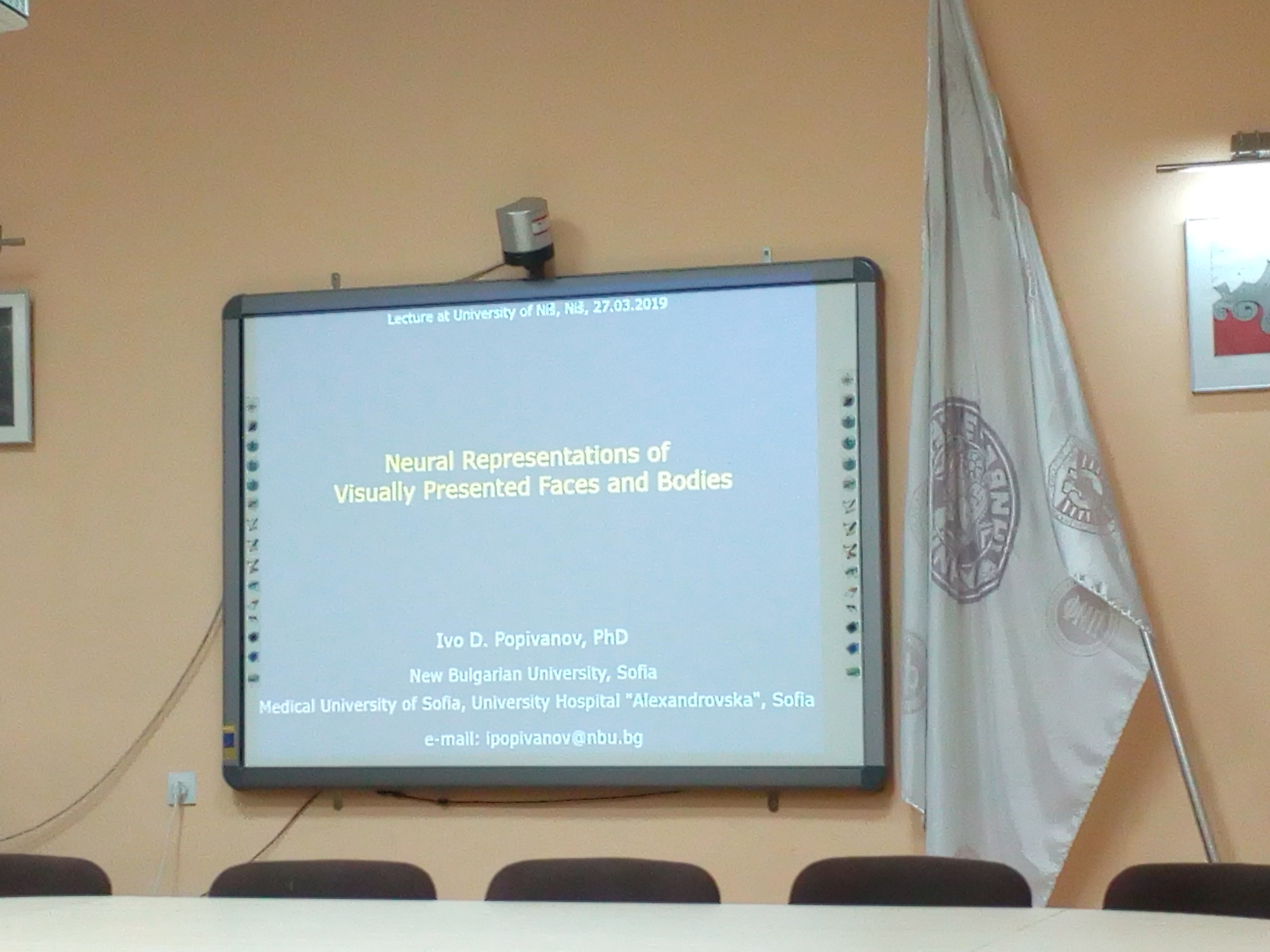
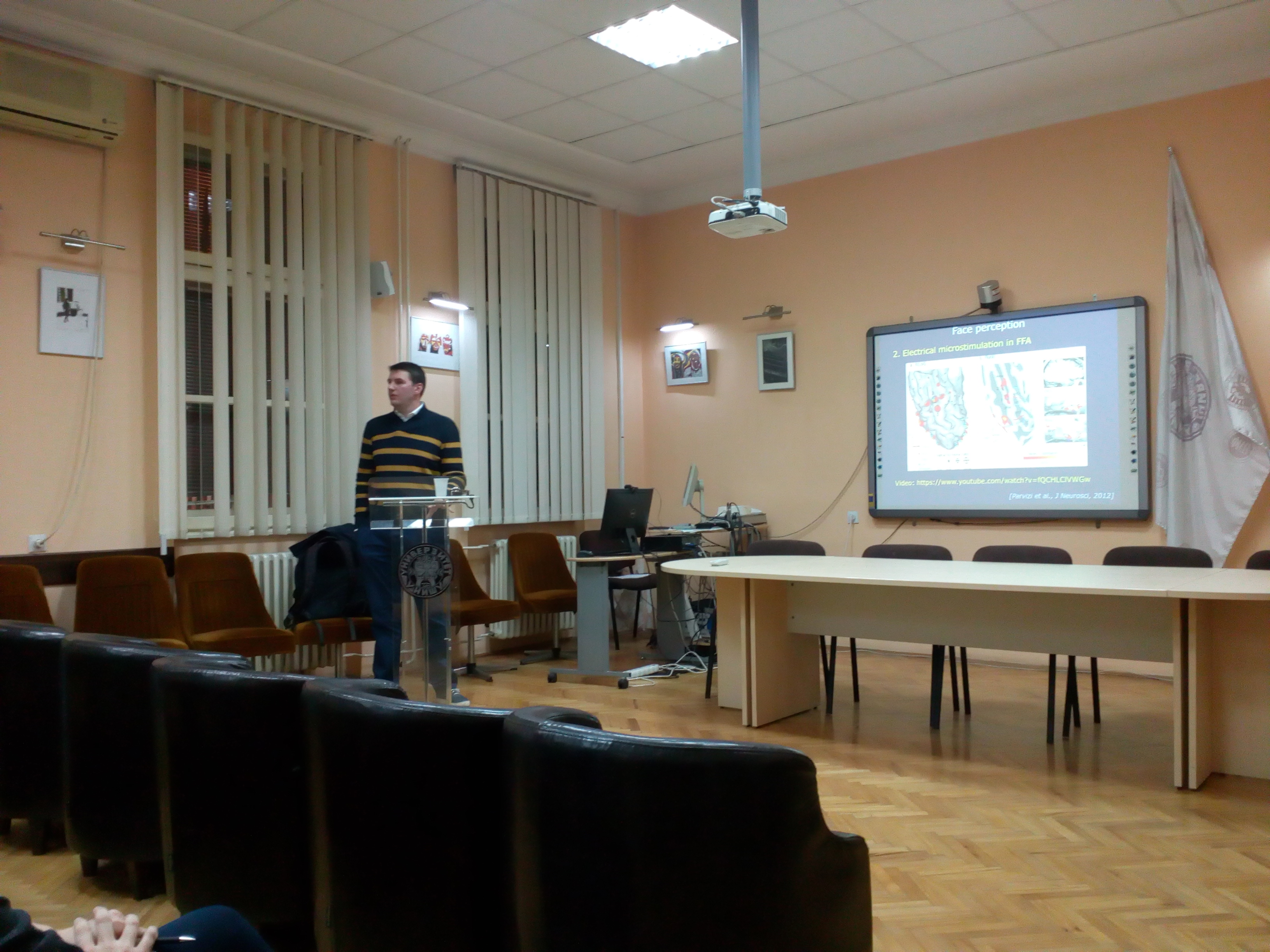
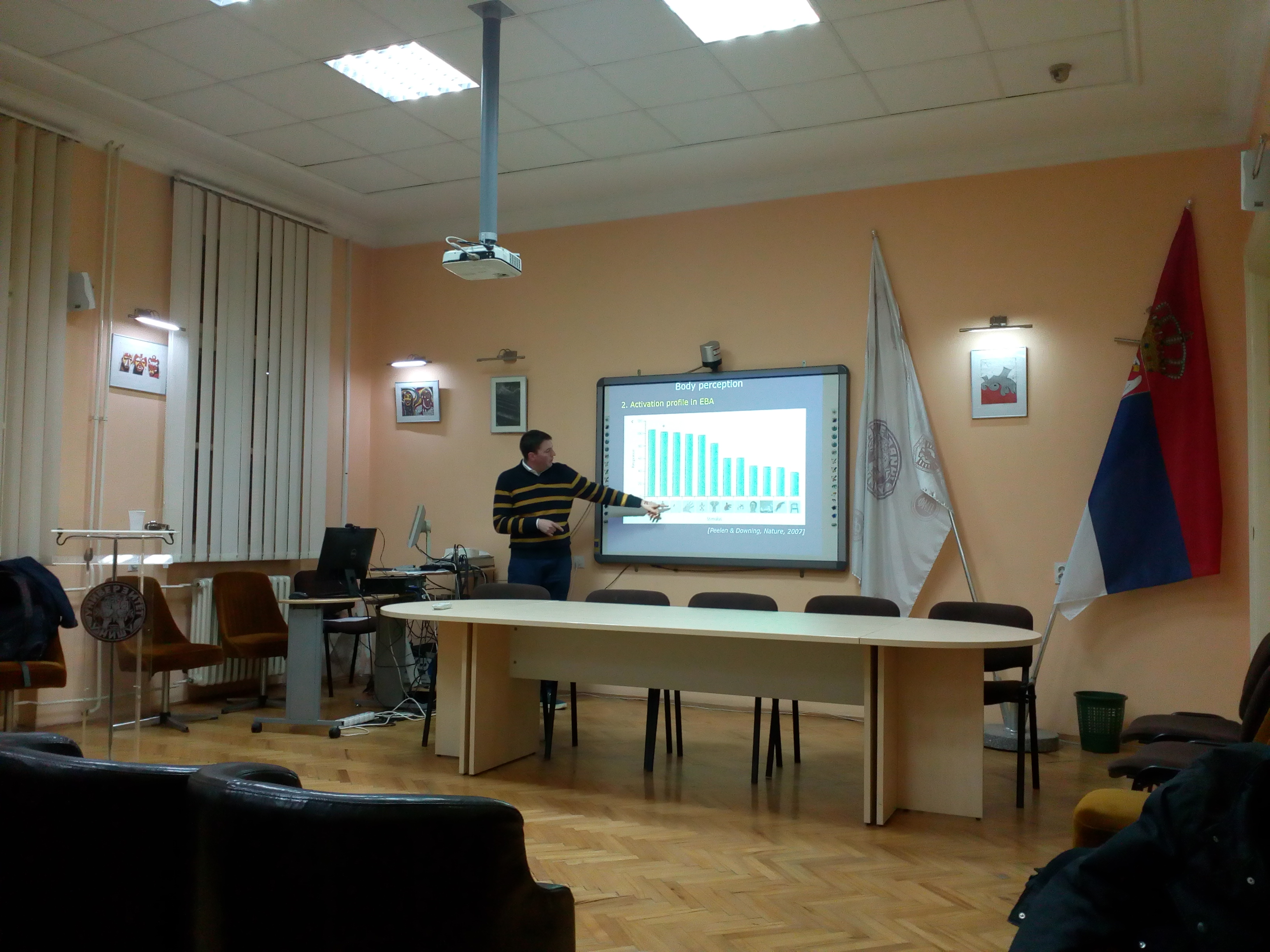
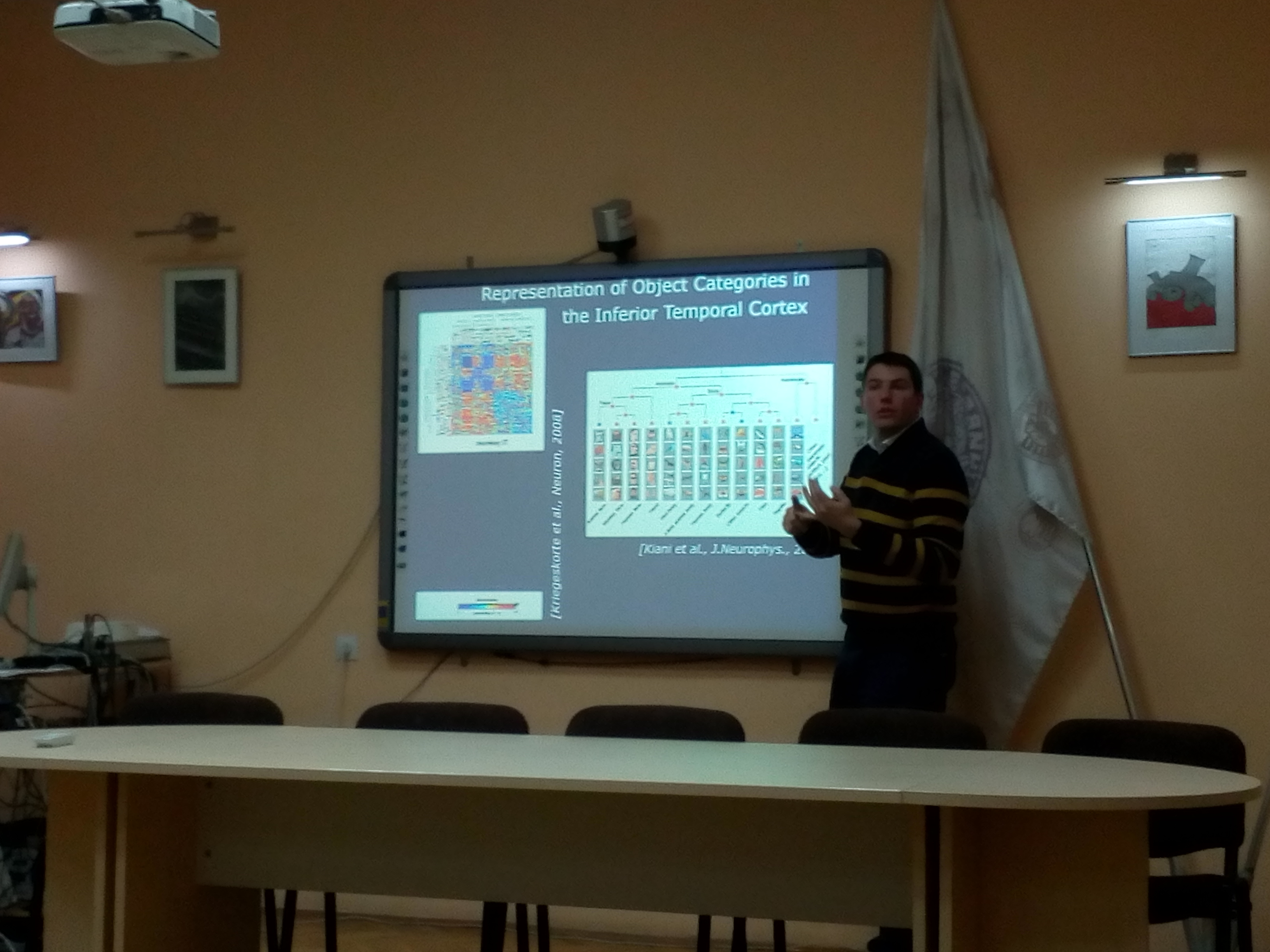
26 November 2018
Professor Vidanović's Lecture

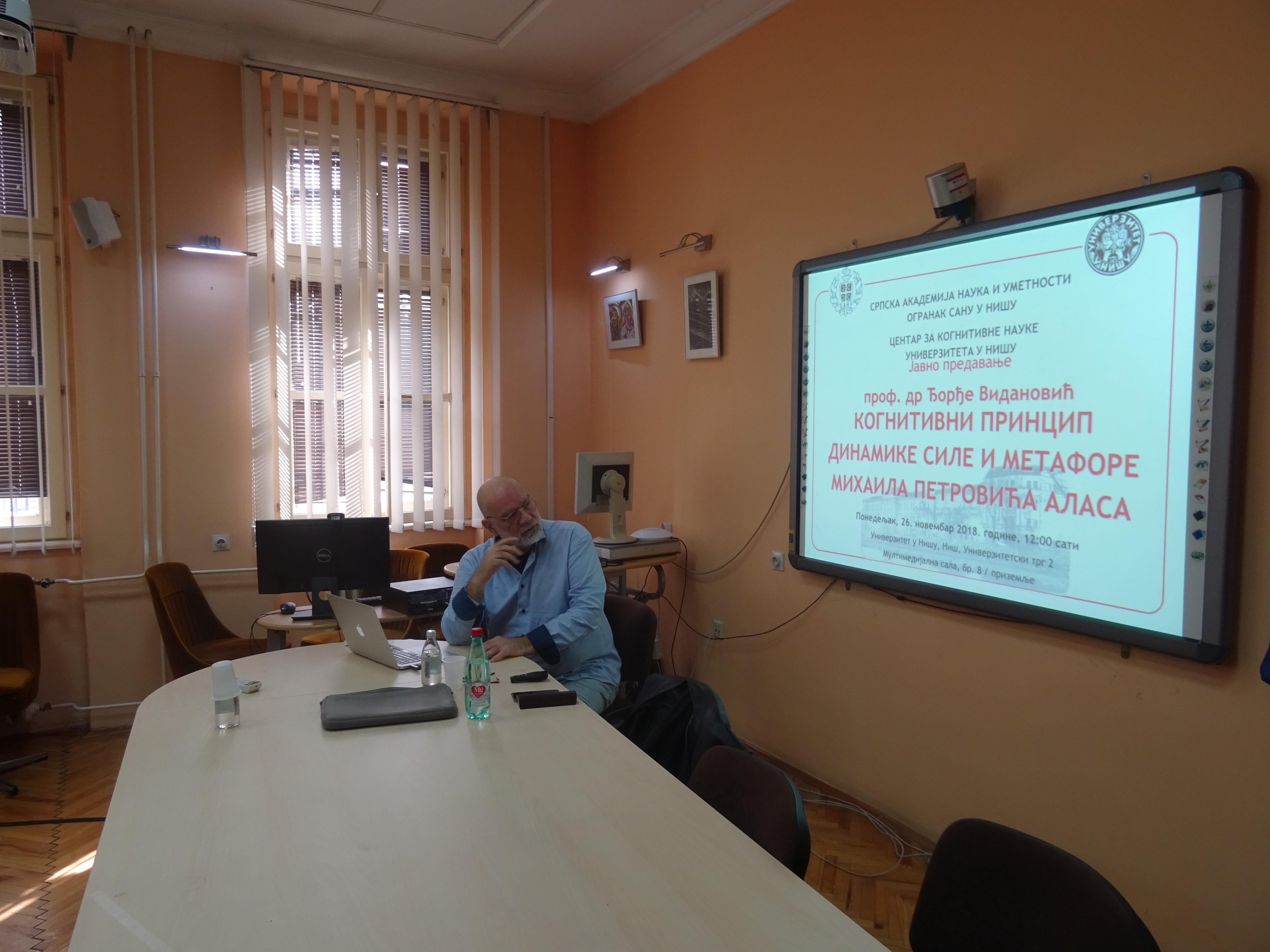
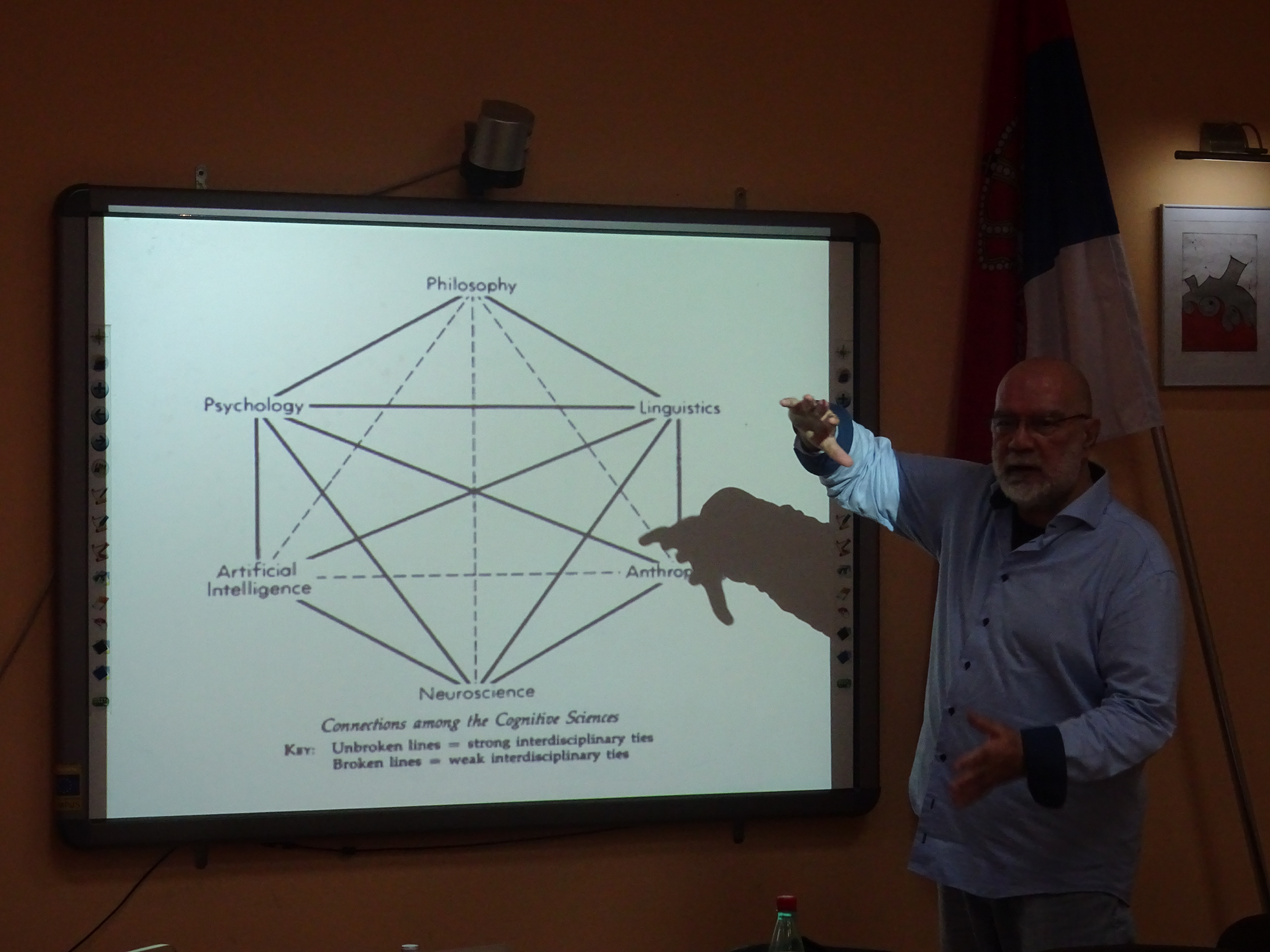
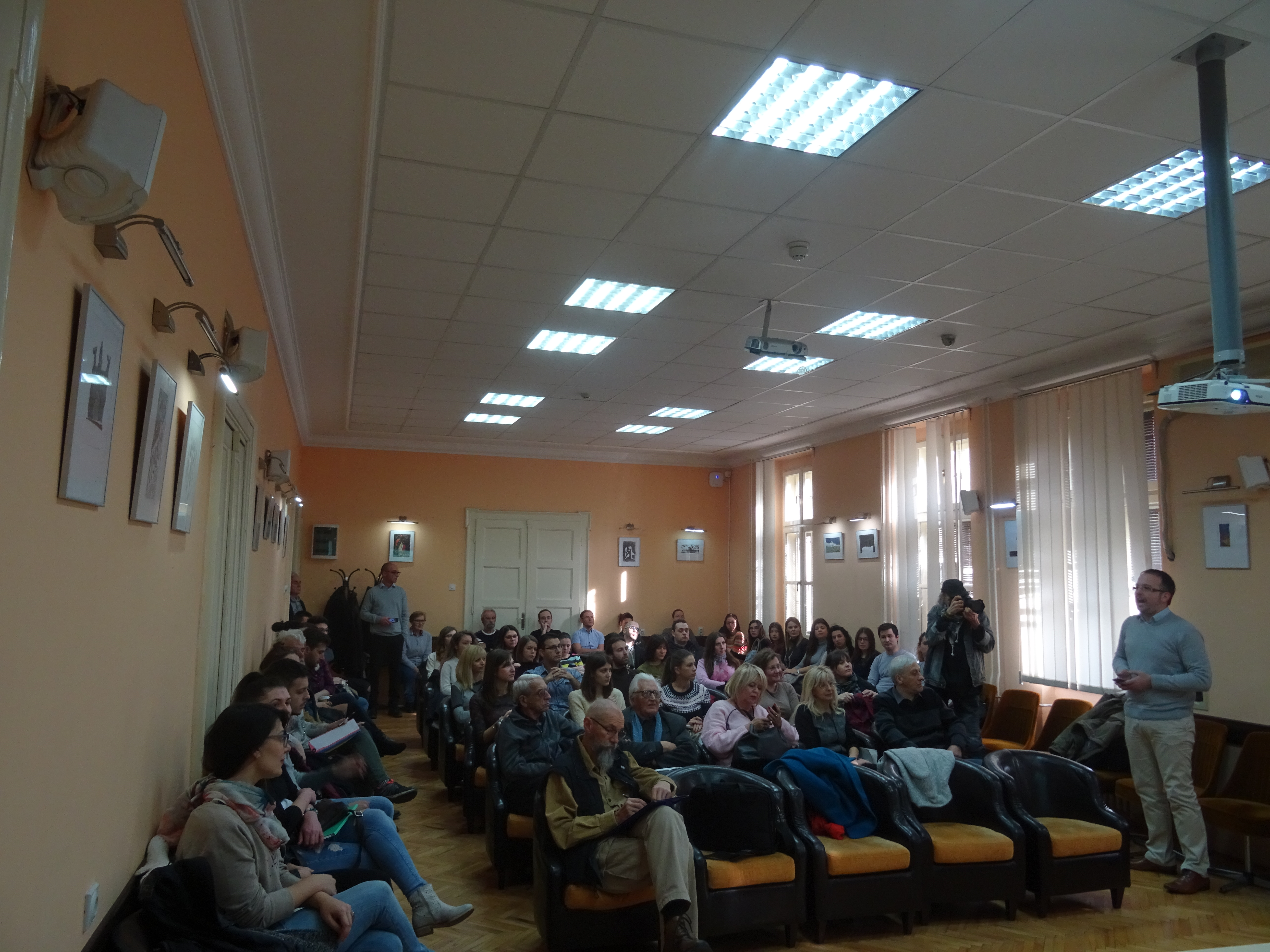
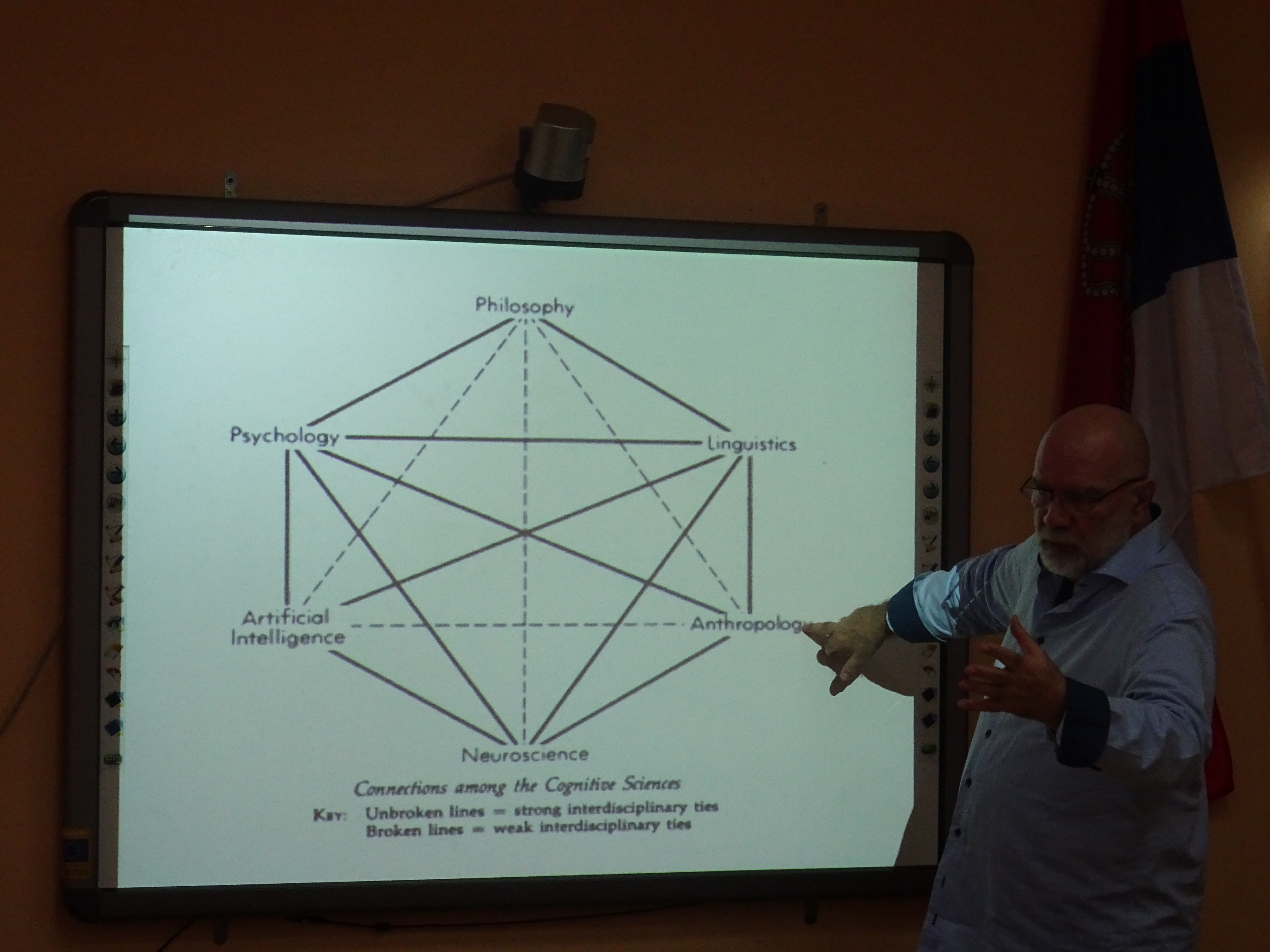
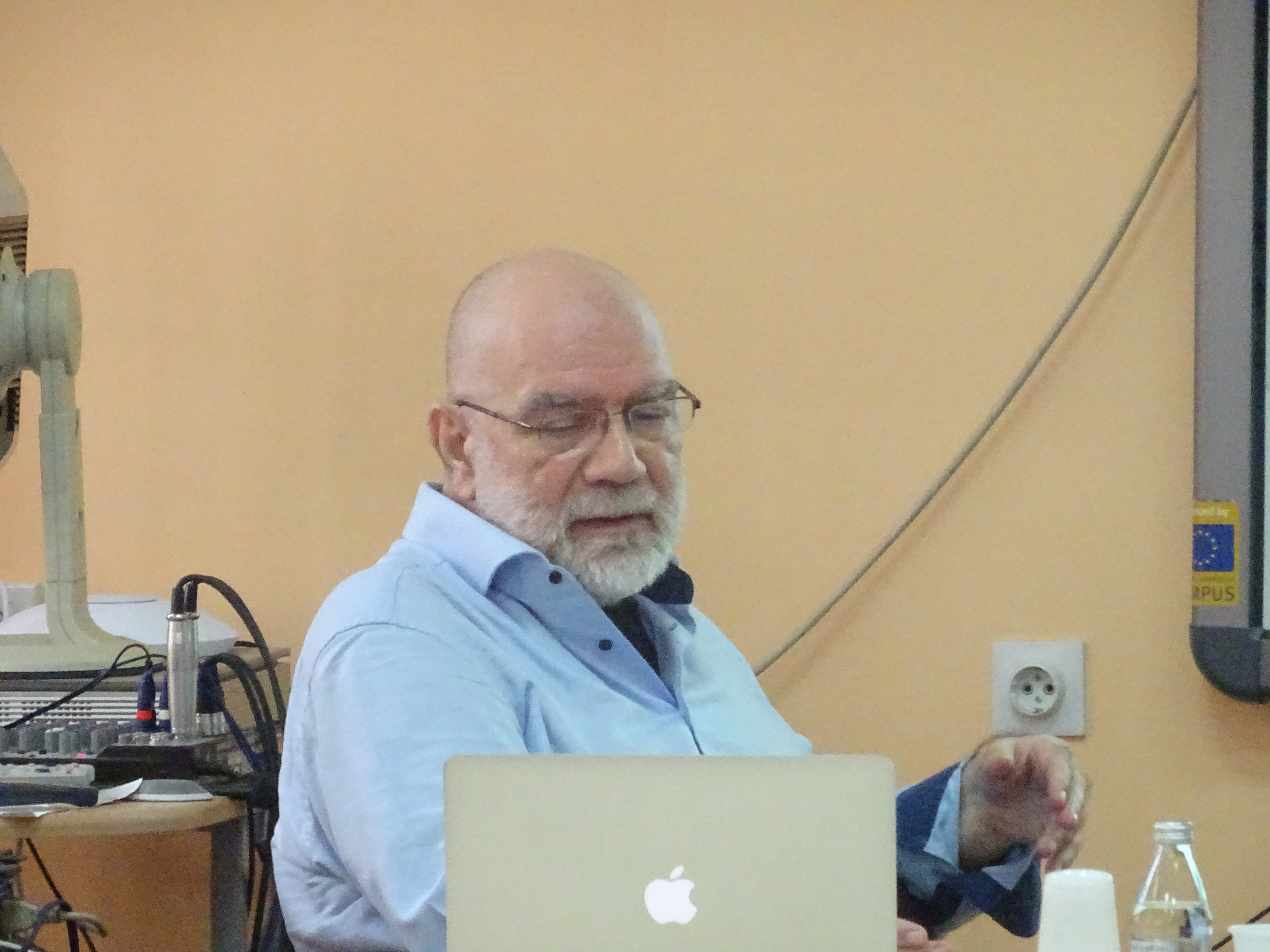
Professor Todd Oakley's visit
With Zlatev’s Sedimentation and Motivation Model as the starting point, the lecturer described the processes by which metaphors and analogies become conventionalized and later universalized; this description was followed by a depiction of these processes as they pertain to money – the example used was coin minting in ancient Greece. Further examples served as evidence that while commodity money (e.g. coins) does not have a culturally universal form, the notion of credit in terms of the debtor/creditor relationship is cross-cultural. The conclusion was that, although various authorities use appeals to essence via analogy to legitimize their forms of commodity money, the functional purpose of money is far more pedestrian, i.e. that it serves as an accounting method. Given that the lecture also pertained to the relationship between money and authority, it gave way to a discussion on the various implications given, ranging from the rhetorical ones to those related to cryptocurrencies.
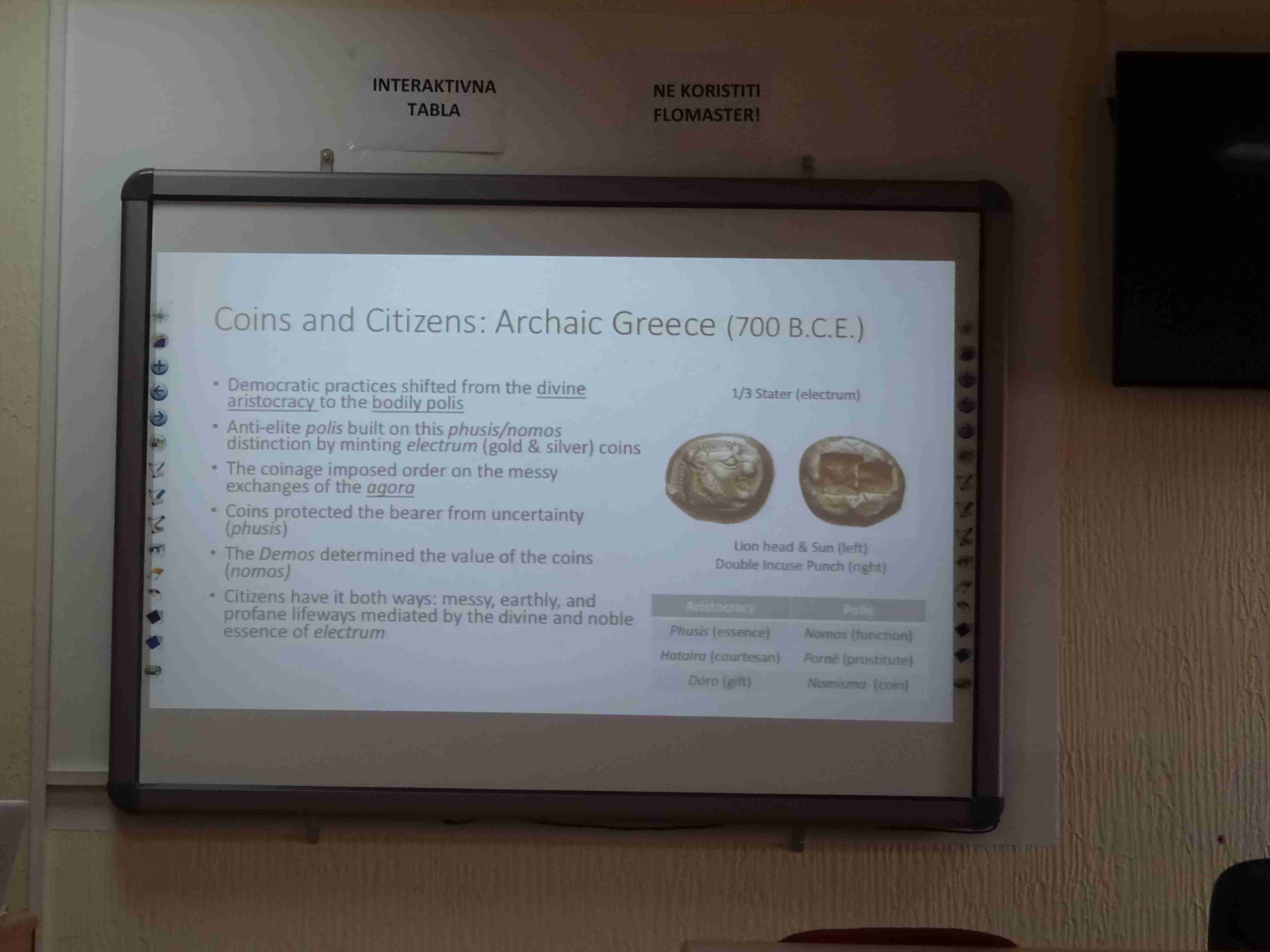
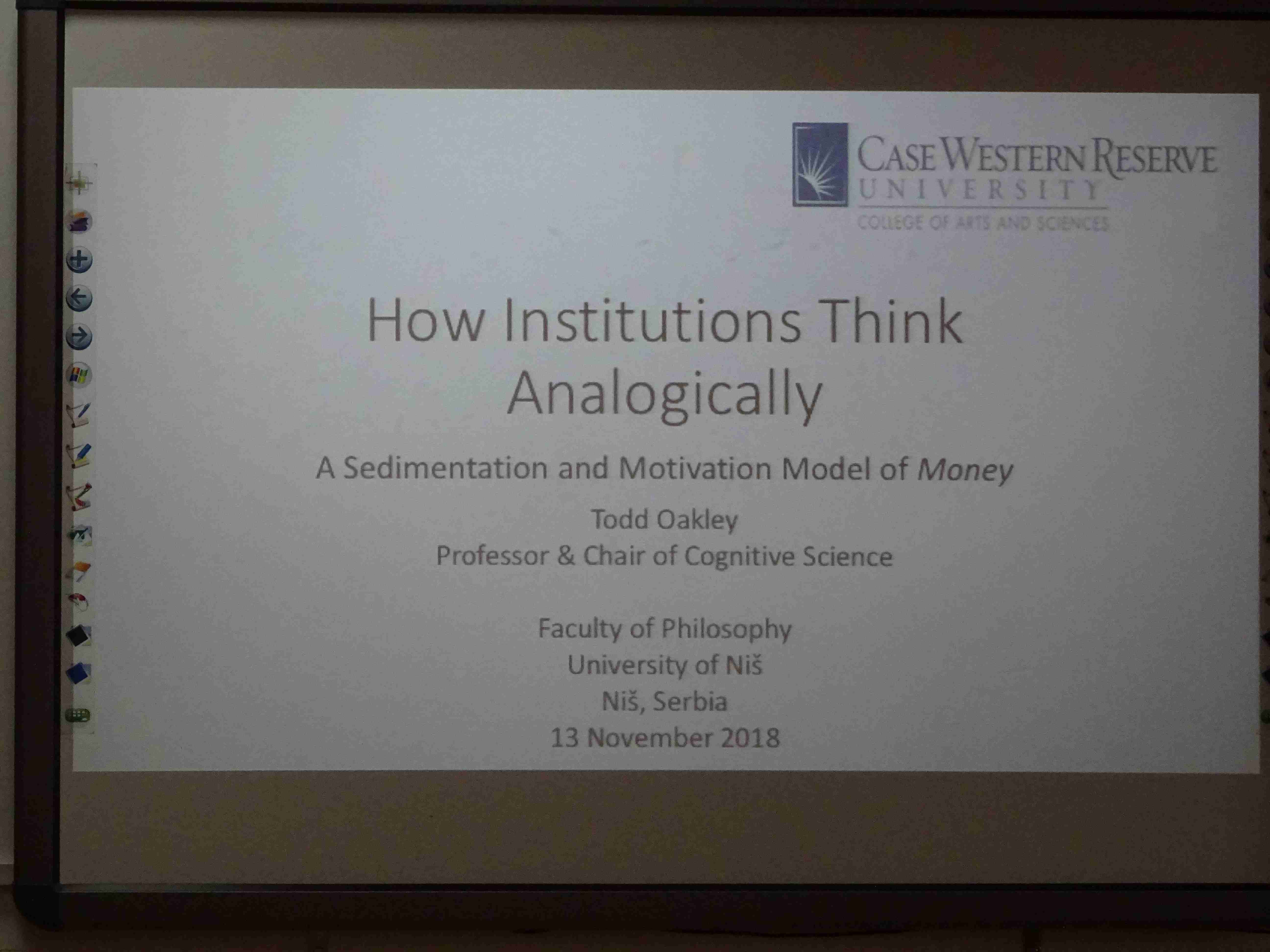
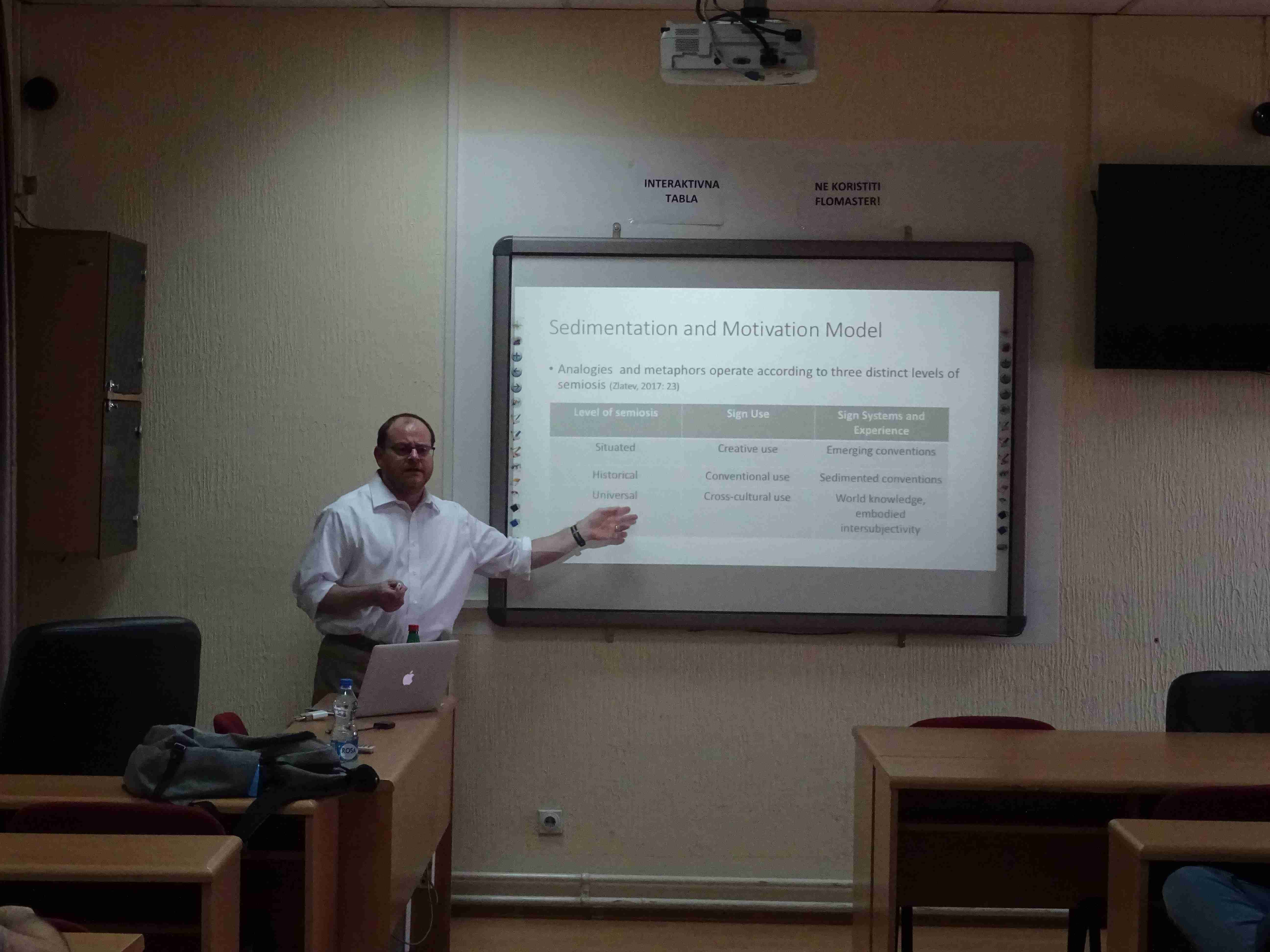
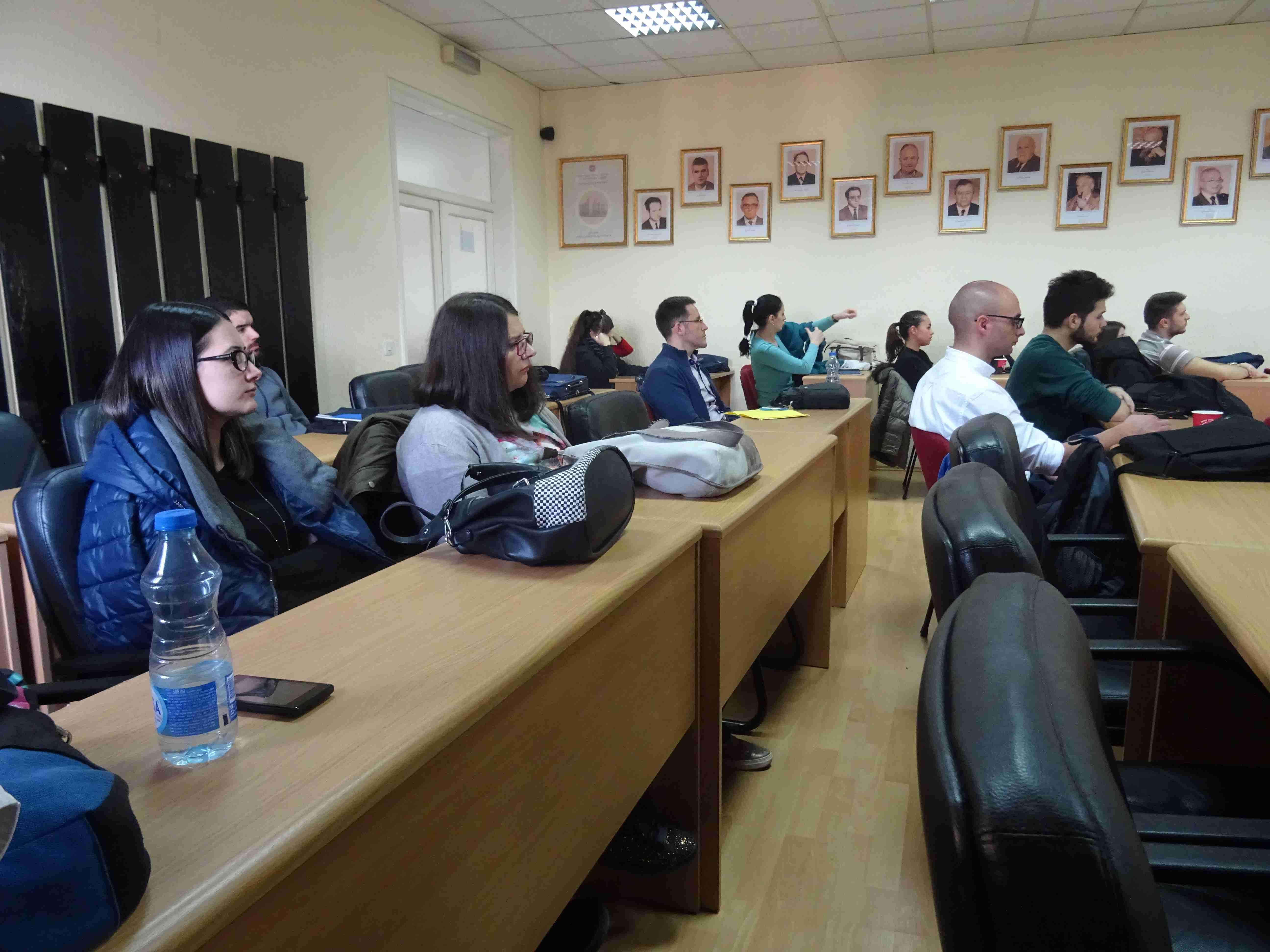
On Wednesday, November 14th, 2018, Professor Todd Oakley delivered the second of the two lectures during his visit to the Center for Cognitive Sciences, titled Representation and the Semiotic Circuit: Hypotyposic abstraction as a Human Singularity.
The first point of the lecture was the clarification of the meaning of the term representation in semiotics, as the term has come to be increasingly misused. Following the first segment, the notion of the semiotic circuit was presented by the lecturer, with emphasis on the fact that each species has its own circuit, and that the circuit varies in complexity from one species to another. The examples given were earthworms, vervet monkeys, and humans. The varying degrees of complexity were illustrated by the semiotic circuit of earthworms primarily facilitating sunlight avoidance, and by the fact that vervet monkeys may even use theirs to deceive their fellow troop members using predator alert signals. The key difference between vervet monkeys as representatives of higher mammals and humans was that, while monkeys do have an extraordinary capacity for hypostatic abstraction, this capacity in humans becomes the capacity for hypotypostic abstraction due to man’s capacity for considering hypotetical situations. The lecture was followed by a round of questions and discussion, primarily as the audience was familiar with language ability experiments on primates.
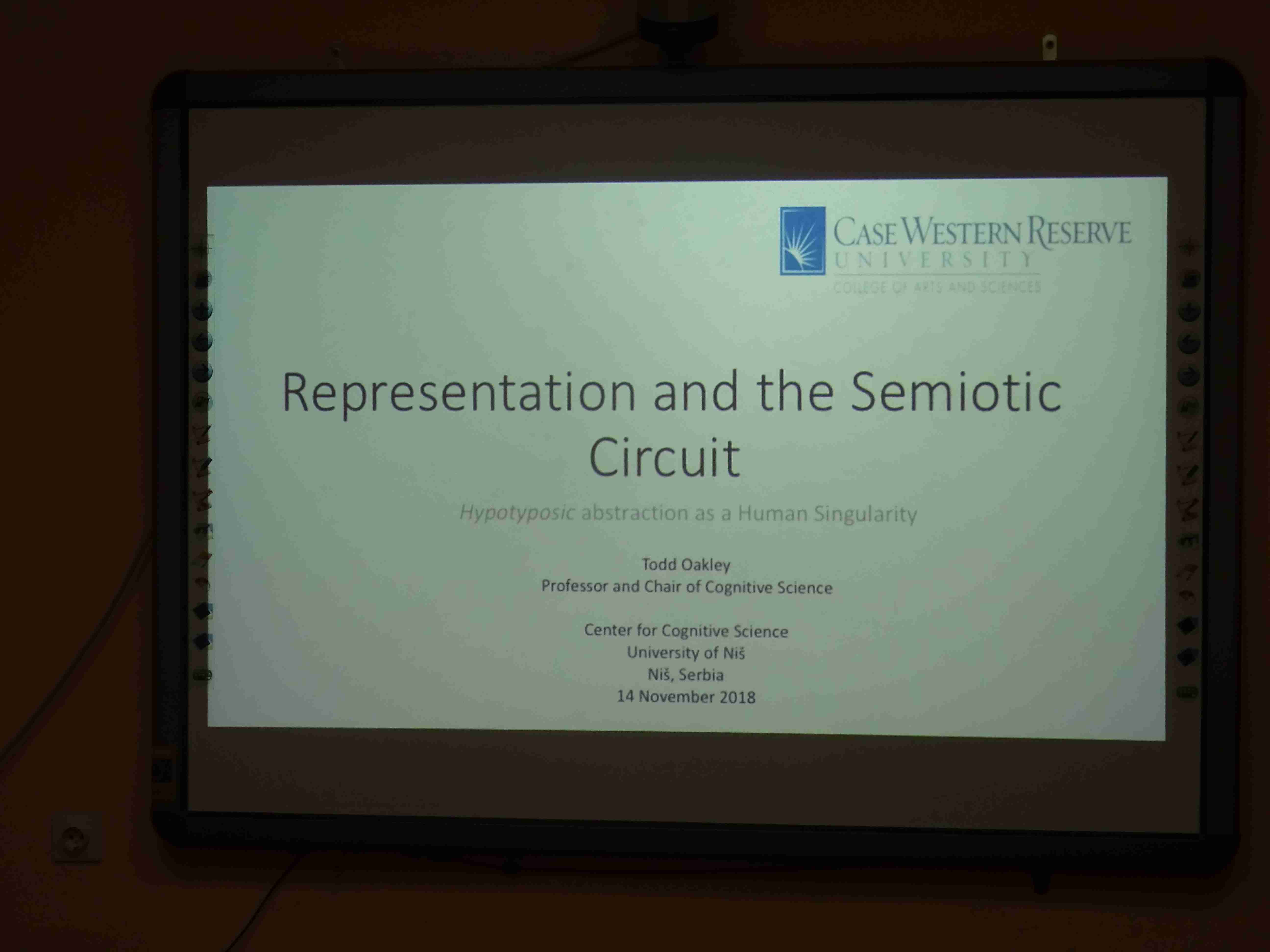
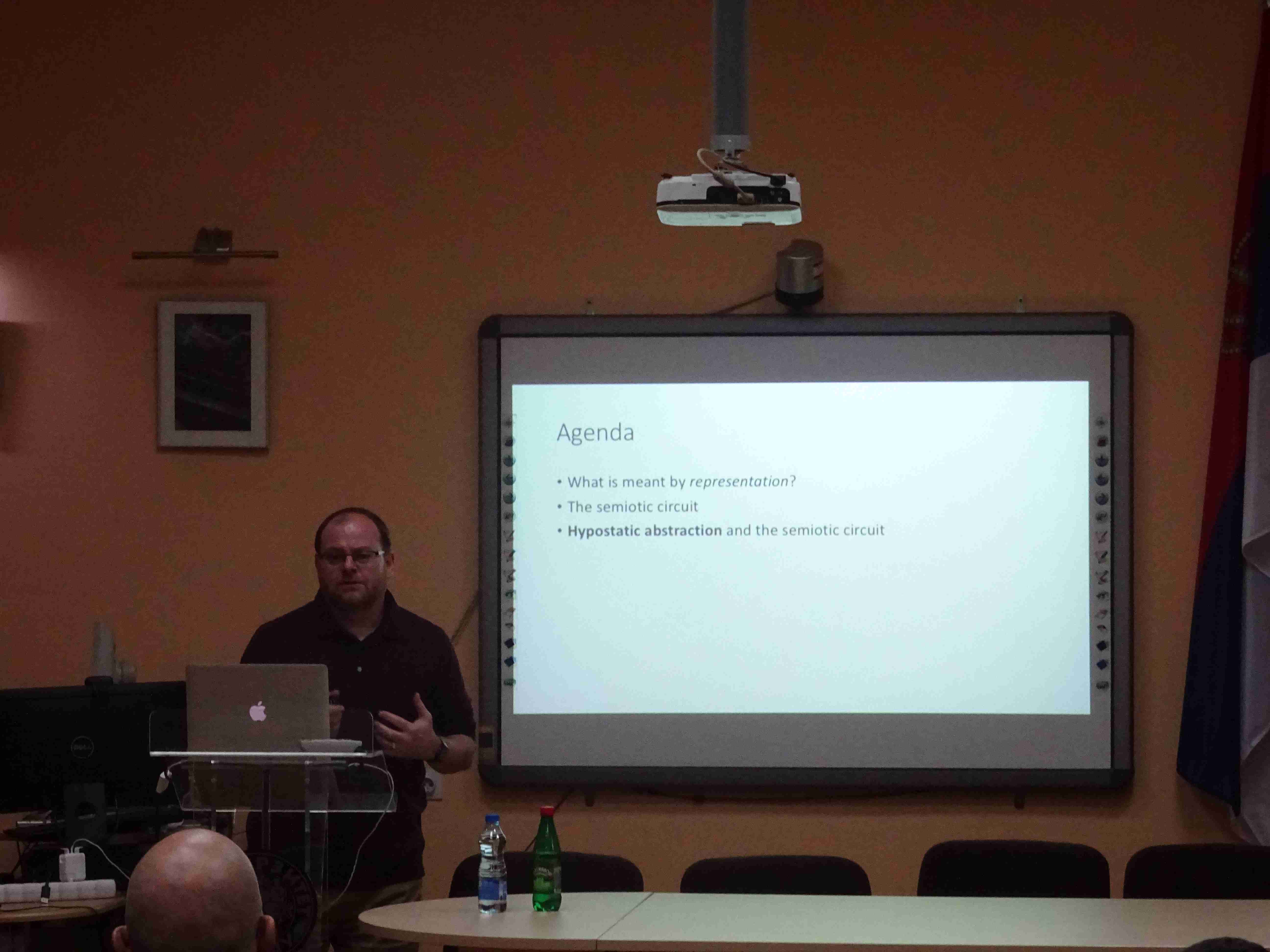
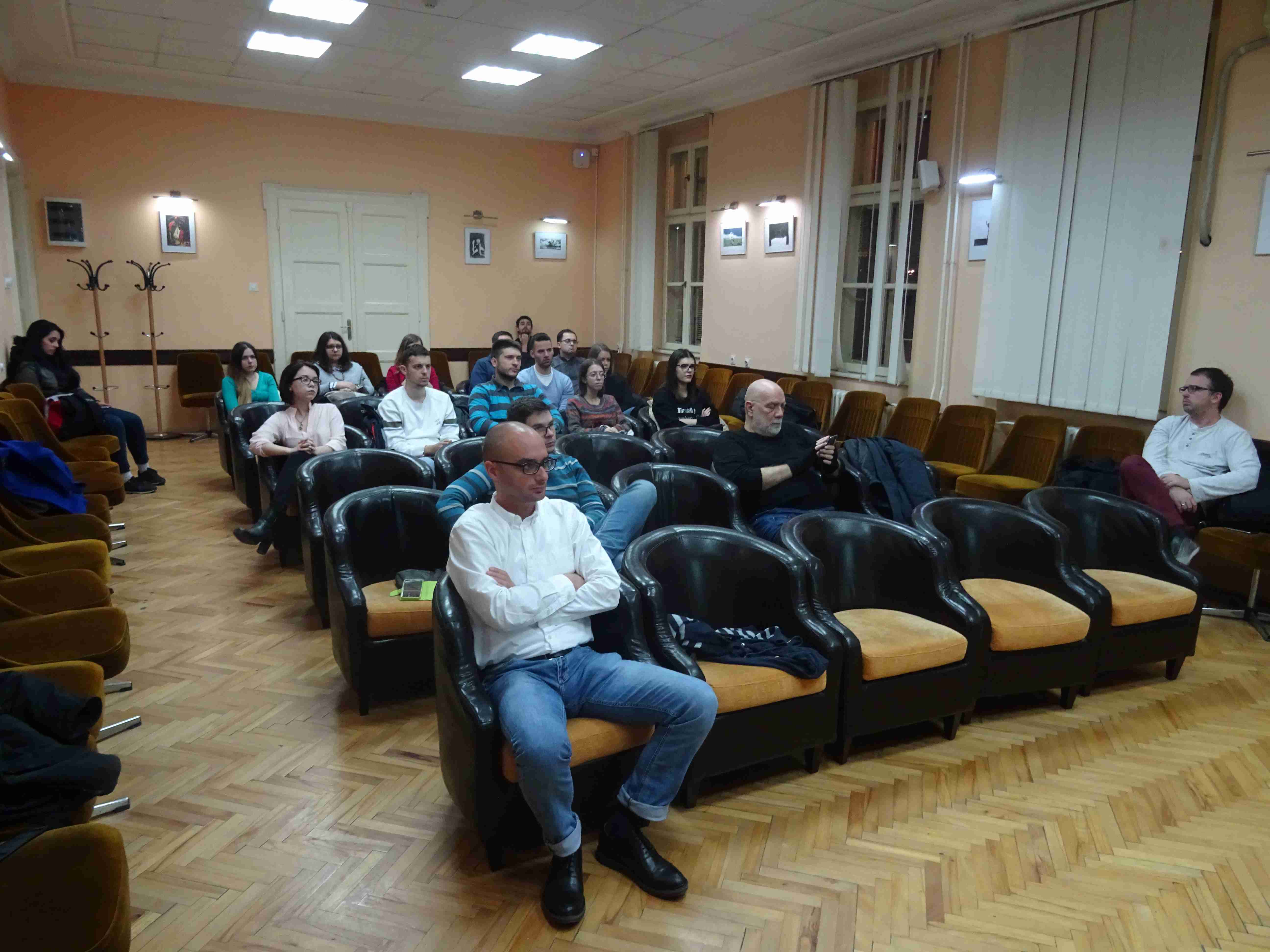
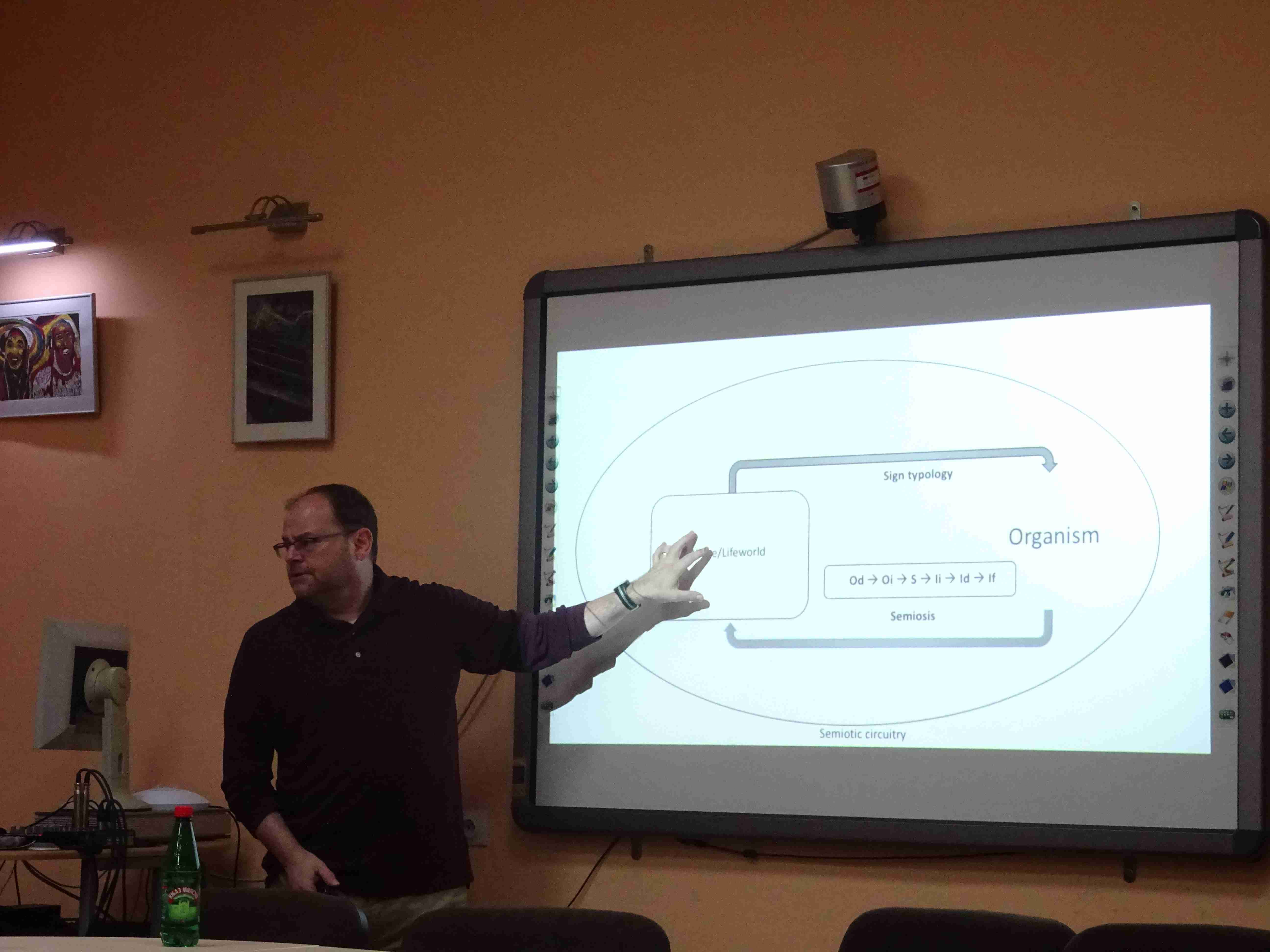
3 May 2018
Dr Hristova's lecture
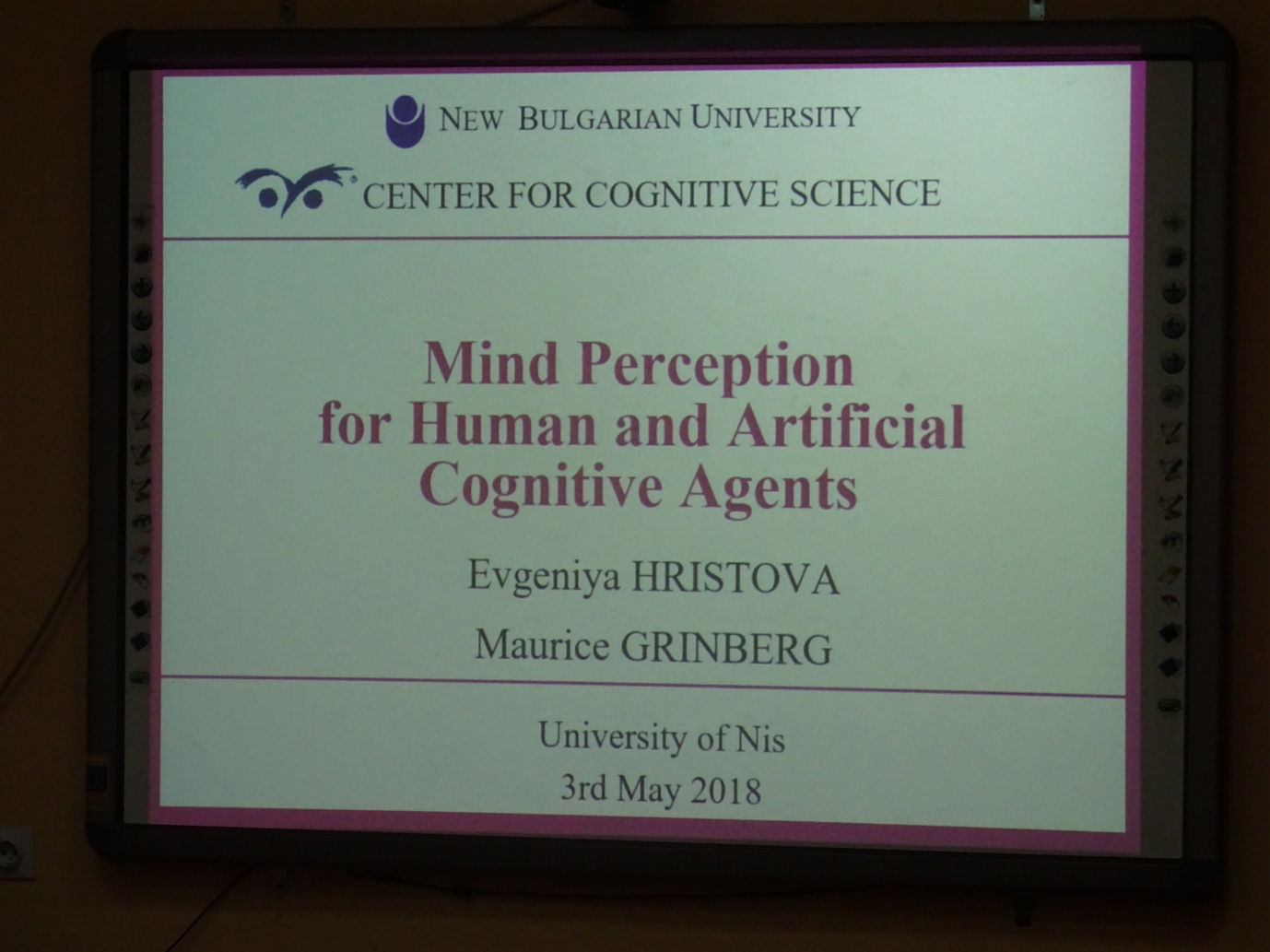
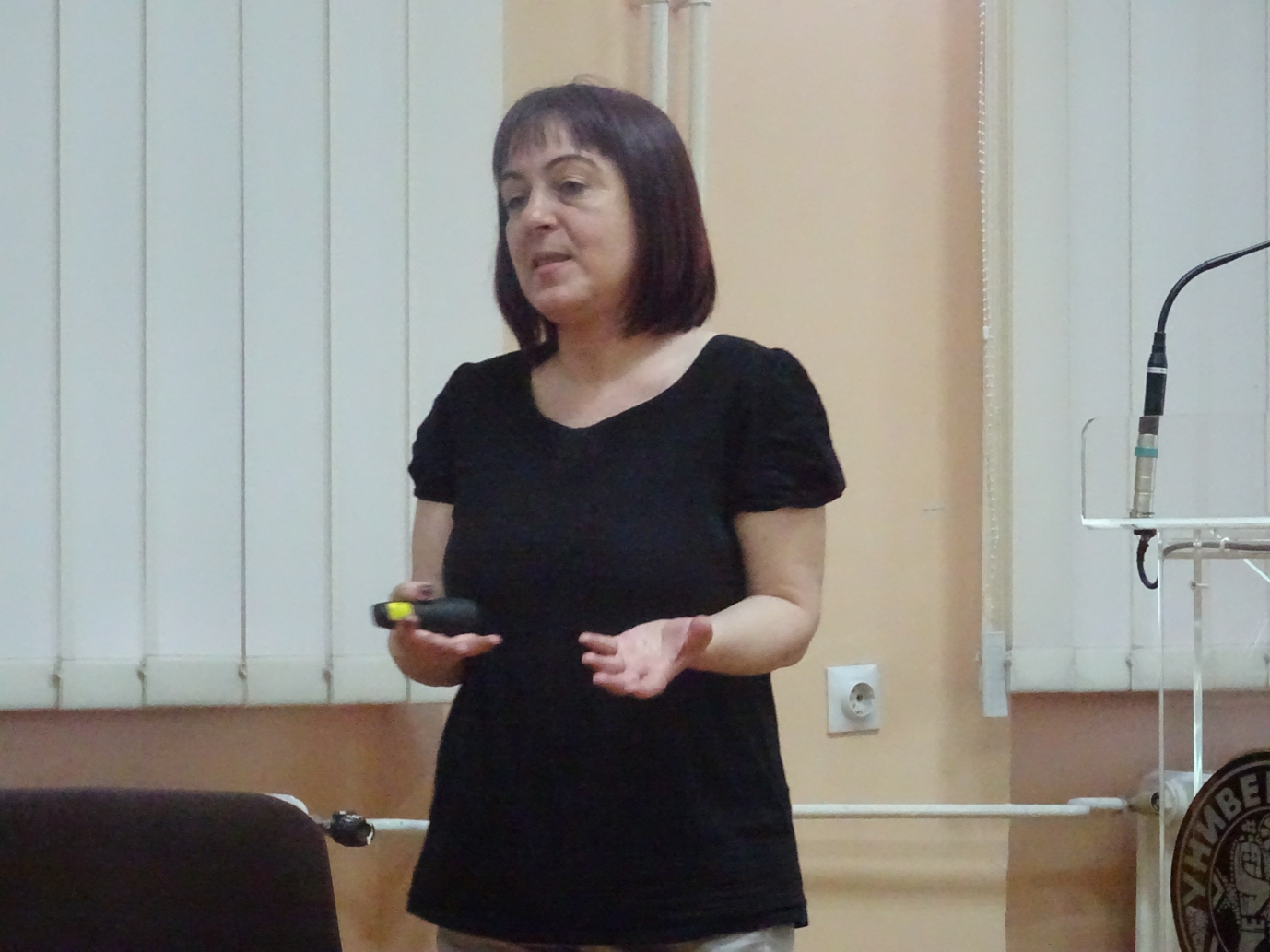
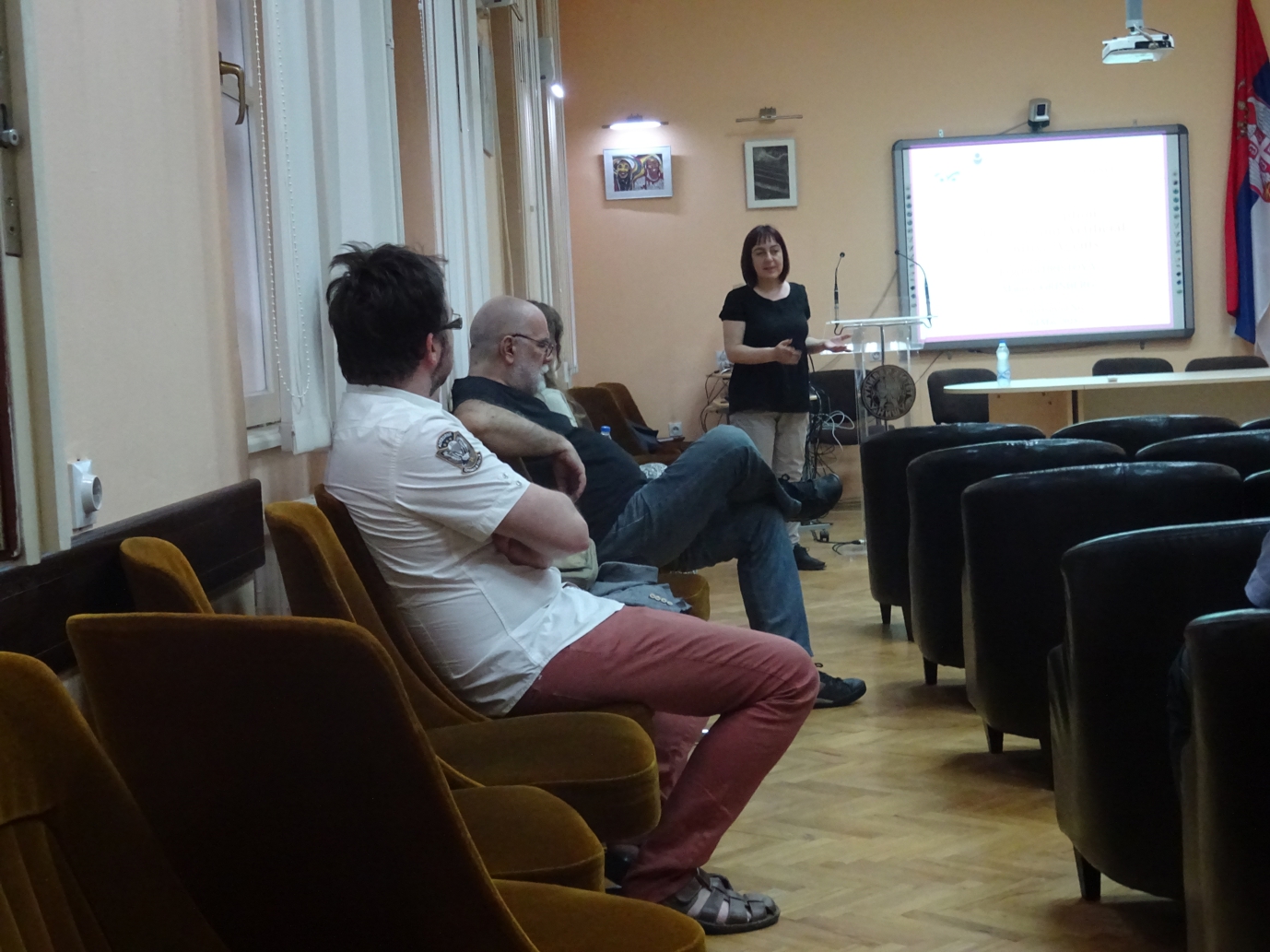
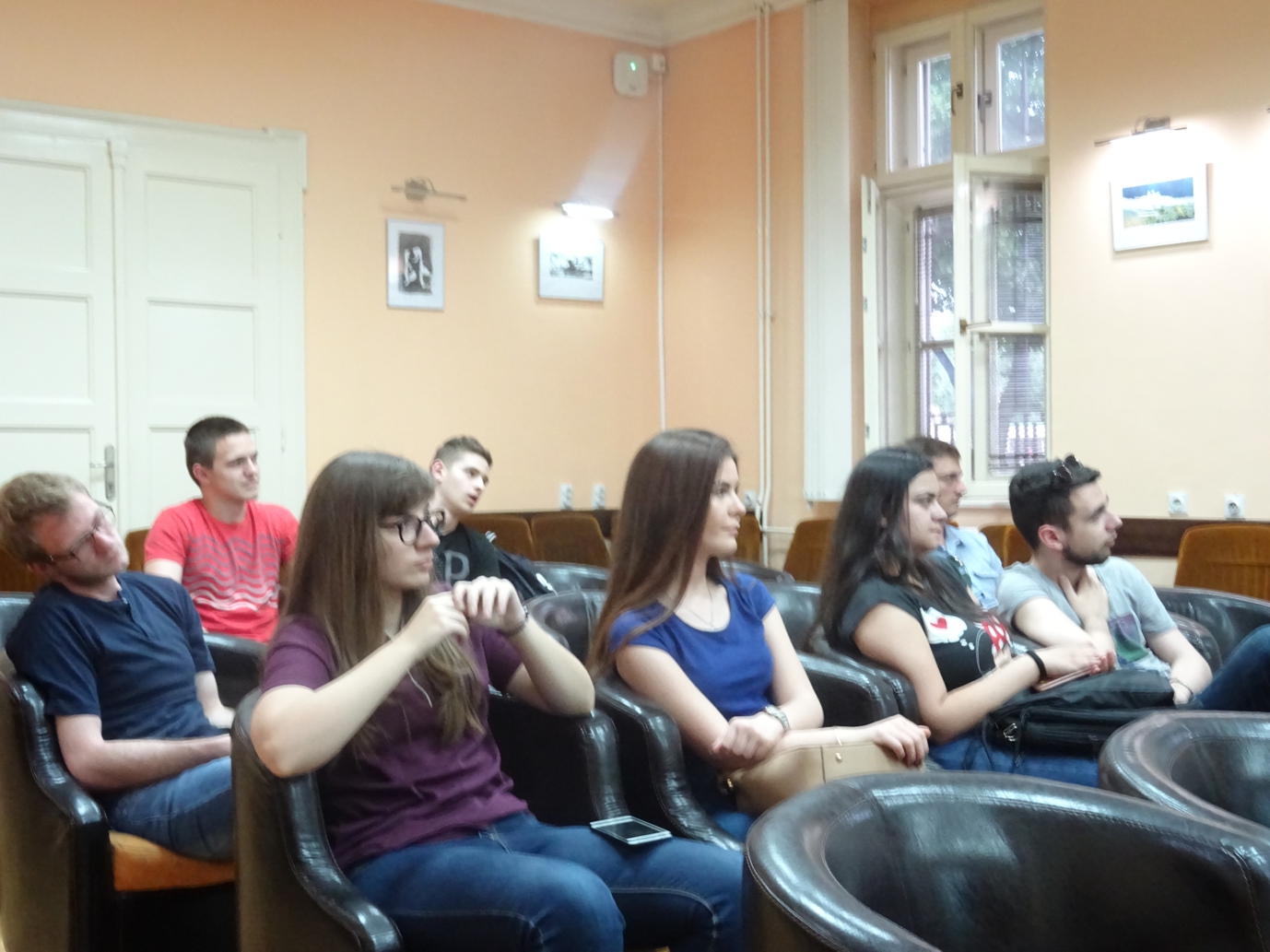
March - April 2018
Educational Seminar CURRENT TRENDS IN COGNITIVE SCIENCES II
The first day of the seminar concerned cognitive narratology. The lecturers were Prof. Jelena Jovanović, PhD, and Prof. Dejan Milutinović, PhD; both are staff members of the Department of Serbian and Comparative Literature at the Faculty of Philosophy in Niš, serving as an assistant professor and associate professor, respectively.
The first lecture was titled Frame and Framing: From Classical to Cognitive Narratology and delivered by dr Jovanović. It outlined the rejection of structuralism as the source of narratological interpretation by the first generation of post-classical narratologists and their embrace of methods found in cognitive science. In accordance with the topic, the results of this transition were highlighted; namely, the dismissal of the classical notion of the text as an autonomous phenomenon and the acceptance of context as a valid facet of analysis.
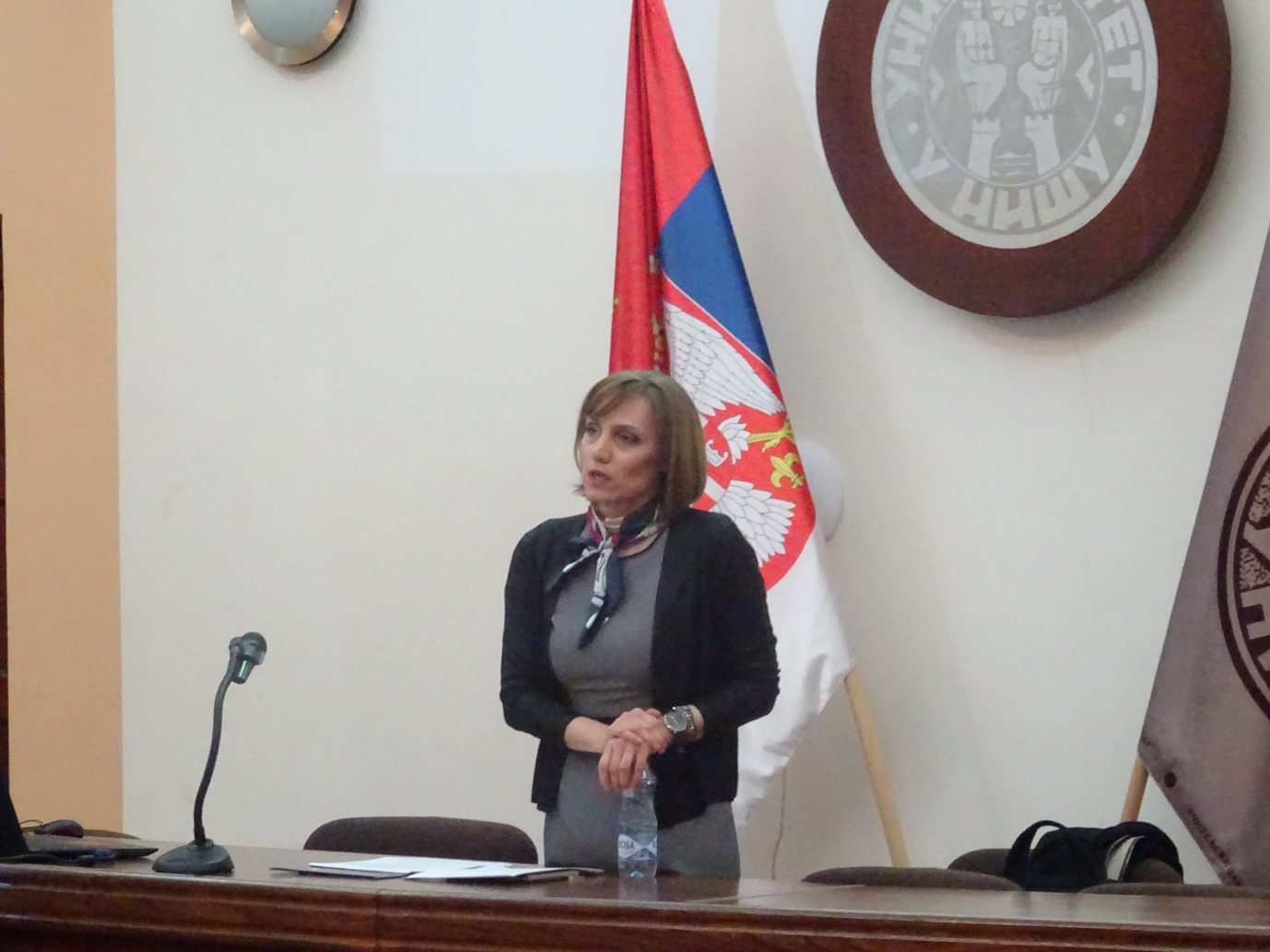
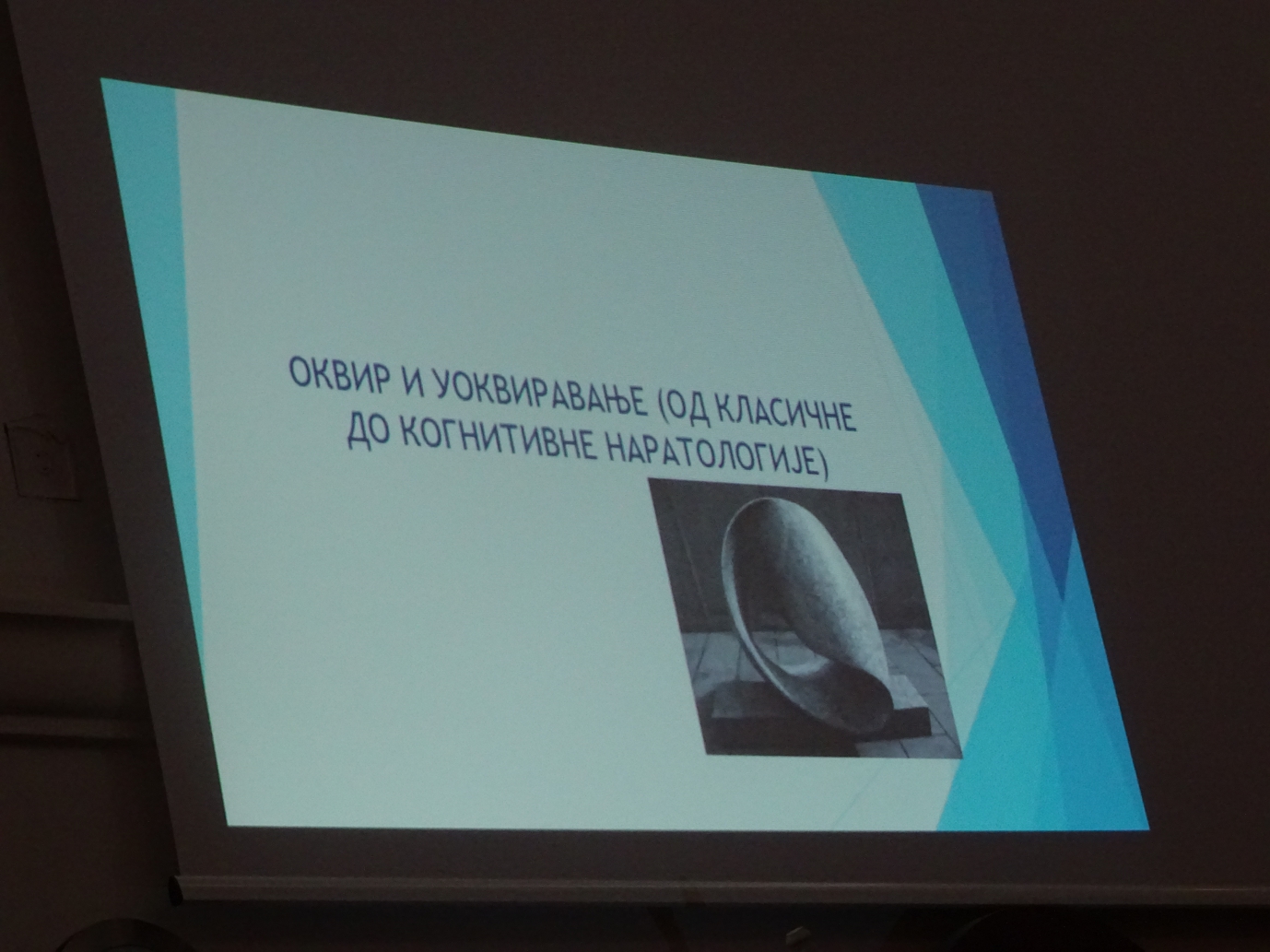
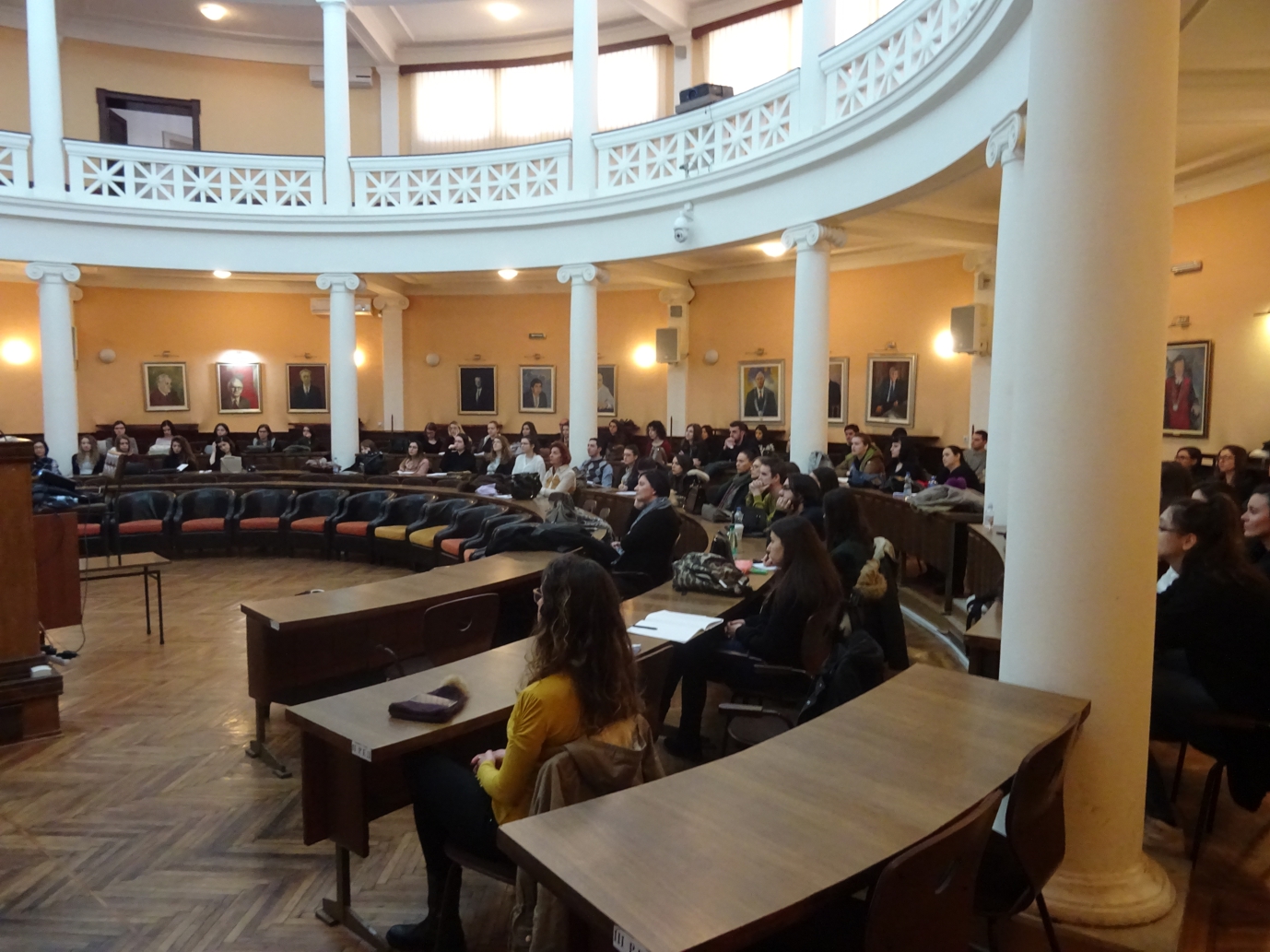
The lecture by dr Milutinović was titled Genre as a Cognitive Category. The lecturer drew parallels between the different historical epochs of science and the chronologically equivalent notions on the nature of literature before presenting the headway made in the contemporary epoch - namely the development of the four-category model which builds upon the classical three-tier model. These lectures served as an introduction to cognitive narratology for those audience members from other faculties and departments, and as such led to a round of questions and discussion.
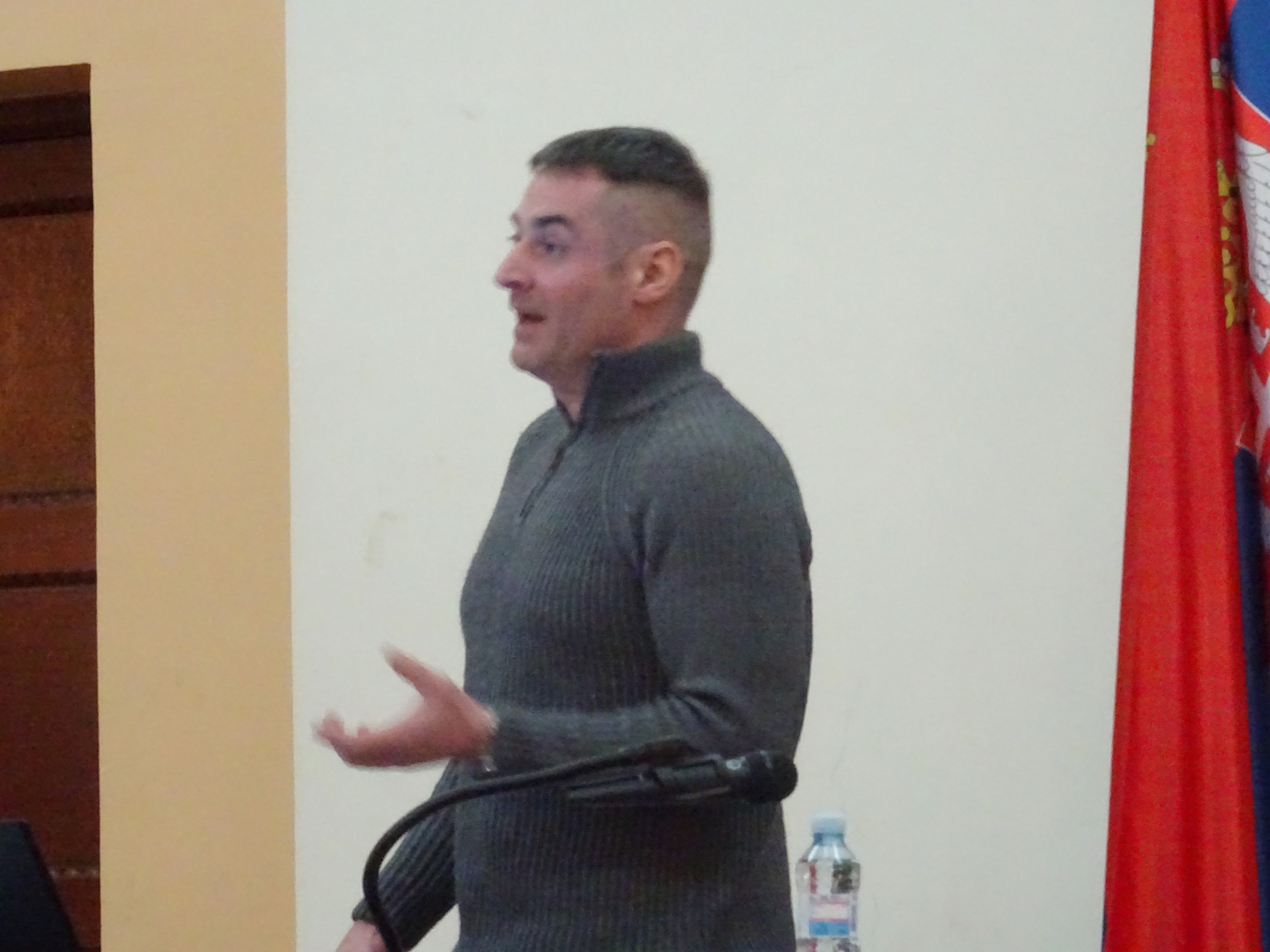
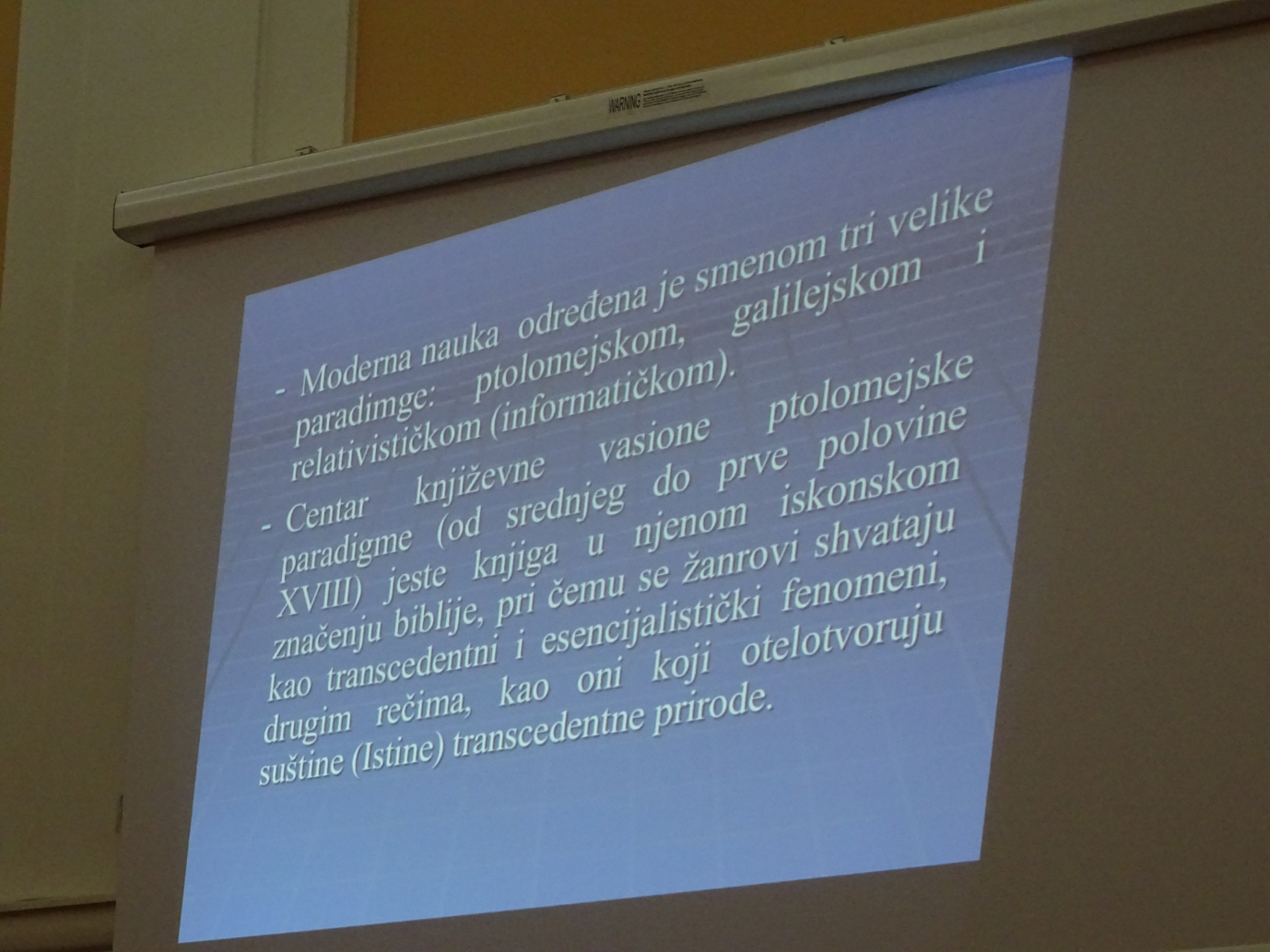

March 31st, 2018
The second day of the seminar hosted three lectures given
by prof. Dušan Stamenković, PhD, from the Faculty of
Philosophy in Niš, prof. Milkica Nešić, PhD, from
the Faculty of Medicine in Niš, and an online lecture given
by dr Renee Timmers from the Department of Music,
University of Sheffield.
Dr Stamenković gave a talk titled Metaphor
Comprehension: Theories and Research Directions.
During the talk, the lecturer gave a detialed overview and
comparison of various approaches to the study of metaphor
comprehension, ranging from Conceptual Metaphor Theory to
more contemporary experimental research in the domain of
cognitive psychology that explores mechanisms such as
categorization and analogy. Following the detailed
theoretical introduction, Dr Stamenković present findings
from his own research and outlined the main directions for
future research.
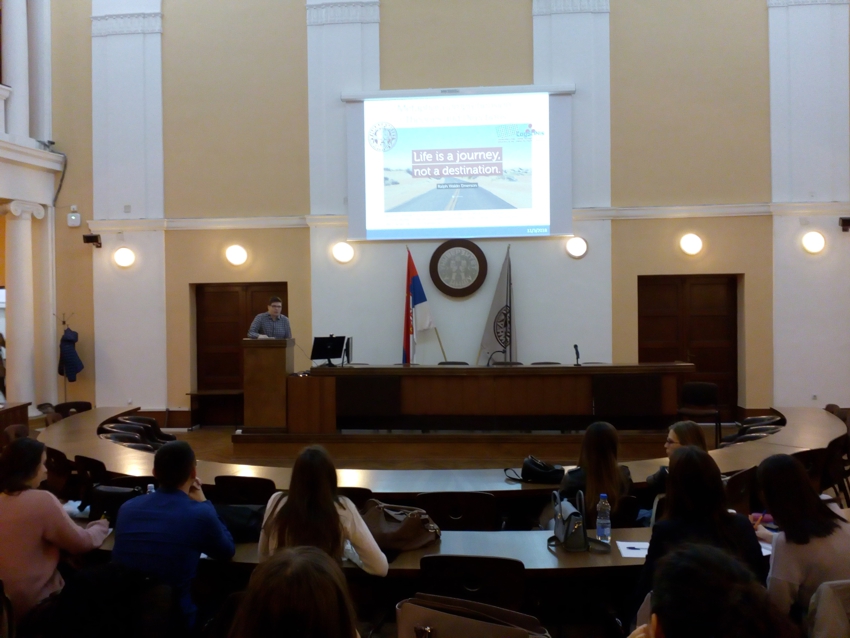
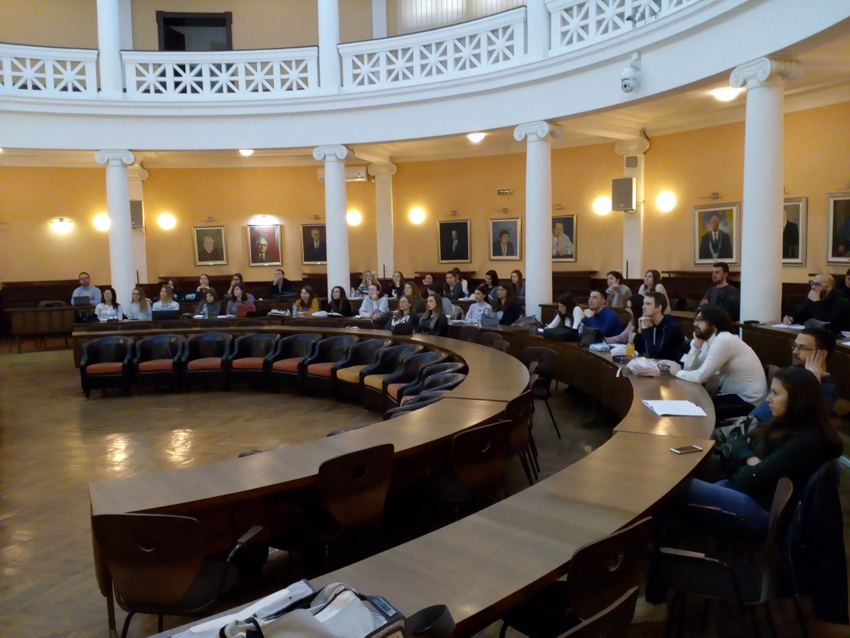
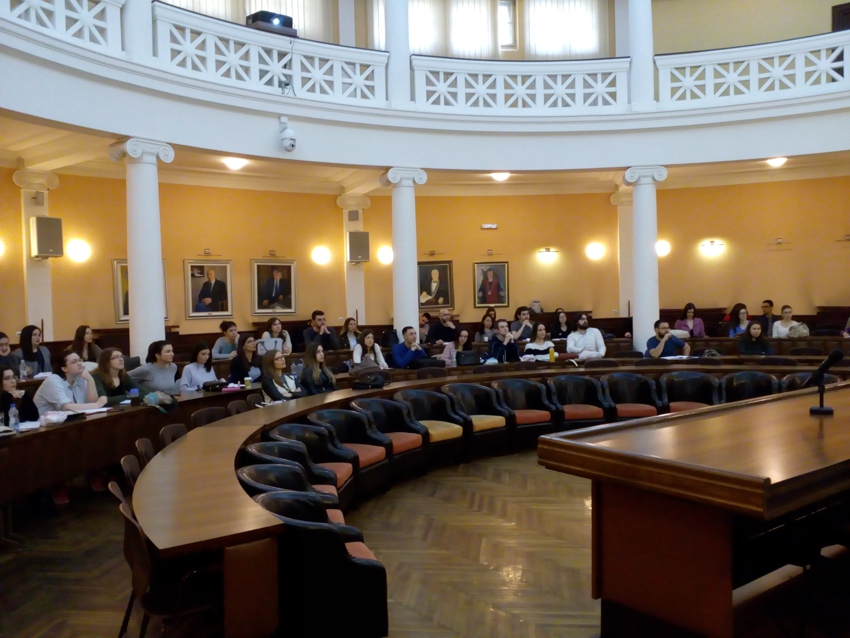
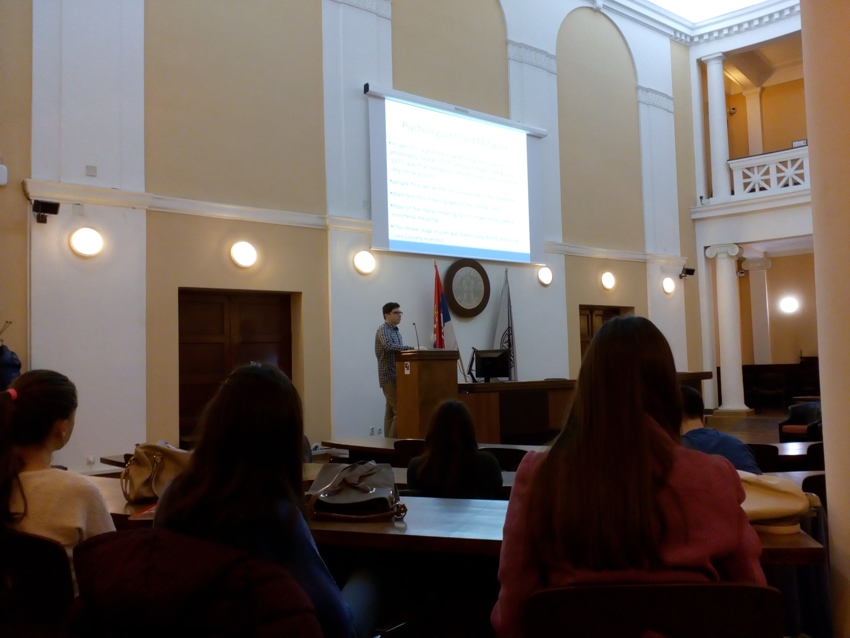
Dr Nešić's lecture titled The relationship between
attention, working memory, and consciousness started
with an overview of brain circuitry that supports the most
important cognitive functions, and it also included an
insight into previous research in the field. After that, dr
Nešić presented the findings of her study dealing with
woring memory.
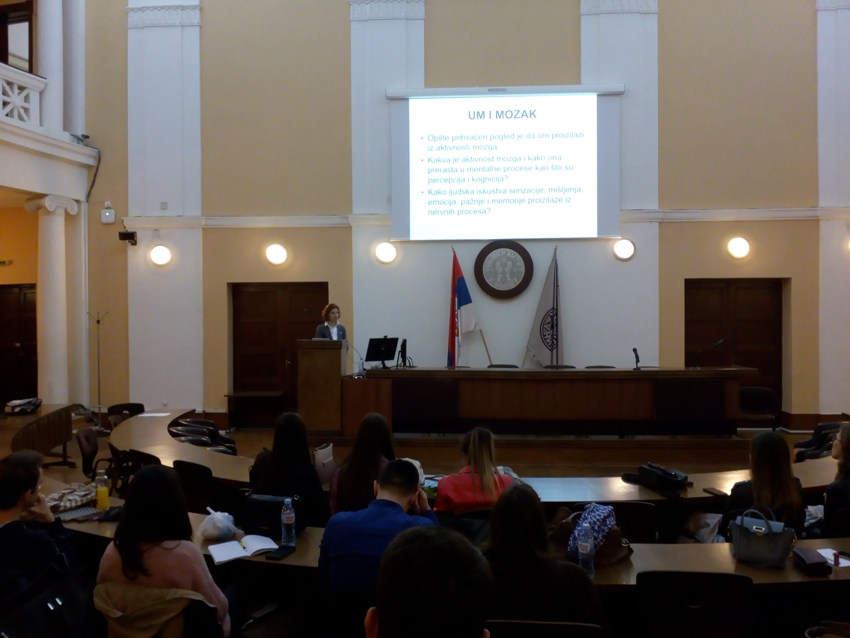
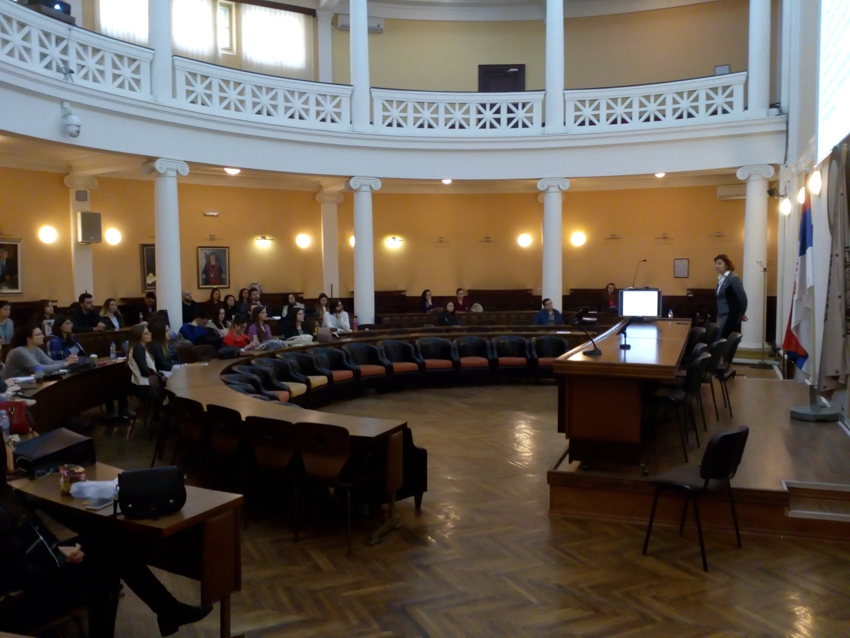
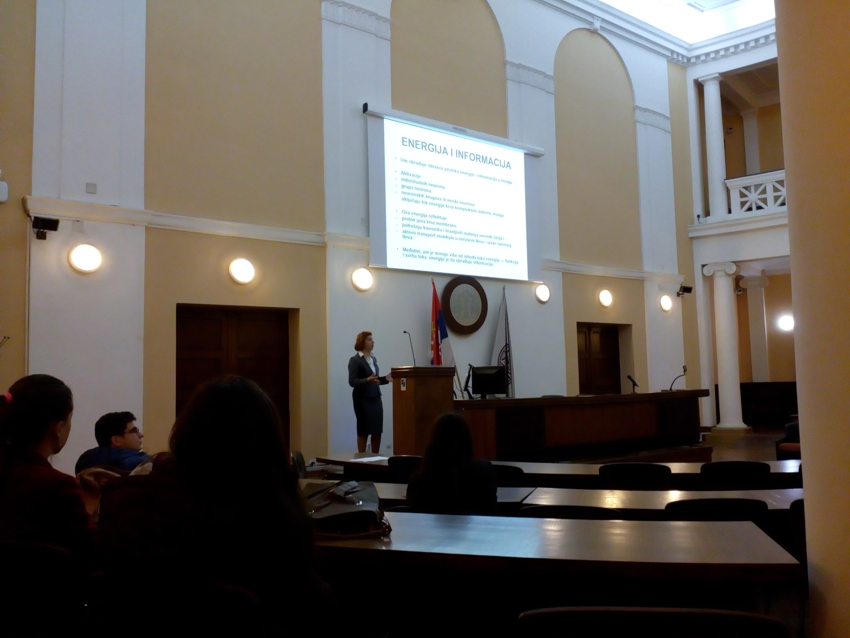
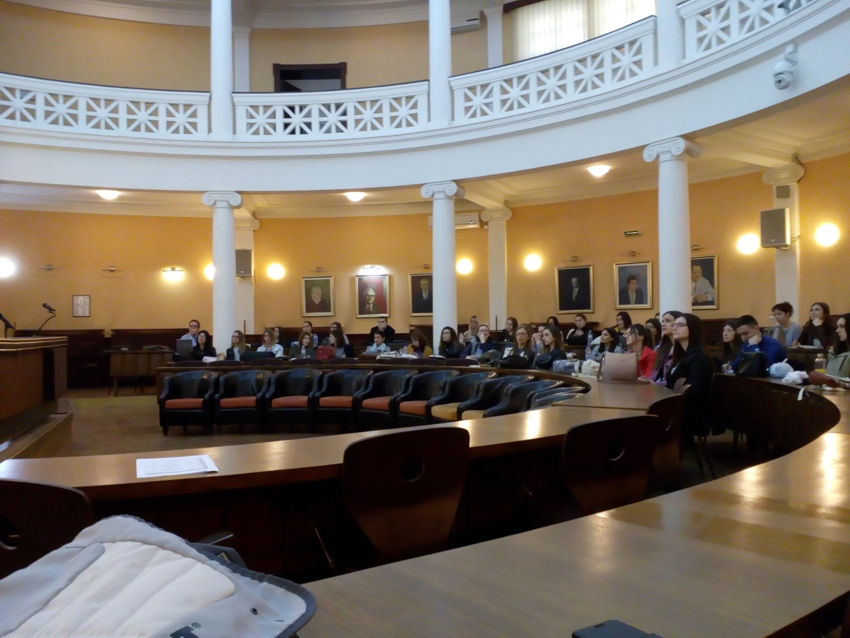
Dr Renee Timmers gave an online talk titled Communication
in Musical Ensembles. During the talk, she discussed
the role played by both social and cognitive processes in
developing a synchronised and coherent ensemble performance
within a rehearsal or concert context. Social processes
concern the perceived relationships between ensemble
members, their verbal interactions, as well as relational
characteristics of their nonverbal behaviour. Cognitive
processes relate among others to the ability of musicians to
anticipate and adapt to each other whilst playing, and to
employ visual and auditory cues to inform such anticipation
and adaptation. Recent research conducted with colleagues
and students are reviewed that are relevant due to their
methodological innovations and the insights they offer on
ensemble performance. The studies examined 1) how patterns
of verbal communication emerge and develop across rehearsals
of a vocal quintet, leading up to a concert performance, 2)
patterns of adaptation and auditory- visual cuing in a
string quartet, and 3) the ability to use visual information
for synchronisation and its dependence on relevant motor
expertise. These studies observe different layers of musical
communication from explicit verbal behaviour to neurological
contributors.
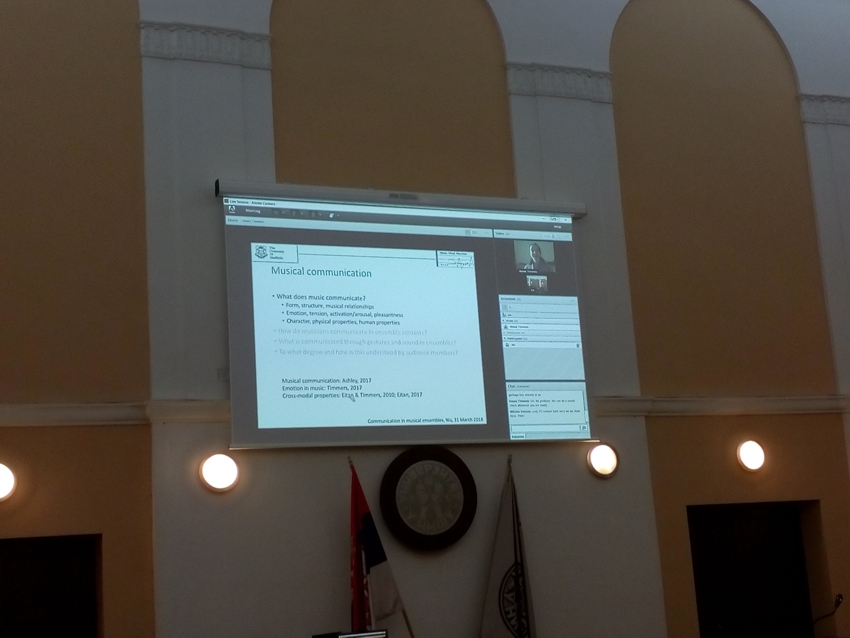
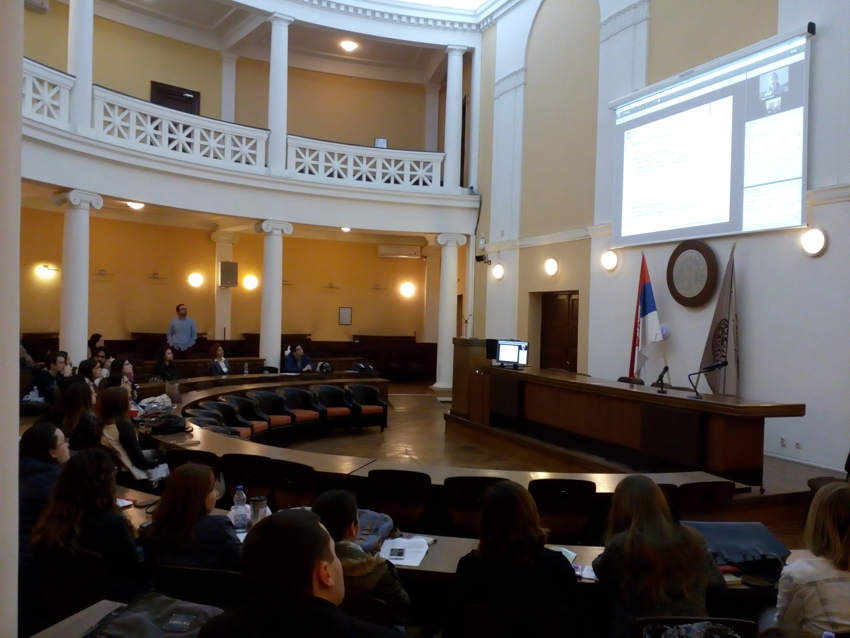
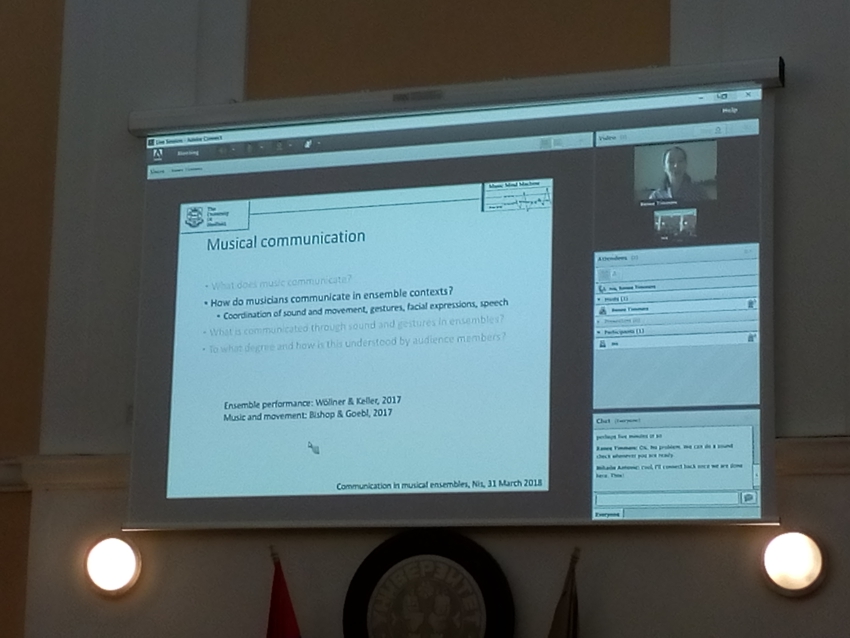
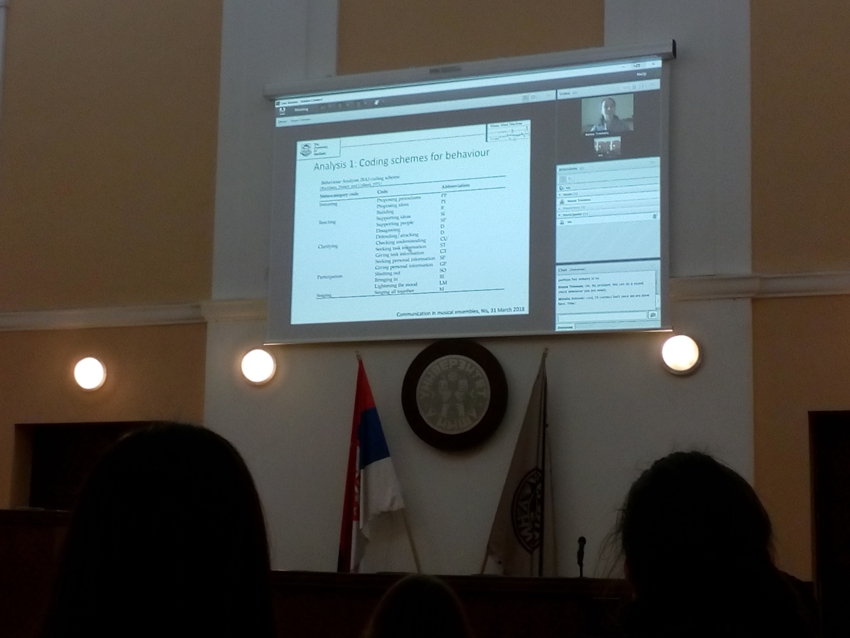
April 14th, 2018
The final day of the seminar consisted of two lectures delivered by Prof. Mihailo Antović, PhD, Head of Center for Cognitive Sciences in Niš, and Prof. Đorđe Vidanović, PhD, CogSci forum coordinator.
The first lecture - Levels of Grounding in Meaning Construction: A New Approach to Cognitive Semantics – was delivered by Prof. Antović. Following an introduction to the problem of symbol grounding as outlined by Harnad in 1990, Prof. Antović proposed a multi level-grounding system on the basis of a study of music referentiality.
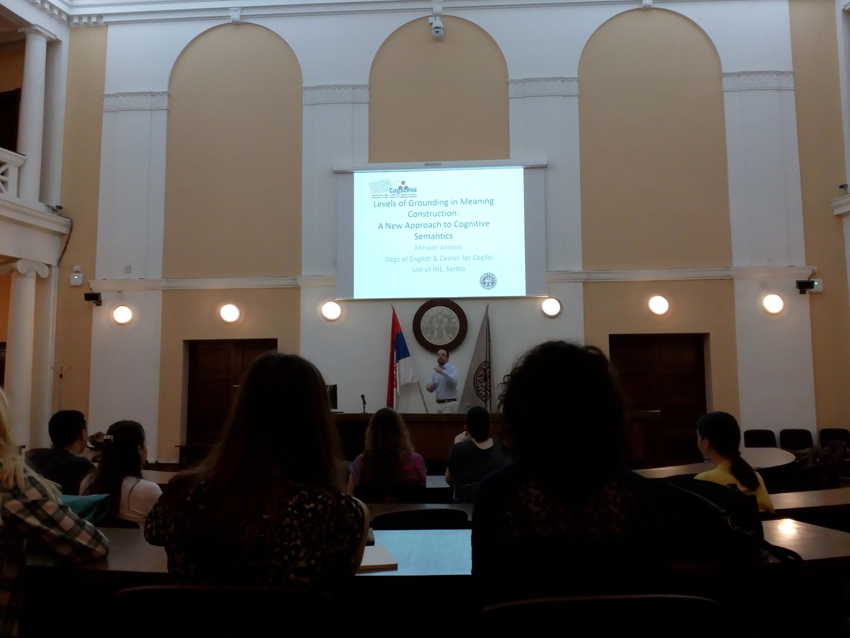
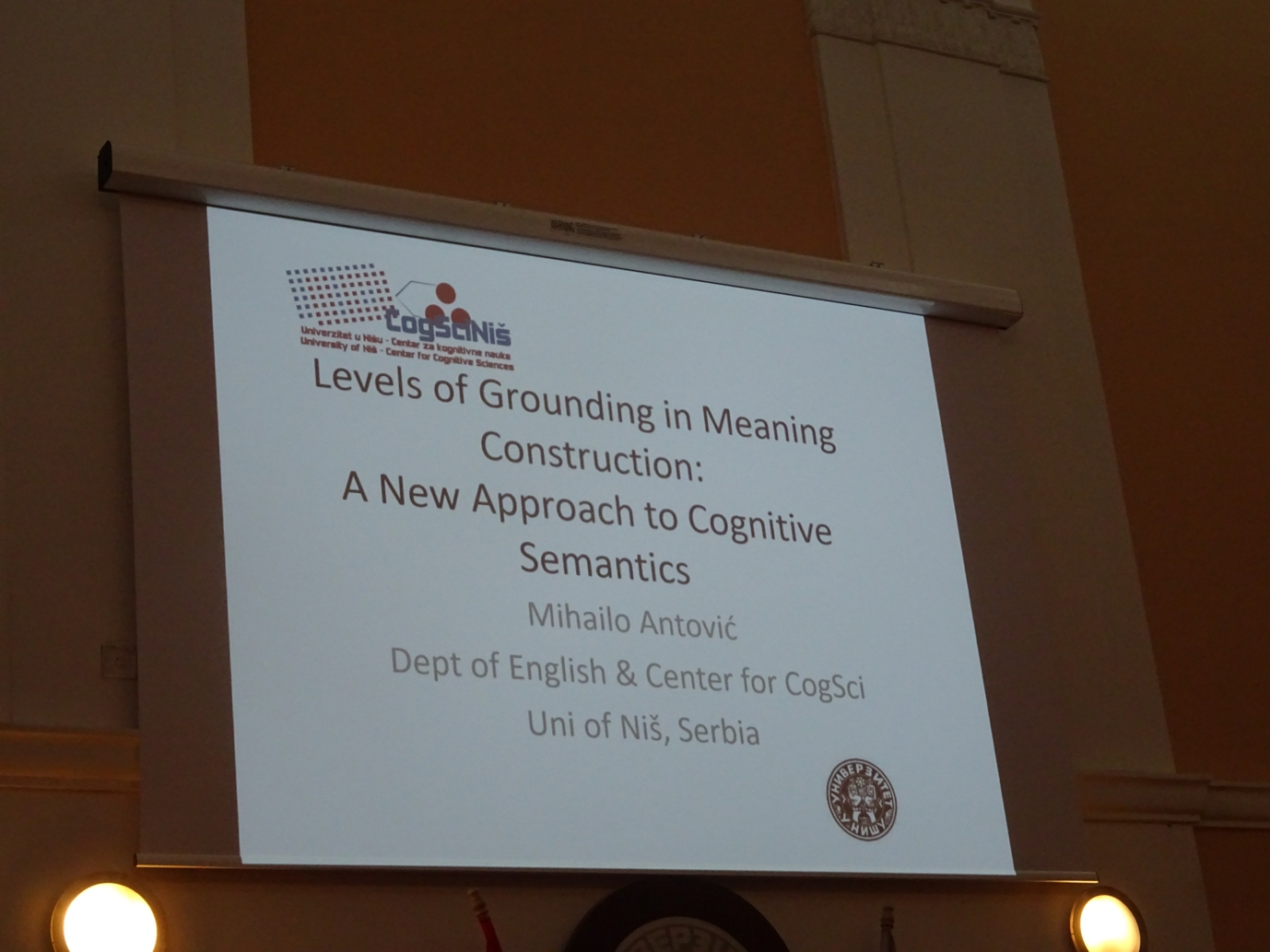
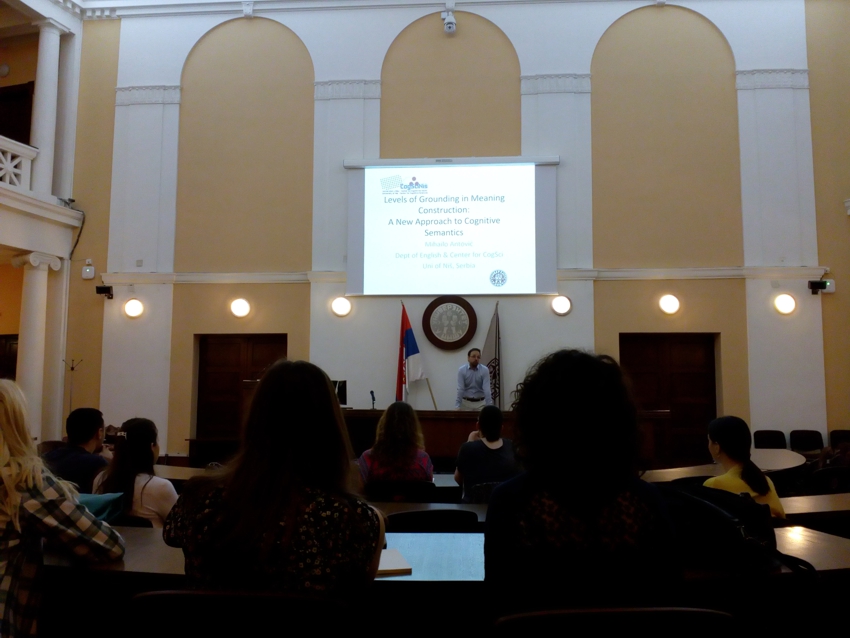
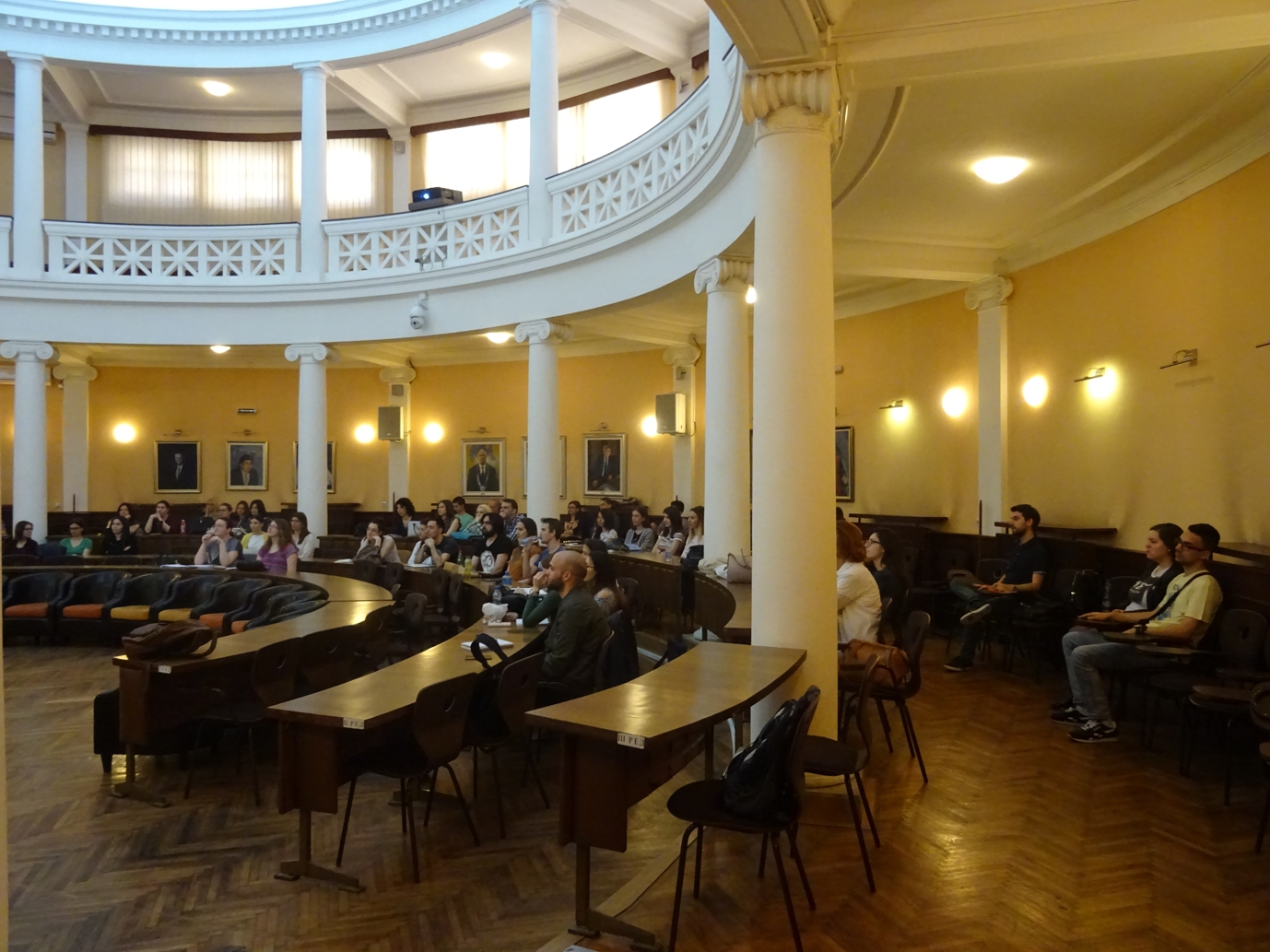
The final lecture was delivered by Prof. Vidanović and it was titled Paradise Lost and the Interpretation of the World. On the basis of the book Perception and the Fall from Eden, Prof. Vidanović offered an interpretation whereby well-known mechanisms of cognitive linguistics are an inevitable consequence of man’s existence in an imperfect world; were the opposite to be true, phenomena such as polysemy would not exist, as human language would exist on a perfect one-on-one correspondence with the world.
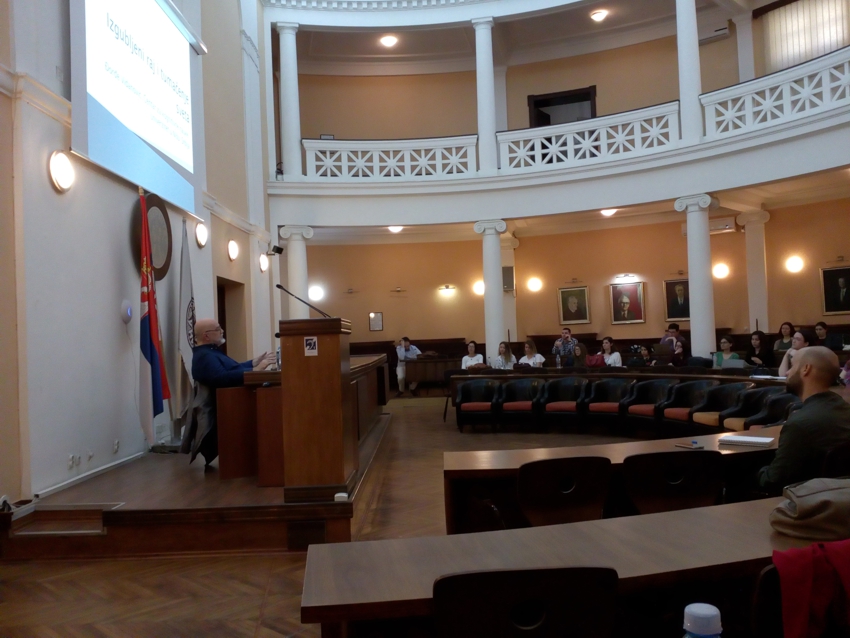
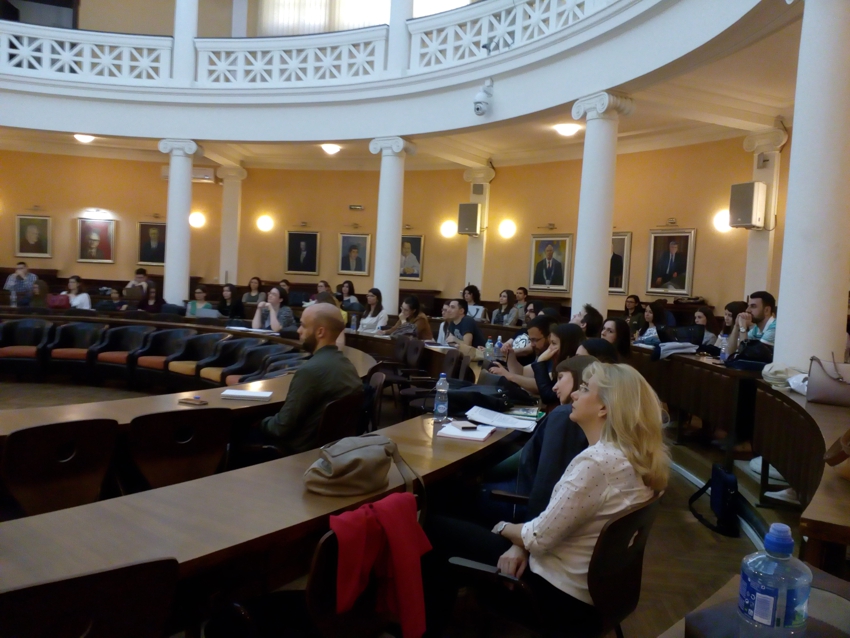
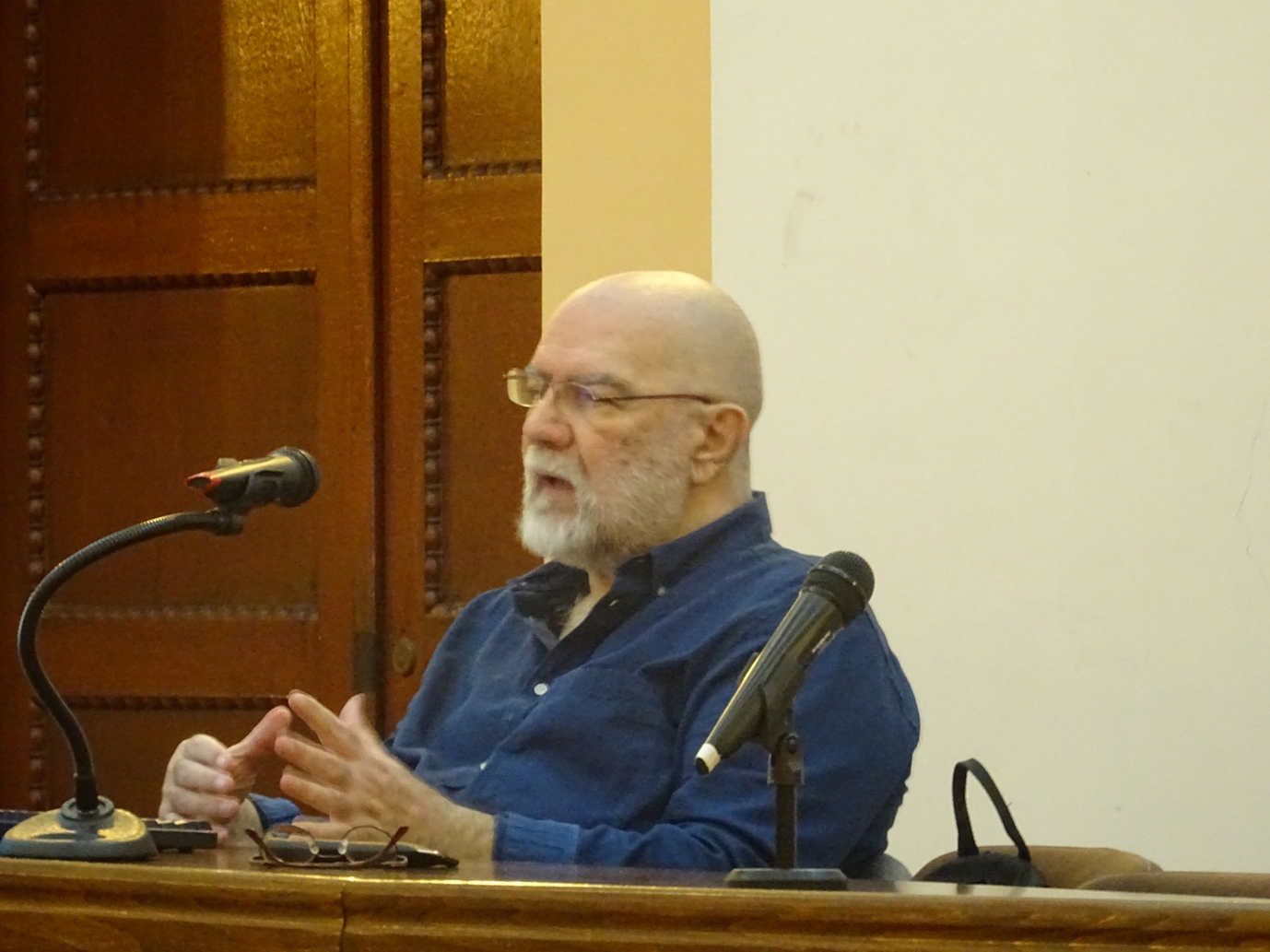
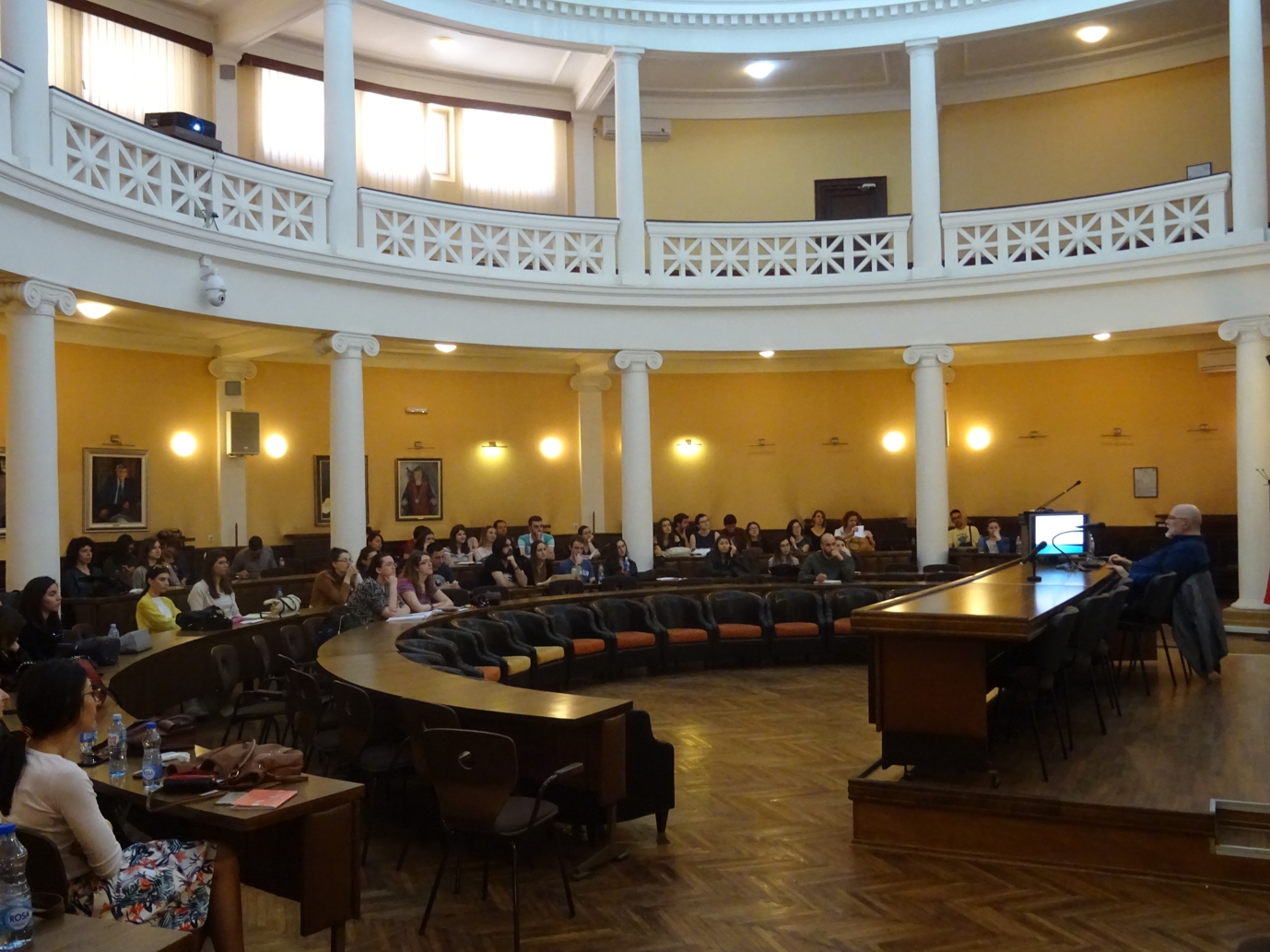
Following a round of questions and discussion, the seminar was concluded by Vladimir Figar, secretary of the Center for Cognitive Sciences in Niš.
22/03/2018
Dr Valt's lecture
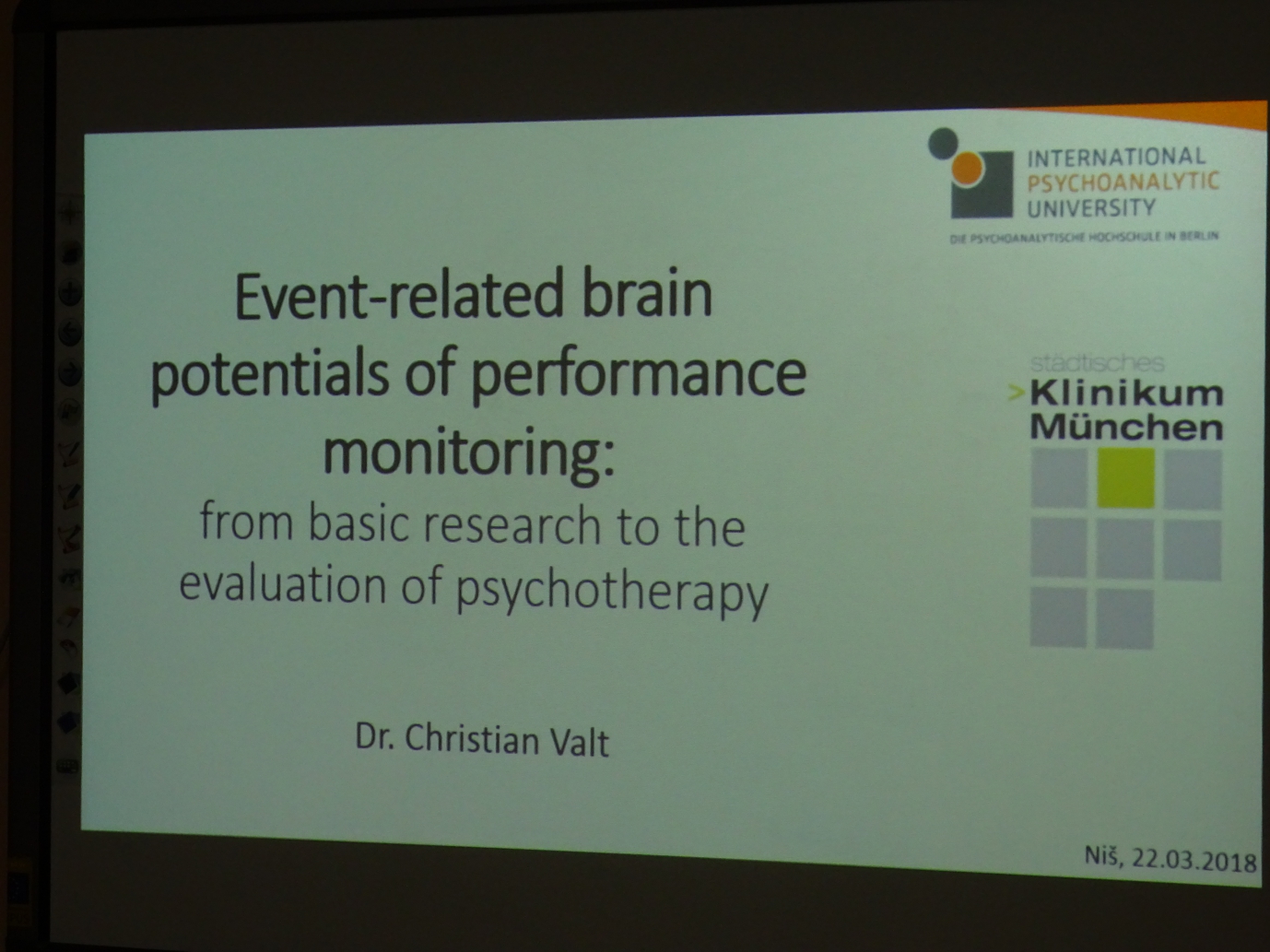
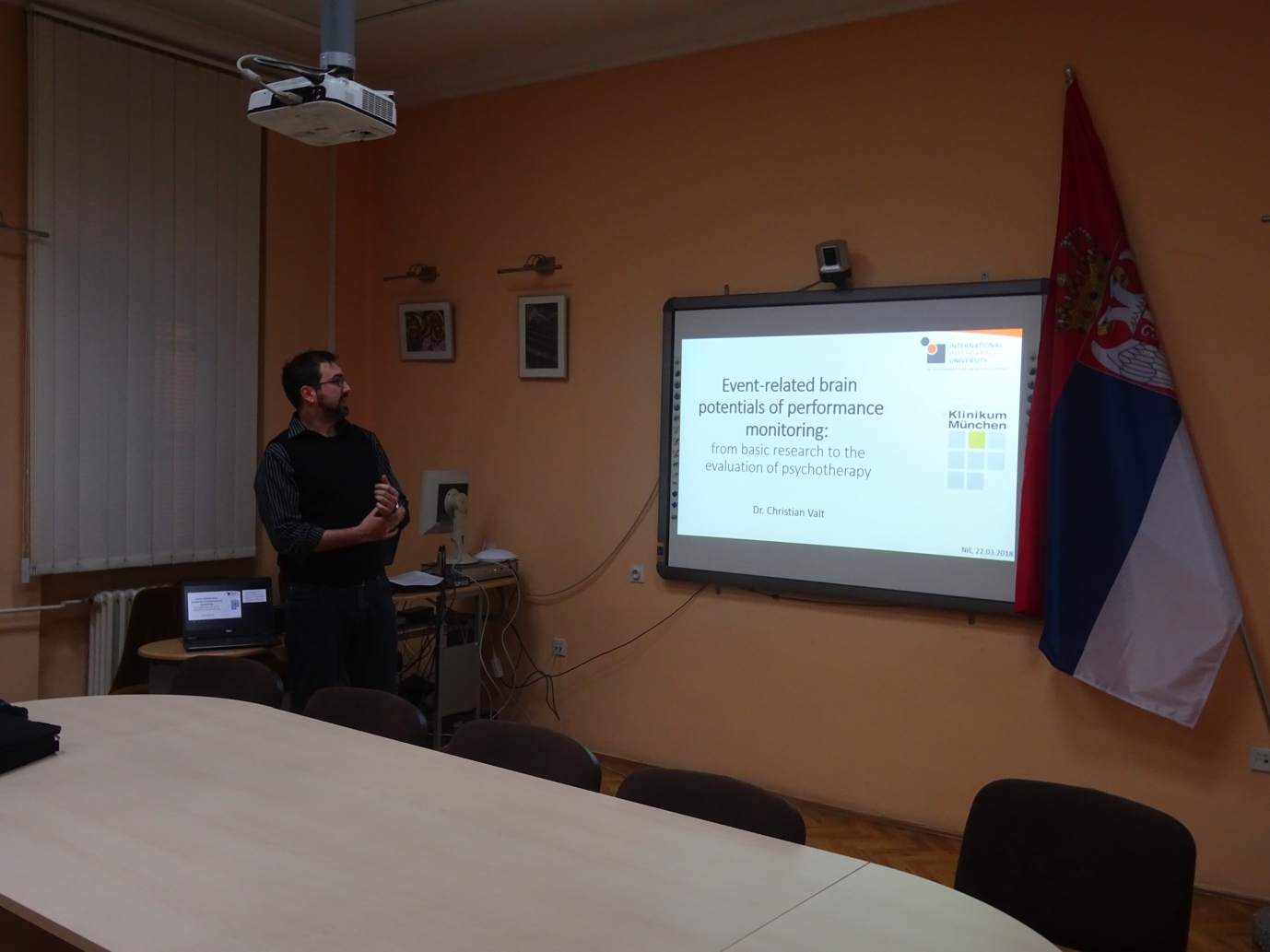
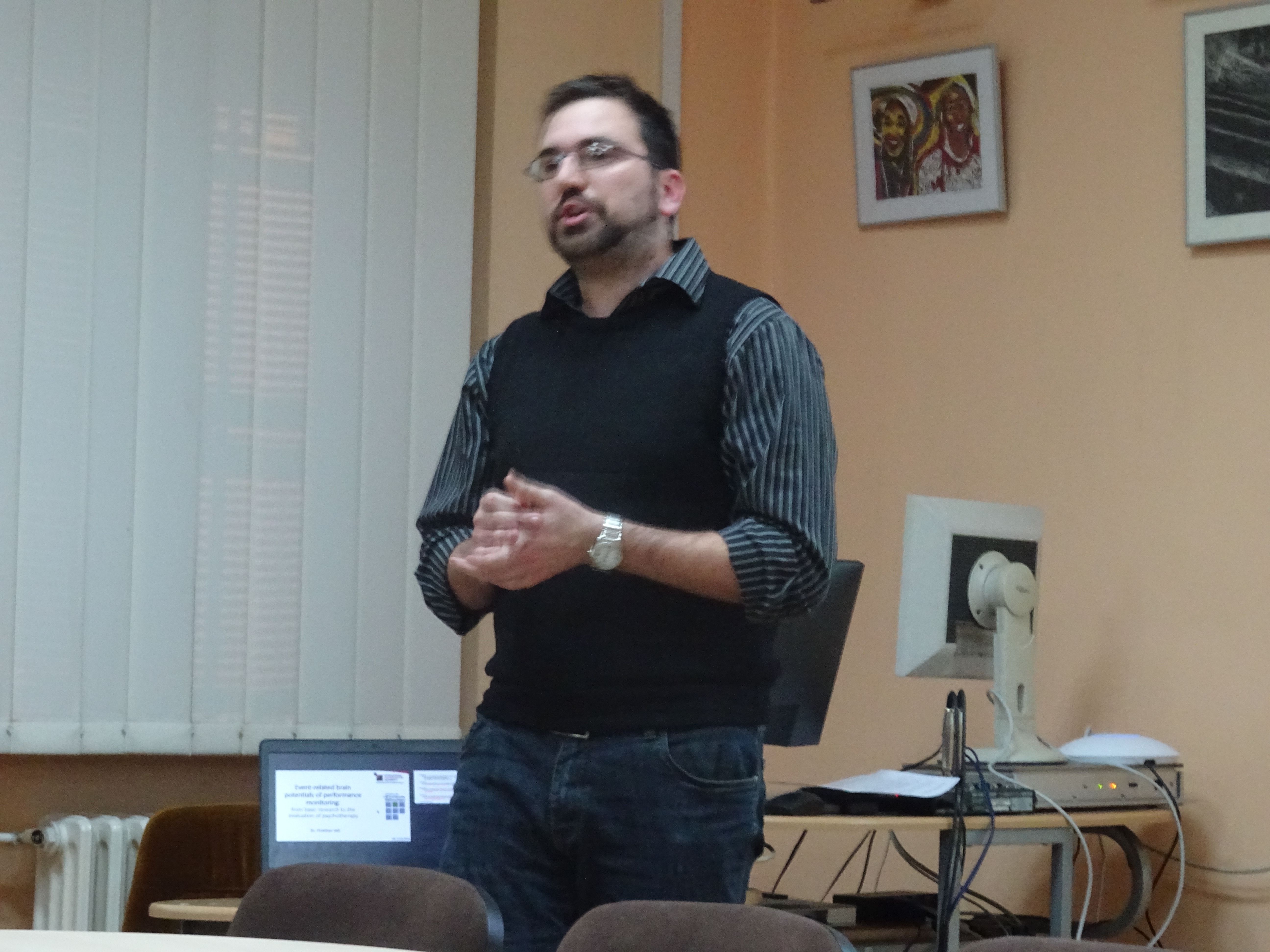
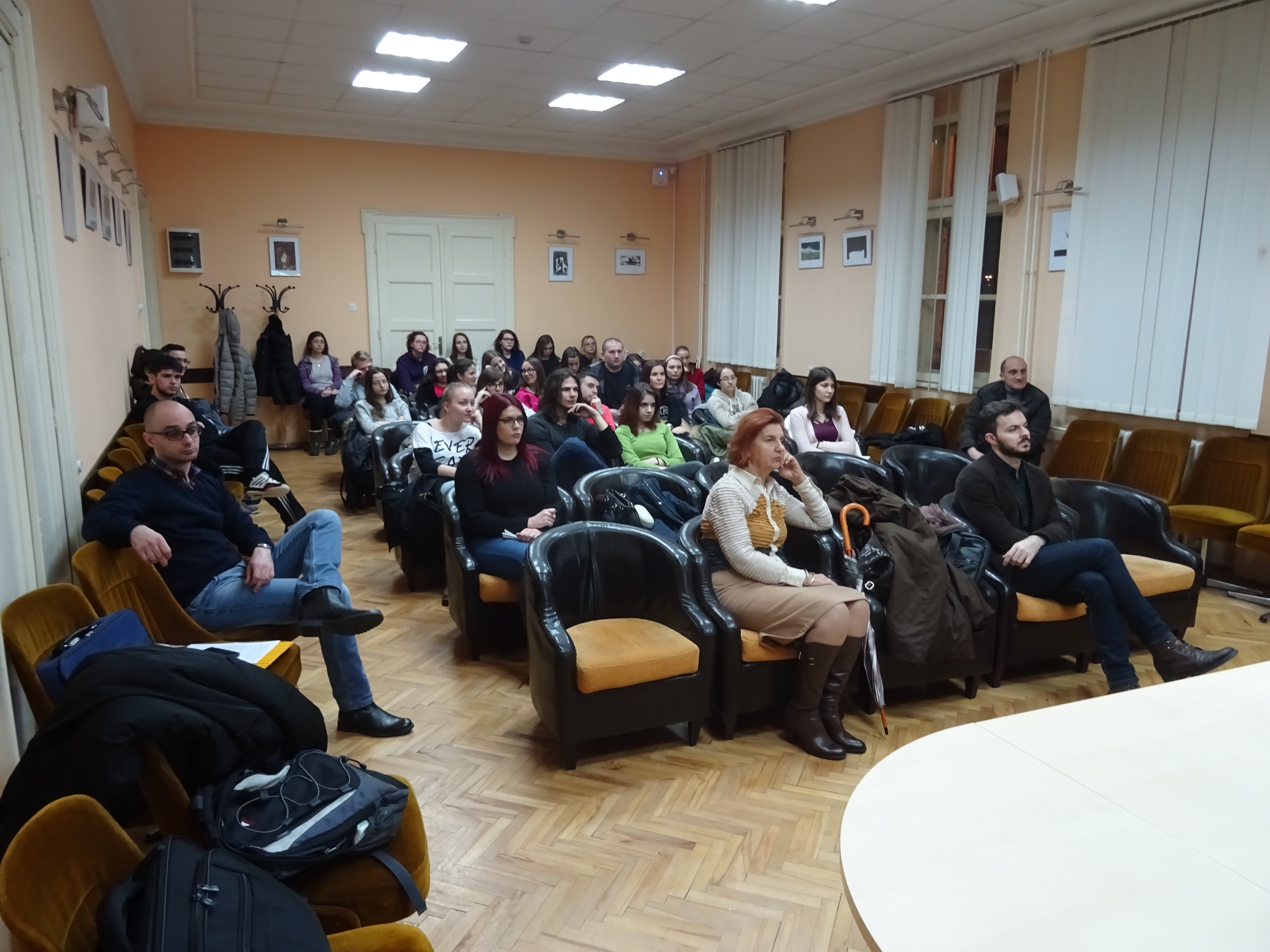
February - March 2018
Dr Antović's visits to Sheffield and Bratislava
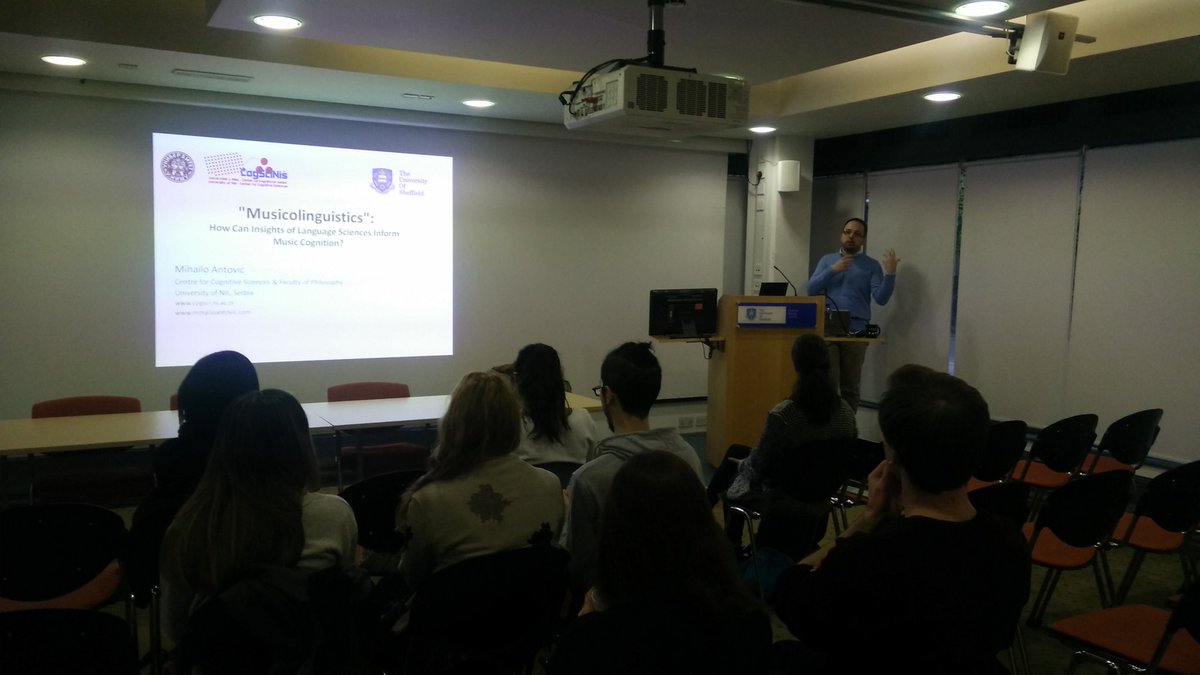
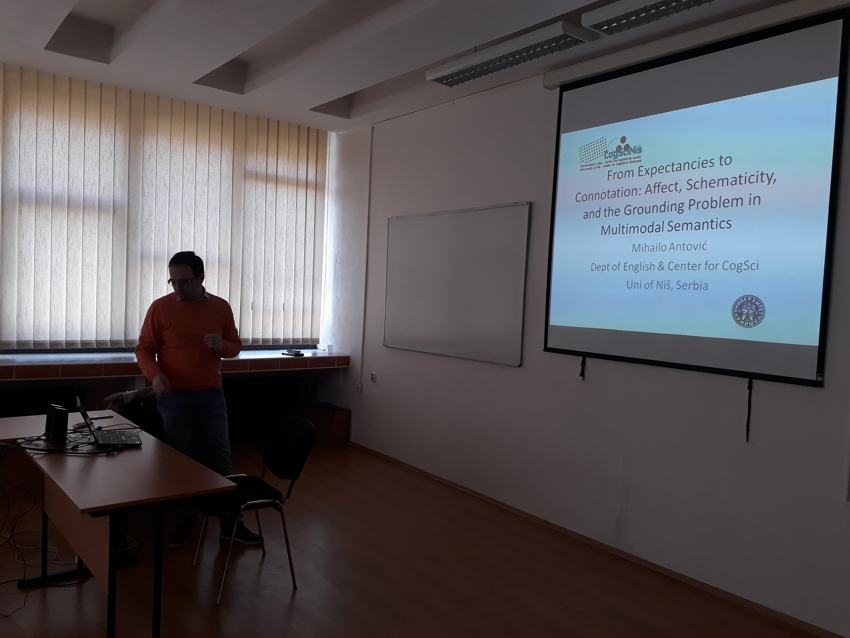
13/12/2017
Dr Snežana Milosavljević Milić's lecture
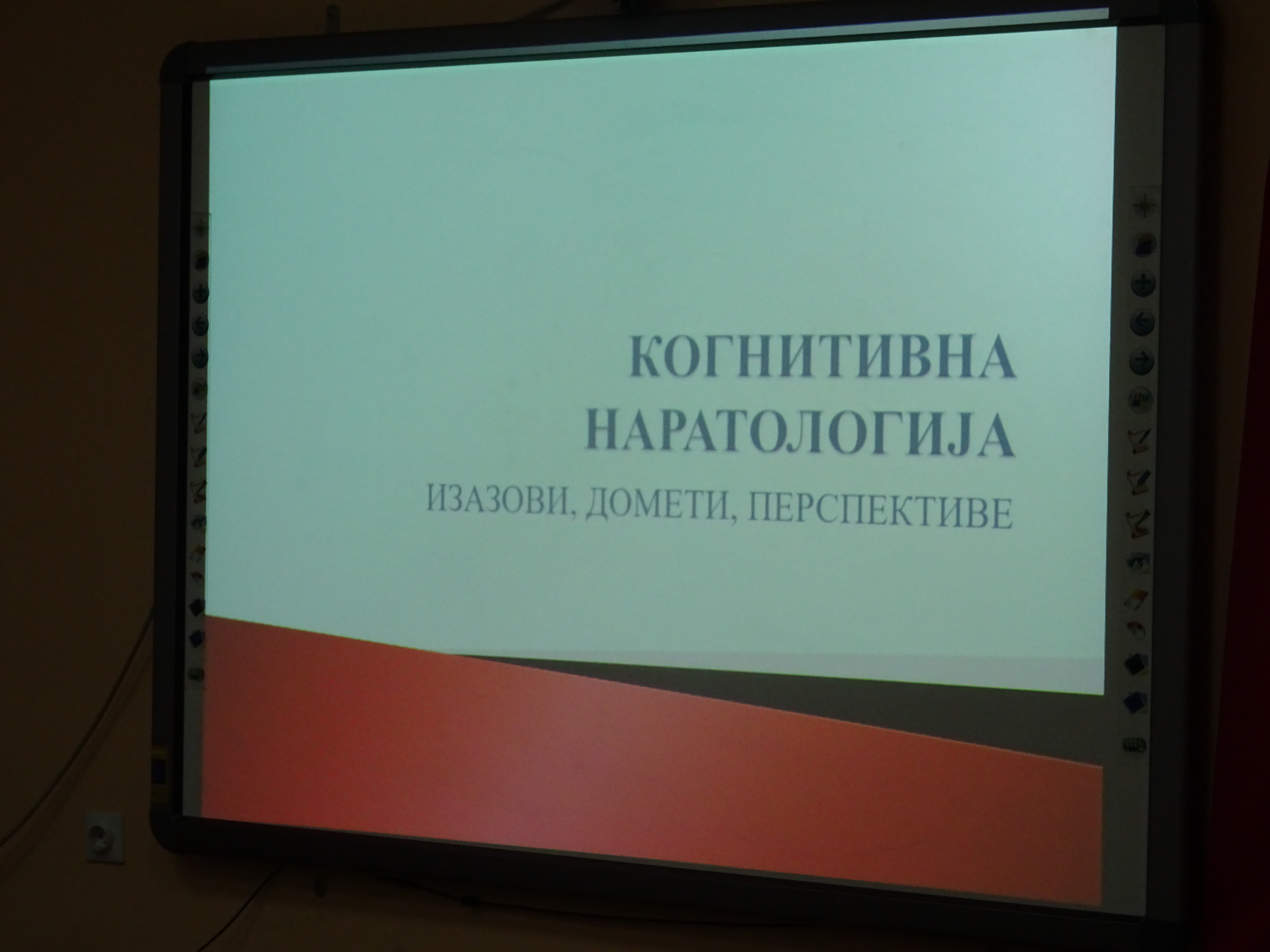
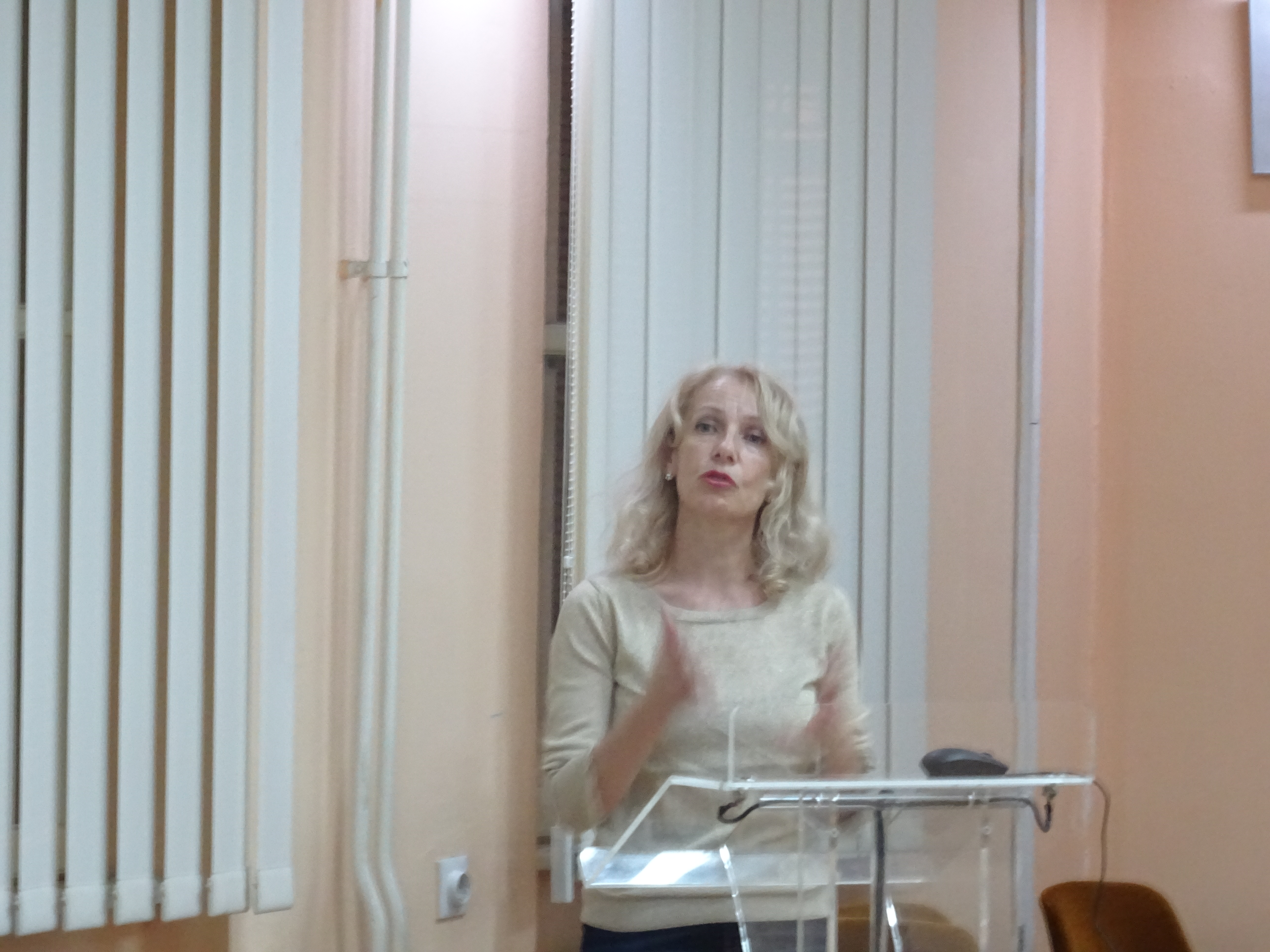
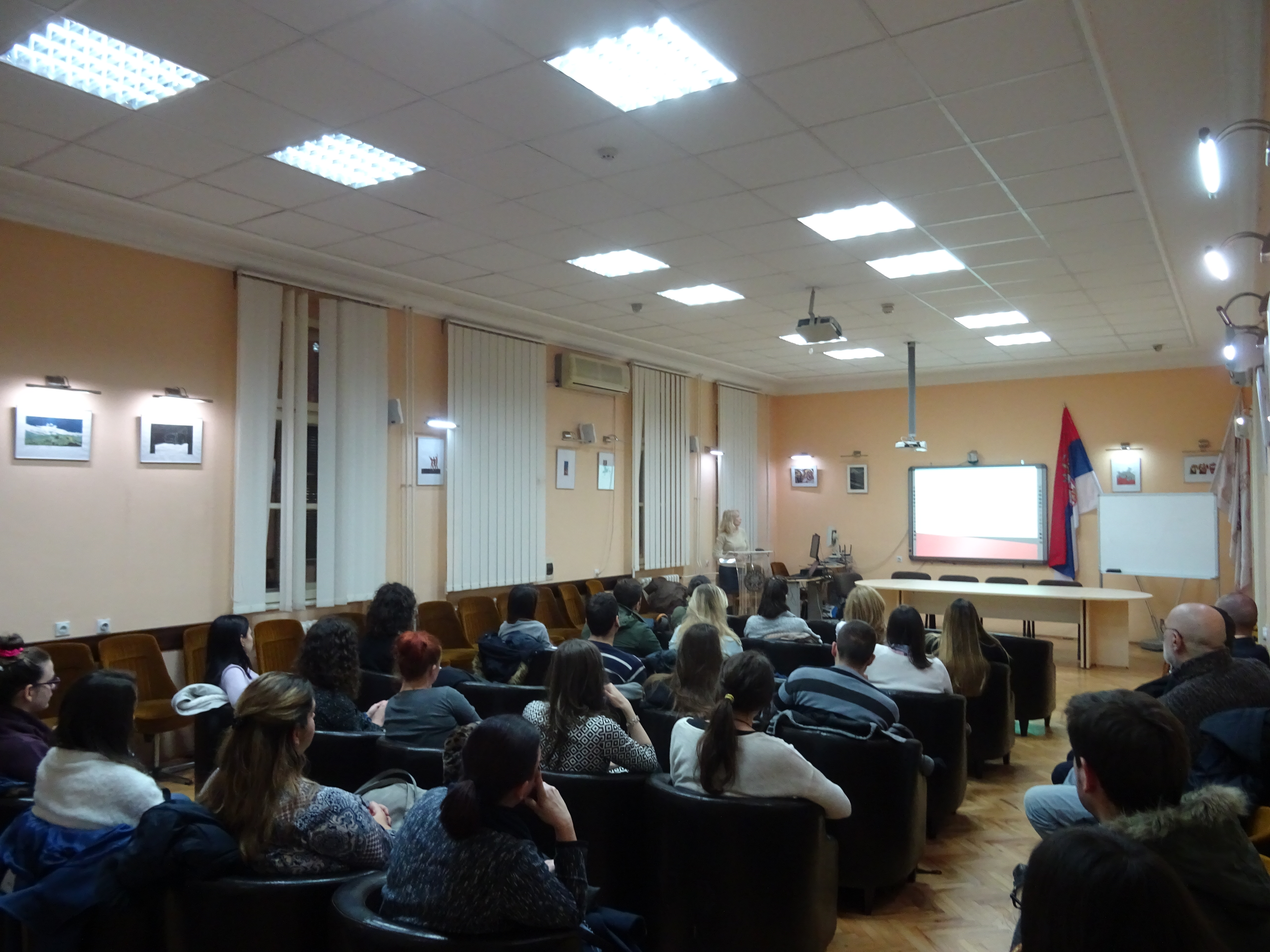
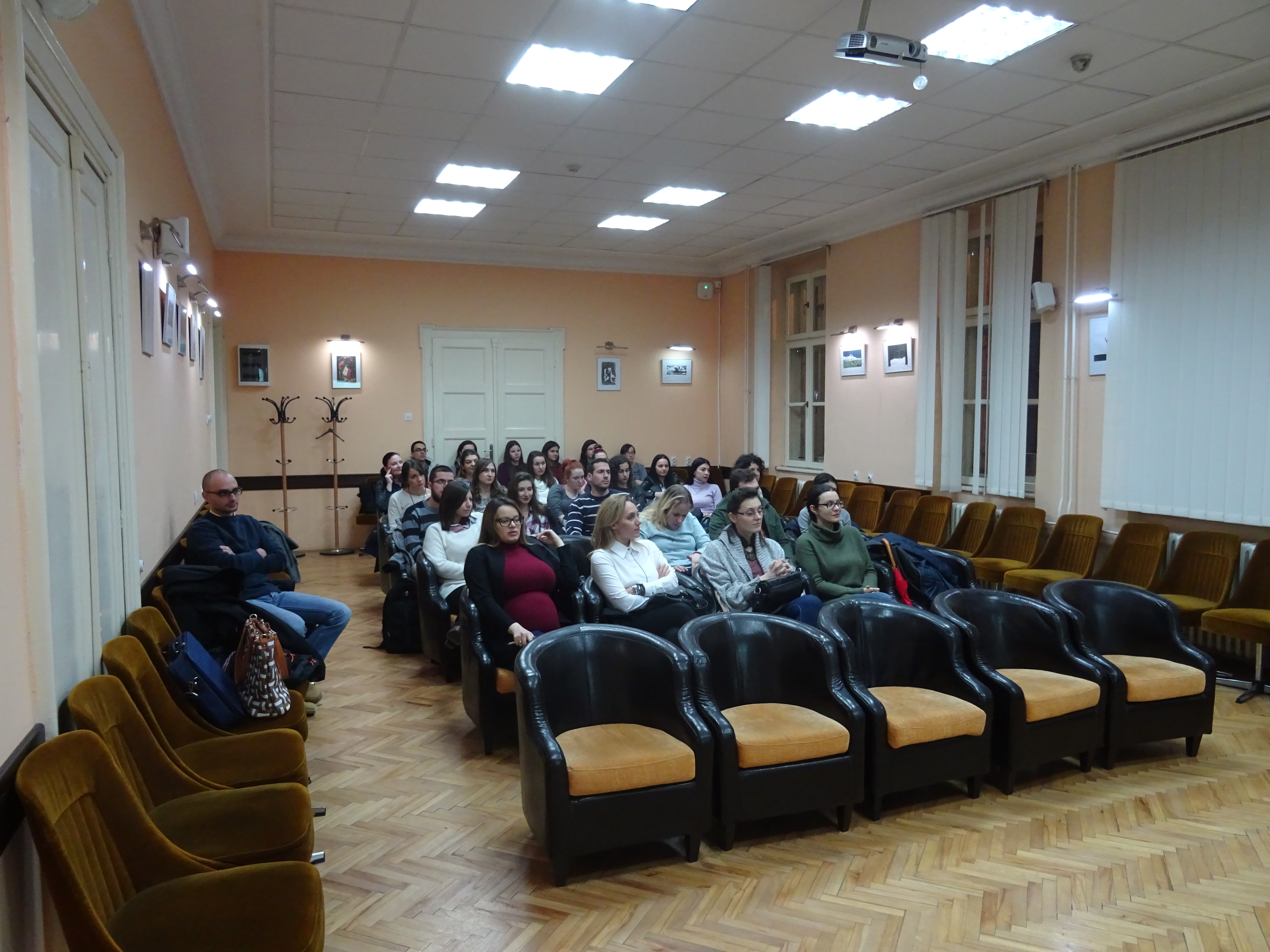
06/12/2017
Nikola Stojanović's lecture
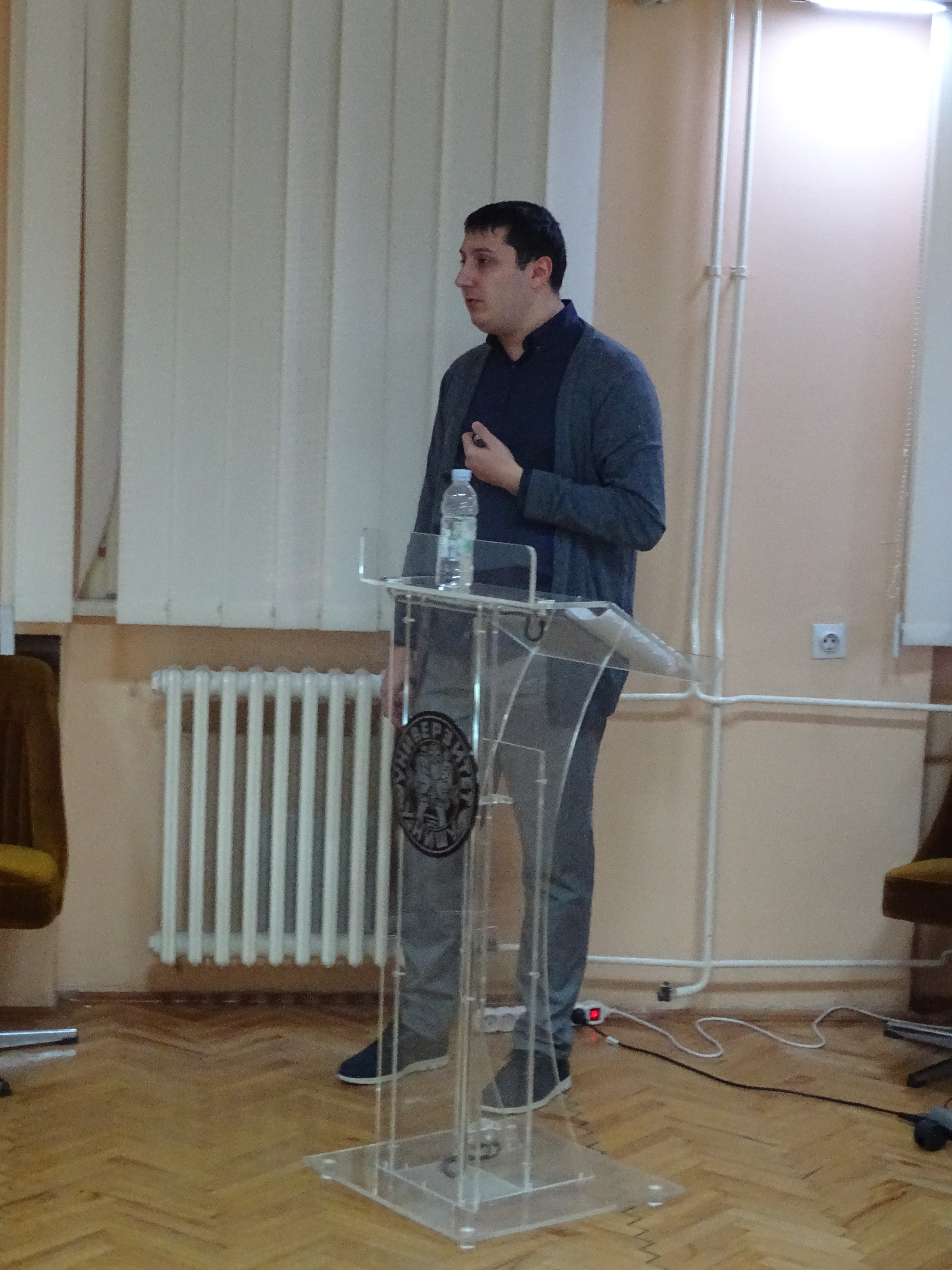
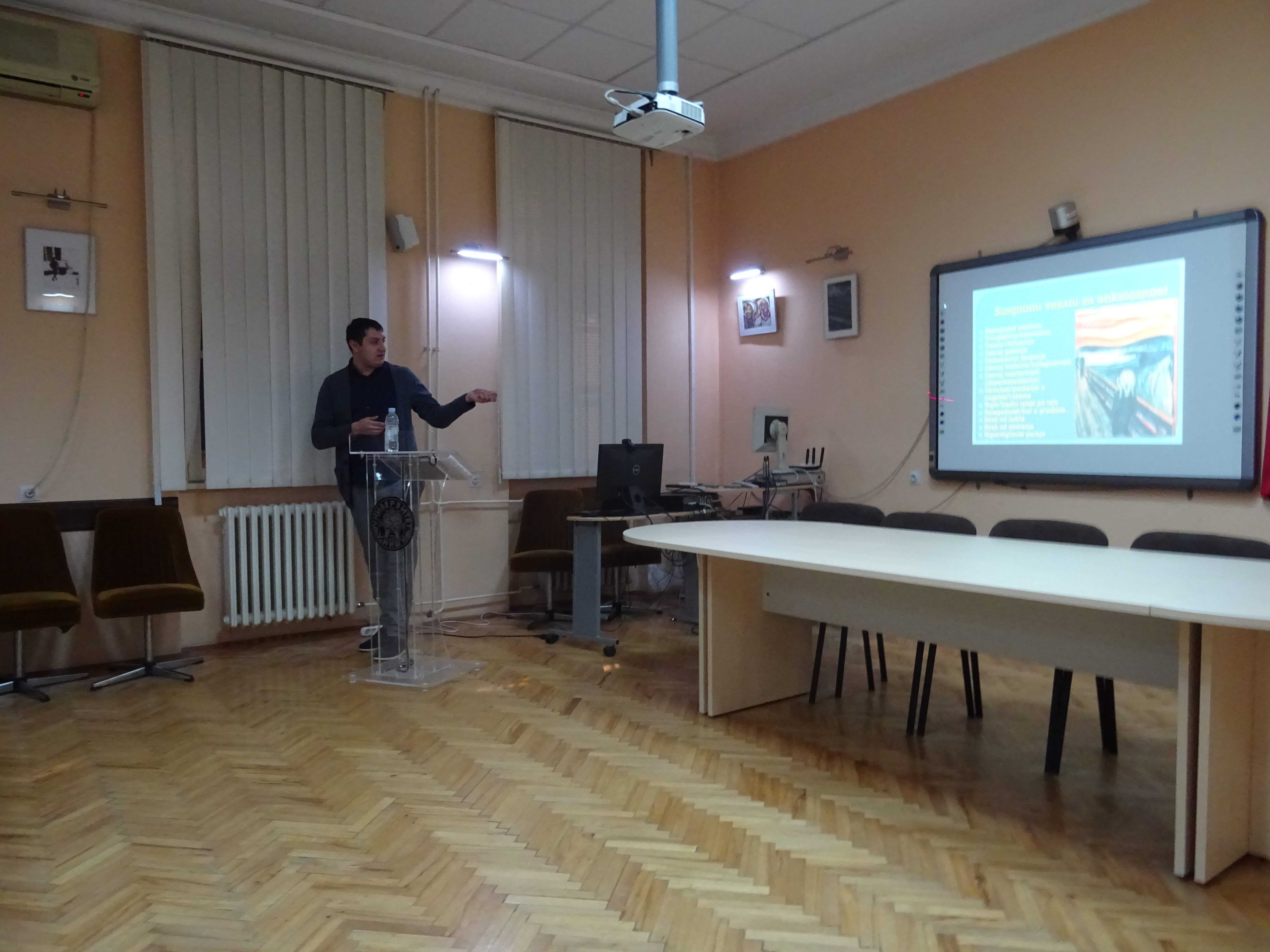
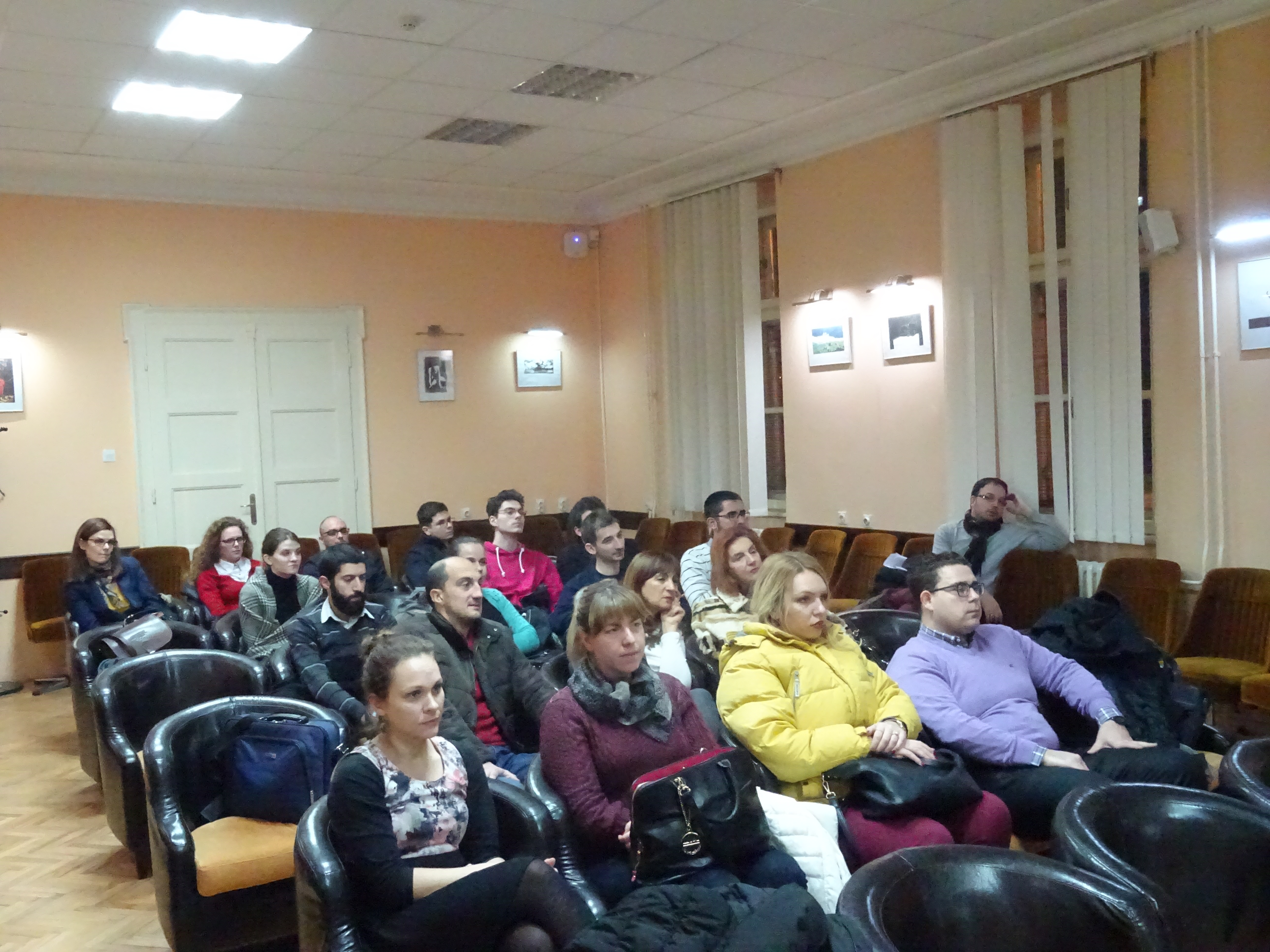
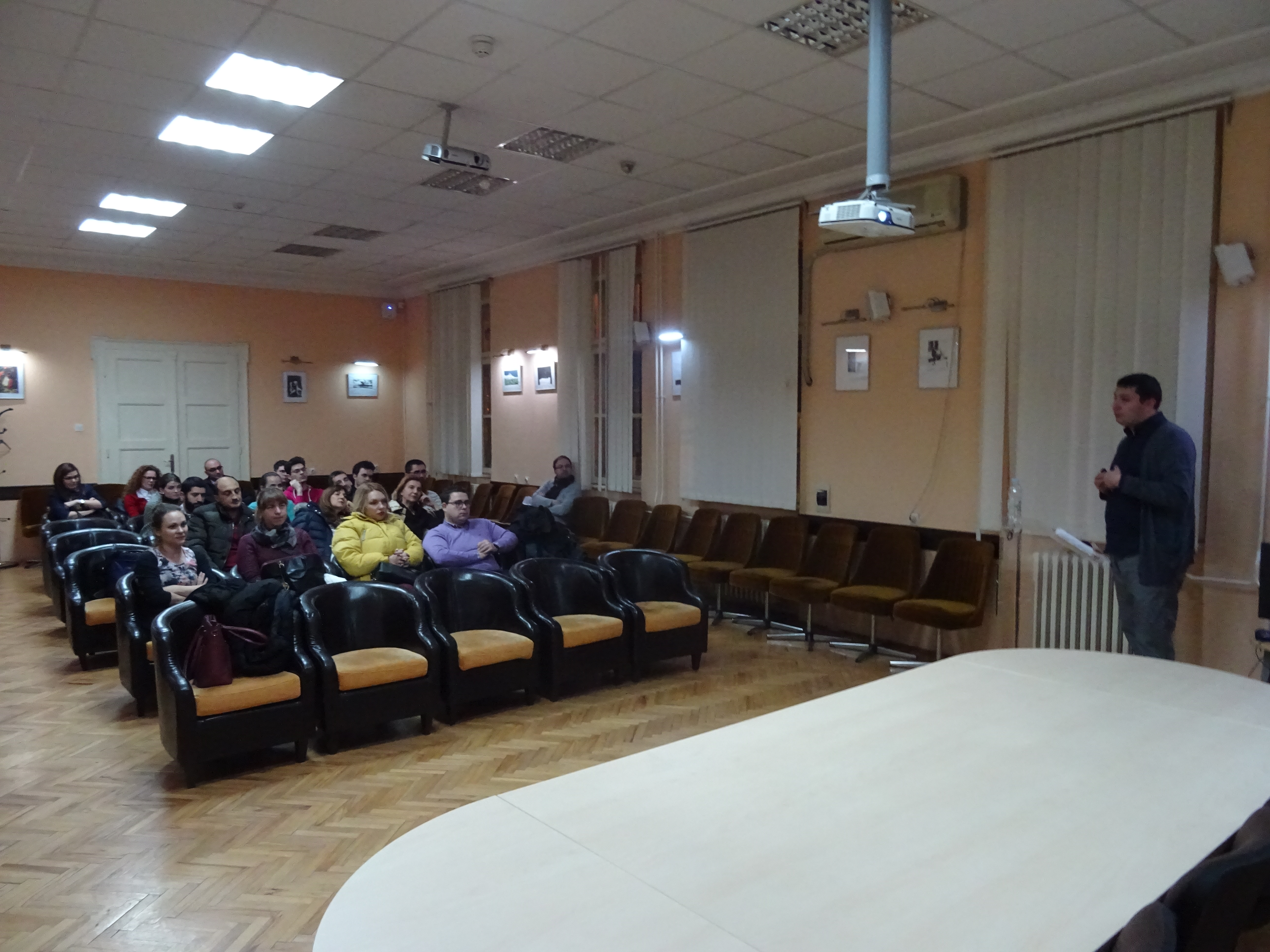
17/05/2017
Dr Nešić's lecture
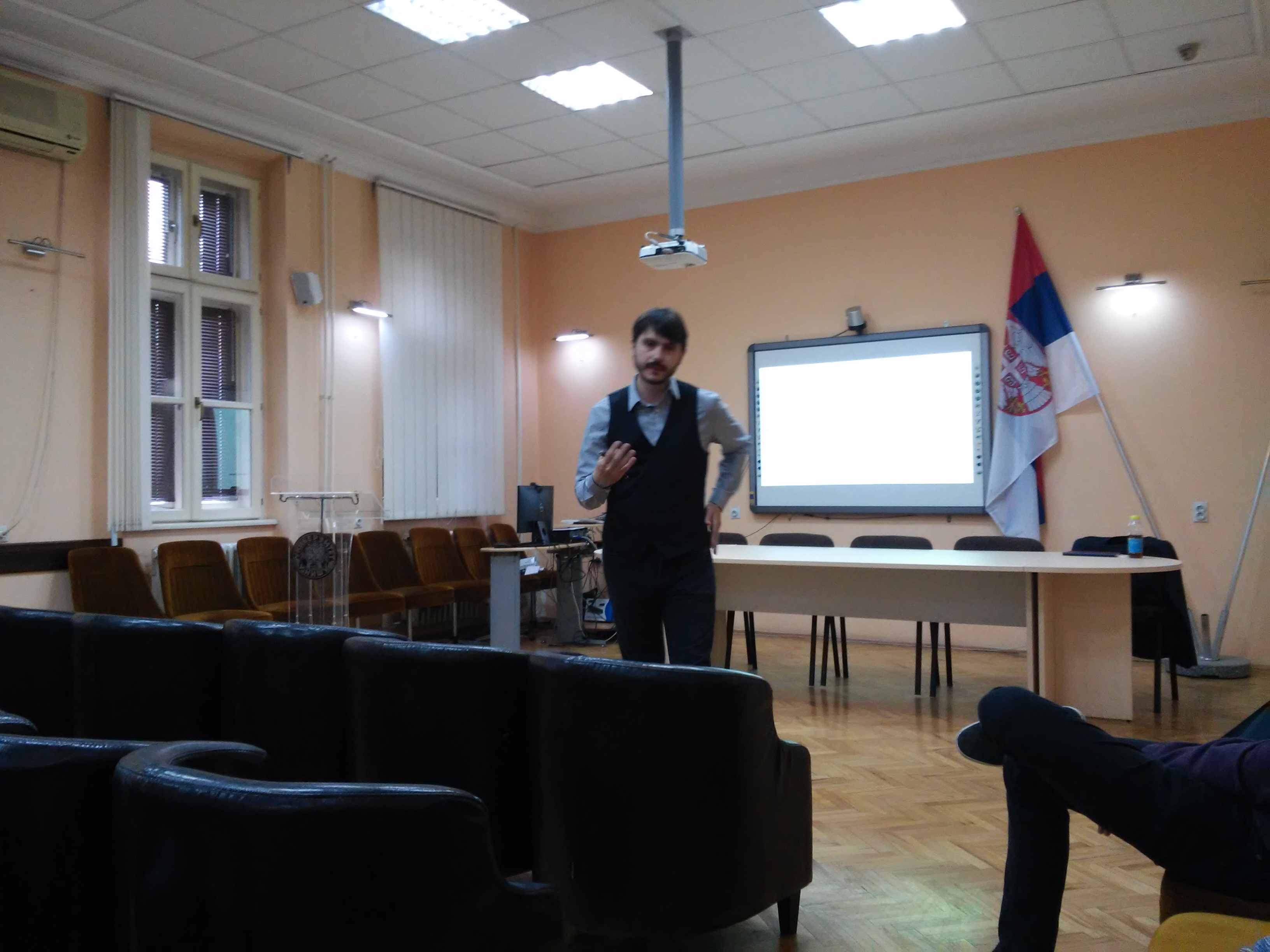
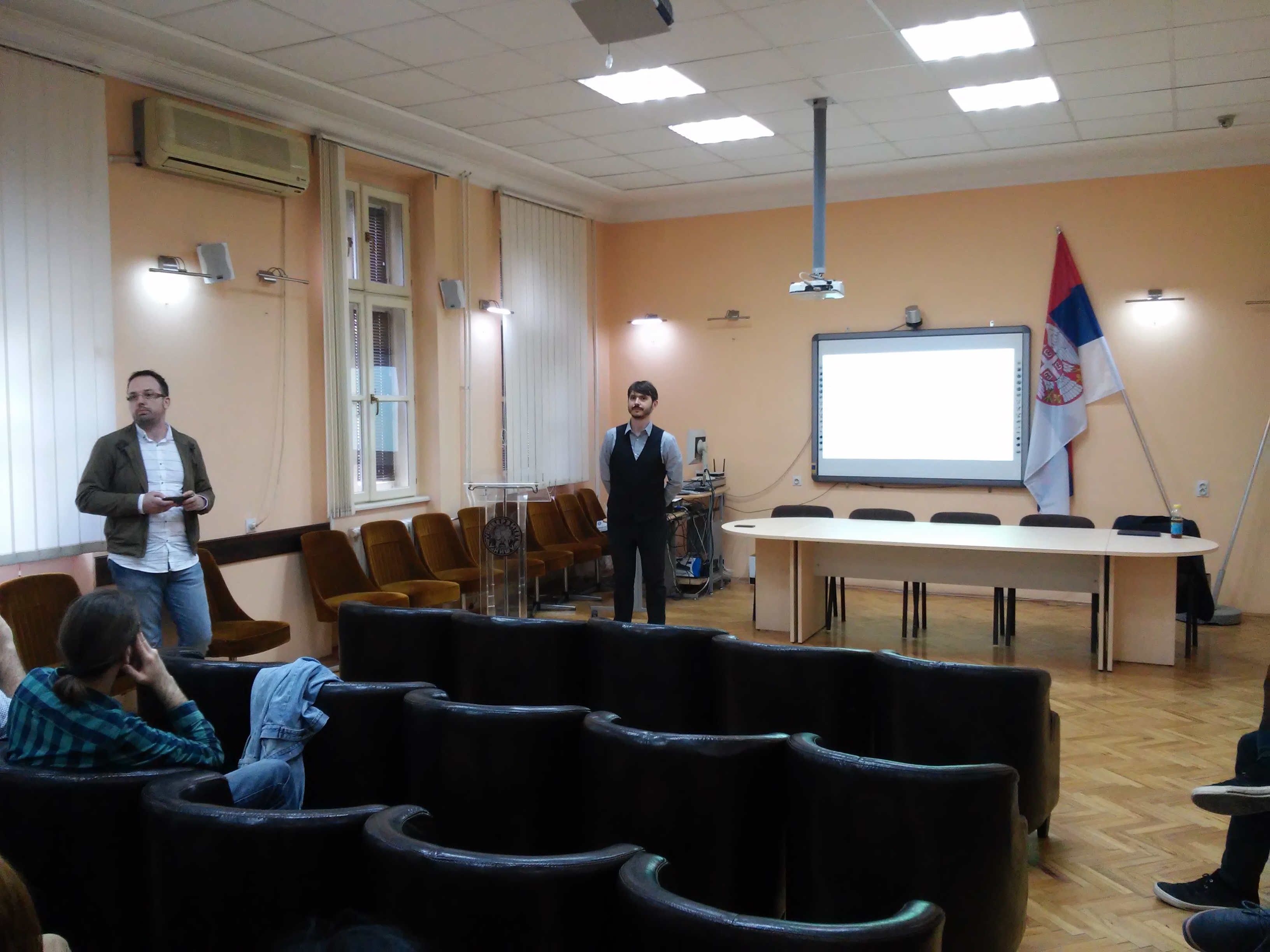
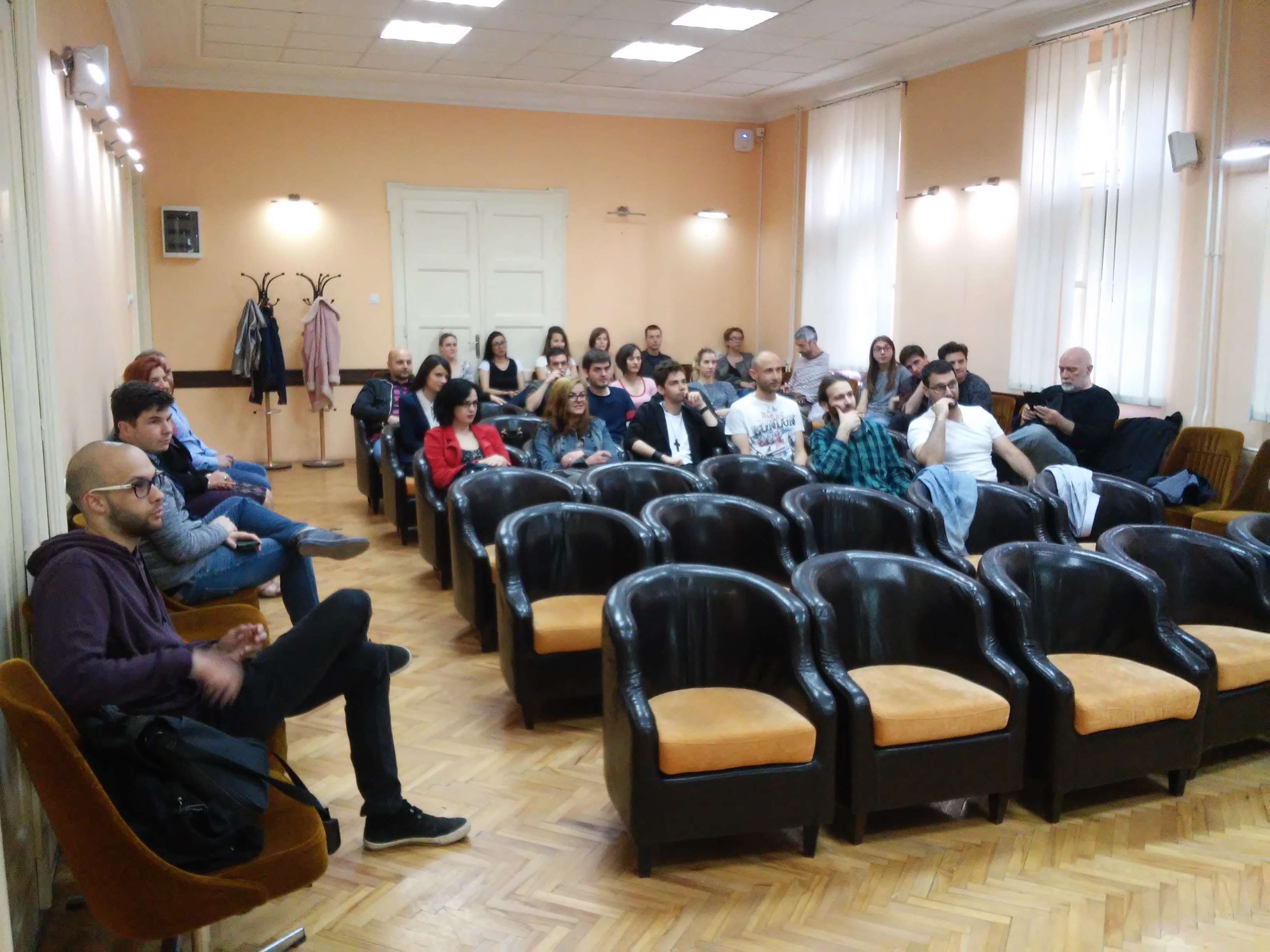
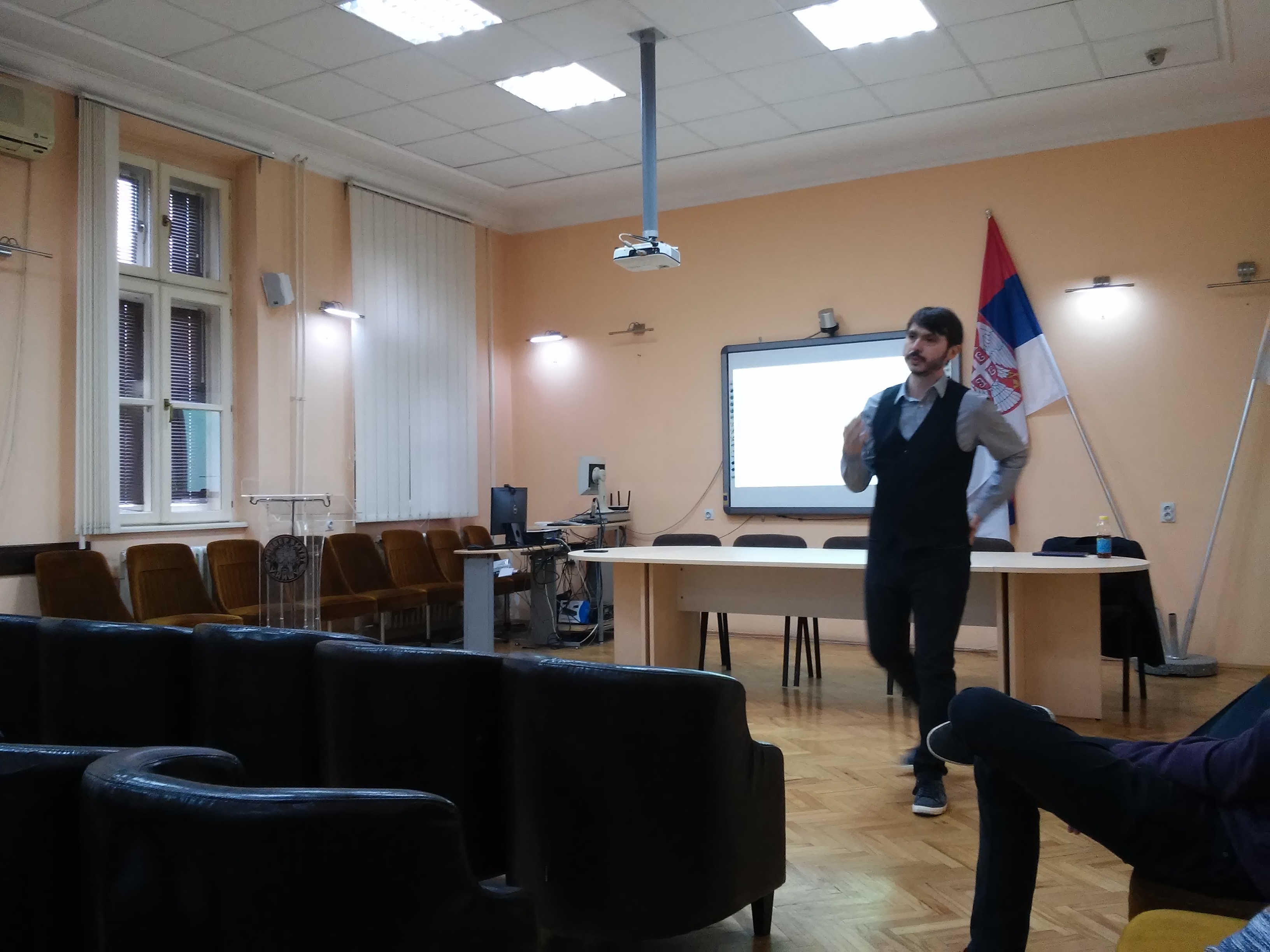
March - April 2017
Educational seminar Current Trends in Cognitive Sciences
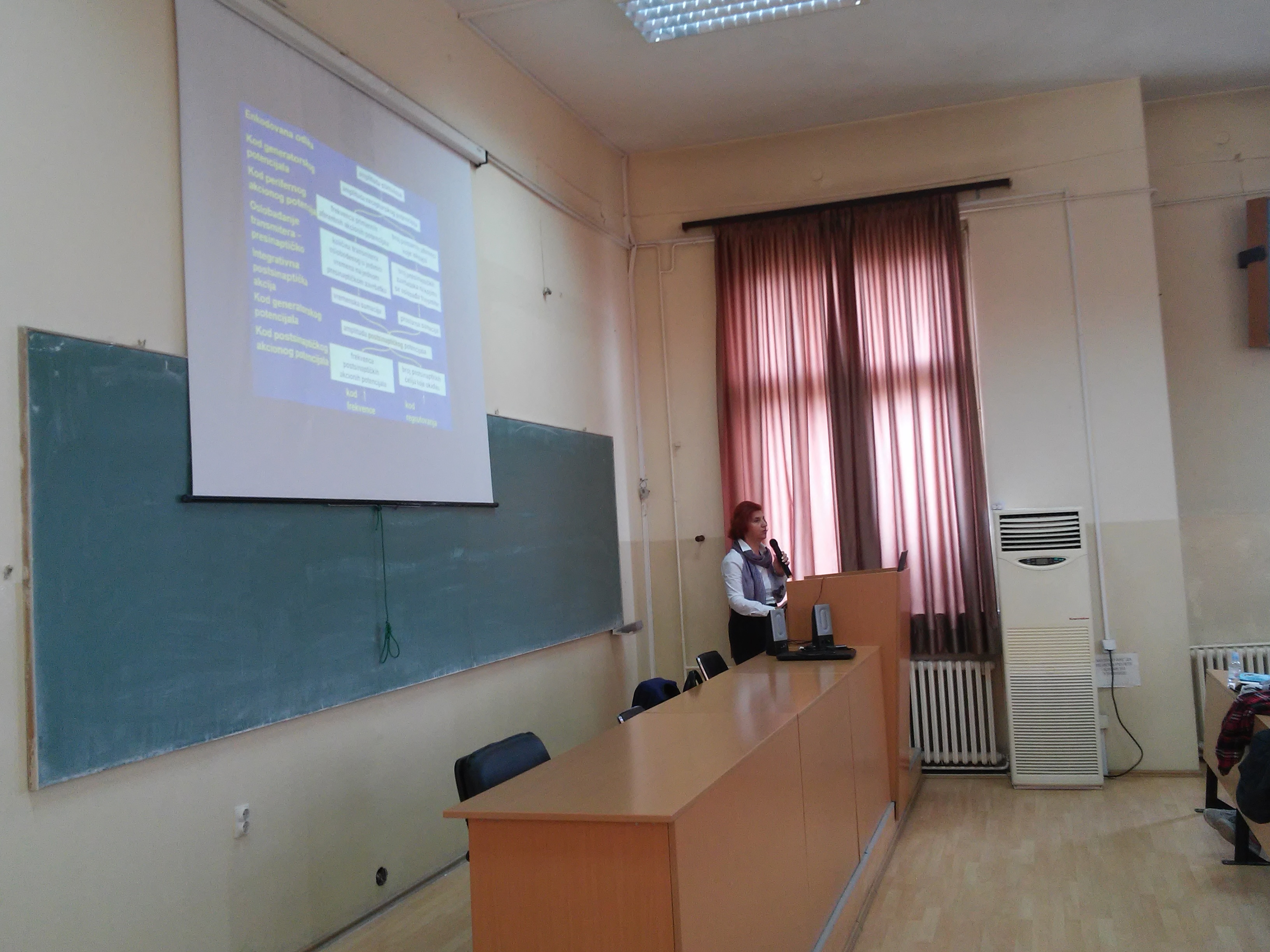
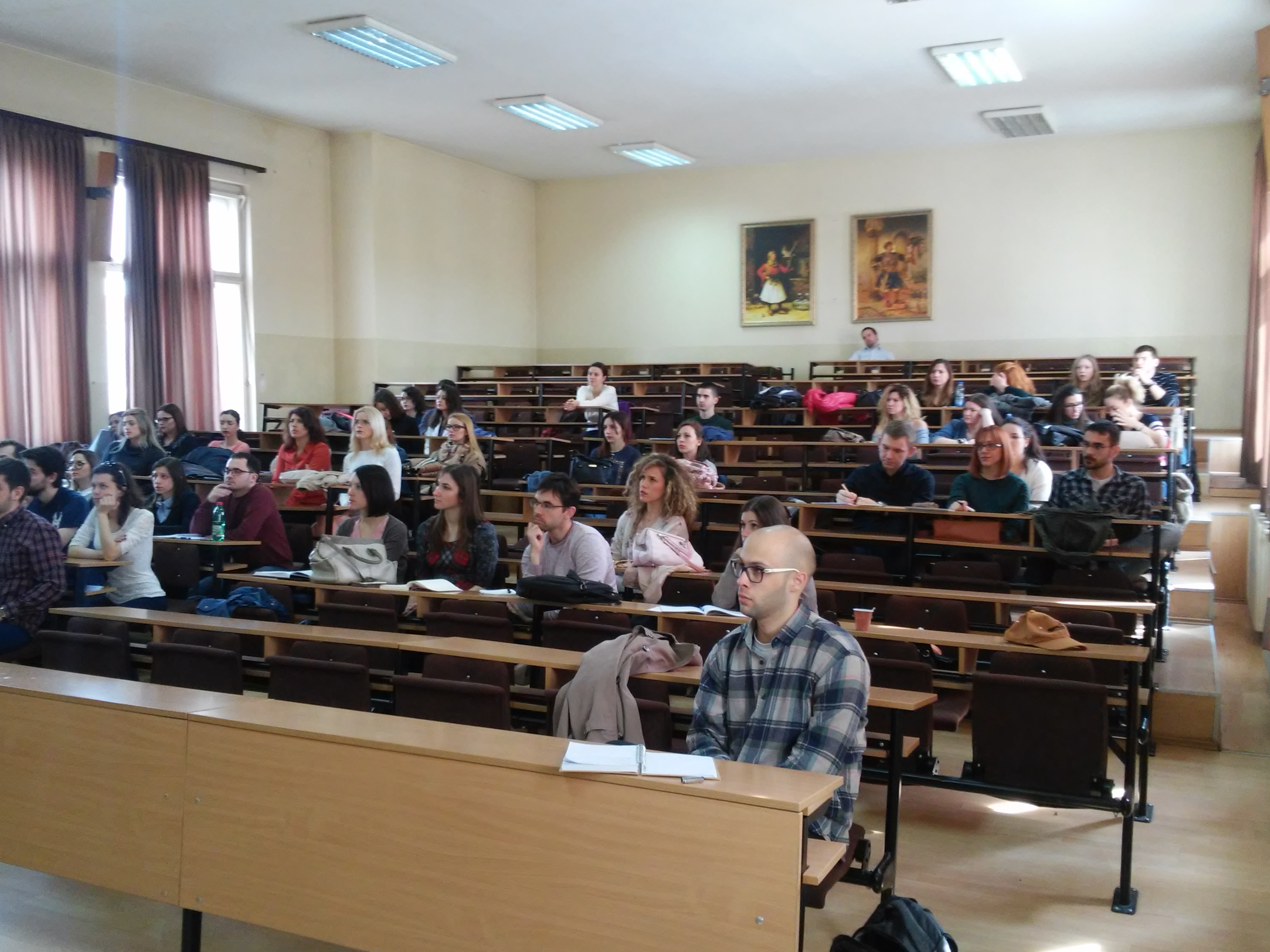
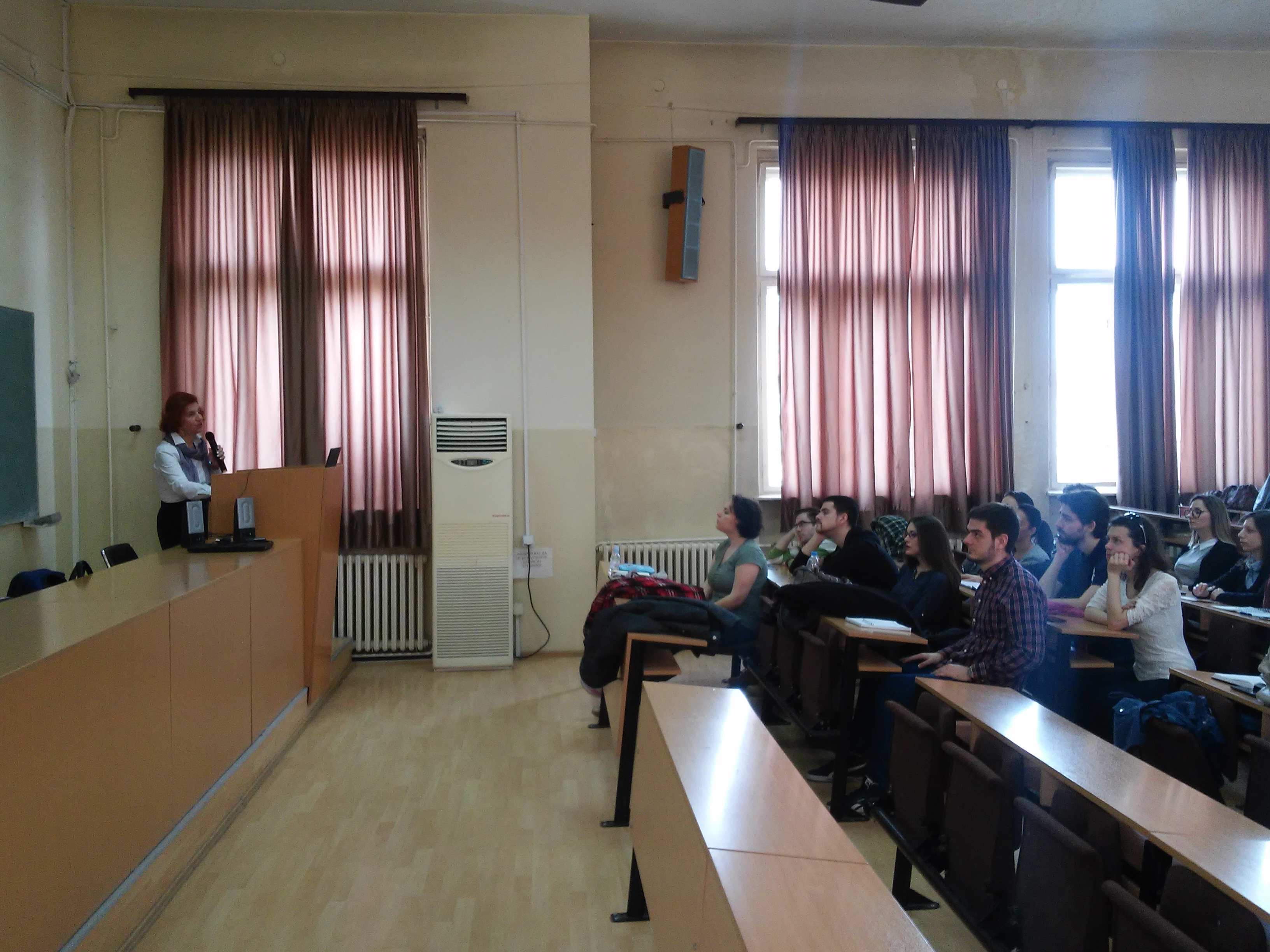
On Saturday, March 25th, 2017, two lectures were given in lecture hall no. 8 in the main University building.
The first lecture, titled The Link Between Linguistics and Musicology: Theoretical, Methodological, and Experimental Basics, was given by Prof. Mihailo Antović, Ph.D., Head of Center for Cognitive Sciences. The lecture explored various frameworks that address the problem of grounding and meaning construction in various contexts.
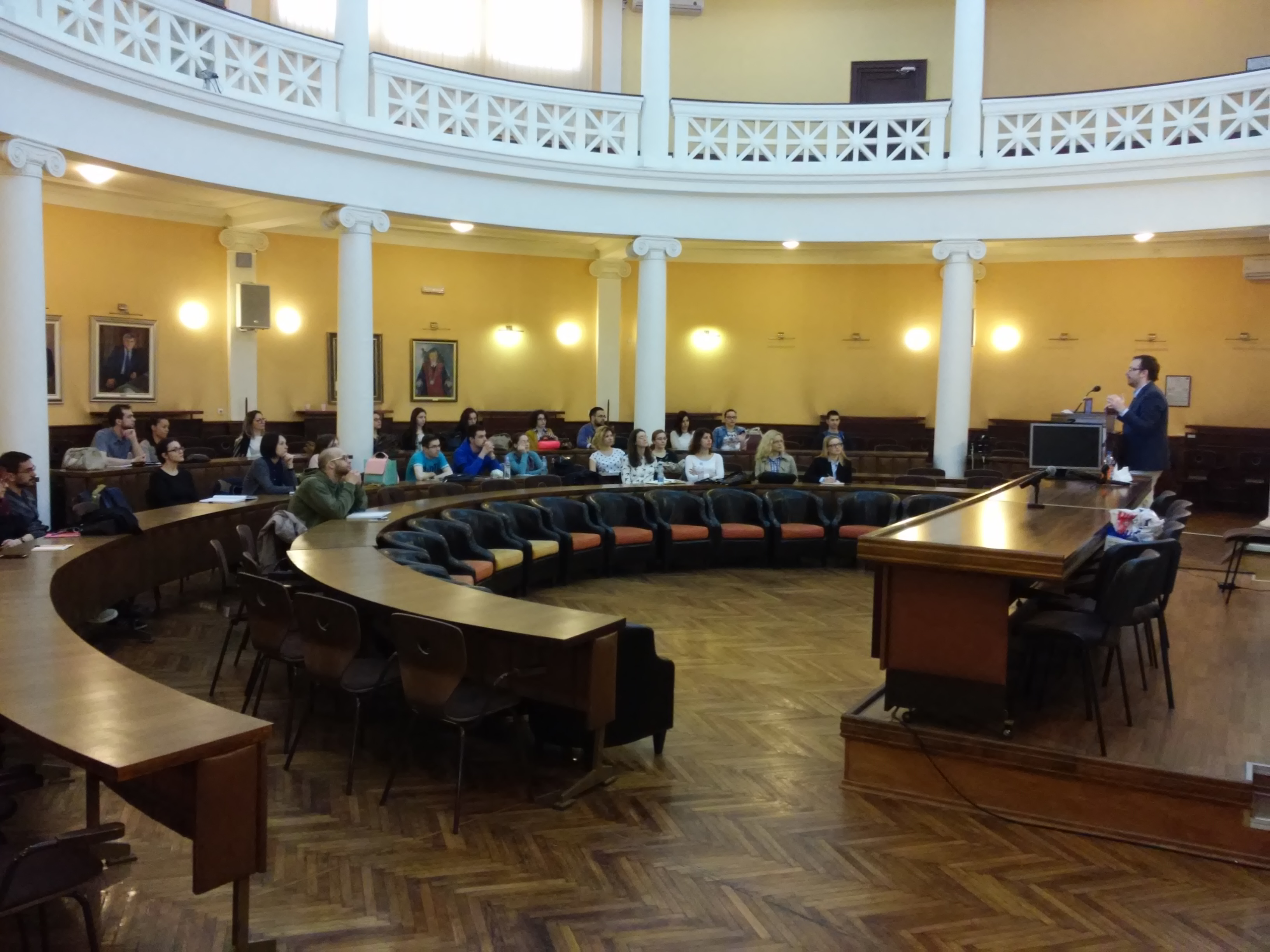
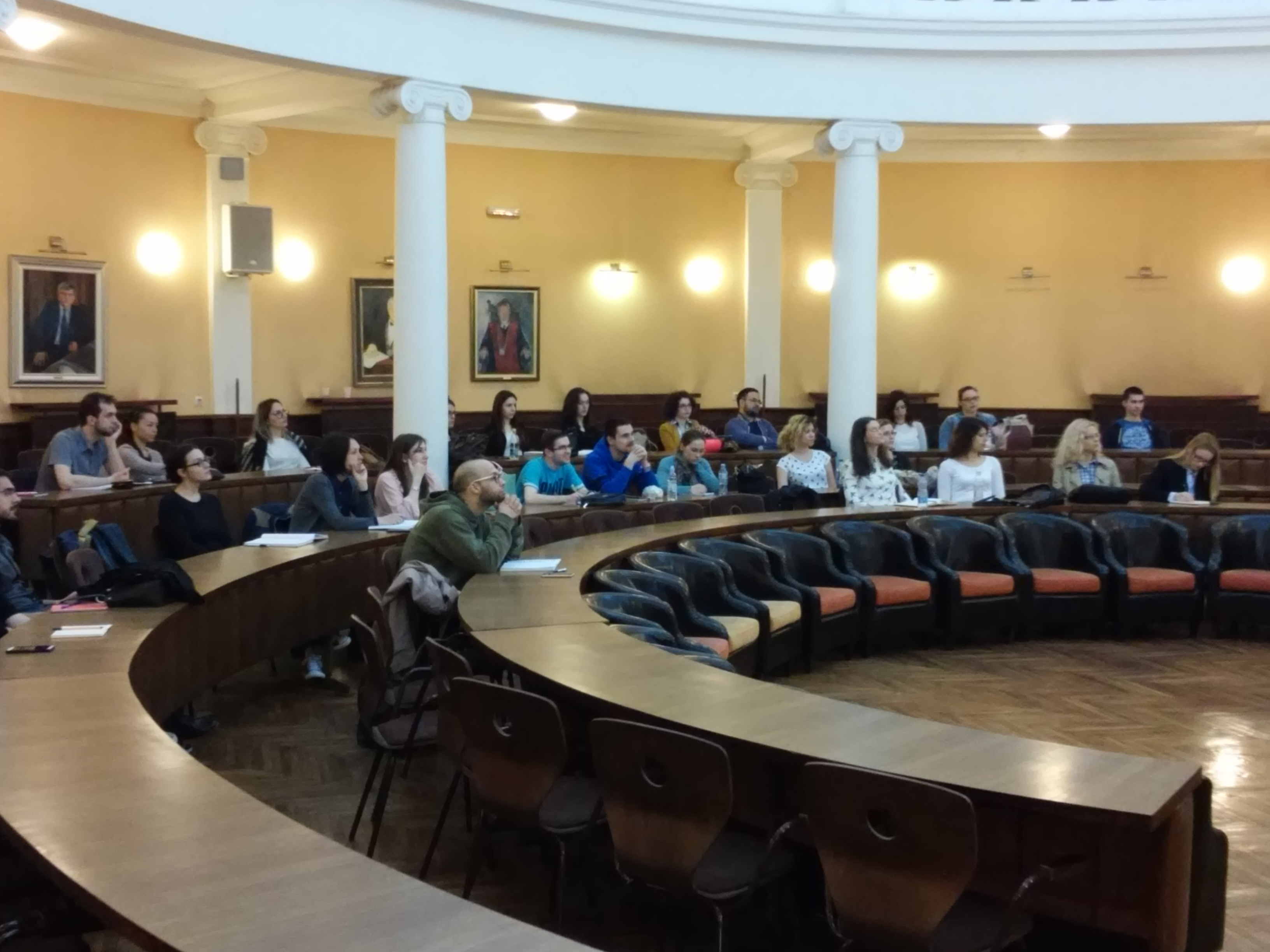
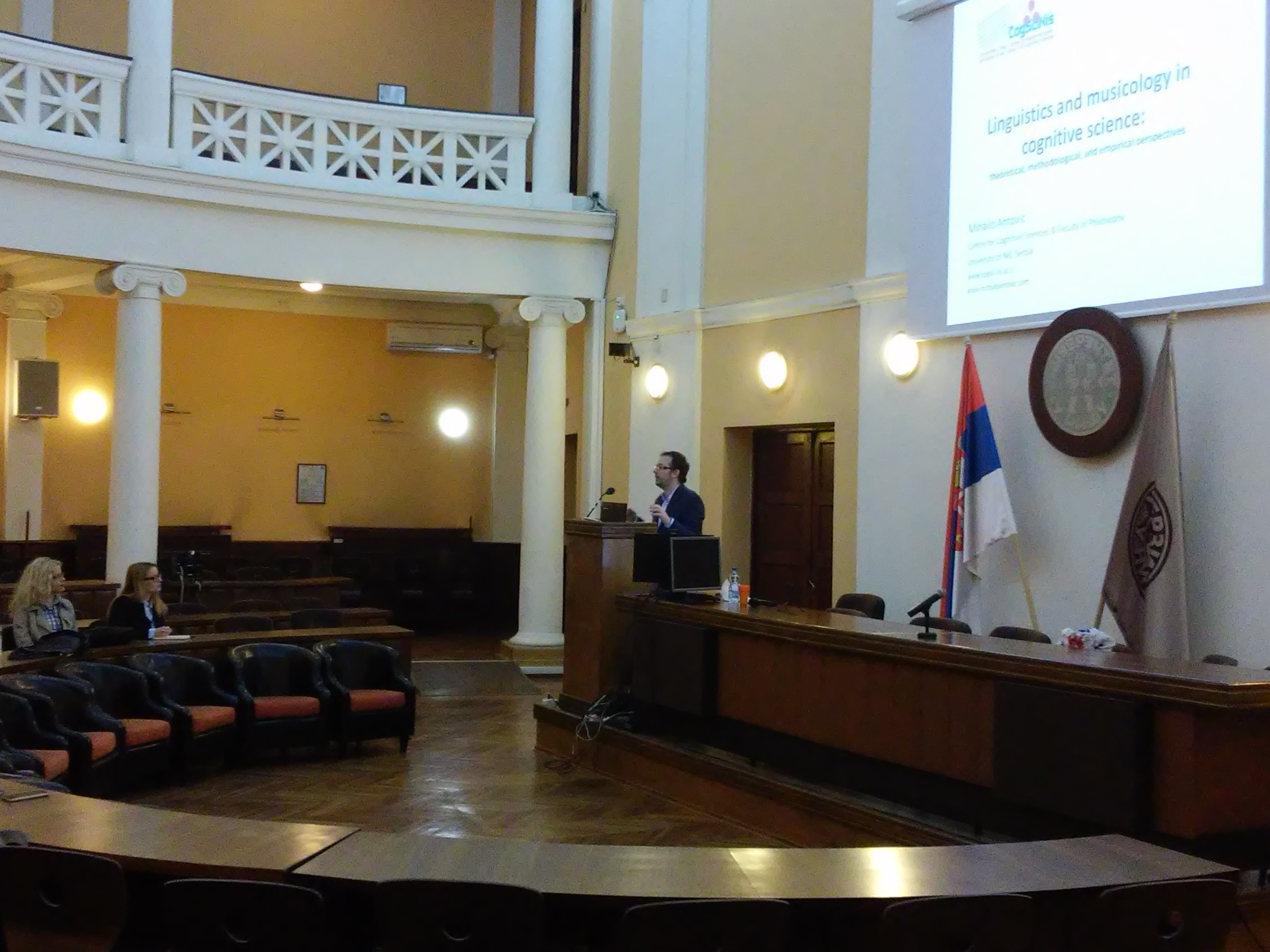
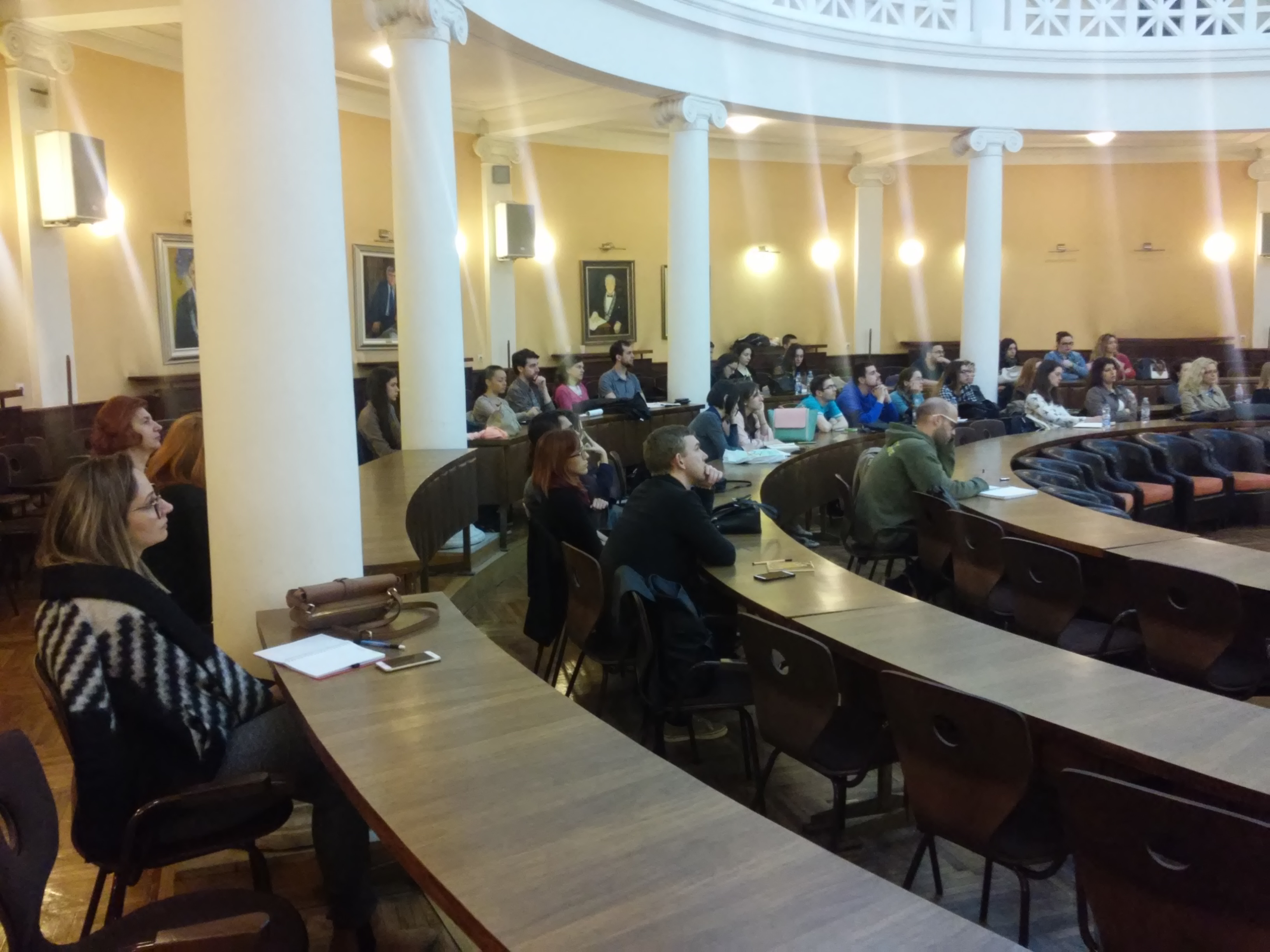
The second lecture was given by Prof. Đorđe Vidanović, Ph.D., CogSci Forum Coordinator, and it was titled The Semantics of Consciousness. Dr Vidanović provided an elaborate discussion on the problem of consciousness from the perspective of Philosophy of Mind, and its implications for the study of cognitive sciences.
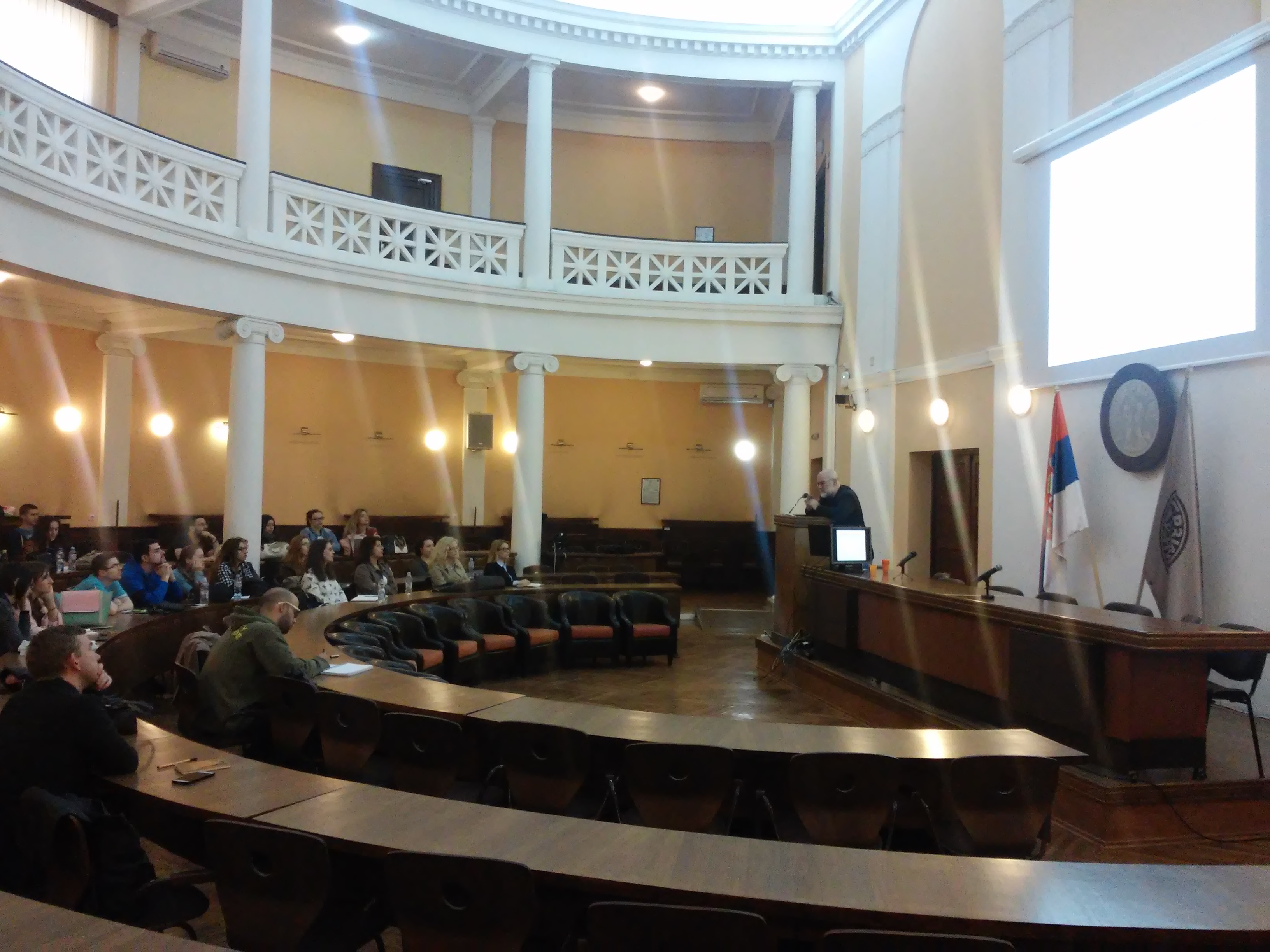
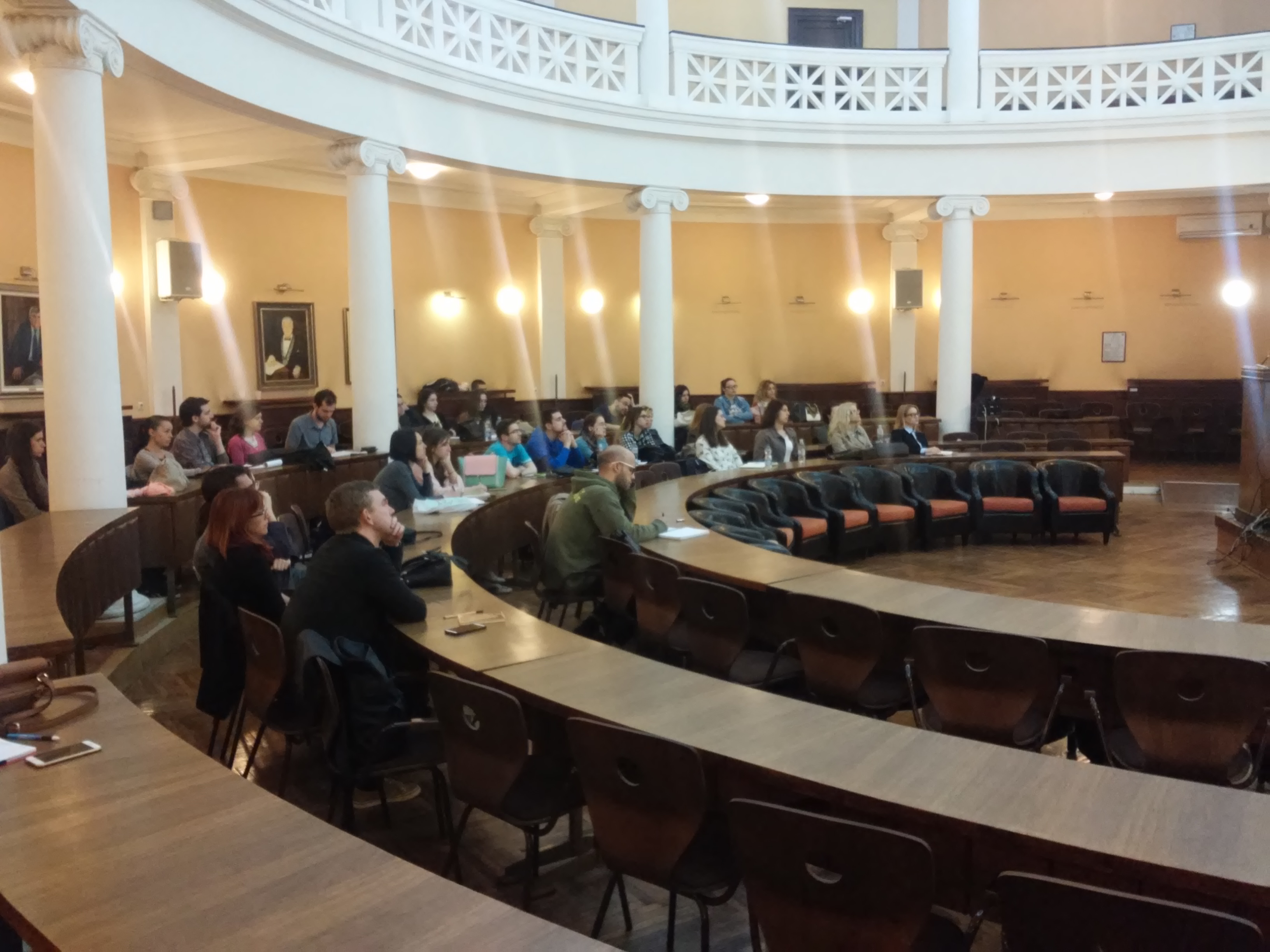
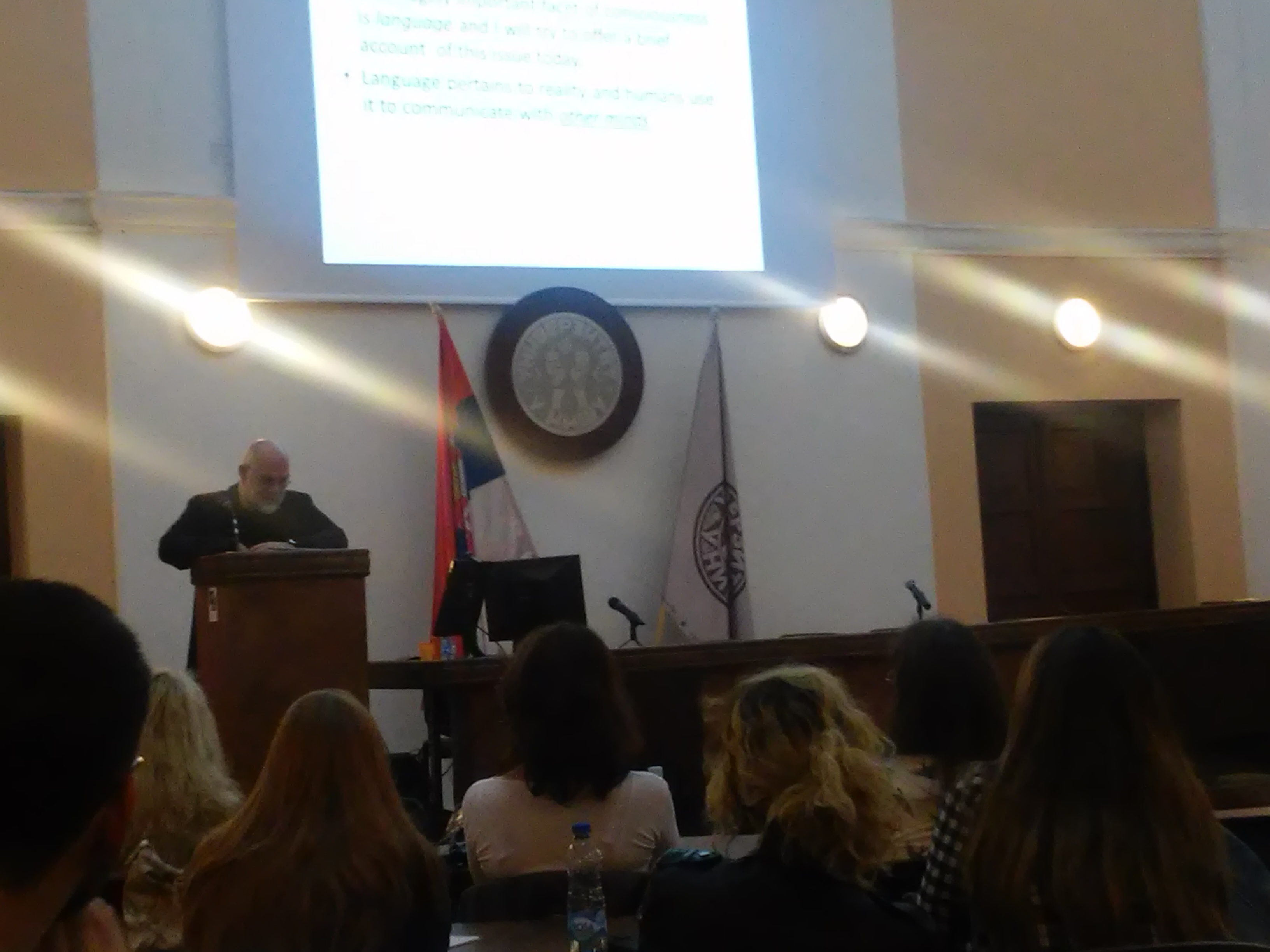
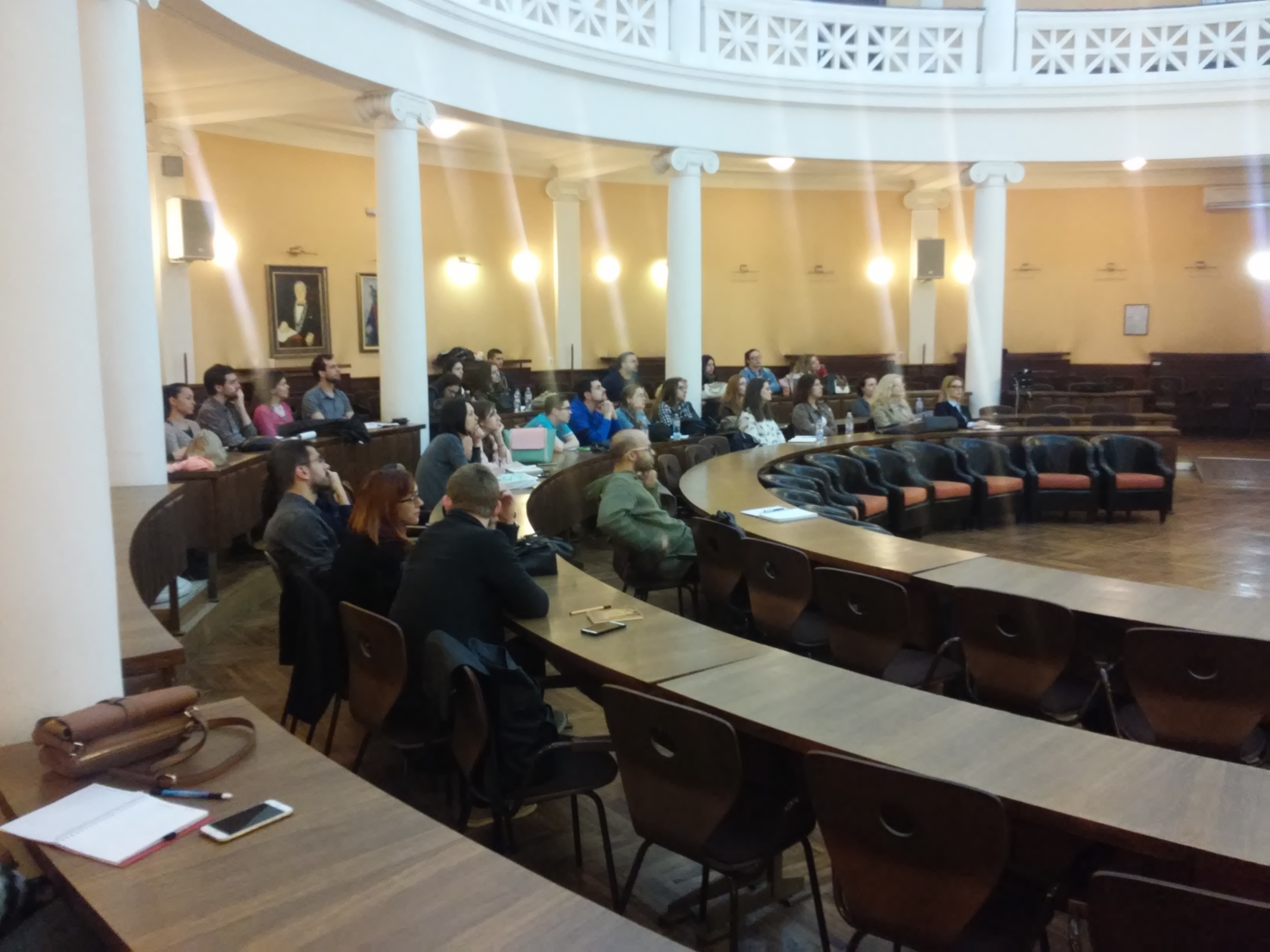
Saturday, April 1st, 2017, hosted two lectures that were given in lecture hall no. 8 in the main University building.
The first lecture, titled Frame Interaction and Network Equilibrium in Conceptual Metaphors: Discussing the Explanatory Adequacy of Conceptual Blending, was given by Vladimir Figar, MA.
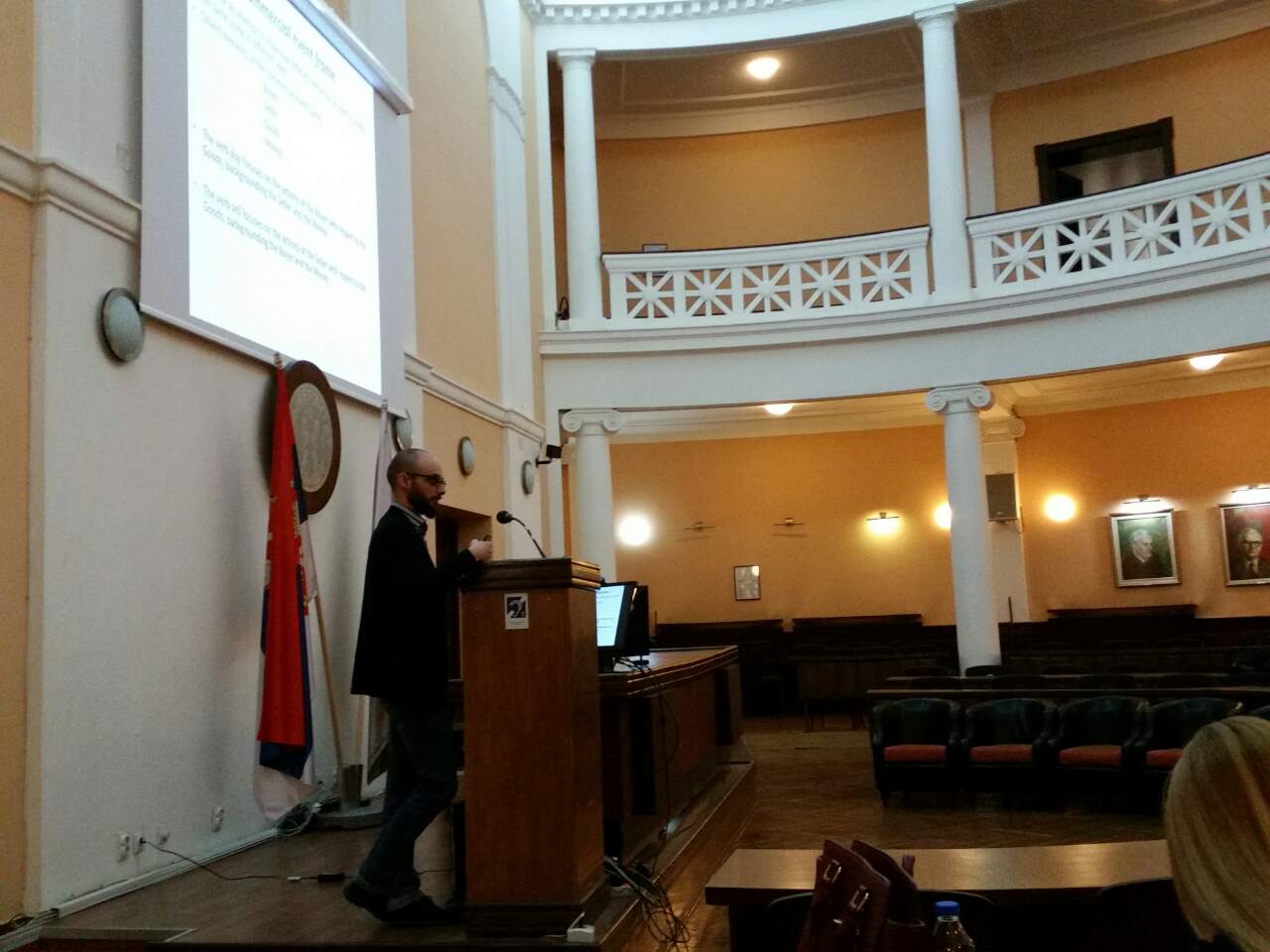
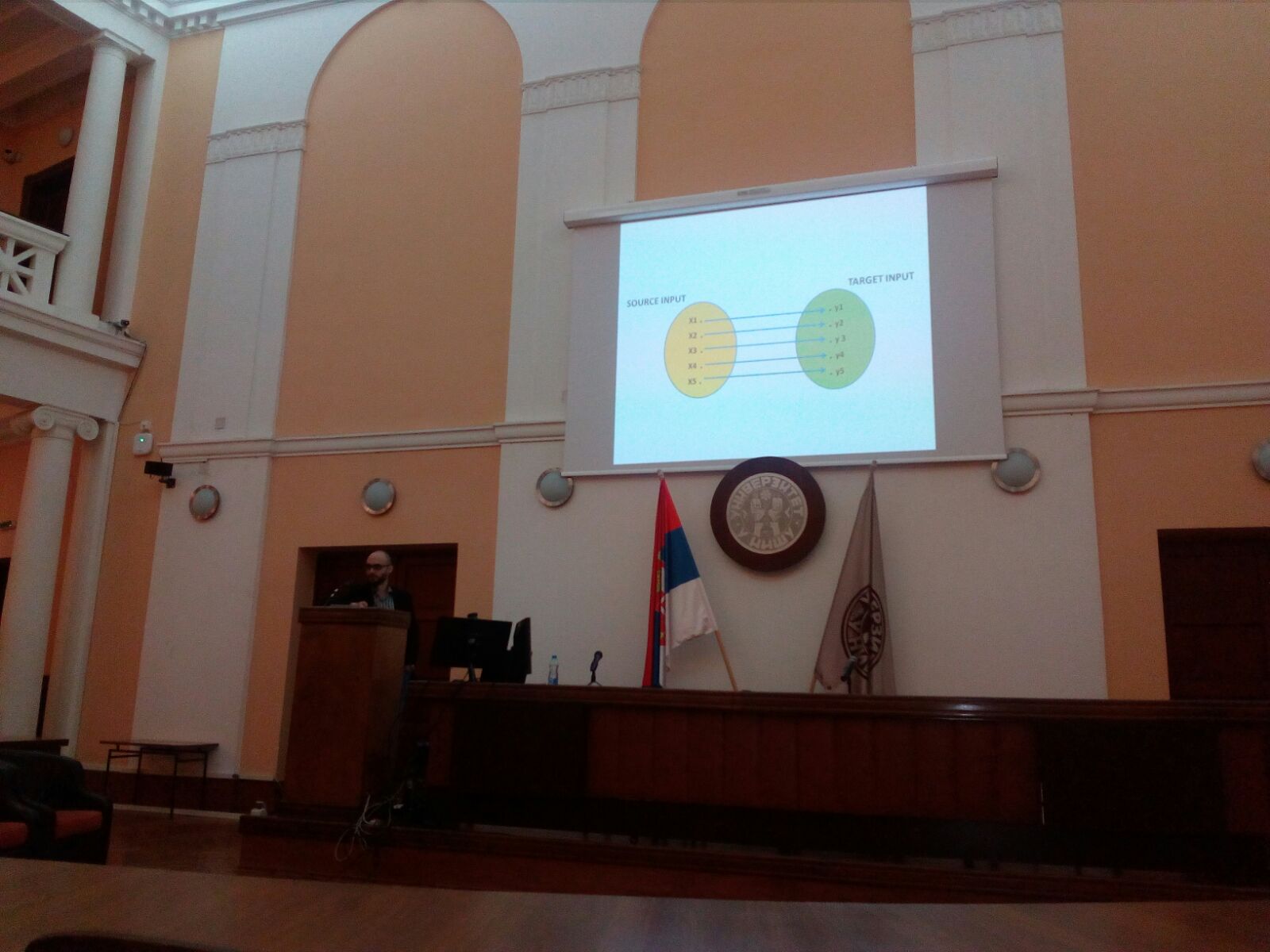
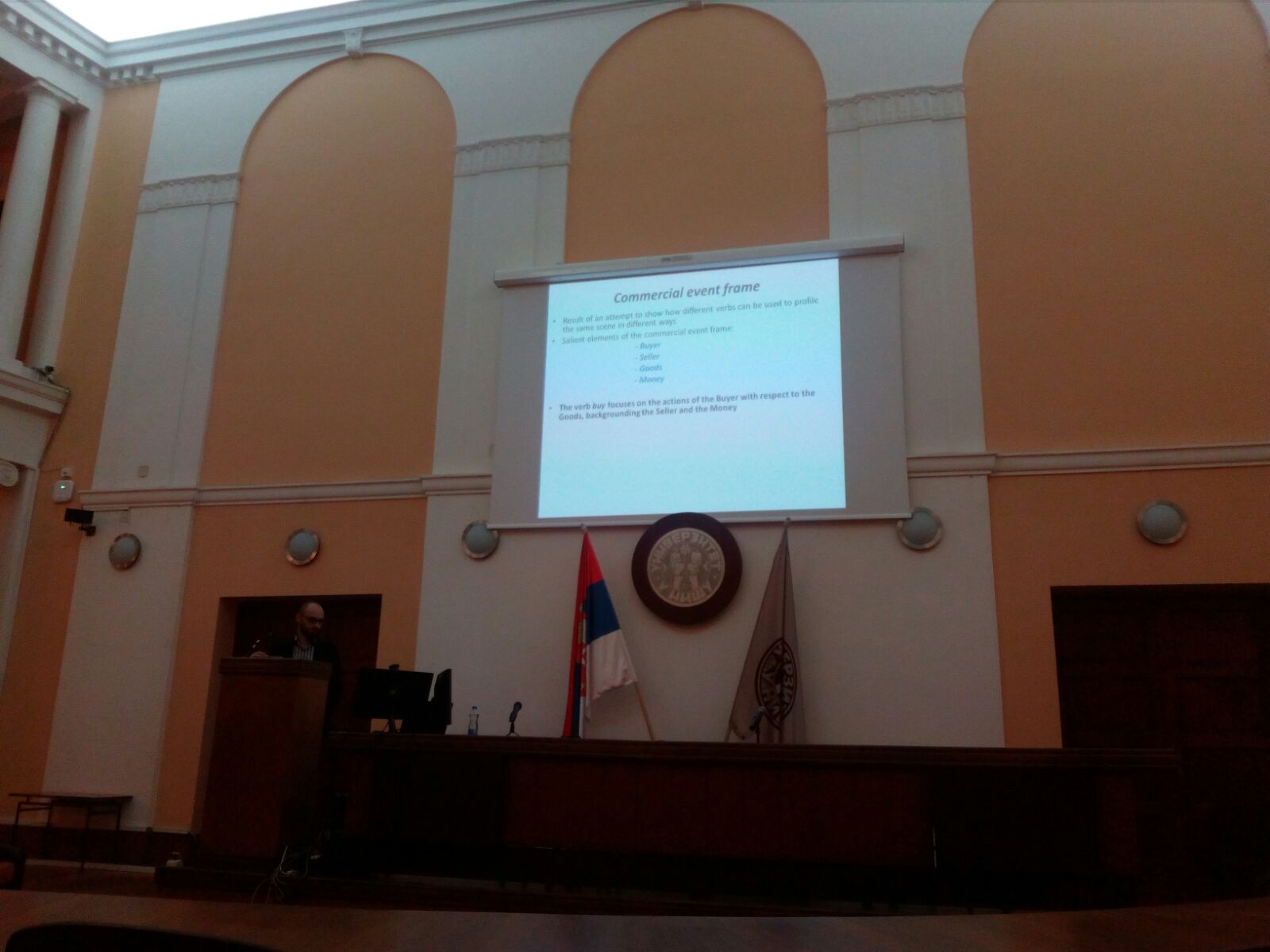
The second lecture/workshop, titled Identifying and Analyzing Metaphor and Metonymy in Comics was given by Asst. Prof. Dušan Stamenković, Ph.D., CogSci Secretary, and Miloš Tasić, MA, from the Faculty of Machine Engineering, University of Niš. After the main part of the lecture, participants from the audience analyzed some specific instances of metaphor and metonymy in comics with the lecturers.
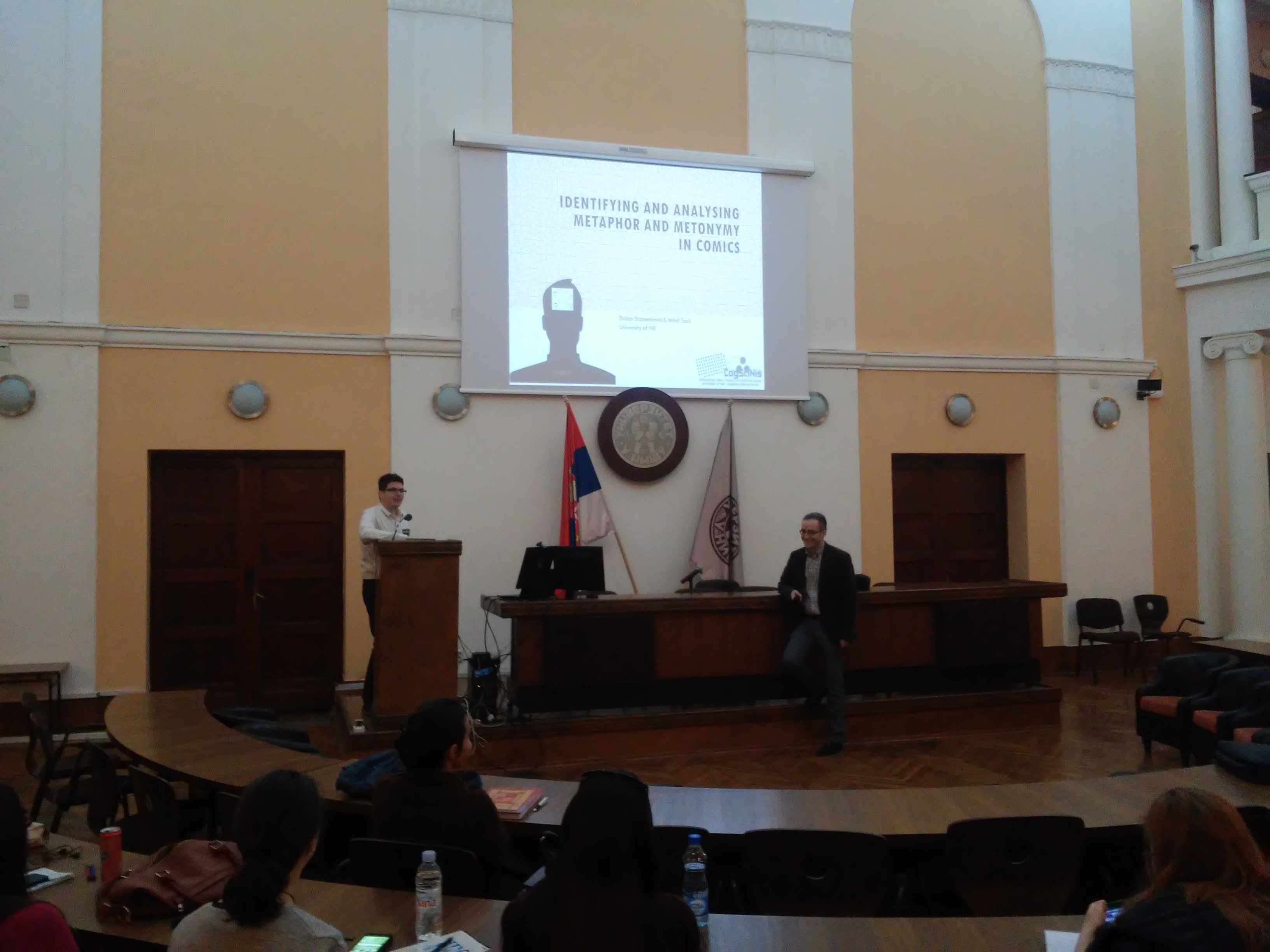
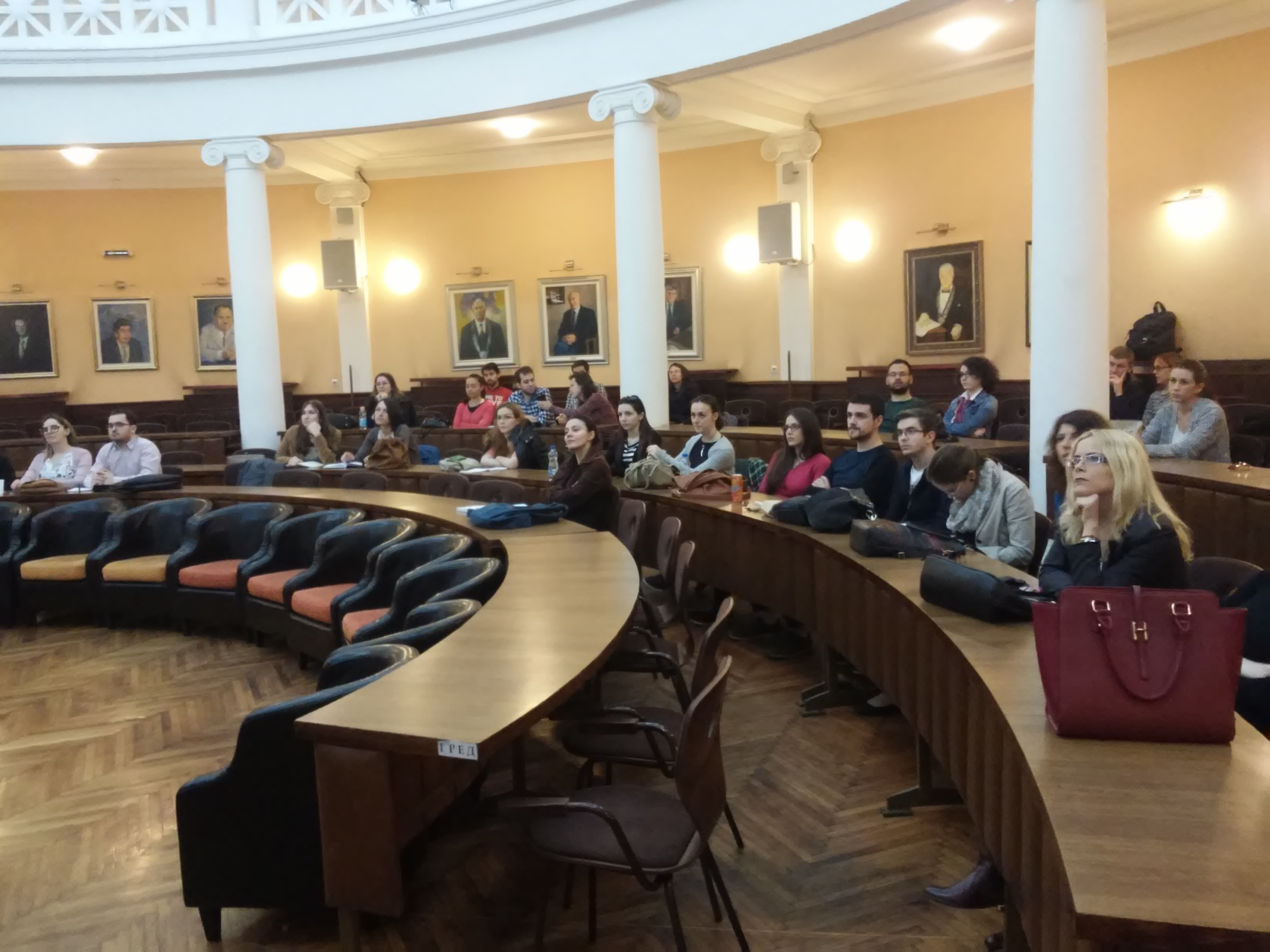
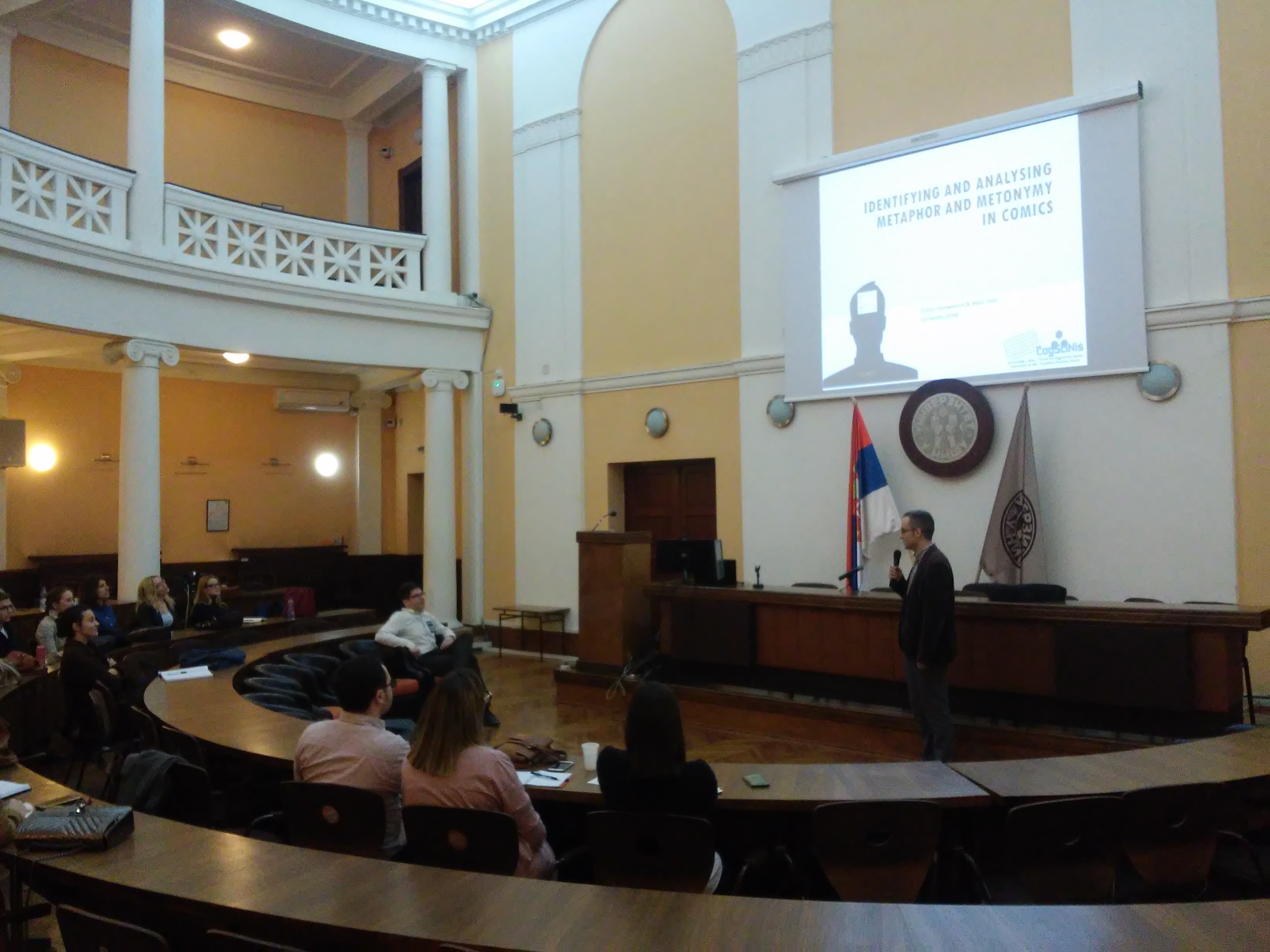
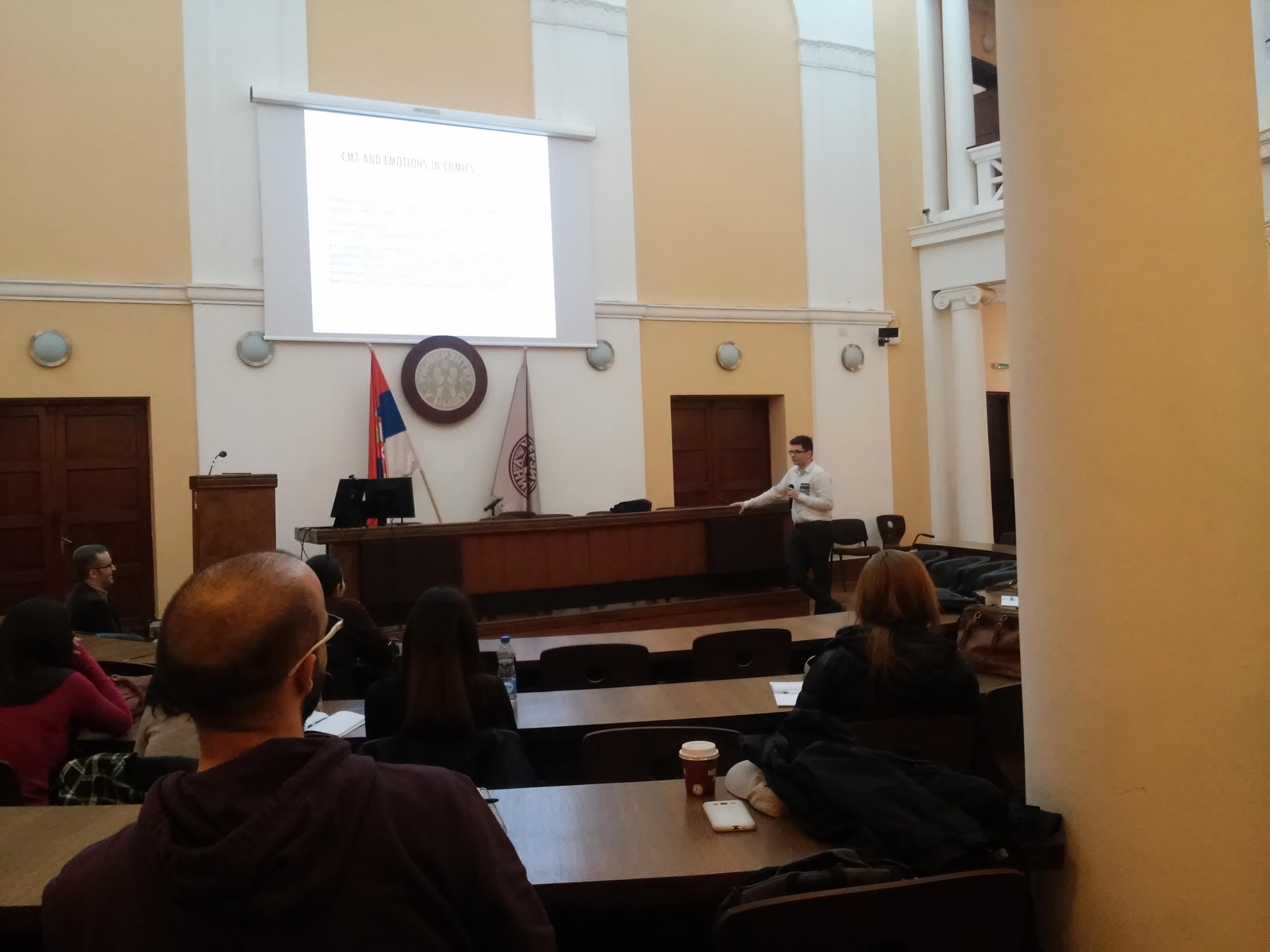
The seminar was concluded on Saturday, April 8th, 2017, with two lectures given by faculty members of the New Bulgarian University, Sophia, Bulgaria.
The first lecture was given by Prof. Maurice Grinberg, Ph.D., and it was titled Social Dilemmas and Game Theory. Dr Grinberg provided a comprehensive overview of research which includes the application of game theory to certain psychological problems.
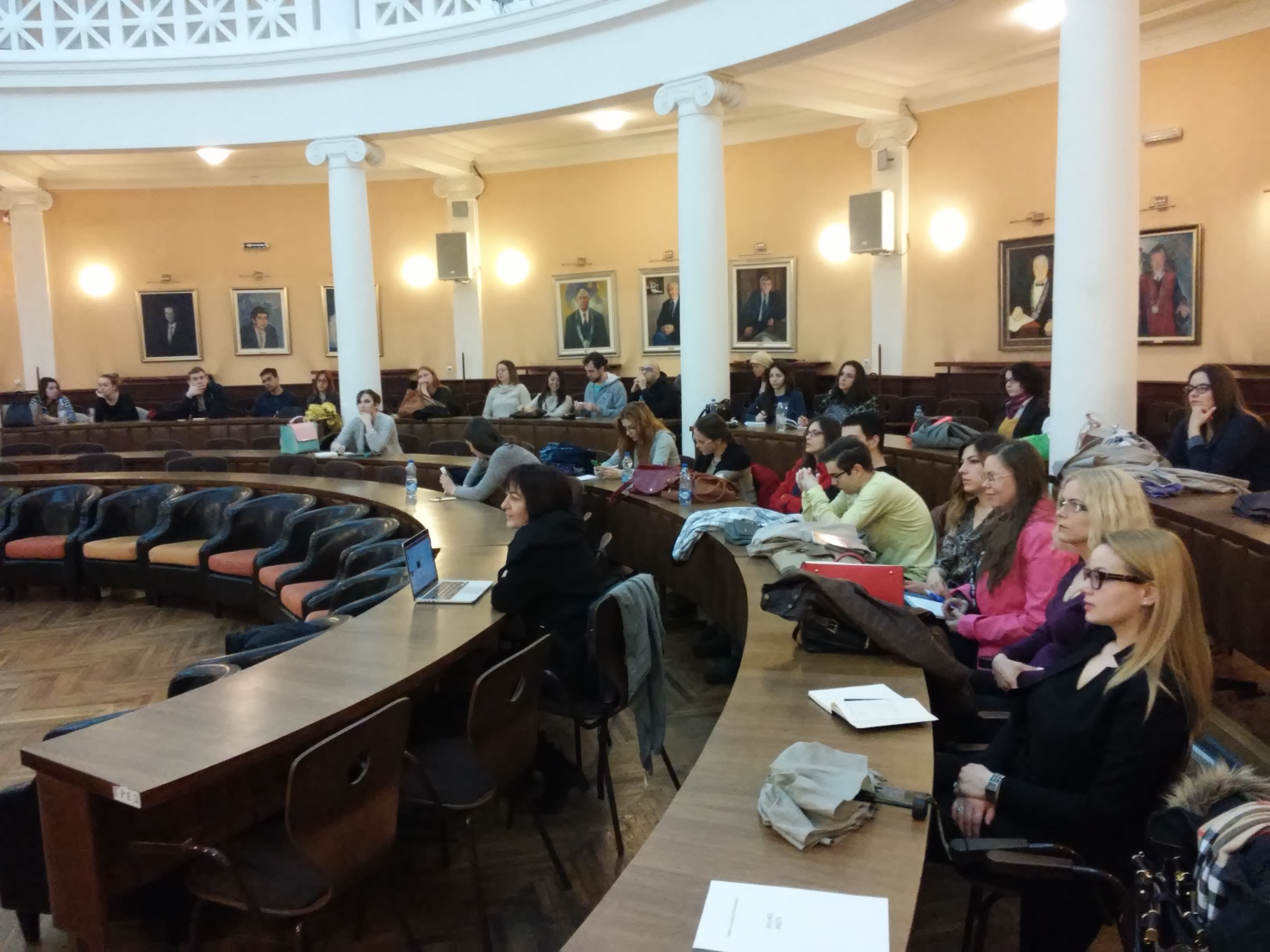
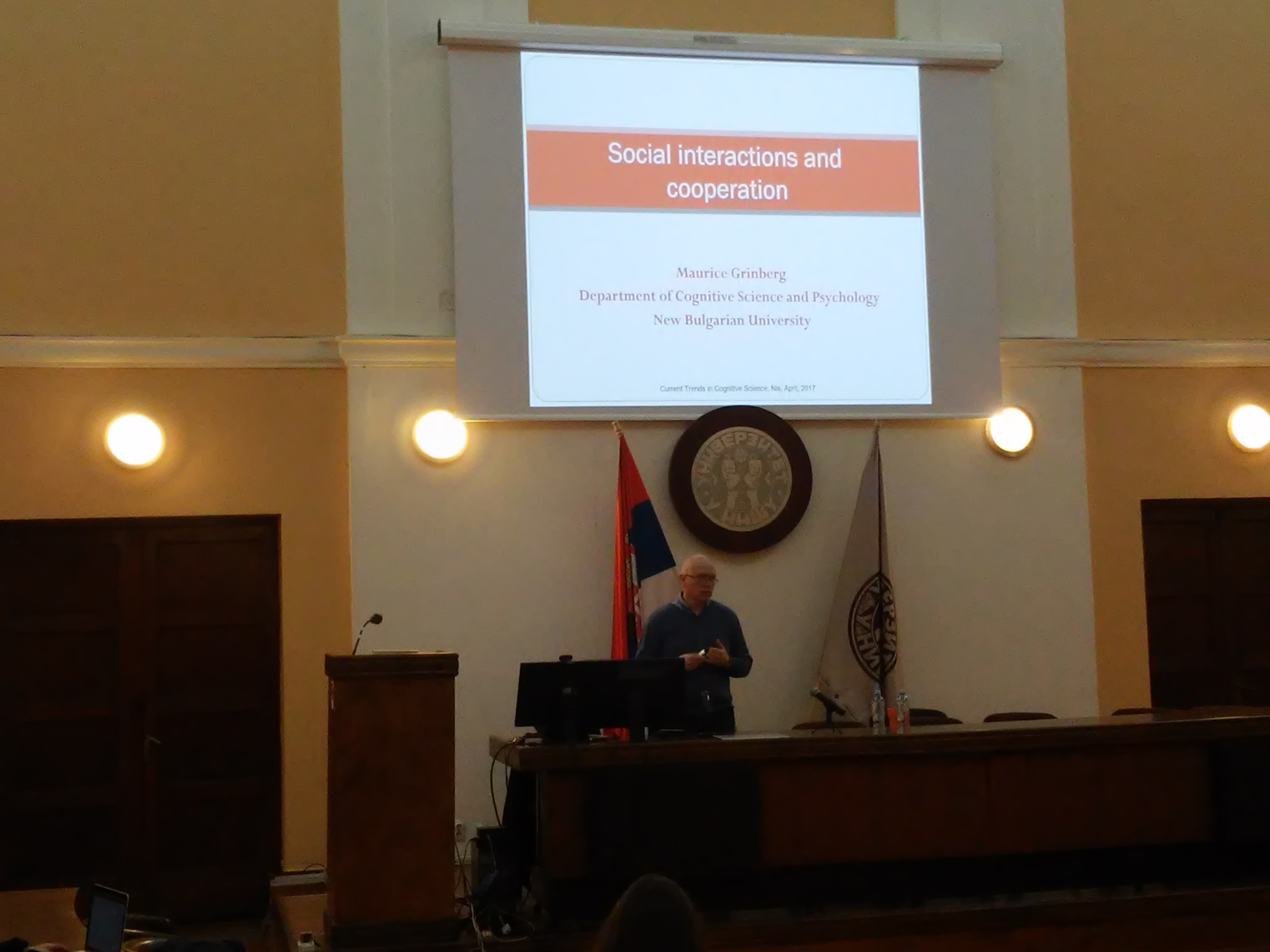
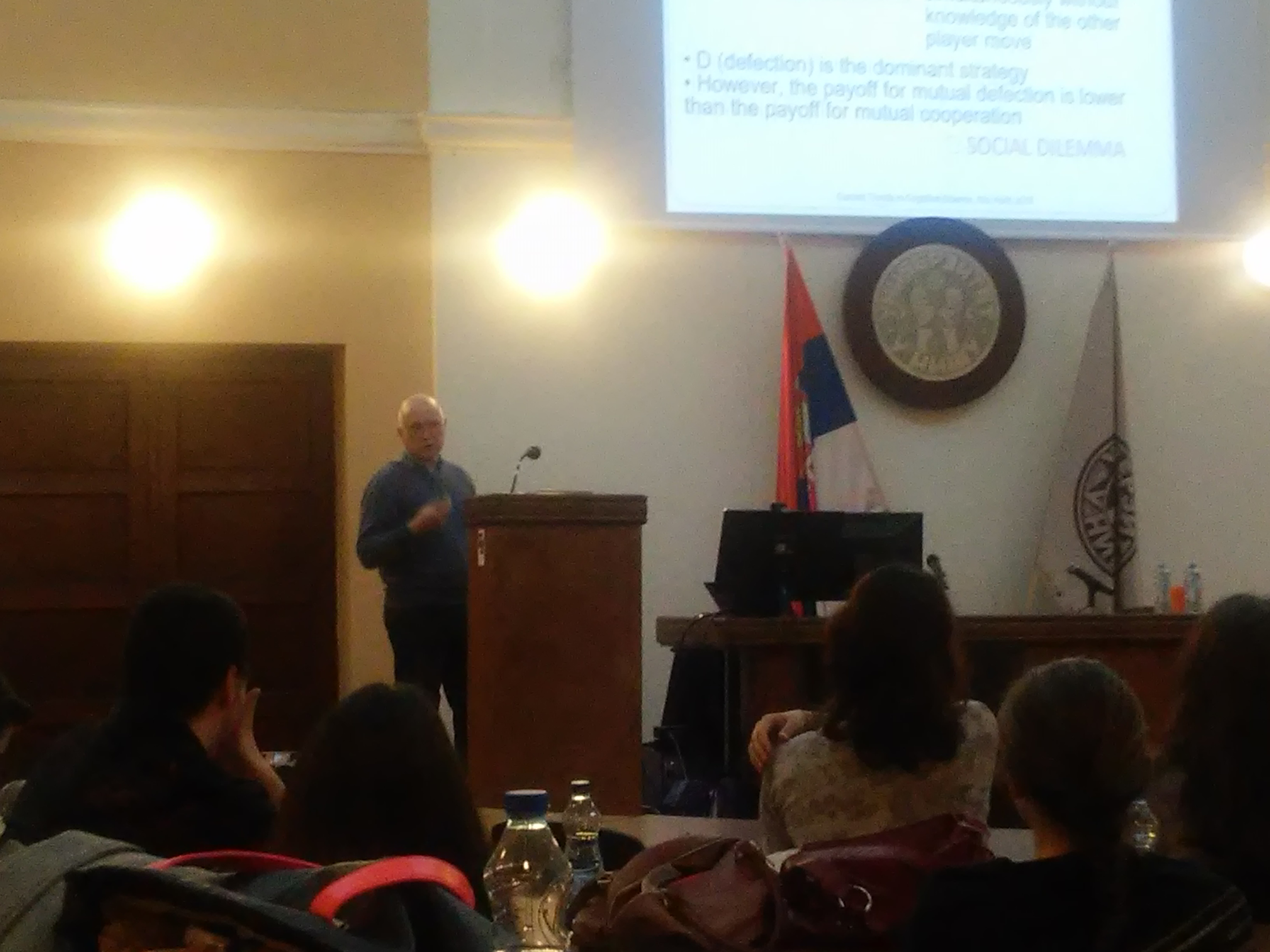
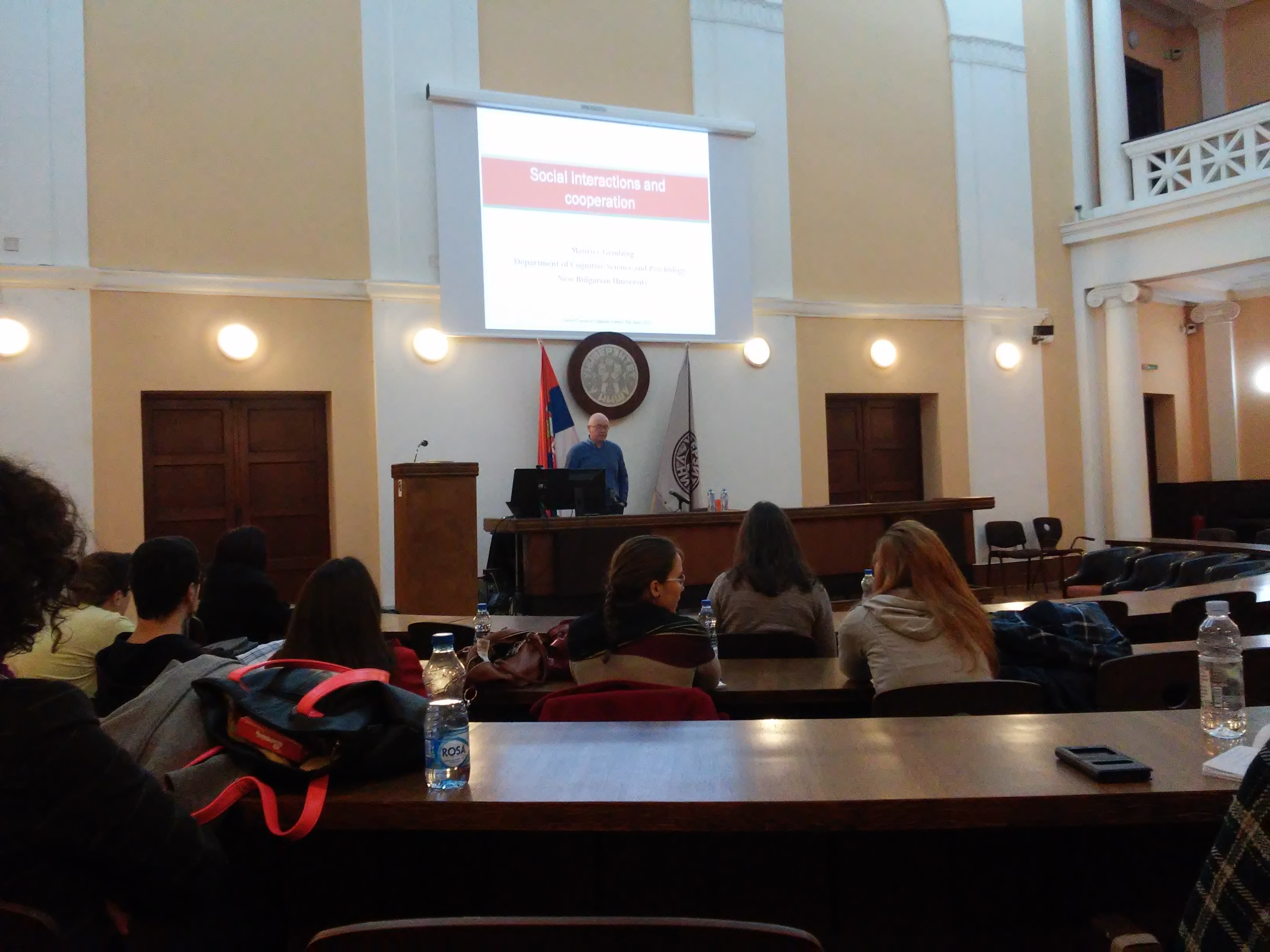
The final lecture of the seminar was given by Prof. Eugenia Hristova, Ph.D., and it was titled Eye-Tracking: Methodology and Applications. The participants had an opportunity to familiarize themselves with the scope of application of eye-tracking methodologies, and to also experience the equipment and software firsthand, as the lecturer brought along two portable eye trackers and the accompanying software.
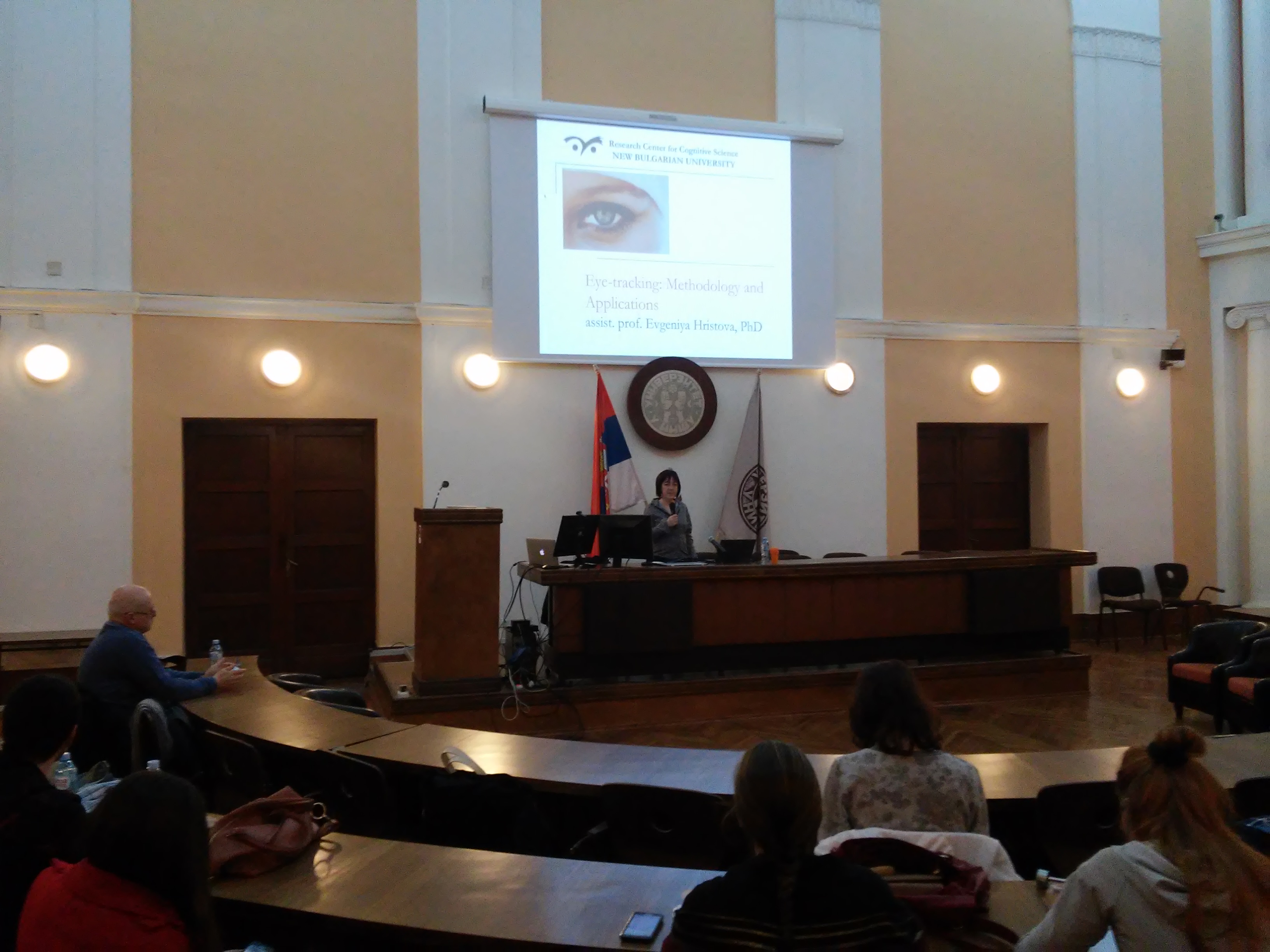
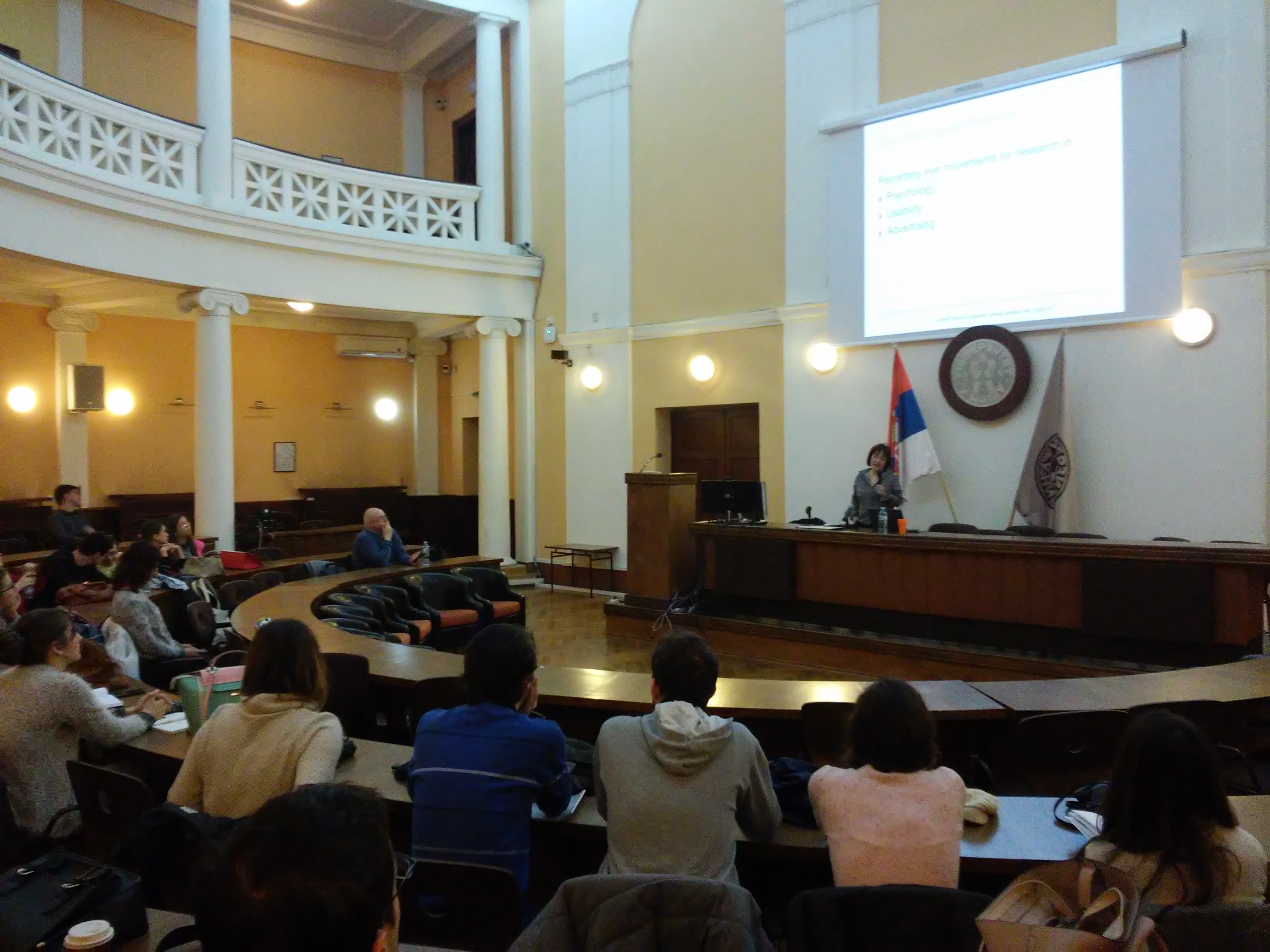
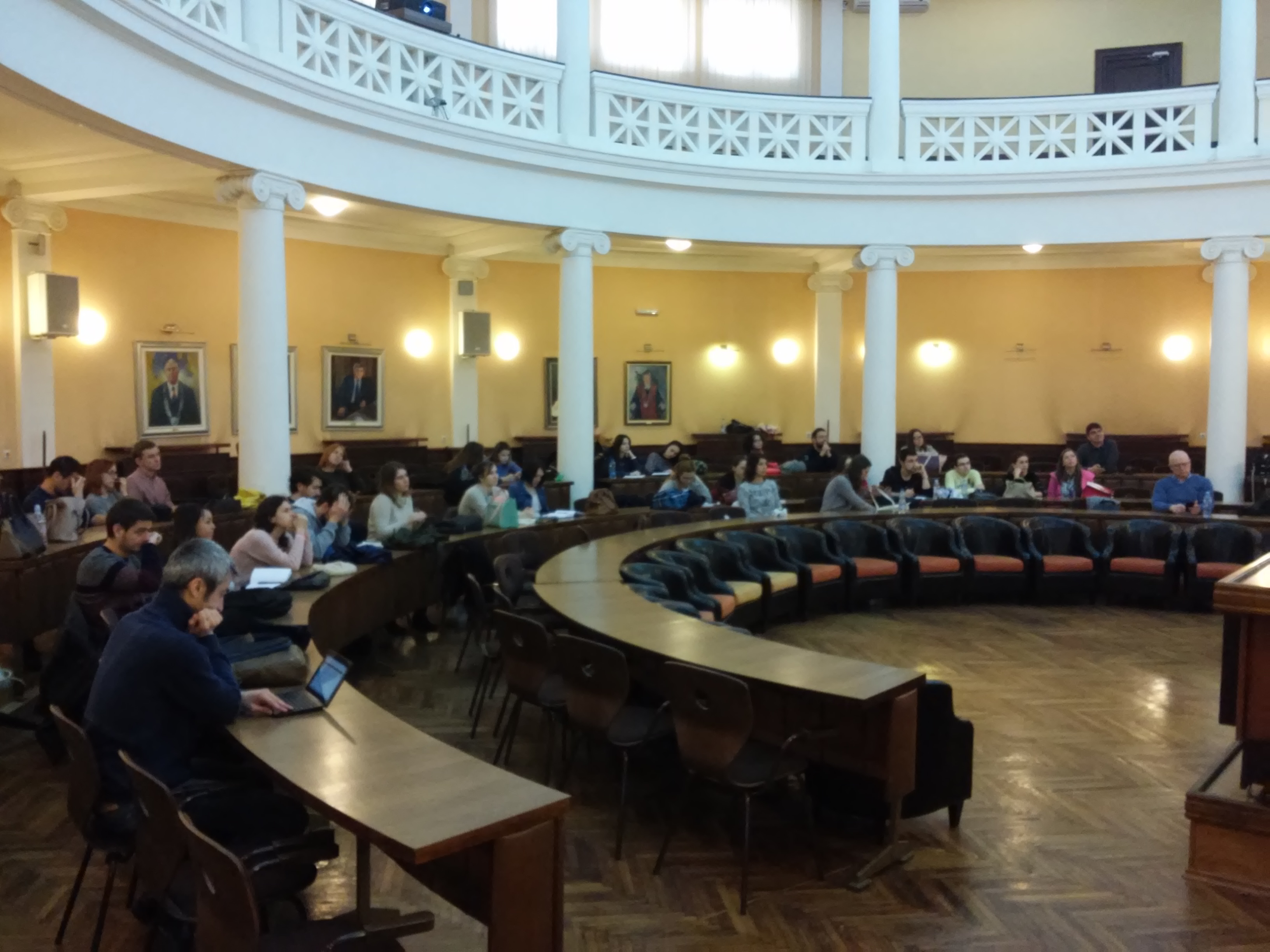
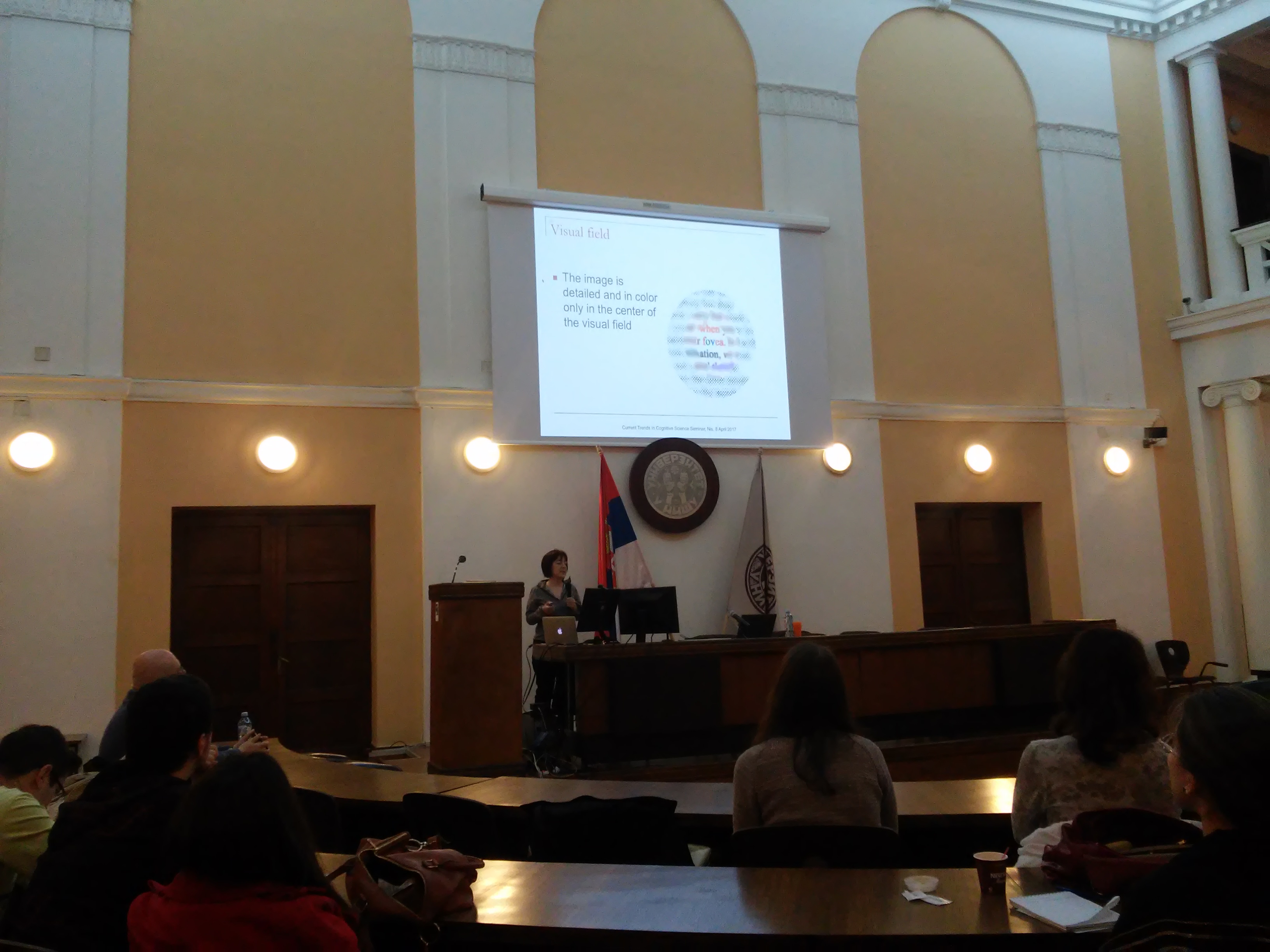
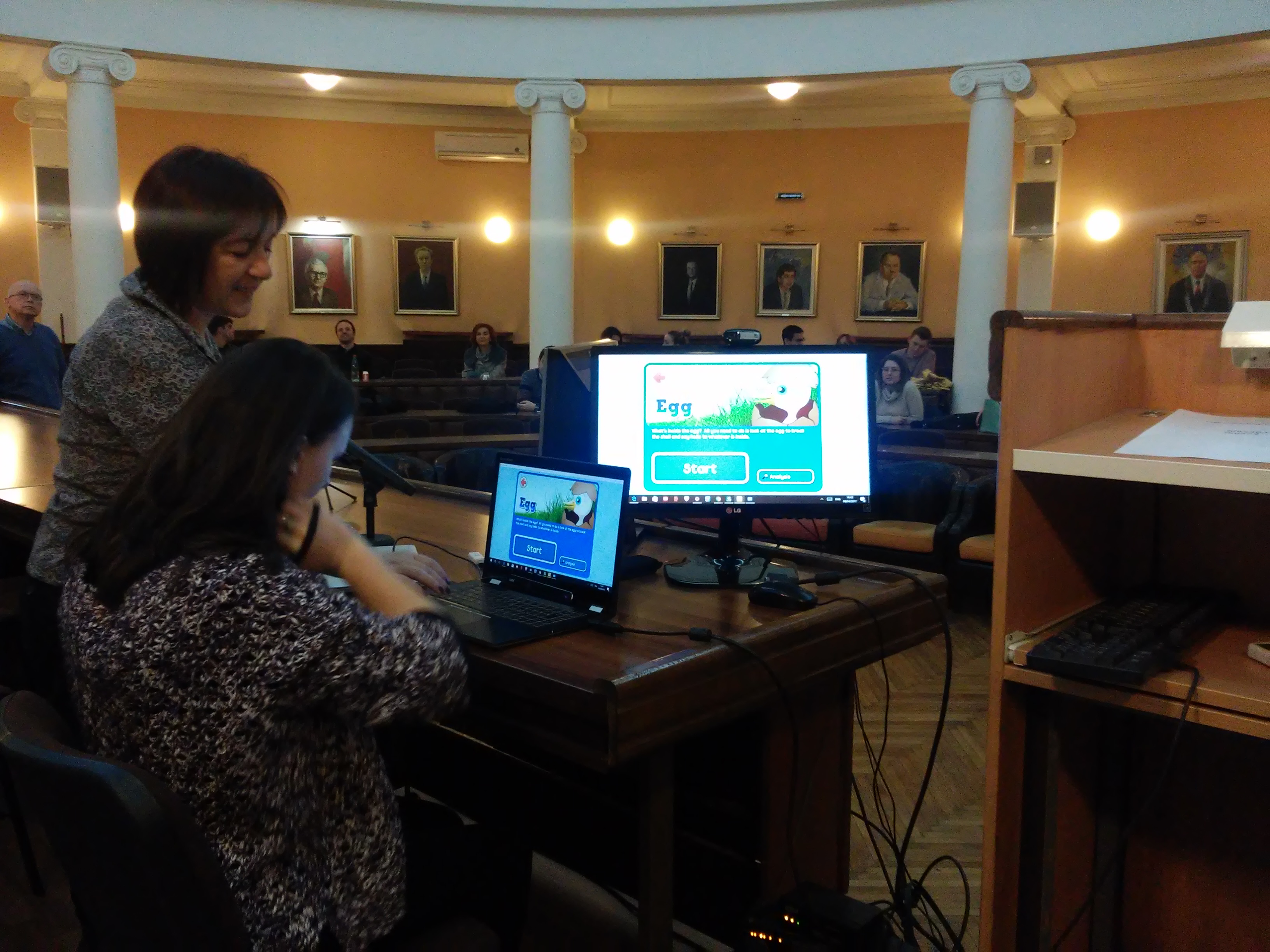
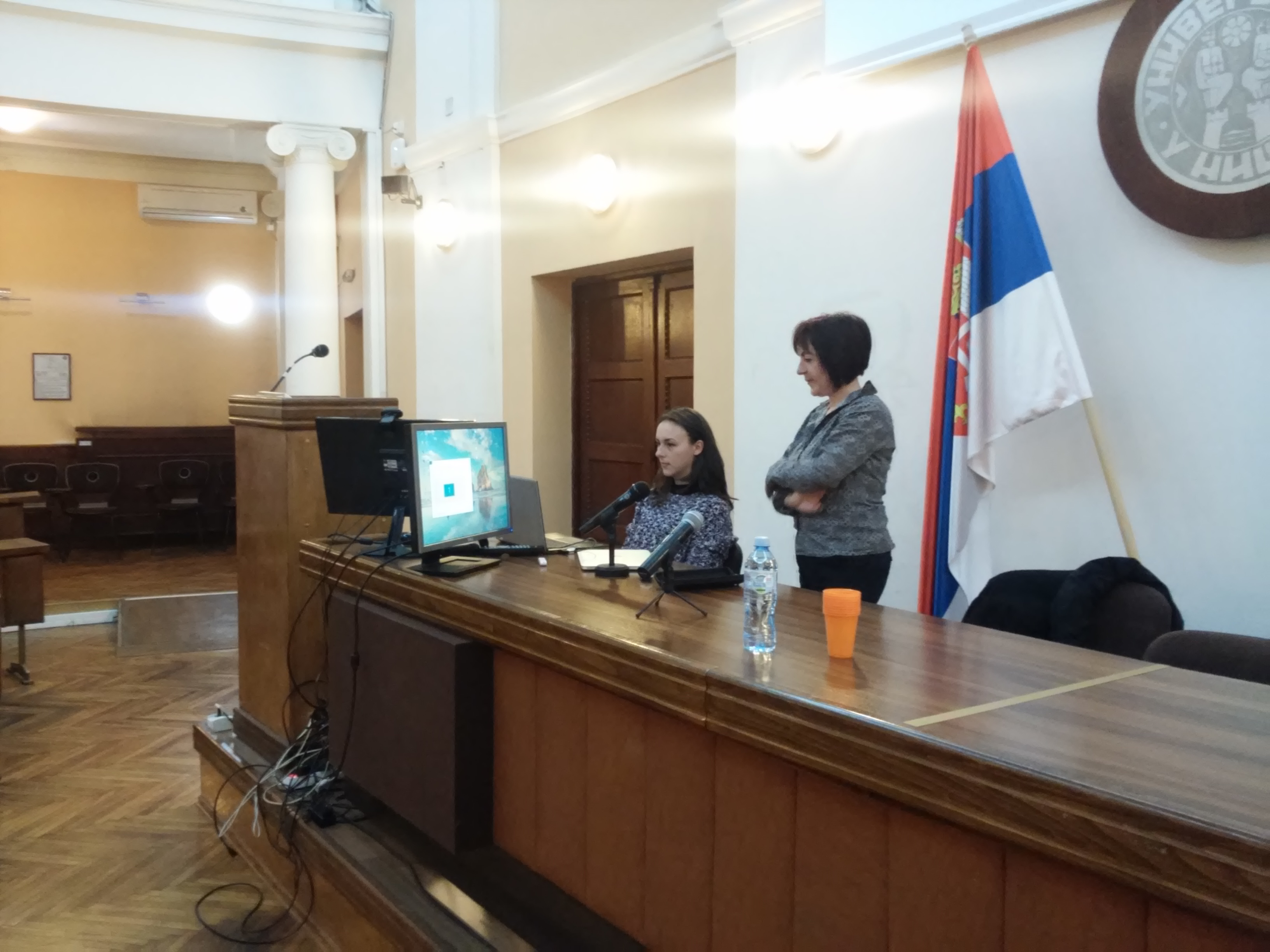
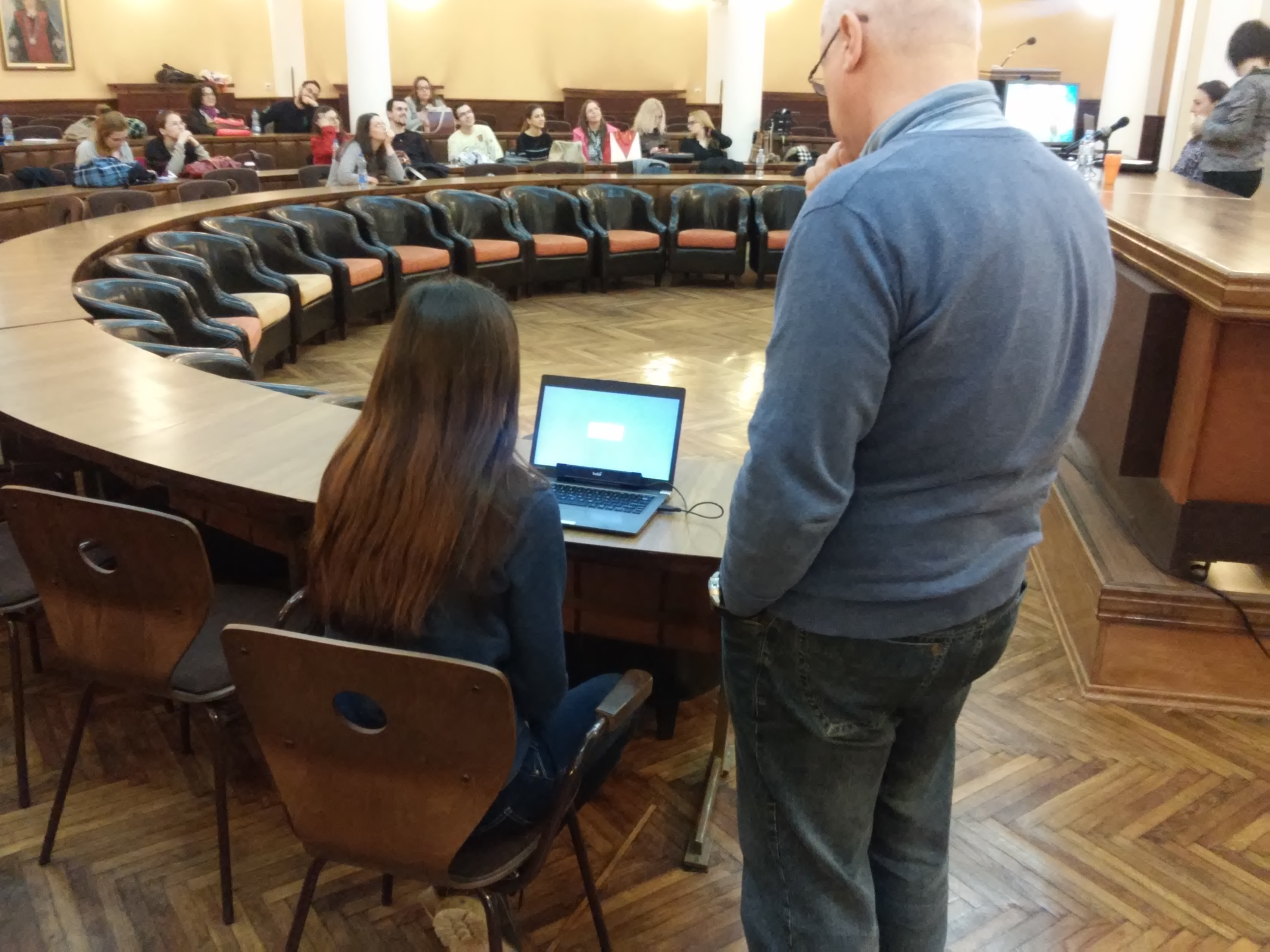
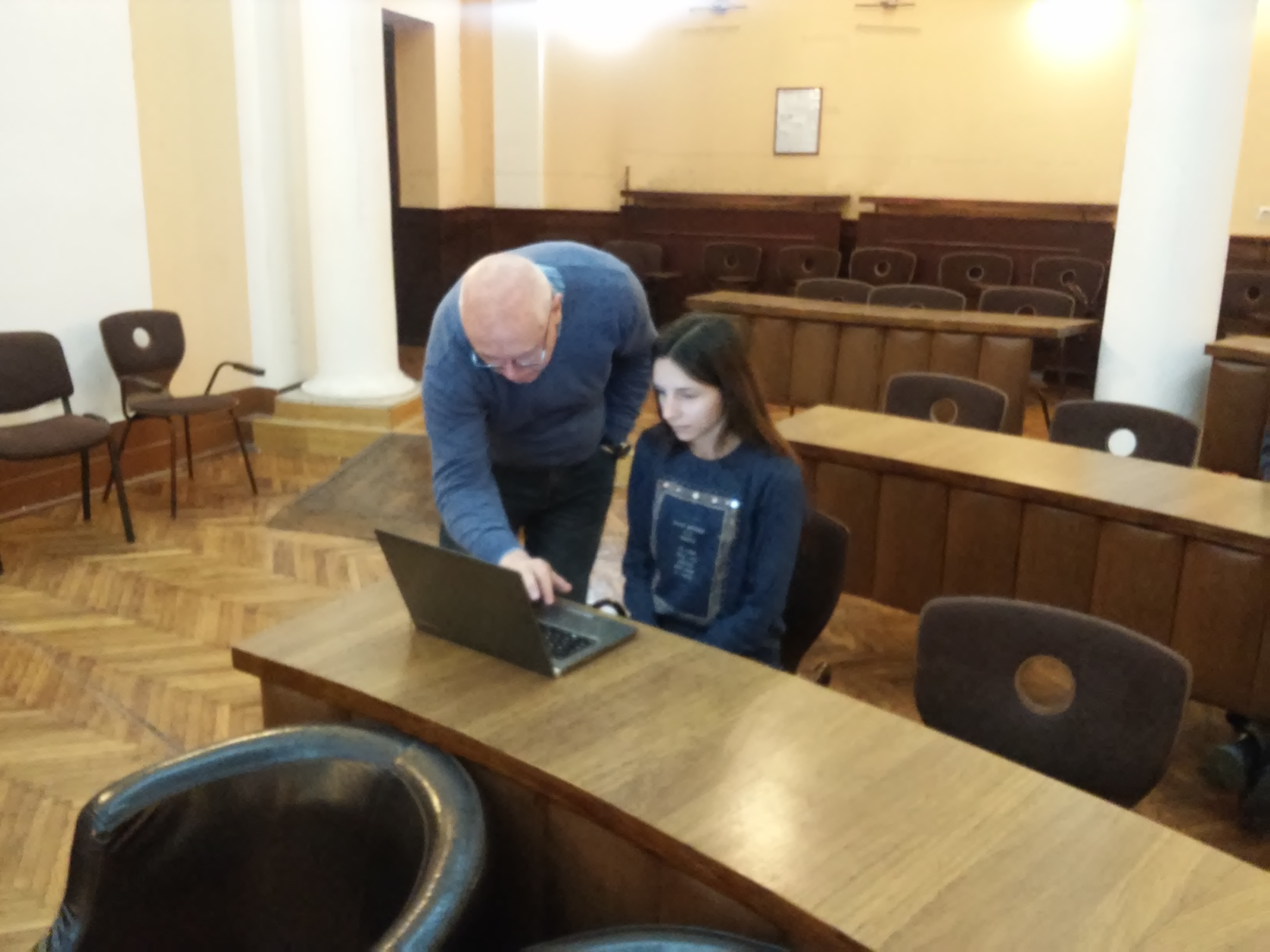
23/03/2017
On Thursday, March 23rd, 2017, Prof. Ing. Igor Farkaš, Dr., Centre for Cognitive Science, Comenius University, Bratislava, Slovak Republic, held a workshop titled “Brain-computer interface based on motor imagery.”
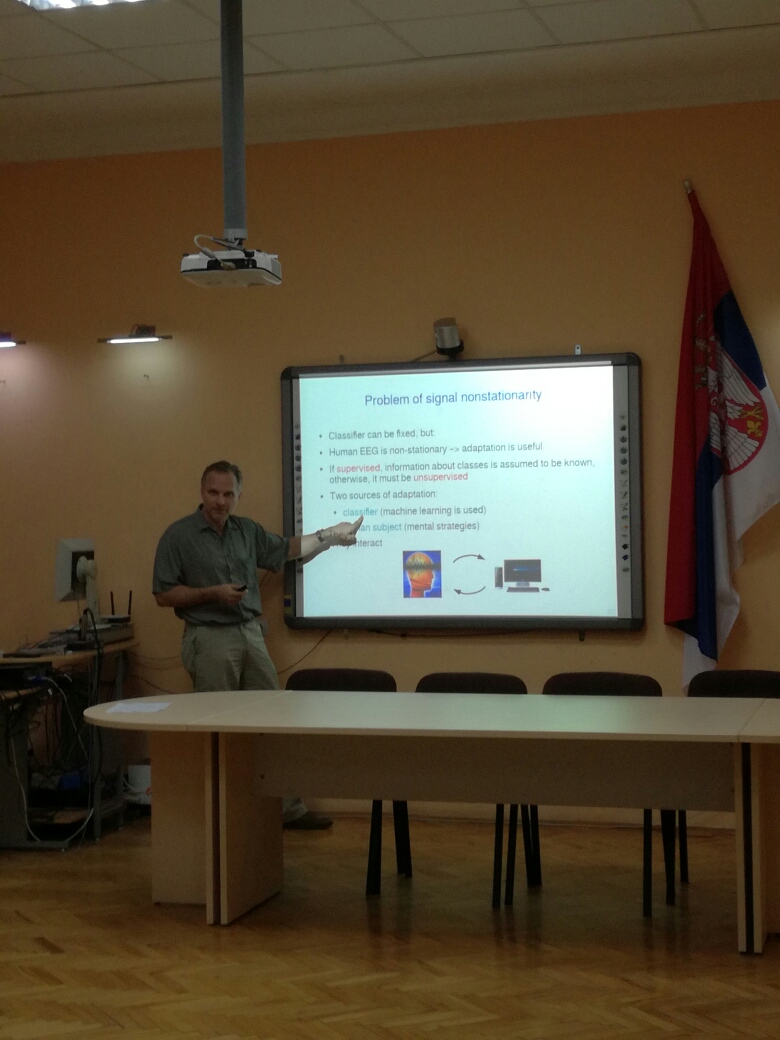
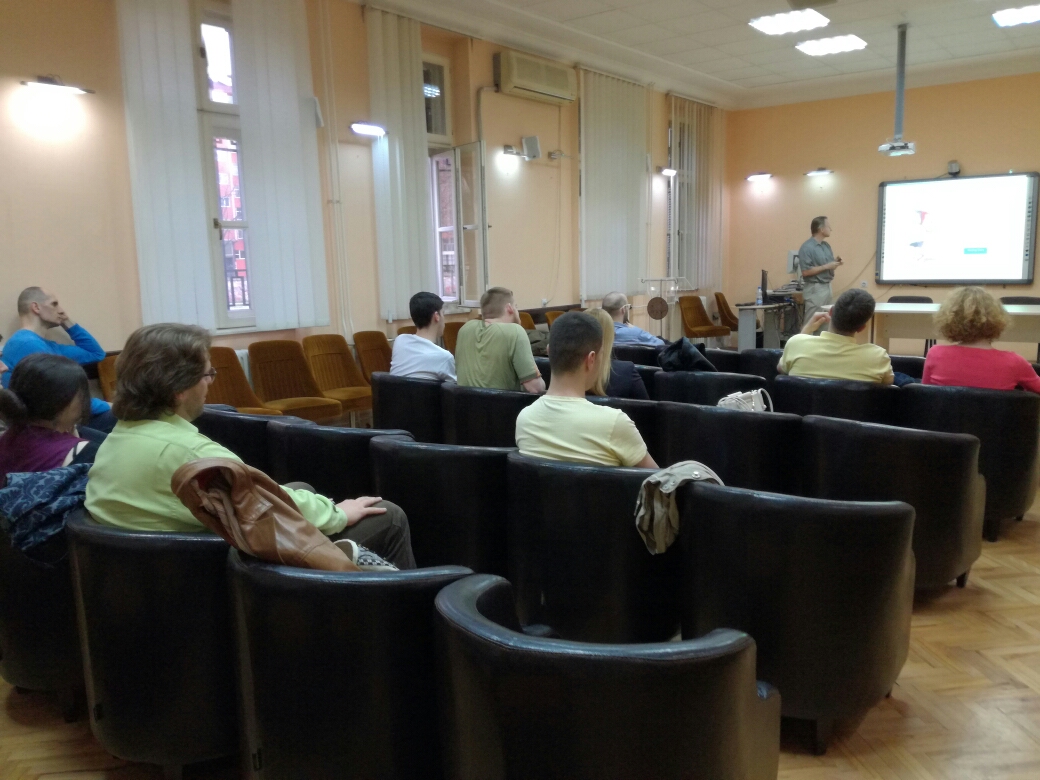
22/03/2017
Dr Farkaš’s lecture
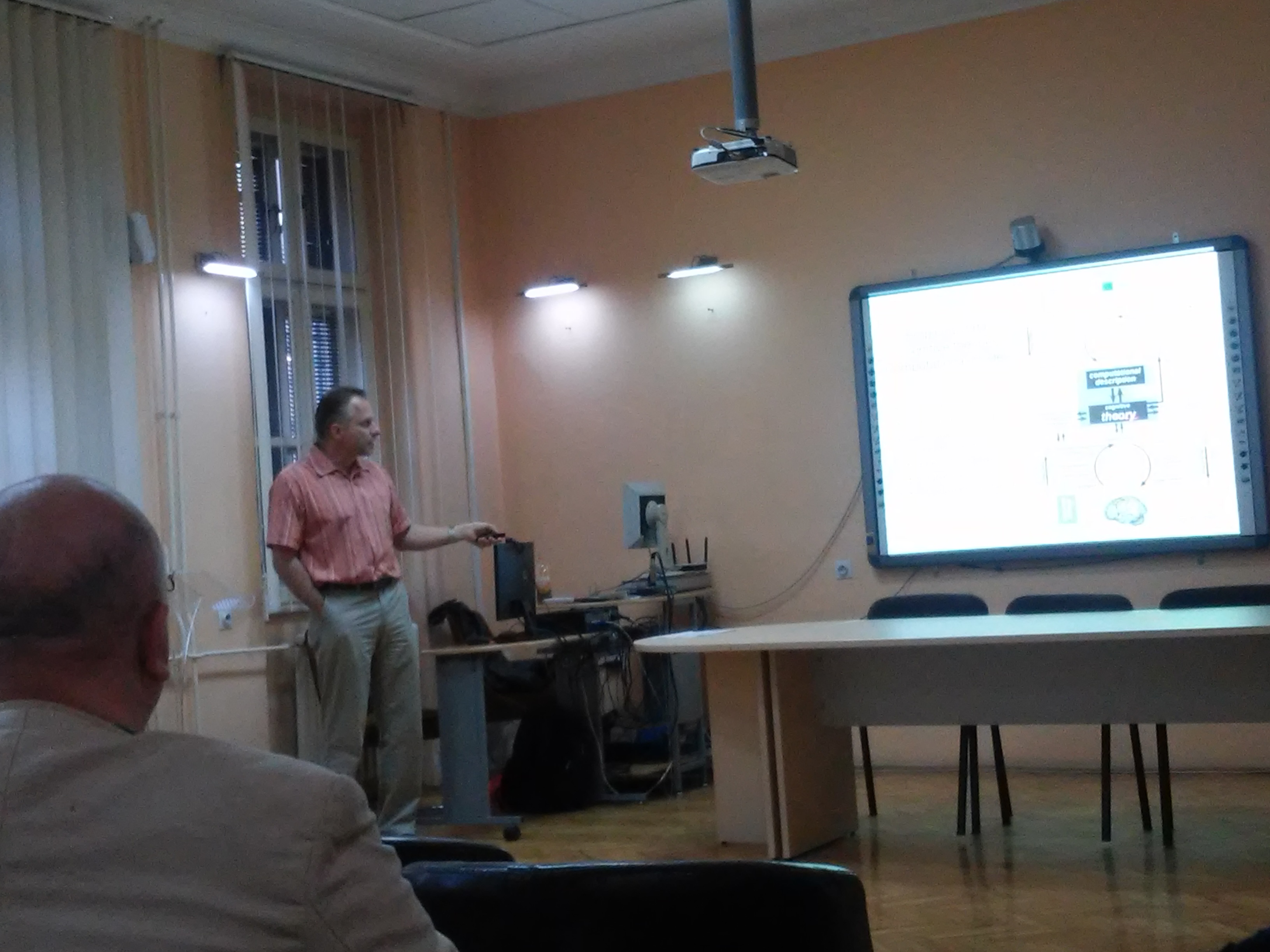
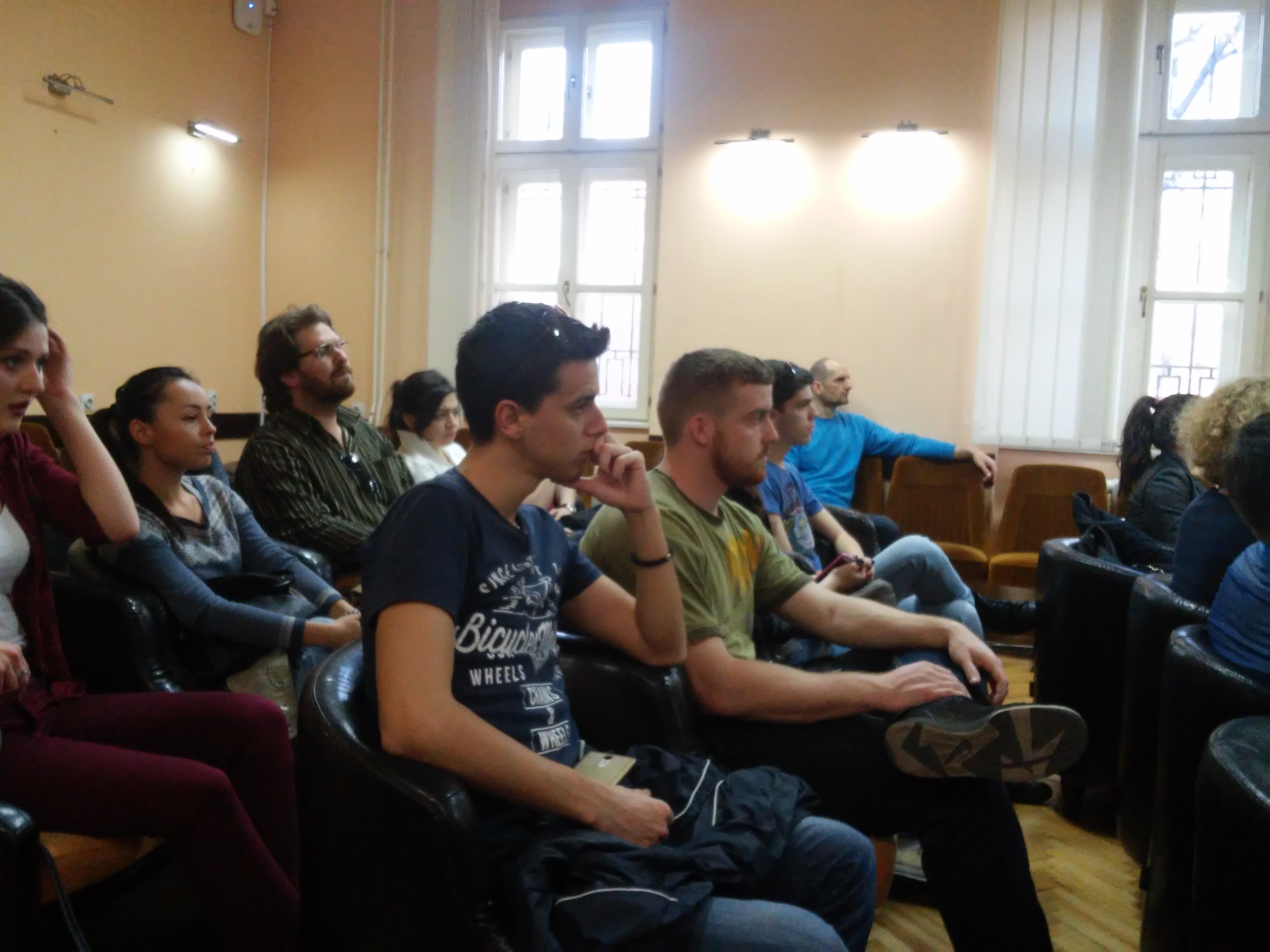
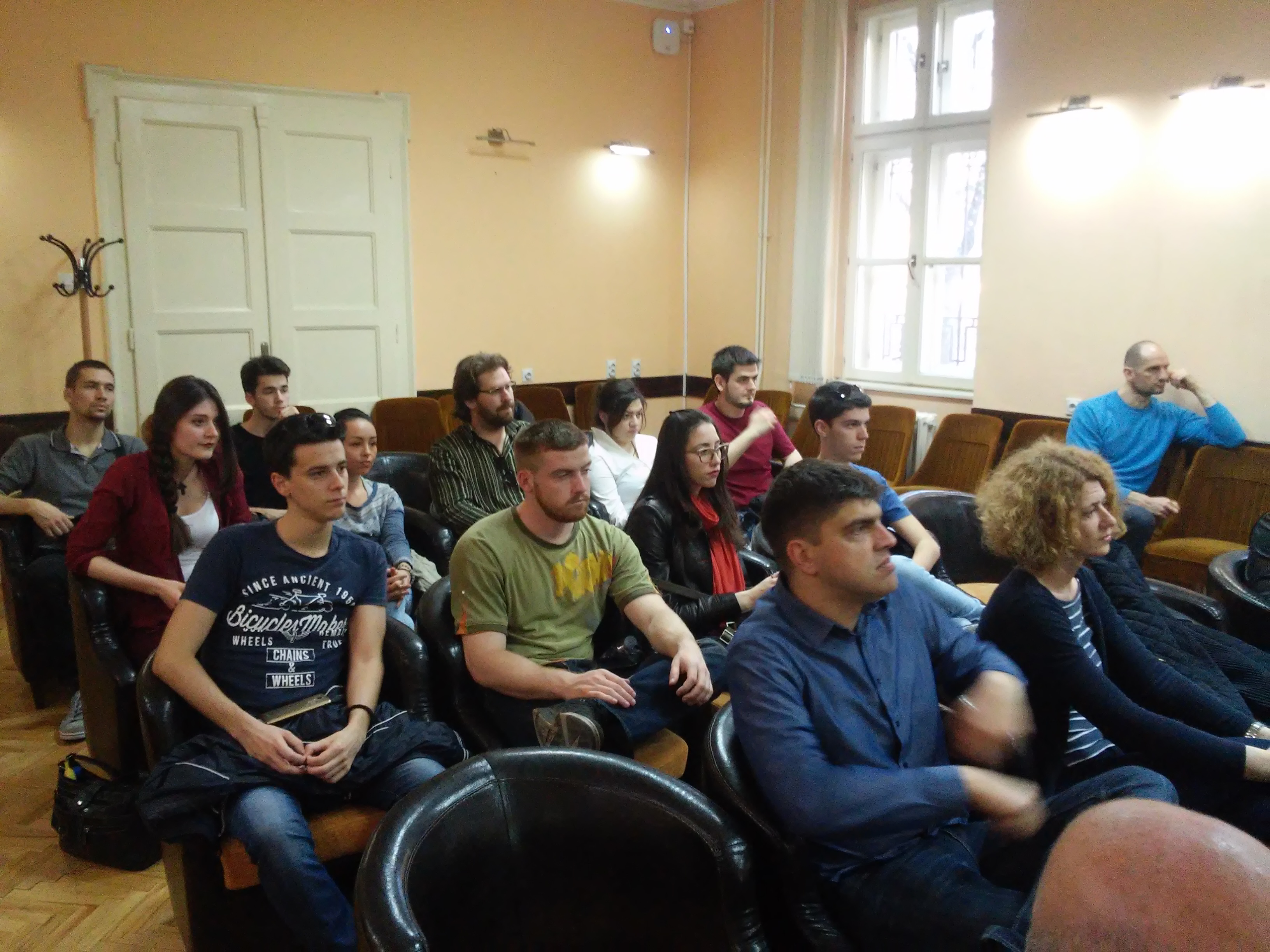
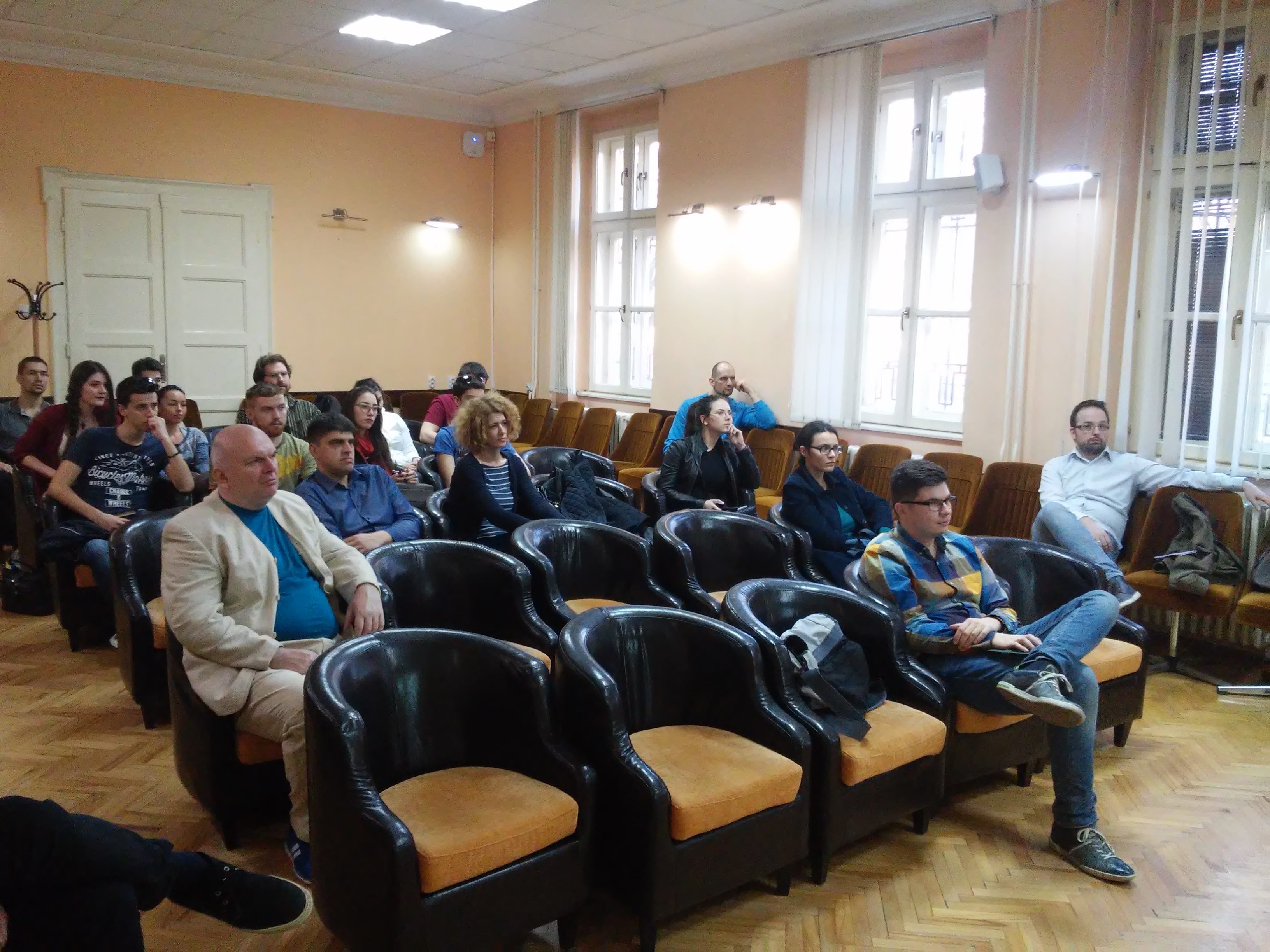
Dr Keith Holyoak's lecture
On Wednesday, March 1st, dr Keith Holyoak, Distinguished Professor of Psychology, from UCLA, Los Angeles, USA, gave an online talk titled Commonsense Moral Reasoning. During the talk, he discussed how ordinary people make judgements about moral issues and introduced some of the previous research that questions one popular approach based on utilitarianism. Subsequently, he introduced a more promising approach called 'deontological coherence theory' which tries to unify findings in moral psychology that have often been interpreted as heuristics or biases. The lecture gave way to a productive discussion.
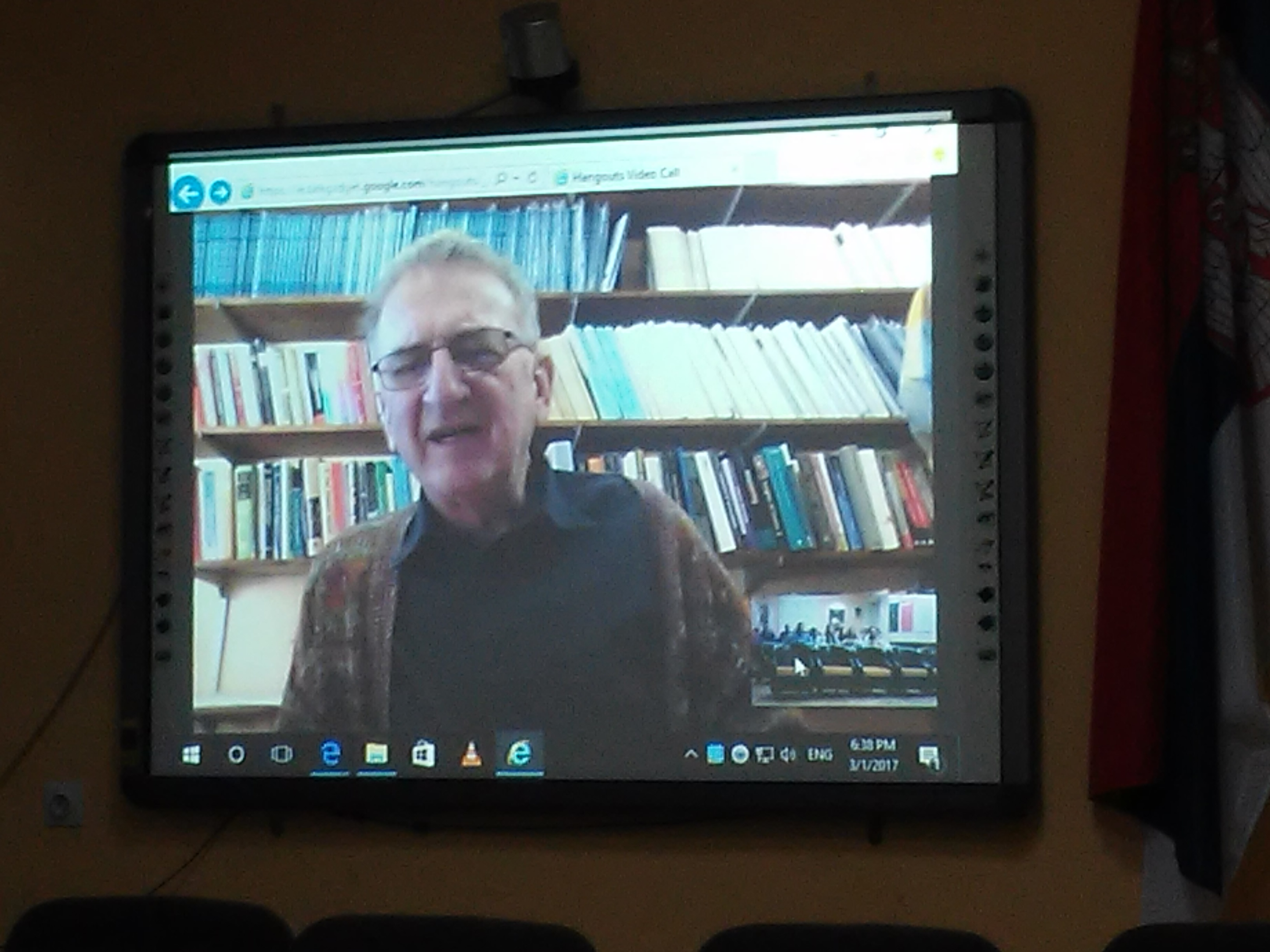
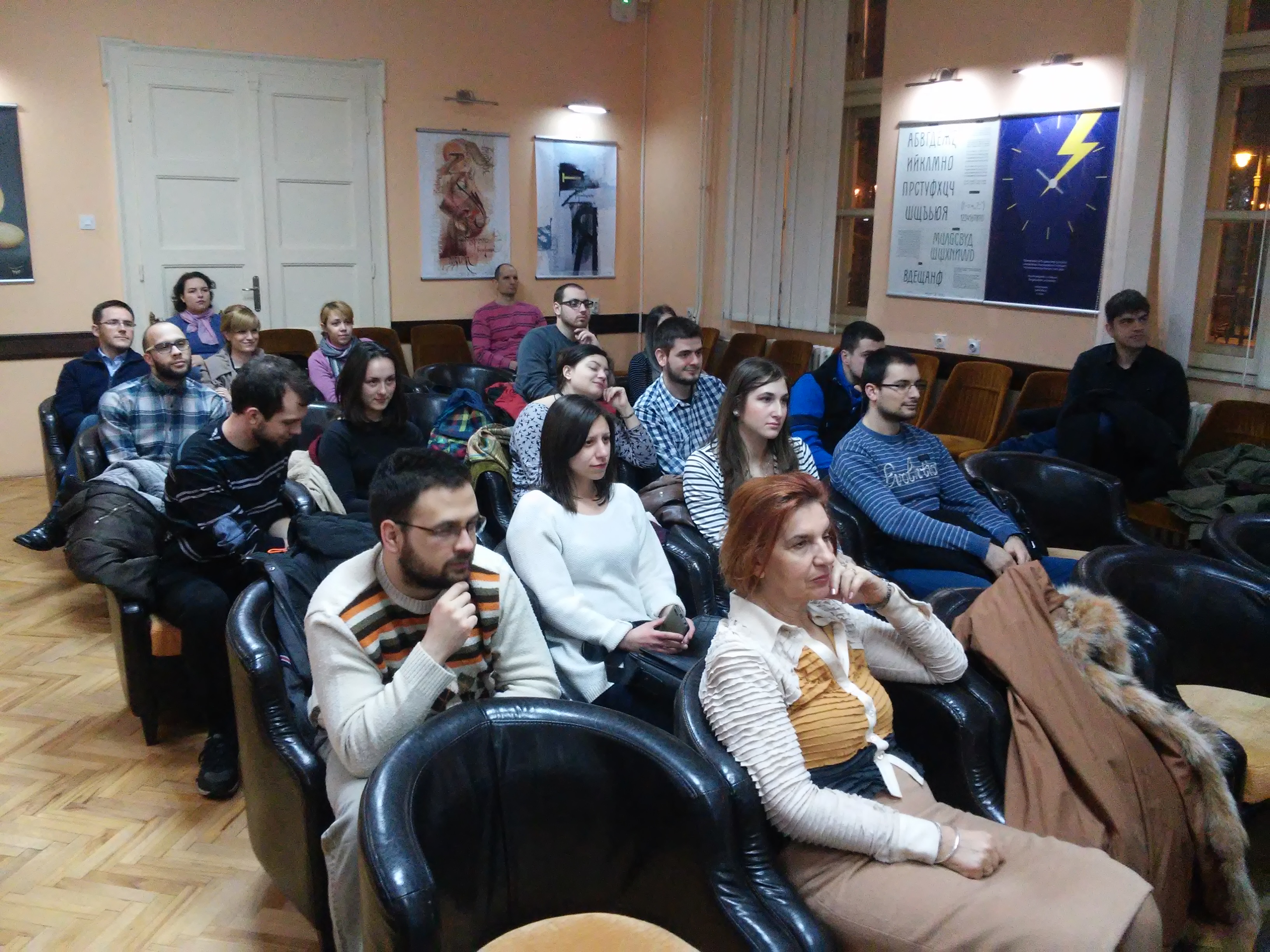
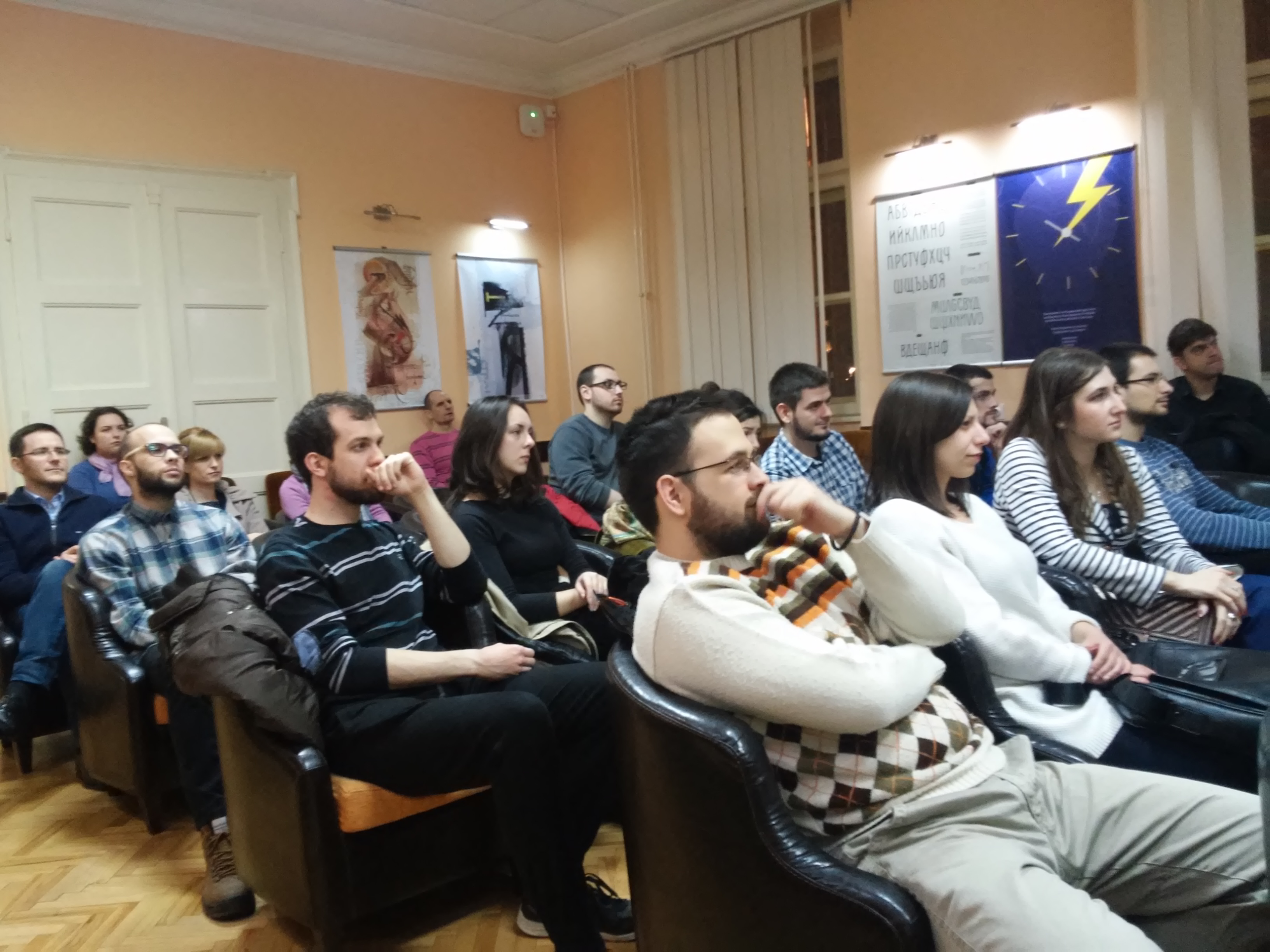
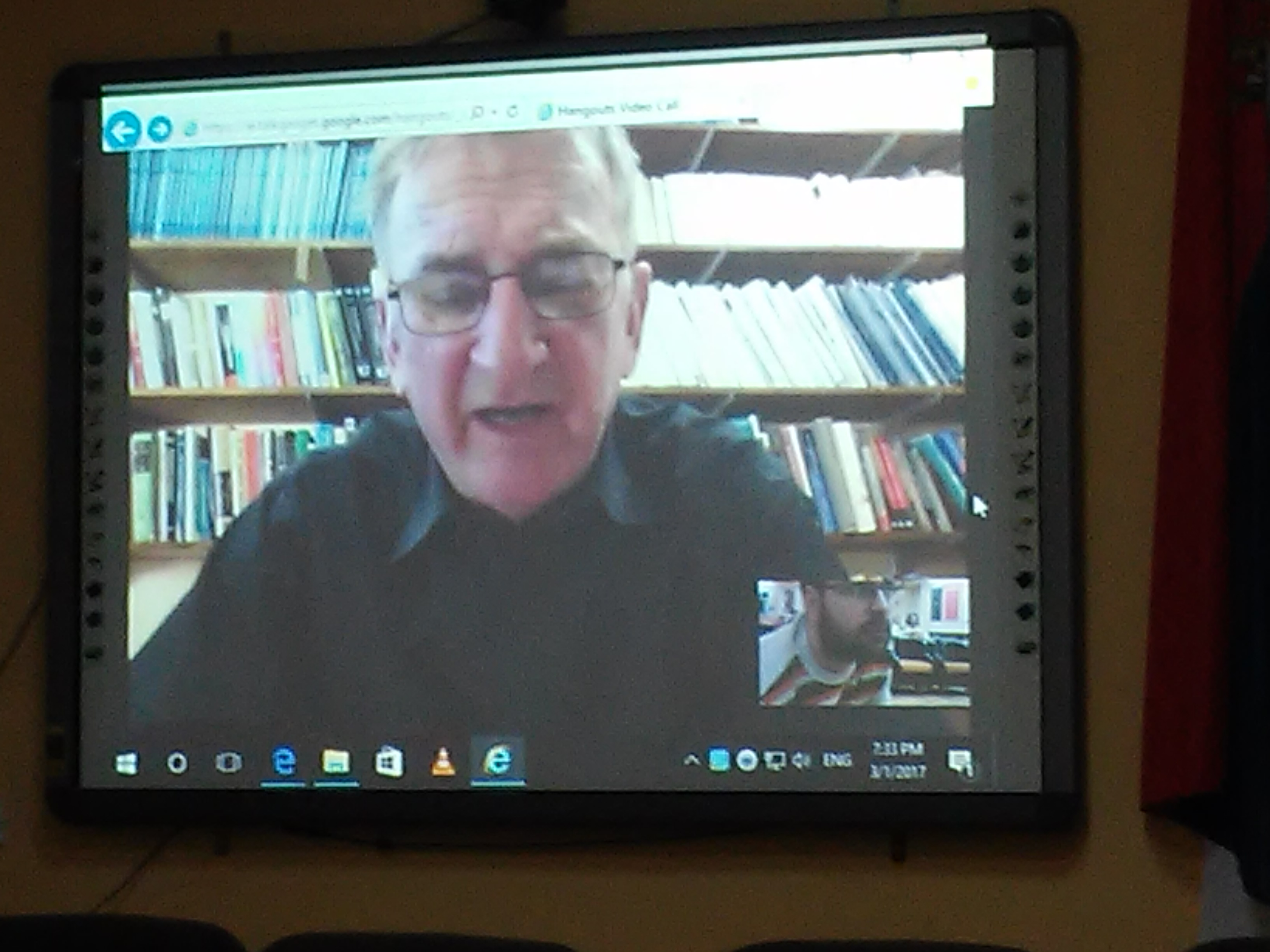
November / December 2016
Professor Antović's visit to the University of Vienna
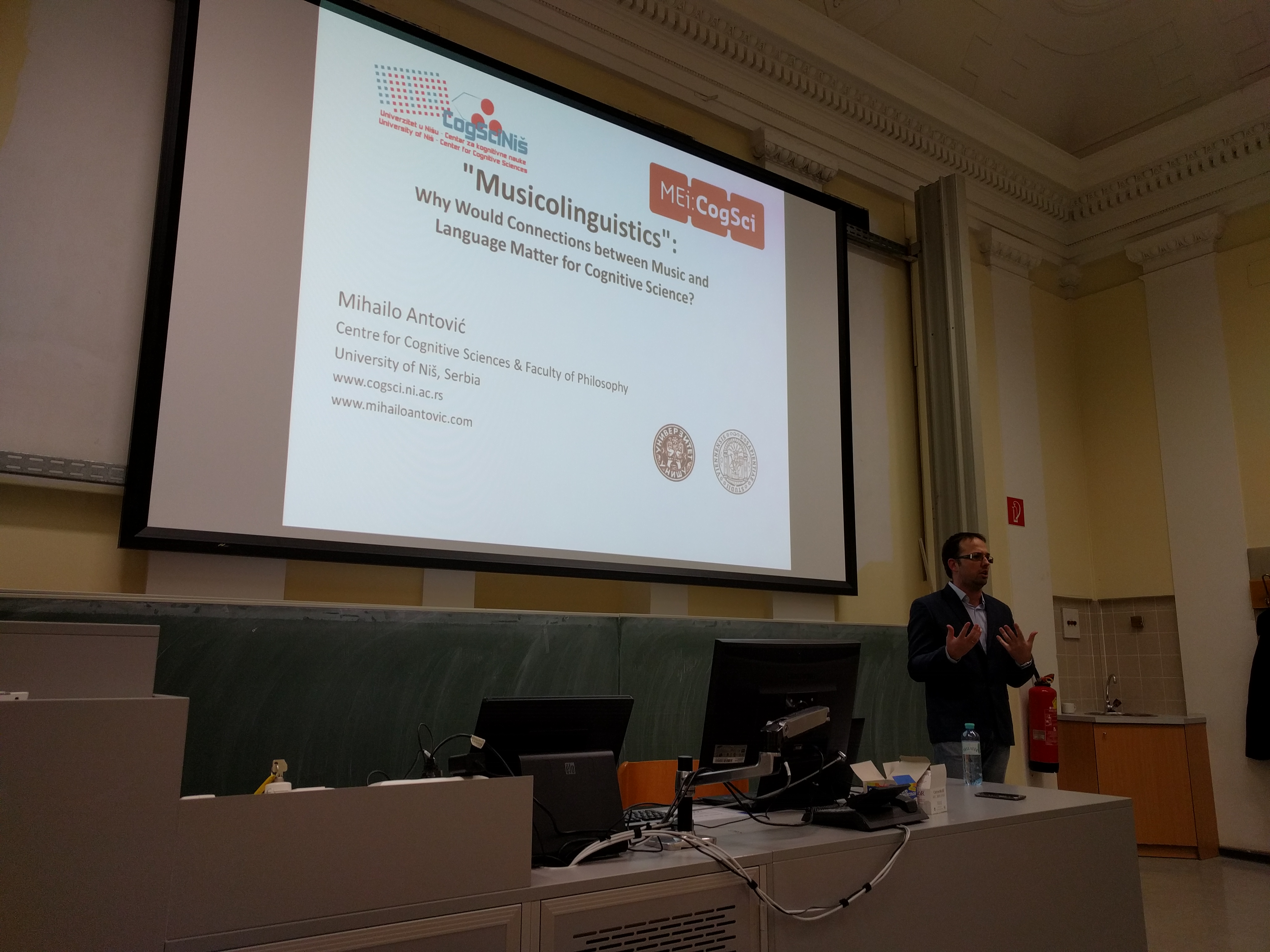
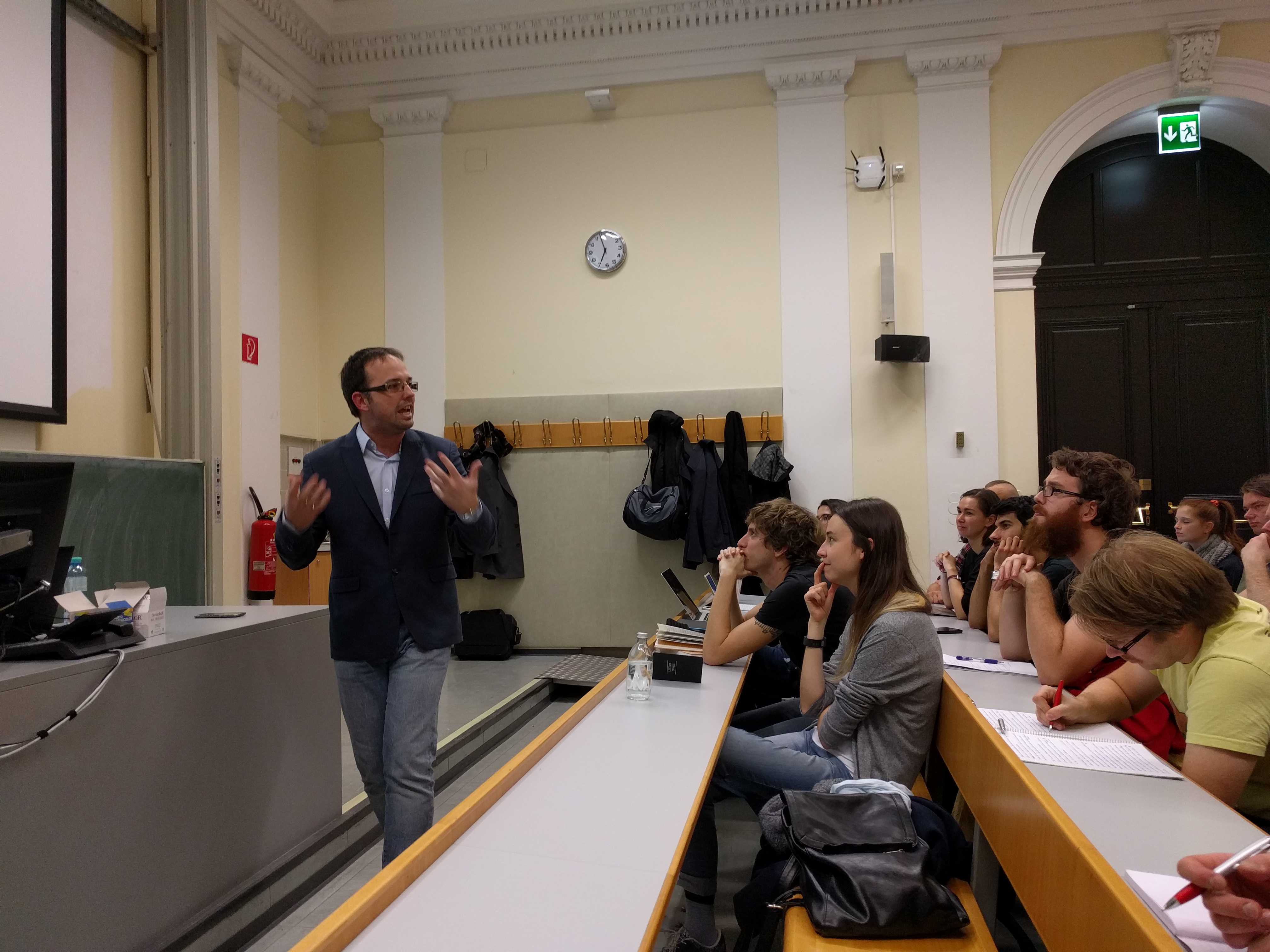
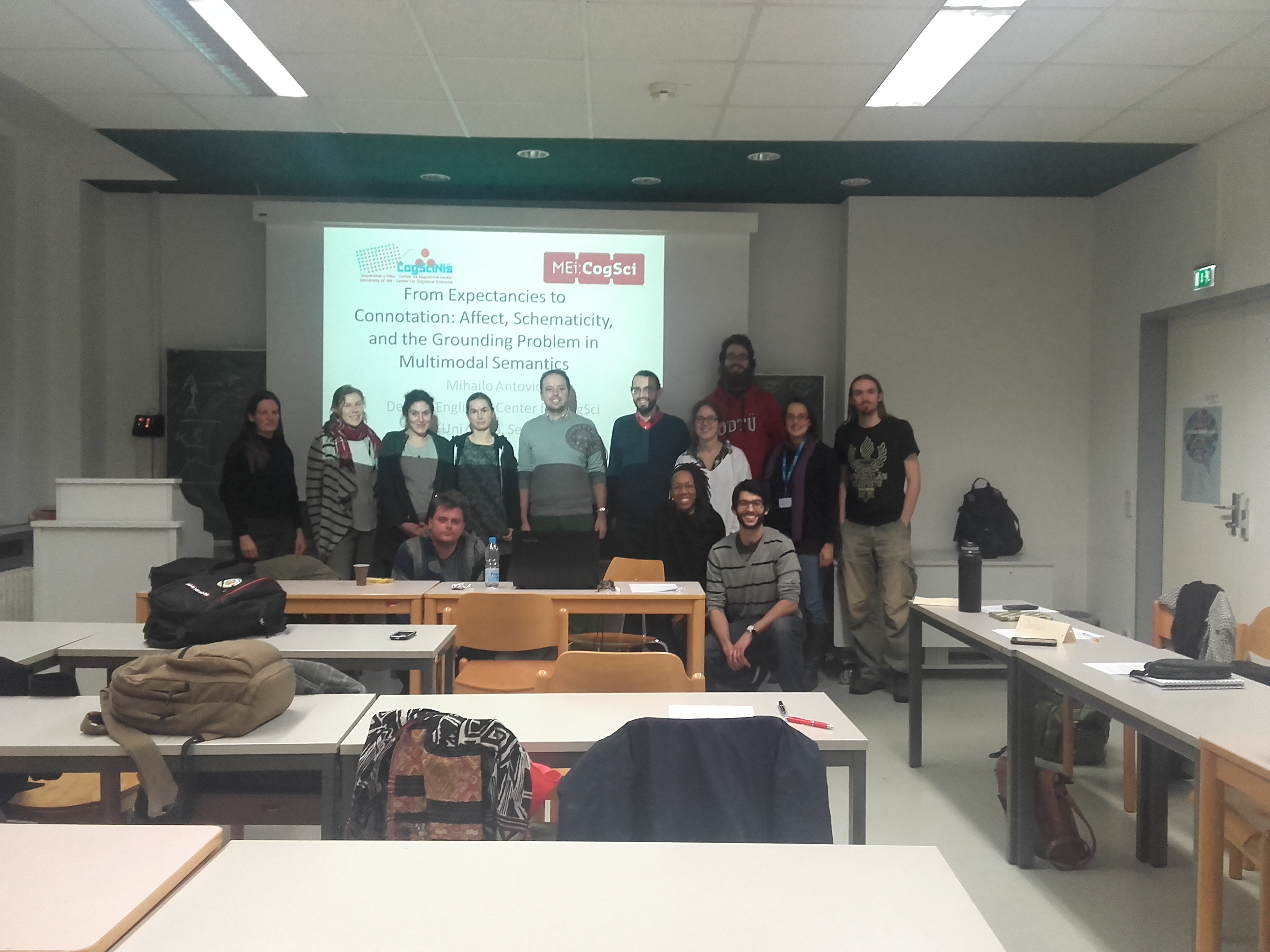
3/11/2016
Dr Patrick Plummer's lecture
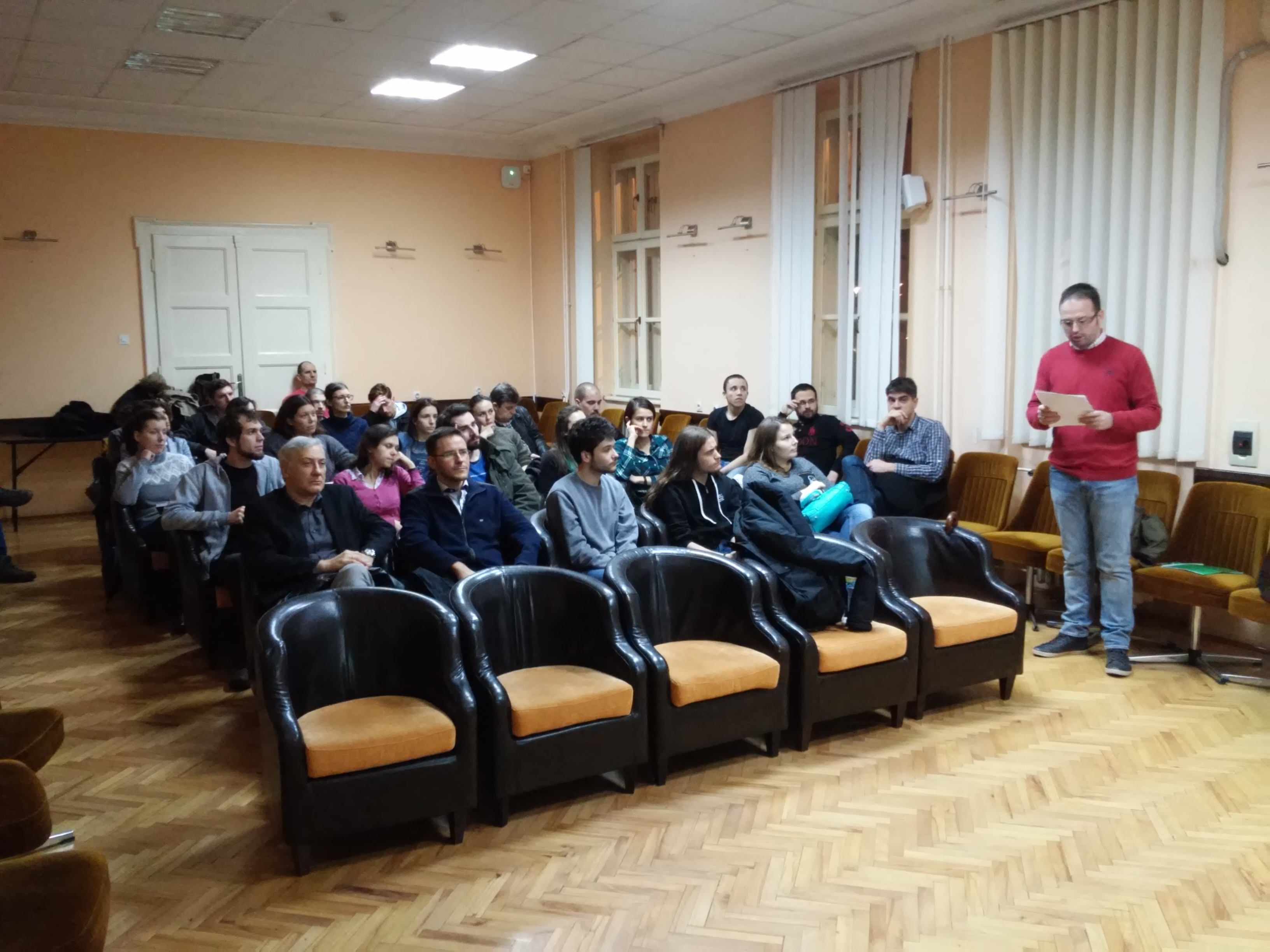
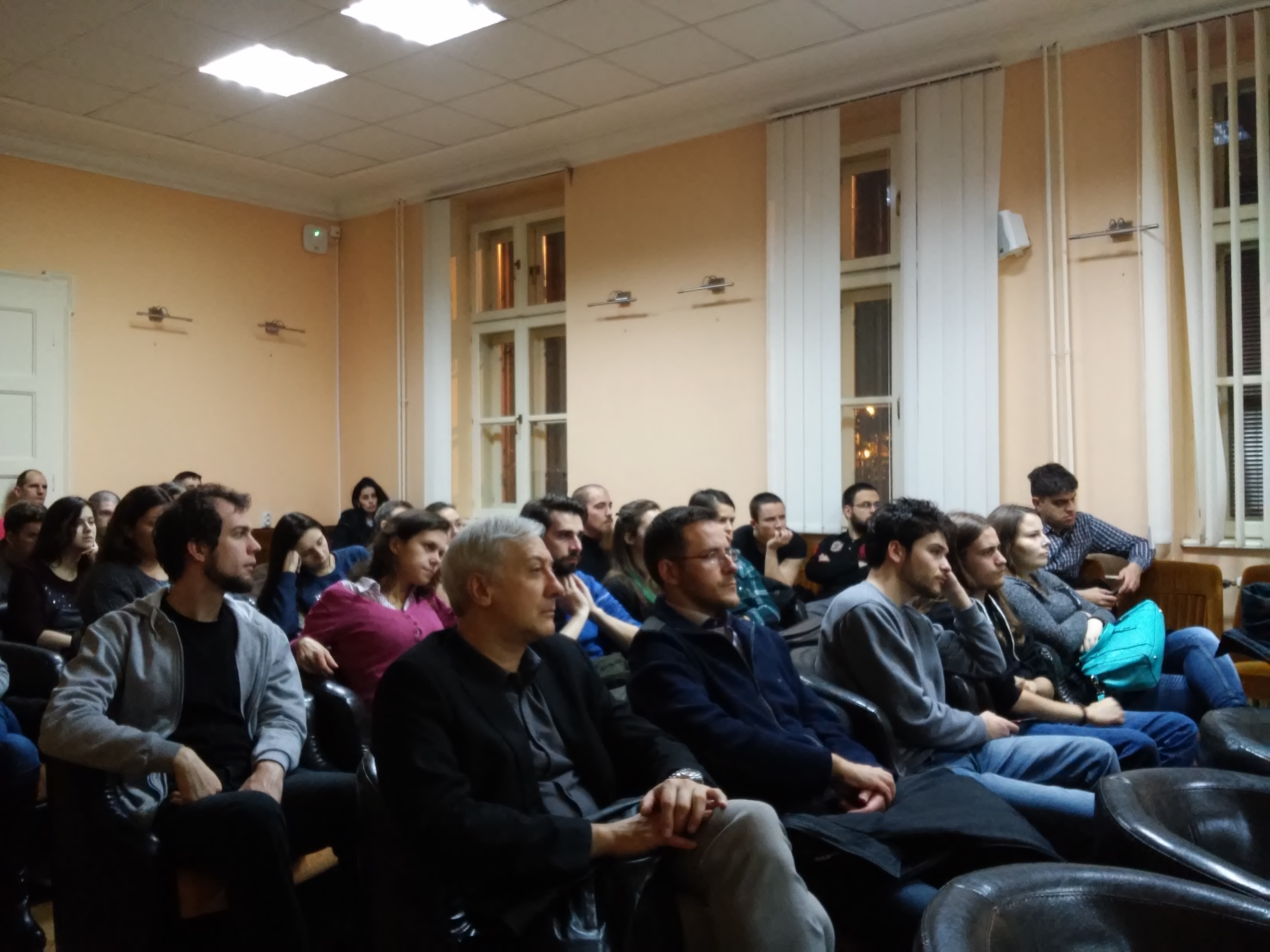
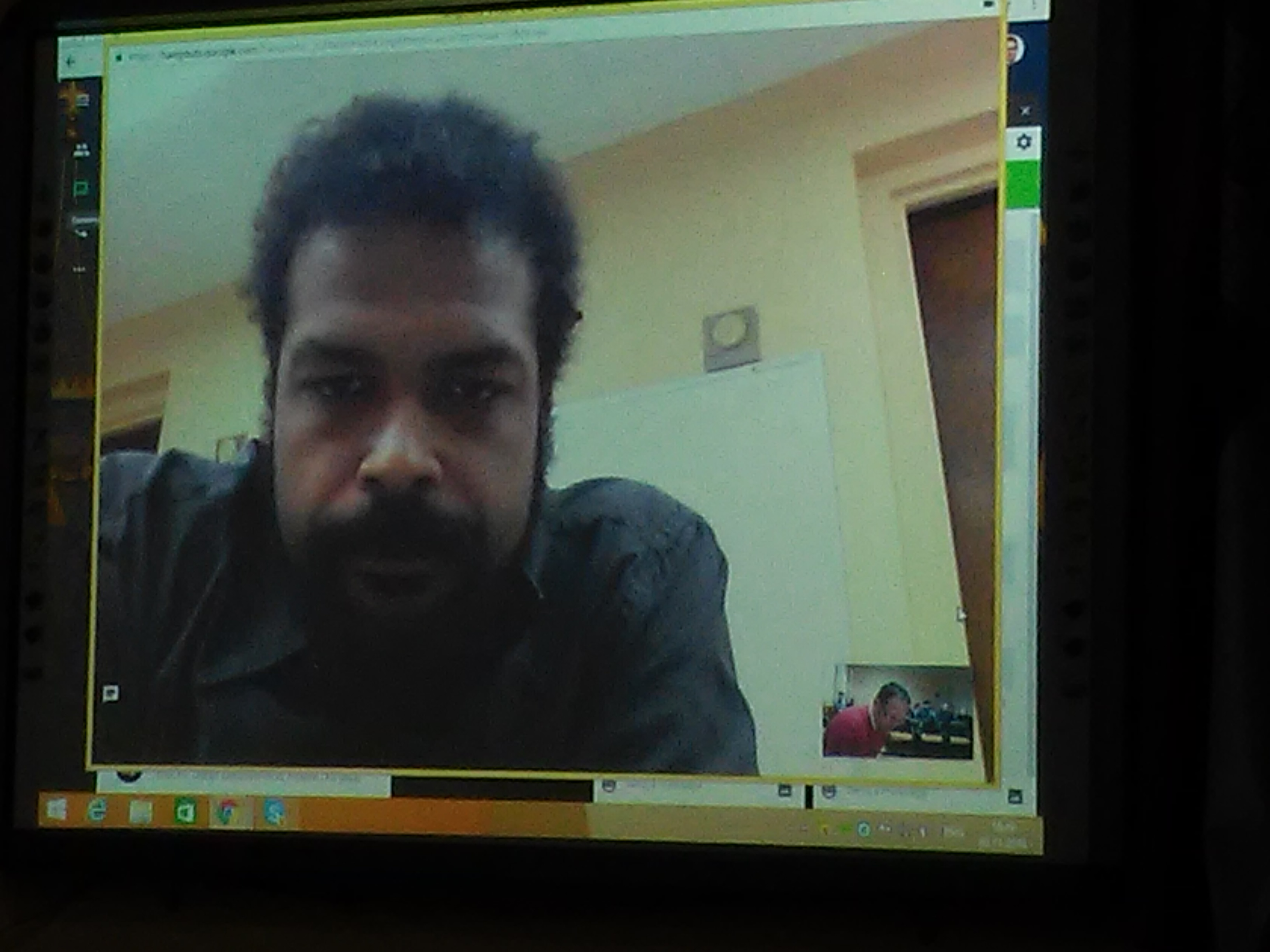
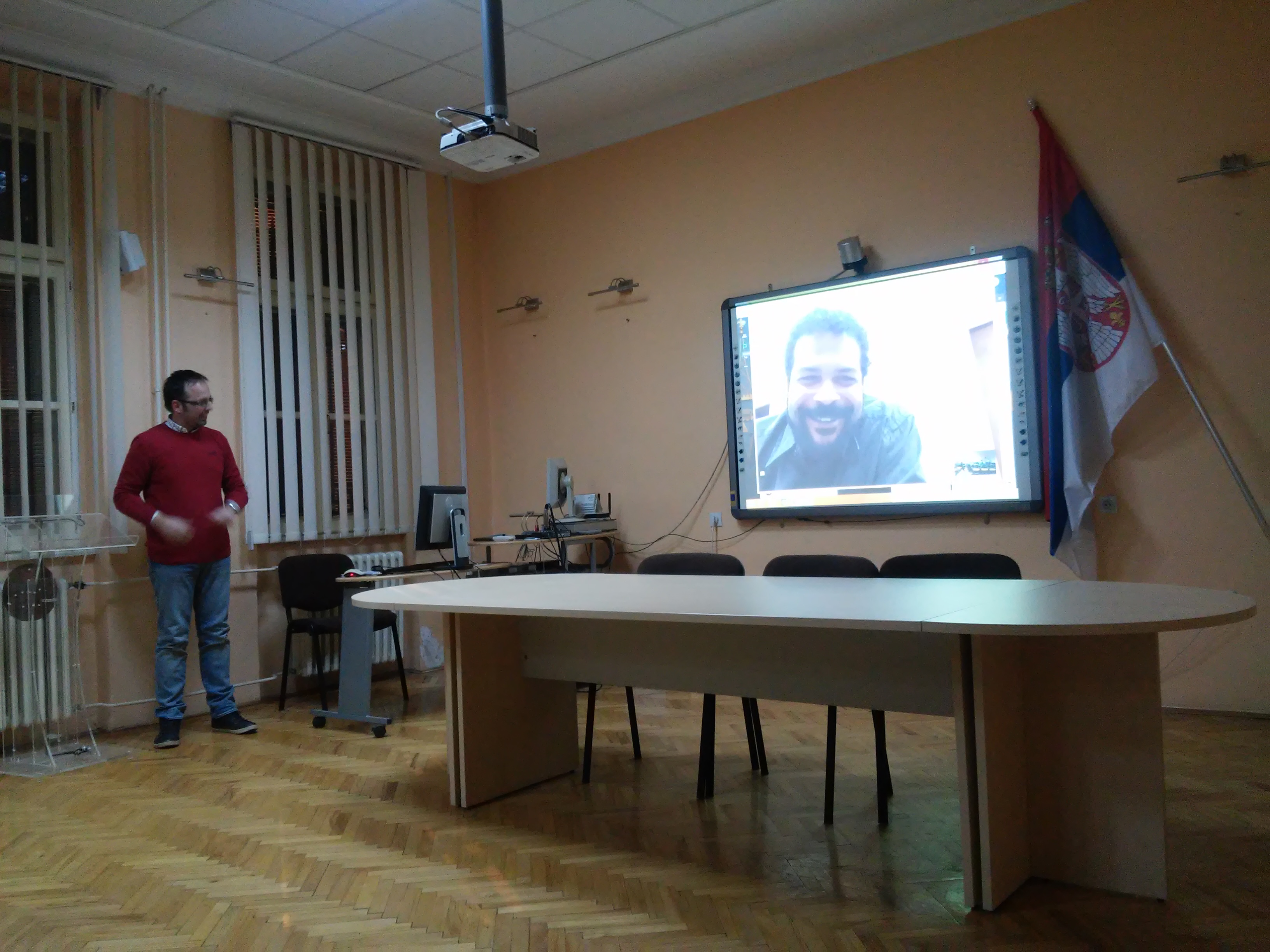
20-21/5/2016
CogSciNiš 2016: Symbol Grounding in Cognitive Science
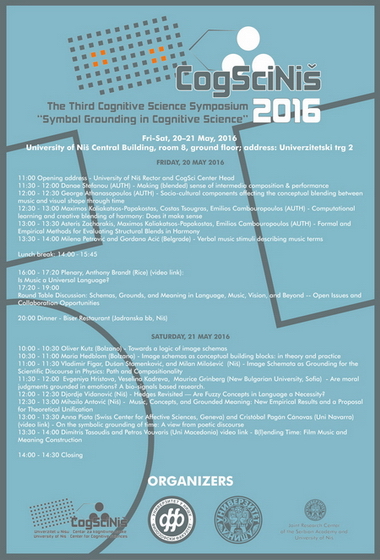
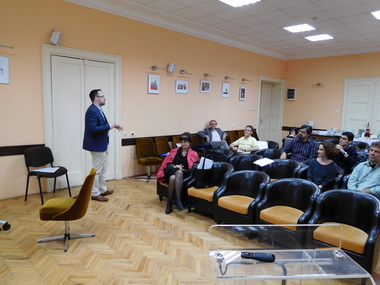
(click to download the poster/programme)
On 20 and 21 May 2016, Center for Cognitive Sciences hosted the third cognitive science symposium named CogSciNiš 2016: Symbol Grounding in Cognitive Science, supported by the Faculty of Philosophy and the University of Niš. The symposium was held in the main building of the University of Niš and consisted of two main talk sessions, one plenary lecture and a round table discussion titled "Schemas, Grounds, and Meaning in Language, Music, Vision, and Beyond - Open Issues and Collaboration Opportunities". The opening speech was given by professor Vesna Lopičić, University's vice-rector for international cooperation, while the plenary video-link lecture, "Is Music a Universal Language" was given by professor Anthony Brandt (Rice University, USA), whereas the list of participants included: Emilios Cambouropoulos, Danae Stefanou, Maximos Kaliakatsos-Papakostas, George Athanassopoulos, and Asteris Zacharakis from Aristotle University of Thessaloniki (Computational and Cognitive Musicology Group), Oliver Kutz and Maria Hedblom from the Free University of Bozen-Bolzano, Evgeniya Hristova from the Center for Cognitive Science, New Bulgarian University, Milena Petrović and Gordana Acić from the University of Arts in Belgrade, as well as four representatives of the host university - Đorđe Vidanović, Mihailo Antović, Vladimir Figar and Dušan Stamenković. Besides this, we had several video-link participants: Dimitris Tasoudis and Petros Vouvaris (University of Macedonia, Thessaloniki), Anna Piata (Swiss Center for Affective Sciences), and Cristóbal Pagán Cánovas (University of Navarra), along with one virtual listener - Constant Bonard (University of Geneva). The symposium allowed the participants to link their studies related to the domains of musicology, linguistics and cognitive science, and plan some directions for institutional and research collaboration in the future.
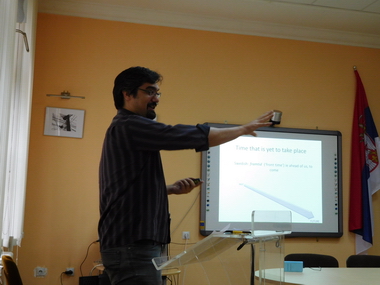
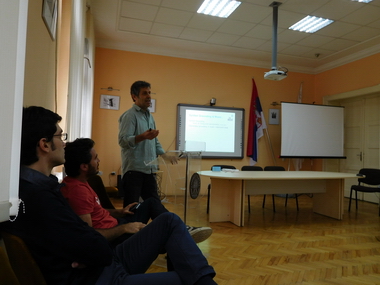
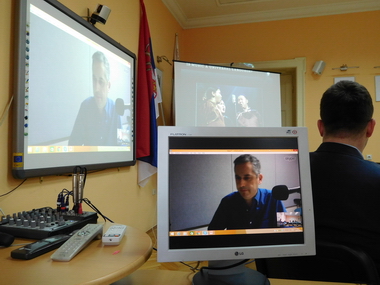
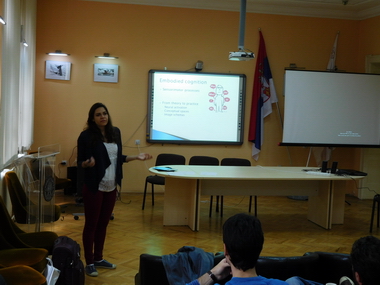
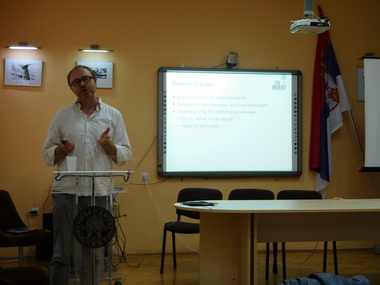
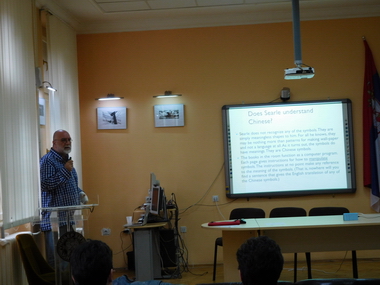
17/5/2016
Professor Hristova's Lecture
On Tuesday, 17 May, 2016, Professor Evgeniya Hristova, Ph.D. from the Center for Cognitive Science, New Bulgarian University, Bulgaria, gave a lecture titled "Moral judgments about decision of artificial cognitive systems" in which she presented a number of studies carried out by her colleagues and her - in these studies they tested how moral human subjects may find different decisions made or potentially made by humanoid robots or artificial intelligence cognitive systems.
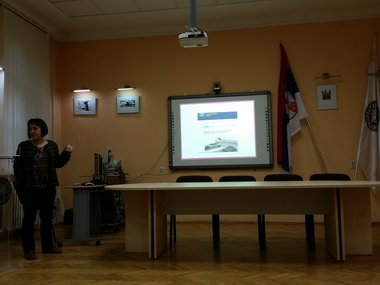
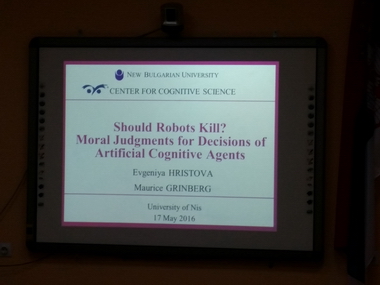
23/4/2016
Dr Canovas's Lecture
On Saturday, 23 April, 2016, Cristóbal Pagán Cánovas, Ph.D. from the Institute for Culture and Society, University of Navara, Spain, gave a lecture via video link titled “The Poetics of Time: Cognition, Culture, Communication.” The lecture was given at the Faculty of Philosophy, University of Niš, during the annual conference “Language, Literature, Time 2016”. The lecture started with the introduction and comparison of the classical Conceptual Metaphor Theory and the more recent model proposed in the form of Conceptual Blending Theory, emphasizing the shortcomings of the former and potential advantages of the latter. In addition to the overview of metaphorical conceptualizations of time in poetry, the lecture also provided ample psychological evidence for the “existence” of the TIME IS SPACE metaphor, and it also introduced more recent research efforts in the study of metaphorical gestures conducted on materials from the Red Hen database. The lecture ended in a fruitful discussion.
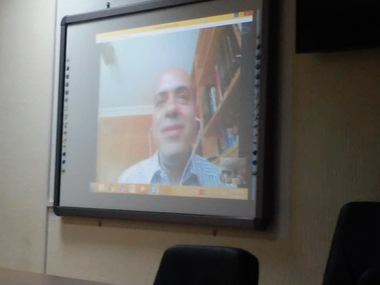
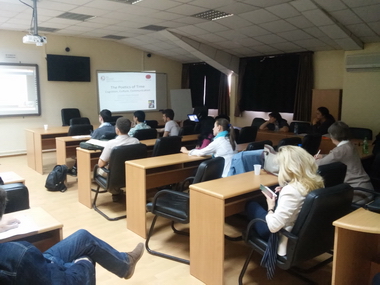
21/4/2016
Dr Lu's Lecture
On Thursday, 21 April, 2016, Wei-lun Lu, Ph.D. (Masaryk University, Brno, Czech Republic) gave a lecture titled “Use of parallel texts as a methodology in cognitive linguistics: Deictic verbs as viewpoint operators.” The introductory part of the talk included some of the basic tenets of Conceptual Metaphor Theory, and the discussion of the notion of “construal” as one of the most salient cognitive phenomena advocated by contemporary cognitive linguistics, which was followed by an overview of some more specific research areas. Namely, apart from presenting the results of his research on the use of parallel corpora in the investigation of deictic verbs as viewpoint operators, the lecture also stressed the importance of a comprehensive methodological approach to research in the domain of cognitive linguistics. One of the main suggestions included the use of renowned classics that have been translated multiple times into many languages, thereby yielding fruitful ground for investigation and cross-linguistic comparison. The lecture eventually led to a productive discussion.
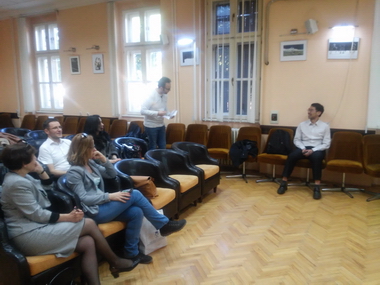
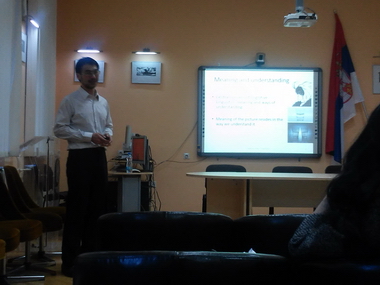
30/3-13/4/2016
Cognitive Comics Studies Lecture Series
From 30 March to 13 April 2016, Center for Cognitive Sciences hosted the Cognitive Comics Studies Lecture Series, which gathered three eminent comics scholars from Serbia, the Netherlands and the United States. The first lecture, titled Visual Manifestations of Conceptual Metaphor and Metonymy in Comics, was given on 30 March by Miloš Tasić (Faculty of Mechanical Engineering, University of Niš). This introductory lecture was followed by two video-link lectures. The first of them was Charles Forceville's (Media Studies, University of Amsterdam) Stylistics in Comics on 6 April 2016. The closing lecture in the series was Neil Cohn's (University of California, San Diego / Tilburg University) The Visual Language of Comics: What comics can tell us about the mind (and vice versa) on 13 April 2016. The lectures introduced the field of cognitive comics studies and displayed some of the possibilities for further research in this domain.
THE POSTER (click to download)
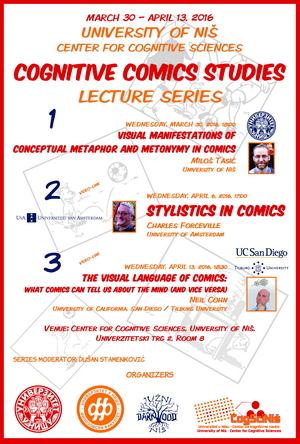
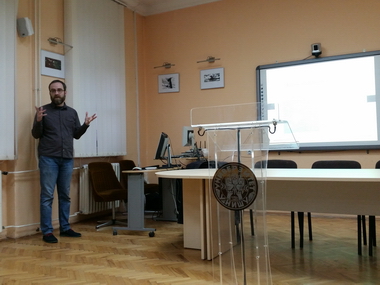
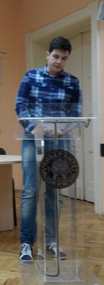
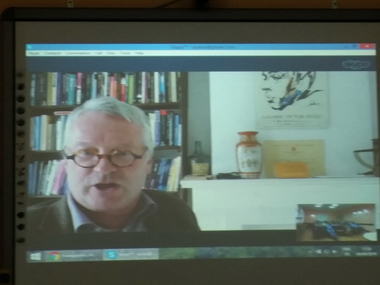
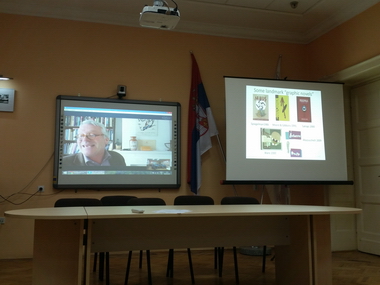
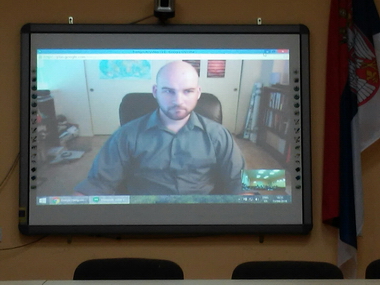
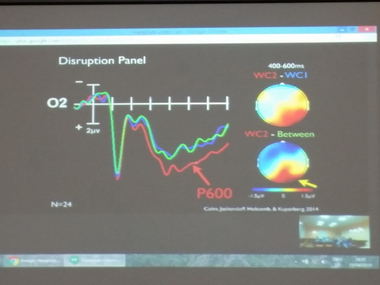
3-28/12/2015
Dušan Stamenković's visit to the University of Vienna
From 3 to 28 December 2015, Asst. Professor Dušan Stamenković, CogSciNiš member and secretary, visited the University of Vienna through CEEPUS III academic network (CIII-AT-0103-10-1516 – Cognitive Science, Knowledge Studies, and Knowledge Technologies), where he participated in curricular activities within the Middle European interdisciplinary master programme in Cognitive Science (MEi:CogSci). During his visit, he gave a public lecture entitled The Contribution of Cognitive Linguistics to Gaming and Comics Studies, and a workshop titled Identifying and Analysing Metaphor, Metonymy, and Image Schemata in Visual Languages, both of which were part of the MEi:CogSci programme activities. Besides this, he participated in classes within the course Introduction to Cognitive Science I, whereas he also visited Comnenius University in Bratislava. With his colleagues from Vienna and Bratislava he discussed various cooperation possibilites, as well as directions for founding an MA programme in cognitive sciences at the University of Niš.
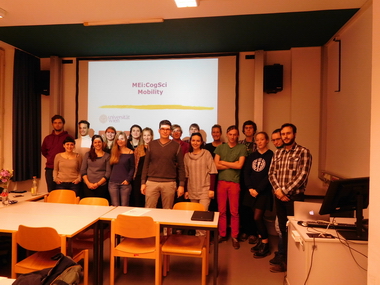
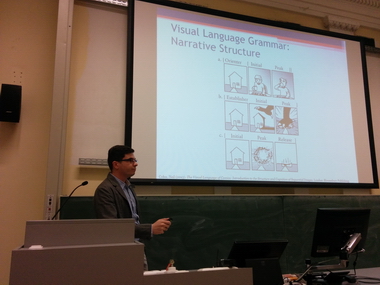
23/12/2015
Nikola Stojanović's Talk
On Wednesday, 23 December 2015, Nikola Stojanović, a lecturer from the Faculty of Electronic Engineering (University of Niš), gave a talk entitled Virtual reality: new research possibilities in cognitive sciences. The lecturer provided an overview of various activities his research group had performed, some of which had been directed at raising awareness about the importance of VR technologies in diverse fields - from entertainment to science. It was pointed out that there are possibilities for cooperation with the Center for Cognitive Sciences in the domain of spatial, language and auditory cognition. After the presentation, numerous participants had the opportunity to try out the Oculus Rift VR system.
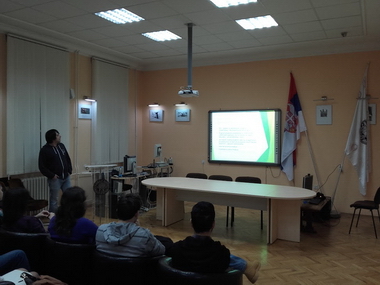
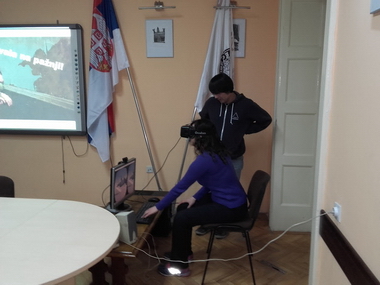
08/12/2015
Jana Mitić's and Naomi Benecasa's Talk
On 8 December, 2015, Jana Mitić (Faculty of Arts, University of Niš) and Naomi Benecasa (Rice University, Houston, Texas) gave a lecture titled “Study of the Perception of musical Timbre Inspired by Cognitive Linguistics.” The presenters provided a brief overview of the role of conceptual metaphors in the study of musical meaning, which was then followed by some specific examples from the presenters’ professional experience. In addition to colorful illustrations of the use of conceptual metaphors and image schemata in the descriptions of musical timbre, the presentation also included a live cello-performance of some selected pieces aimed to illustrate not only examples of upward/downward movement and circular motion, but also instances of the emotional/affective content that most musical pieces can evoke, and how these effects can be either stressed or downplayed by the performer’s interpretation.
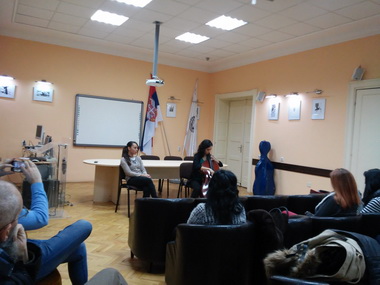
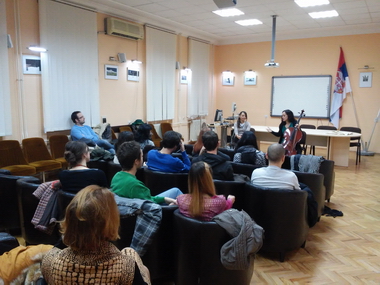
15/06-20/07/2015
CogSci Meetings with Students
During June and July 2015, several members of the Center for Cognitive Sciences organized a series of meetings and workshops with students interested in cognitive sciences. These meetings yielded a number of plans related to possible research and papers in the forthcoming months, predominantly in the areas of cognitive linguistics and cognitive musicology.
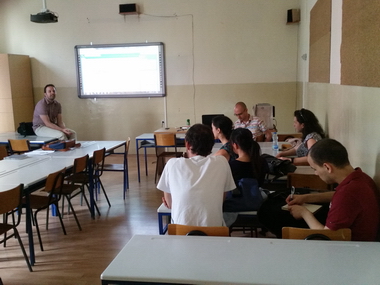
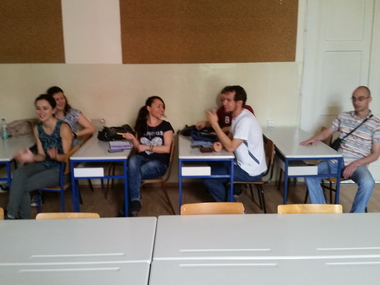
12-15/05/2015
Professor Oakley's Visit
Professor Todd Oakley, one of the world's most eminent cognitive linguists and Chair of Cognitive Science at Case Western Reserve University (Cleveland, Ohio, USA), visited the University of Niš, Faculty of Philosophy, and Center for Cognitive Sciences from 12 to 15 May 2015. During his visit, he gave a number of lectures and workshops - “Invocation or Apostrophe?: Rhetorical Dimensions of Prayer Idioms in Broadcast Television”, “Semantic Domains in The Dream of the Rood”, “Becoming Human: The Phylogeny of Homo Rhetoricus”, “The Fluidity-to-Elasticity Hypothesis: the Perspectives” (sa prof. dr Đorđem Vidanovićem), “Deonstemic Modals in Legal & Political Discourse: The Cognitive Semiotics of Layered Actions”. A detailed program of his visit can be found in the attached poster. POSTER.
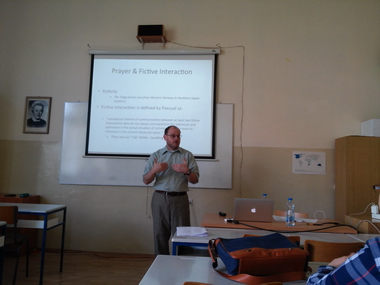
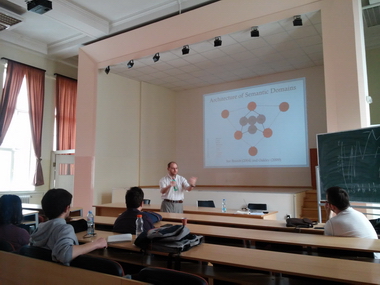
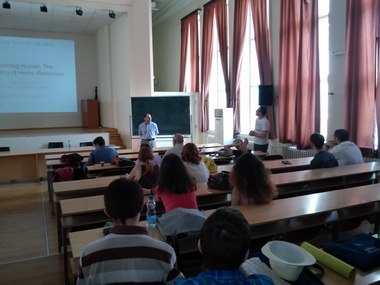
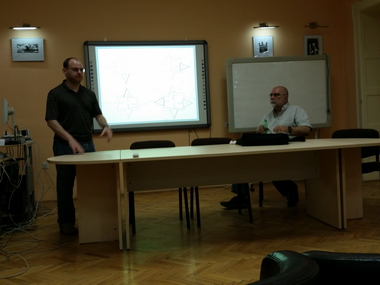
27-29/04/2015
Dr Moustafa's Lectures
On Monday, 27 April, and Wednesday, 29 April, Dr Ahmed Moustafa (School of Social Science and Psychology and the Marcs Institute, University Of Western Sydney) gave two lectures, titled Behavioral and Computational Studies of Parkinson's Disease and Designing Computational Models of Brain and Behaviour. Among other things, he elaborated on the ways in which the existing treatments of Parkinson's disease may benefit from behavioral and computational models. Video link.
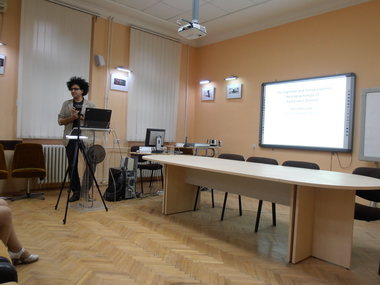
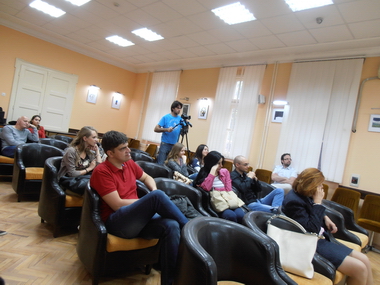
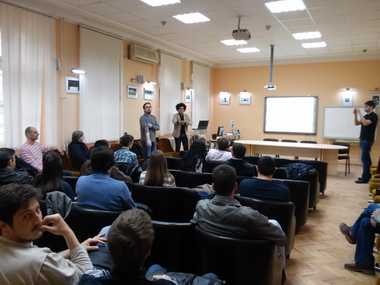
08/04/2015
Professor Nešić's Lecture
On Wednesday, 08 April 2015, professor Milkica Nešić (Faculty of Medicine, University of Niš) gave a lecture entitled Neuroscience of Communication - from Molecule to Society, in which she described a set of links between molecules, cells, and the physiology of the human body on the one hand, and the functioning of the nervous system and social functions on the other.
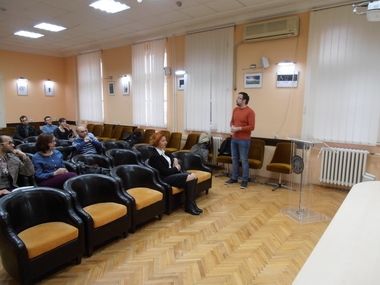
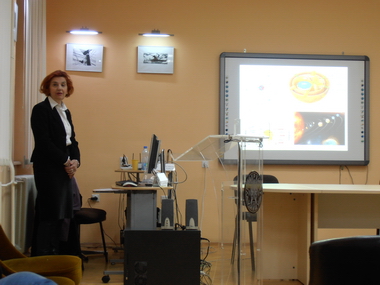
18/12/2014
Professor Obrenović's Lecture
On Thursday, 18 December 2014, professor Joviša Obrenović (Department of Psychology, Faculty of Philosophy, University of Niš) gave a lecture titled Two Brain Hemispheres, Two Types of Consciousness, One Personality?, in which he used several theoretical frameworks to discuss various aspects of lateralization of the human brain.
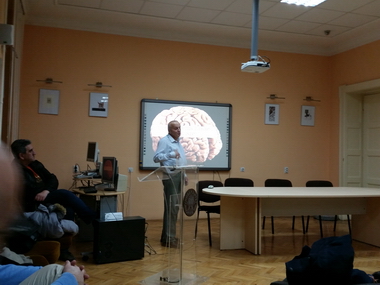
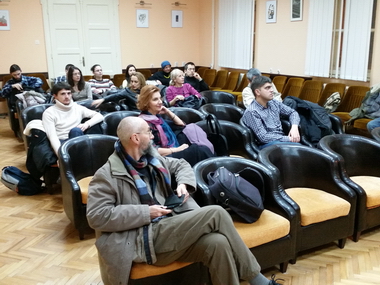
25/11/2014
Professor Antović's SCOPIA Workshop
On Tuesday, 25 November 2014, professor Mihailo Antović, Head of Center for Cognitive Sciences, held a SCOPIA workshop at Myrifield Institute for Cognition and the Arts. The workshop entitled From Concepts to Connotation: A Cognitive Linguistic Approach to Music Cognition introduced several segments of a research program conducted by the music cognition group at the Center for Cognitive Sciences in order to suggest how studies of music and language cognition may inform both theoretical and experimental work in cognitive linguistics. Video link.
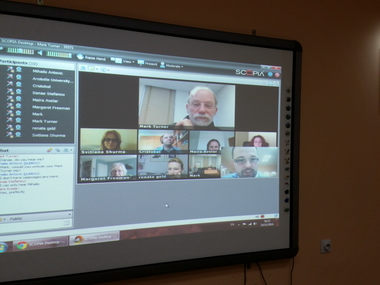
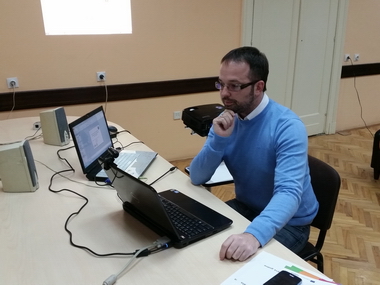
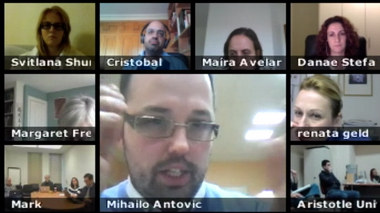
4/11/2014
Professor Dimitrijević's Lecture
On Tuesday, 4 November 2014, Professor Srboljub Dimitrijević (Department of Philosophy, Faculty of Philosophy, University of Niš) gave a lecture titled Cognition, Circumstances, Factors, in which he presented a number of philosophical views on the problem of cognition.
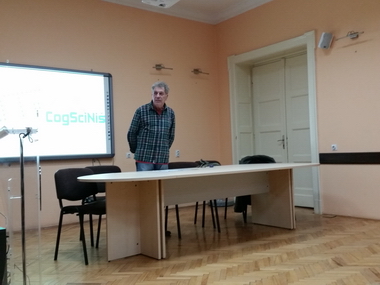
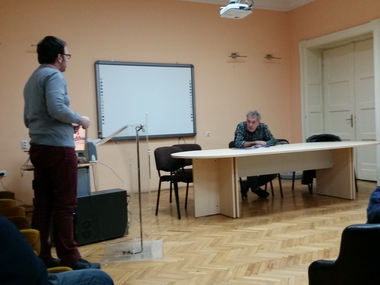
3/5/2014 – 6/5/2014
Professor Mark Turner's Visit and CogSciNiš 2014
On 3rd and 4th May 2014, The Second Cognitive Science Symposium – Workshop on Multimodal Communication was held at the Faculty of Philosophy, University of Niš. In addition to participants from the Faculty of Philosophy in Niš, the symposium also hosted guests from Croatia, Bulgaria, Greece, and the US. The event was organized by the Center for Cognitive Sciences, University of Niš, in cooperation with the University of Niš, Case Western Reserve University, Ohio, Embassy of the United States in Belgrade, Faculty of Philosophy, and the Joint Research Center of the Serbian Academy and University of Niš.
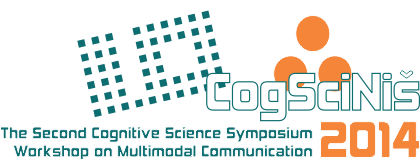
Dr Mark Turner, Professor of Cognitive Science at Case Western Reserve University and one of the leading cognitive scientists today, opened the symposium with the plenary lecture titled Mind and the Media: Cognitive Processes of Persuasion During Virtual Interaction where he introduced a new research project that is currently under way. Among other problems, he introduced the audience to the notions of a scene of joint attention, scene of classic joint attention, and a scene of blended joint attention. The opening lecture inspired a number of questions from the audience which gave way to a fruitful discussion.
The remainder of the first day of the seminar included a video conference via Polycom with the Aristotle University of Thessaloniki, as well as presentations given by participants from the University of Zagreb and University of Niš. The final talk of the day, titled Music, Language, Meaning, and Cognition: A Research Program, was given by Dr Mihailo Antović, Head of Center for Cognitive Sciences at the University of Niš.
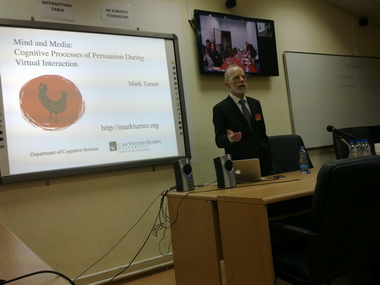
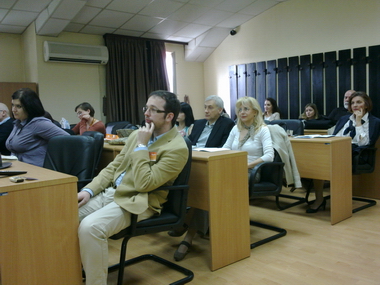
The second day of the symposium started with the plenary lecture given by Dr Djordje Vidanović from the Faculty of Philosophy, University of Niš, titled The Tractability of Conceptual Blending, where he discussed the problem of meaning construction at human level, especially in case where the tractability of this process is highly questionable, like with the space-time relationship in physics. The plenary lecture was followed by two consecutive sessions that included participants from the University of Athens, University of Zagreb, New Bulgarian University in Sofia, University of Niš, and University of Novi Sad.
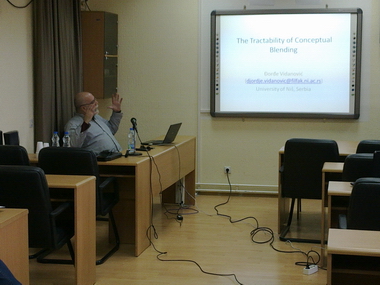
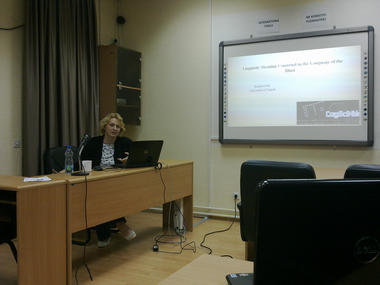
In all, by bringing together scholars from various disciplines, some of which include cognitive science, psychology, and linguistics, the symposium provided a multidisciplinary environment for the study of various aspects of communication and meaning construction in different contexts.
Download the Workshop poster
Download the Workshop Program and Book of Abstracts
Professor Turner's visit, supported by the US Embassy in Serbia, continued on 5th and 6th May, with a number of activities. On 5th May he gave the lecture titled Speaking, Gesture, Bodily Stance: Studying Multimodal Communication in a Massive Electronic Corpus at the Faculty of Philosophy, where presented the possibilities of The Little Red Hen Lab. On 6th May, professor Turner organized a workshop on Trends in Modern Cognitive Linguistics and Latest Developments in Conceptual Blending Theory with the staff and students of the Faculty of Philosophy. The visit ended with the workshop entitled Niš, Serbia and Northeast Ohio – Possibilities for Prospective Students, held at the American Corner in Niš.
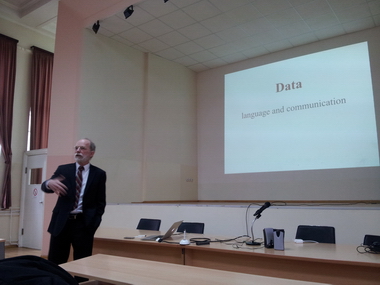
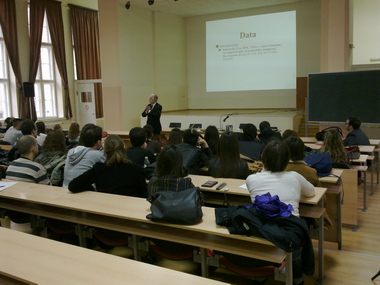
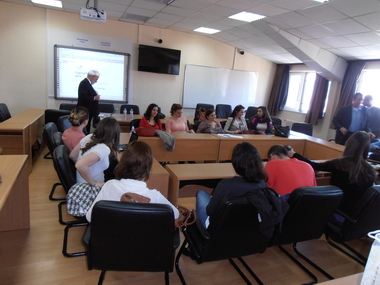
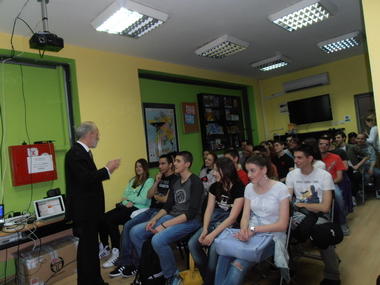
Download the Visit Poster
20/3/2014
Dr Dušan Stamenković's Lecture
On Thursday, 20 March 2014, Dr Dušan Stamenković, Asst. Professor in the Department of English, Faculty of Philosophy, University of Niš, gave a lecture titled Cognitive Linguistics and the Visual Language of Comics. Stamenković presented the results of various studies related to visual language cognition, and suggested a number of possibilities for further research in this domain.
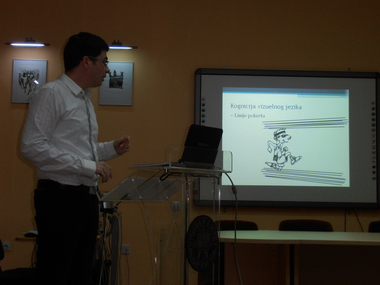
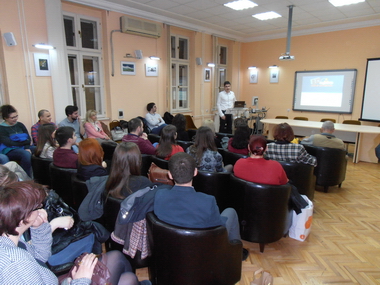
18/2/2014
Professor Jelka Crnobrnja Isailović's Lecture
On Tuesday, 18 February 2014, Dr Jelka Crnobrnja Isailović, Professor in the Department of Biology and Ecology (Faculty of Sciences and Mathematics, University of Niš) and Senior Scientist at the Institute for Biological Research "Siniša Stanković", Belgrade, gave a lecture entitled Heterogeneous Environments and the Evolution of Hominids, in which she gave an overview of evolutionary processes, paying special attention to the ways in which various changes in the environment of hominids determined their evolution. The lecture was followed by a thorough and interesting discussion.
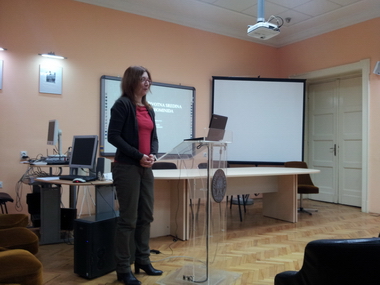
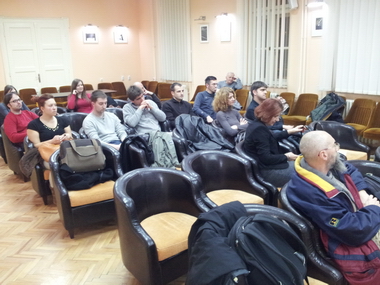
24/12/2013
Dr Vuk Milošević's Lecture
On Tuesday, 24 December 2013, Dr Vuk Milošević (Clinic of Neurology, Clinical Center Niš) gave a lecture entitled The Brain as a Network: Neurophysiological Methods in the Study of Cortical Functional Connectivity, in which he presented the structure of the brain as a complex system and gave an overview of various experimental methods used in contemporary research. The lecture was followed by a discussion on the issues of causality, emergence, artificial intelligence and research possibilities.
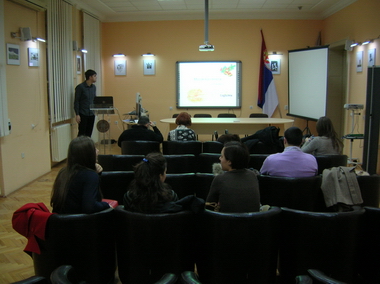
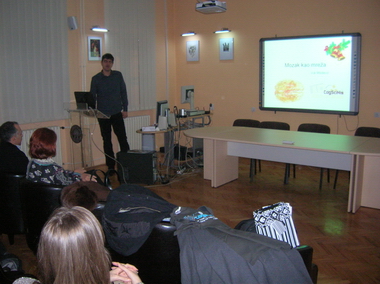
28/11/2013
Professor Mihailo Antović's Lecture
On Thursday, 28 November 2013, professor Mihailo Antović PhD (Faculty of Philosophy, Niš; Head of Center for Cognitive Sciences) gave a lecture titled Music, Language and Cognition: In Search of Underlying Principles, in which he provided a survey of his previous and forthcoming research endeavors in the field. You can download professor Antović's papers from his website: www.mihailoantovic.com
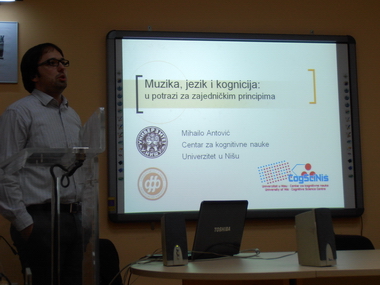
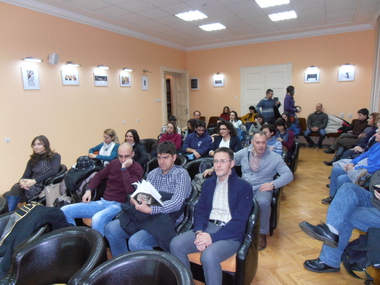
31/10/2013
Professor Anthony Brandt's Lecture
On Thursday, 31 October 2013, professor Anthony Brandt PhD (Rice University, Houston, Texas, USA) gave a video-link lecture titled The Science and Art of Creativity, within the programme of the Center for Cognitive Sciences, University of Niš. The successful composer, professor of music theory and cognitive scientist, who obtained his PhD at Harvard, presented the basics of his own theory of creativity, based on the models proposed by David Eagleman, Gilles Fauconnier and Mark Turner. By presenting a set of examples from the world of fine and applied art, architecture, music and design, professor Brandt pointed at some possible abstract principles which govern creative thought, after which he answered numerous questions coming from the audience. See the poster and prof. Brandt's short bio.
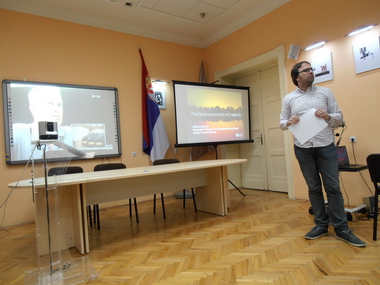
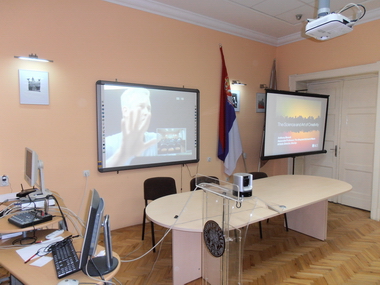
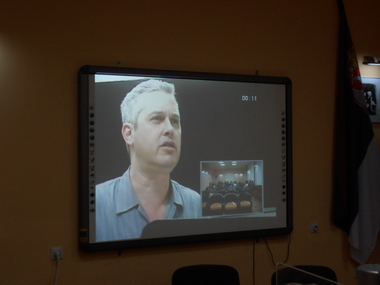
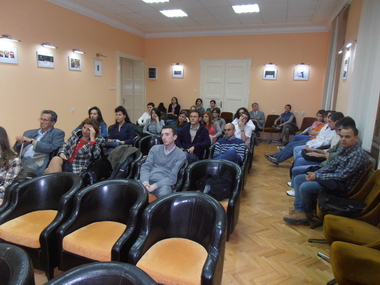
Activities organized by the Cognitive Science Forum between 12/01/2011 and 15/05/2013:
15/05/2013
Professor Boban Arsenijević's Lecture
As a part of the Cognitive Science Forum's programme for 2013, on 15 May 2013, professor Boban Arsenijević PhD (Faculty of Philosophy - University of Niš) gave a lecture titled Space in Cognition: Biological, Linguistic and AI Perspectives, which was followed by a thorough and interesting discussion.
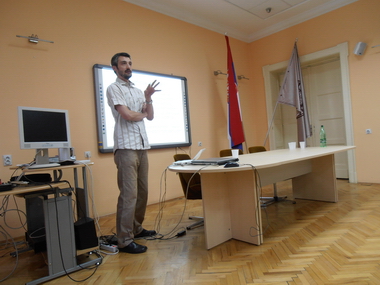
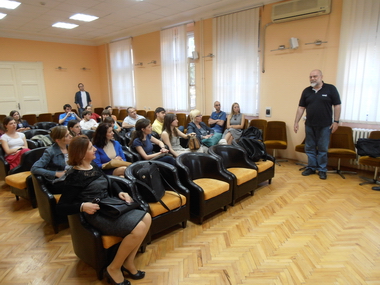
26/04/2013
Professor Ray Jackendoff's Lecture
On 26 April 2013, Ray Jackendoff PhD, Seth Merrin Professor of Philosophy, Co-Director of the Center for Cognitive Studies at Tufts University, and one of the most prominent modern linguists, gave a video-link lecture within the Language, Literature, Marginalization Conference, held at the Faculty of Philosophy - University of Niš. The lecture was entitled What You Can Say with Marginal Syntax: A Hierarchy of Grammatical Complexity. Link.
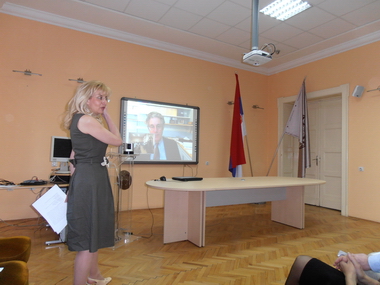
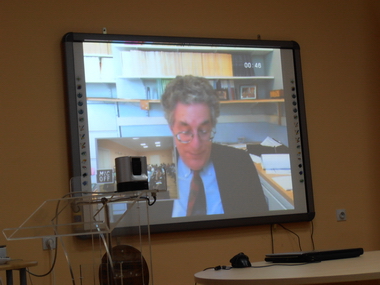
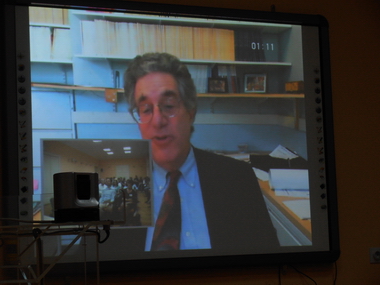
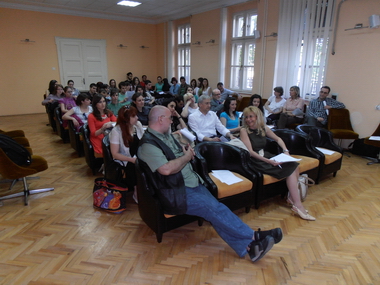
10/04/2013
Professor Branimir Todorović's Lecture
On 10 April 2013, Professor Branimir Todorović (Faculty of Sciences and Mathematics, University of Niš) gave a lecture entitled Intelligent machines, Models, Learning Algorithms and Applications at the University of Niš, within the Cognitive Science Forum programme. Professor Todorović's interesting lecture contributed to the process of linking various local cognitive scientists studying different aspects of cognition.
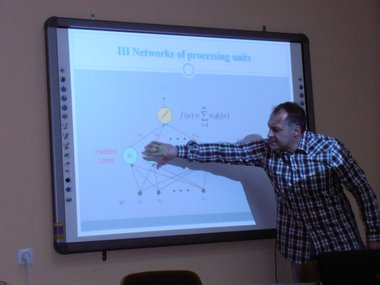
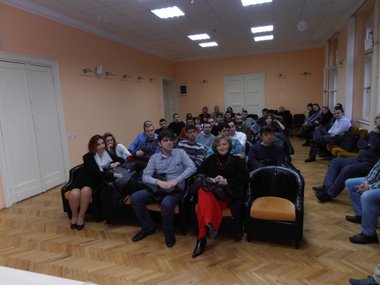
29/03/2013
Professor Ronnie Wilbur's Lecture
On 29 March 2013, Professor Ronnie Wilbur PhD (Purdue University) gave a lecture entitled Structure of ASL and Applications, with a special emphasis on event structure in sign languages. The lecture was organised by the Faculty of Philosophy and Cognitive Science Forum. Link.
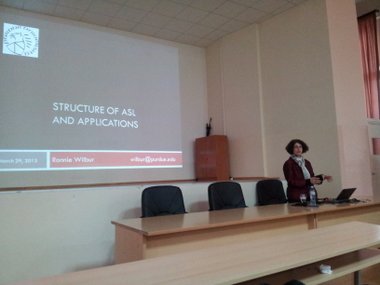
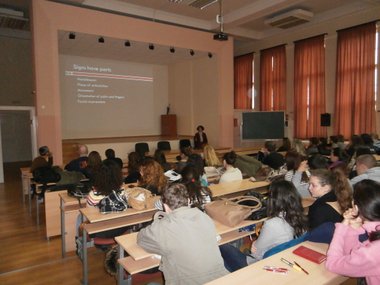
20/03/2013
Professor Todd Oakley's Second Visit
From 14 until 19 March 2013, Todd Oakley PhD, professor and Chair of Cognitive Science at Case Western Reserve University, visited the University of Niš. During his visit, the renowned cognitive scientist conducted two workshops at the Faculty of Philosophy – one in cognitive linguistics (An Introduction to Construction Grammar) and one in cognitive semantics (Basic Elements of the Conceptual Blending and Integration Model). Besides this, together with Đorđe Vidanović PhD, professor at the Faculty of Philosophy and the coordinator of the Cognitive Science Forum, he gave a lecture entitled Autism and Intersubjectivity: A Report on Preliminary Research. Professor Oakley’s visit is a part of the continual cooperation between the Department of Cognitive Science (Case Western Reserve University) and the Cognitive Science Forum (University of Niš). The visit was organised by the University of Niš, the Faculty of Philosophy, the SANU Research Centre and the Cognitive Science Forum. Visit programme. Link.
